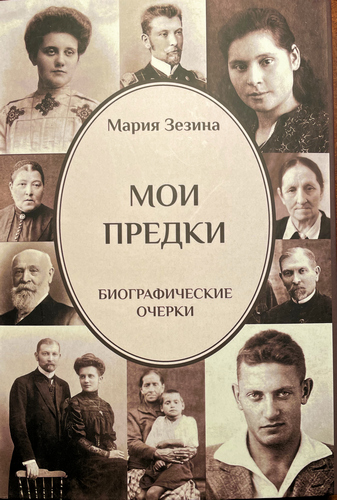
Book Cover

I started researching family history a long time ago. I was driven by a desire to find out what kind of people my great-grandparents were, how they lived and what they did. When I was born, almost none of them were alive. I did catch my grandmothers, but they died early. My parents were the youngest in the family and also grew up without grandparents. My father and mother were reluctant to tell me about their parents, and probably knew little about their grandparents. That was the time.
I wanted to reconnect with my ancestors. I didn't look for heroes or personalities, I didn't want to gloss over their successes or hide their failures and mistakes, least of all to find their noble roots. What I found was more important to me. I began to see my life as a link in a chain of successive generations of people, who suddenly became dear to me. The choice of the profession, that I had always thought was random, was rather predestined. It turned out that my great-grandfather and I graduated from the same department of Moscow University, only in his time it had a different name. It turned out that my great-grandfather, grandfather and grandmother had worked as teachers all their lives, just like me. Not to mention some traits of their characters and interests in which I recognised myself.
This book tells the story of three generations of my ancestors, starting with my great-grandparents. Chronologically, the biographical sketches cover the period from the first half of the nineteenth century to the beginning of the twenty-first century. I was able to find the names of my ancestors, starting from the middle of the XVII century, in some family lines.
page5
All of them are included in the genealogical tree, but it has not yet been possible to reconstruct their life history.The biographical sketches are based on information collected from documents and letters preserved in my home archives, found in various state archives in Moscow, Arkhangelsk, Vilnius, Tver, Kishinev and St. Petersburg, as well as personal memories, mine and those of relatives. In order not to overload the text with footnotes, I left only those that contain additions and explanations. Inaccuracies and mistakes are inevitable in both documents and memoirs, but I have not made anything up and in all cases stipulated my assumptions.
The most subjective essays are about the people who I have known and been associated with for most of my life. They were my parents and my mother's sisters. I couldn't resist telling you about the apartment on Glazovsky Lane where our family lived for more than 40 years and where I spent my childhood. The search for materials was fascinating and took many years intermittently. It would hardly have ended with the writing of these essays if I had not found relatives who were engaged, as I was, in family history. I am grateful to my second cousin David Kinna for setting up the site and sharing his materials with me. An invaluable find for me were the letters his grandmother Rachel received from his siblings in Moscow. The two years of correspondence between David and I served as a stimulus to keep working.
I received tremendous help and support from Olga Ivankova, my grand-niece, who shared materials collected on her behalf by researcher Alexander Vorobyov. Olga's opinion, having read the first drafts of some of my biographical sketches, was very important to me.
My niece Iryna Dadykina-Rabinovich has been engaged in family history for many years, and she shared with me her documents.
page6
The results of Irina's searches in the lineage of Slytinovskys are reflected in publications as well as in the work to commemorate the memory of martyr Konstantin Pereslavsky (Slytinov).I am grateful to my cousins Olga Demitrovich for memories about my father, my uncle Ivan Petrovich and our grandmother Glafira Ivanovna, and Lyudmila Chernyavskaya, who shared the documents and photos of my father, my uncle Ivan Vasilyevich.
Special thanks to Mikhail Gershzon, a graduate of Moscow State University, a professional in the field of genealogy, for his valuable advice and assistance in the collection of archival documents.
Thank you to my family, Nikolay, Leonid and Anna Zezin, for their support and help.
page7
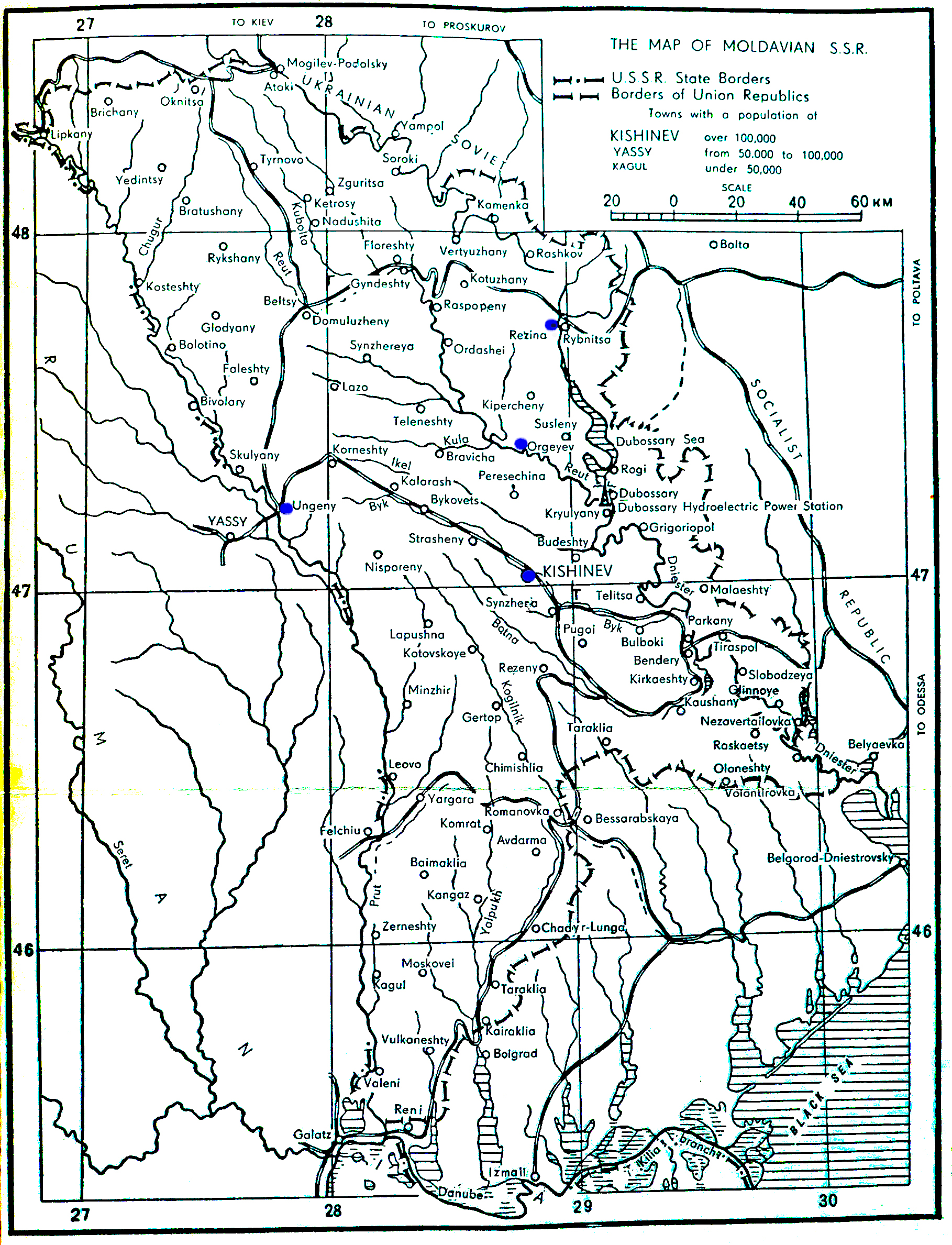

The number of ancestors increases exponentially as I go further back in time: two parents, four grandparents, and eight great-grandparents. Here we will talk about only four of my father's side of the family whose lives I have been able to find out about.
On my mother's side I only know the names of my great-grandfathers - Panfil Ivanovich and Yegor. The serfs had no surnames. I managed to restore Panfil Ivanovich's genealogy from the end of the XVII century. Since neither my mother nor her sisters knew the patronymic of their grandfather Yegor, it was impossible to find the names of his ancestors. Unfortunately, the names of his great-grandmothers remained unknown.
I first heard my great-grandfather's name when, as a child, I came across a booklet of religious sermons published in Kishinev in the late 19th century that I had kept in my bookcase. It was so different from the books in my parents' library that I approached my father. My father answered that Joseph Davidovich Rabinovitz was his grandfather, but did not tell me anything more about him. I later learned that Joseph Rabinowitz was a famous religious figure of his time, preaching Christianity among the Jews of Bessarabia, and that his teachings have followers in modern Russia. There is an article about him on Wikipedia, and the Danish researcher Kaj Kier-Hansen wrote a monograph about him
page8
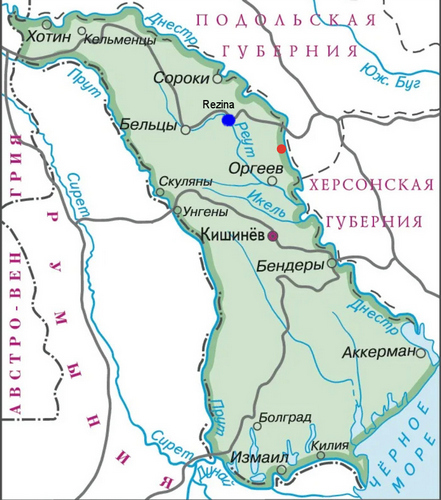
The story I am about to tell is based on information from Kier-Hansen's book, Joseph Rabinowitz's autobiography, the Internet, and information received from newfound relatives, Olga Ivankova, Joseph's great-granddaughter, and David Kinna, his great-grandson.
Joseph Rabinovitz was born on September 23, 1837 in Rezina, a small town that was part of Orhei district, and in the middle of the 19th century had a population of about 1,000 people (now Rezina is the capital of Rezina district of the Republic of Moldova). His father David Efroimovich was the grandson of the Orhei rabbi Wolf Rabinovitz. His mother, Esther-Sara, came from a Hasidic family. Esther-Sara died early and David married again. According to the register sheets for 1848, 1854 and 1859 the family had sons Abram (1835), Yankl (1839-1897), Meer (1841), Wolf-Aizik (1848), Goshey (1850), Shabs (1852), Itzik (1857) and daughters Beila (1843) and Maryam (1854) from both marriages of the father.
page9
Joseph spent his early childhood after his mother's death in the home of his maternal grandfather, Rebbe Natan Net (a student of the Hasidic tzaddik. In his grandfather's house he received a religious education, studying the Mishnah, the Gemara, and Rashi's commentaries. In 1848, when his grandfather became old and weak, and could no longer be engaged in the upbringing of his grandson, his father took the boy to Orgeev to his mother, Grandmother Rivka, who by this time had become a widow. For the next five years Joseph continued his study under the tutelage of Joseph Kivovitch, a private teacher and follower of the Rabbi Rafael of Bershid, a Hasidic tzaddik, and studied medieval Jewish mysticism (Kabbalah). Remembering this time many years later, Joseph Davidovich wrote in his autobiography “ I found no pleasure in the amusements and activities of my young companions." Playing with his peers was hindered by his lameness due to a congenital deformity of the foot.
page10
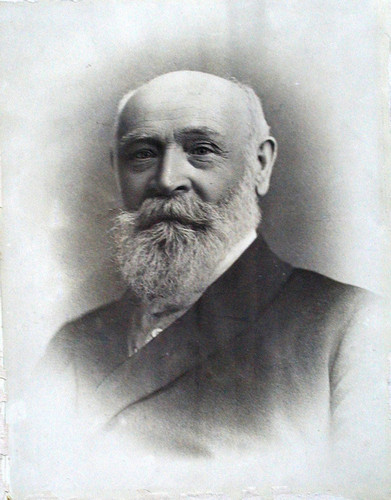
It is unlikely that Joseph was interested in girls and making plans for a future family life. According to Hasidic tradition, his parents decided everything. In July 1853 Joseph was betrothed to fourteen-year-old Golda Goldenberg before he was sixteen. The wedding was to take place three years later. In the meantime he continued his studies. According to tradition young men did not work before marriage and for the first year after, but devoted all their time to the study of sacred books. As he grew older, so did the times. The ideas of the Jewish Enlightenment were penetrating Russia from Europe. Joseph began to read the works of Moses Mendelssohn and modern Jewish literature. The circle of his interests extended beyond Hasidism. Joseph's views were greatly influenced by his friendship with Girsh (Ikhil-Tzvi) Gershenzon, who planted doubts about the absolute truthfulness of Hasidic interpretations of Holy Scripture. Gershenzon gave Joseph a Hebrew translation of the New Testament, saying: "Perhaps this was the real Messiah about whom Moses and the prophets prophesied.
page11
In December 1854 Joseph married Golda. According to tradition, for the first 18 months after the wedding the young family was to live with the wife's parents. On September 13, 1856 they had their first child, Haim-Volke, and in 1857 their daughter Sarah. A year and a half after the wedding Joseph established a small shop in Orhei, and rented a house for the family, using the 800 silver roubles he had received as a dowry. Joseph frequently saw Gershenzon, who, following his marriage to Joseph's sister, became not only a friend but also a relative.
In 1859 a misfortune befell the young family. A fire broke out in the town and everything was burned - the shop, the house, the books.
"The next ten years", Joseph wrote in his autobiography, "were filled with bitter suffering and anxiety. I had to find a livelihood". A young man immersed in philosophical and religious books, with no practical training, how was he to make a living? He began diligently studying the Russian language and the law in order to provide legal advice to Orhei Jews, most of whom spoke only Yiddish.
Joseph was a gifted man with a thirst for knowledge. Without having a degree in law, he obtained a formal license to practice law and became a respected lawyer in town and a well-known journalist in Jewish circles. He was often addressed as "doctor" or "rabbi" although there was no formal reason to do so. His correspondence began to appear in the Odessa paper Ha-Melitz.
page12
Joseph received the title of chartered solicitor (attorney). It is not clear how he managed to do it. The prerequisite for obtaining the rank was a higher legal education, which Joseph did not have, and service in the judicial office. He had only a private practice.
Having accumulated the necessary funds, in 1866 Joseph Rabinowitz opened a wholesale trade of tea and sugar in Orhei county. Three years later he was elected to the county council and became the only Jew on it. The family was growing. Rebecca was born in 1868, Rachel in 1869 and Tikva in 1870.
Joseph opened a community elementary school in Orhei, teaching Talmud and Torah, Hebrew and Russian, and became a member of the Russian language "Society for the Dissemination of Education among the Jews in Russia” He believed that education and enlightenment would make Jews equal members of society and that European countries would see that "their Jewish brother is also a man." The Pale of Settlement was abolished for merchants of the First Guild and university graduates. Craftsmen and artisans are allowed to register as tradesmen and to reside outside the Pale of Settlement. Jews received a right to open printing houses for Jewish books, and to acquire land and properties belonging to landlords. The reform of public education in 1864 opened access to secondary education for all children regardless of rank and religion.
The liberal reforms, however, affected only a small part of the Jewish population. The bulk continued to live in their closed world, in poverty, ignorance and fear of pogroms. The Odessa pogrom of 1871, which continued for
page13
three days with the connivance of the police, made a strong impression on Joseph. He saw that "education and enlightenment could not protect the Jews from the fury of their neighbors" or save them from contempt, reproach and threats. The work in the county council was also disappointing.Joseph sold his business and property in Orhei, and on November 9, 1871 he moved with his entire family to Kishinev. Settlement in the new place was overshadowed by family tragedy. A cholera epidemic which broke out in 1872 claimed the life of the youngest daughter, two year old Tikva. The family moved into the new house which was constructed in 1873 without her. Joyous events soon followed: David was born in 1874 and Nathan in 1876.
Kishinev opened wide opportunities for an active and enterprising person. In 1873, after the Bessarabian region was transformed into a province, Kishinev became a provincial city. The city grew rapidly. By the end of the century, the population reached 108.5 thousand people, 46 per cent of whom were Jews, 27 per cent Russians and 17 per cent Moldovans. But progress hardly touched most of the townspeople. Samuel Wilkinson, who visited the Rabinowitz family several times, called the Jewish quarter of Kishinev "an Asian city." It was, he said, a veritable ghetto that had not been reached by any of the new trends already evident in the city.
On moving to the capital of Bessarabia, Joseph had intended to continue the wholesale trade in tea and sugar, but quickly abandoned the venture. He sensed that his vocation lay elsewhere. He decided to become a Counsellor and Advocate of the Jews. He had a large circle of friends and acquaintances who would go to him for legal advice.
page14
He also began giving private lessons in Hebrew and Russian. Zederbaum, publisher of Ha-Melitz, which had moved to St. Petersburg after the Jewish pogrom in Odessa, invited him to become the permanent Kishinev correspondent. As a correspondent, Joseph saw his task as drawing public attention to the plight of the Jews. However, this did not seem to him sufficient as he strove for practical work. In his opinion, the Jews should cultivate what he saw as the most profitable and useful occupations. Rabinowitz published articles in the press on the improvement of the rabbinate and Jewish education, and called for the general engagement of Jews from an early age in agriculture. Leading by example, he himself began to work daily in his garden, engaging his young sons David and Nathan.
In 1878, together with Dr. Levinzon, he organized. The idea of involving the Jewish population in farming was not new. The tsarist government attempted to do this back in the early 19th century by introducing privileges for Jews who had joined the peasant estate. The government was not very successful. By the mid-nineteenth century only 3 per cent of the Jewish population of the Russian Empire worked as farmers. In Bessarabskaya Province the situation was slightly better - Jews-agriculturalists amounted to about 16%.
The government's policy on the Jewish question changed dramatically in 1881 after the assassination of Alexander II. Rumors of Jewish involvement in the assassination of the tsar provoked a wave of Jewish pogroms, which lasted about a year. Fortunately, there were no victims in Kishinev. In May 1881 the Government introduced Temporary Regulations, which severely restricted the rights of the Jewish population. Jews were forbidden to settle in the countryside, except in agricultural colonies,
page15
to acquire immovable property outside towns and cities and to rent land. The pogroms and the denial of rights gave rise to the spread of the idea of Zionism and the emigration of Jews to Palestine.
In November 1881 Joseph attempted to realize his plan to introduce Jews to agriculture. He petitioned the Governor of Bessarabia together with his brothers Yankel and Meir for permission to establish a Jewish agricultural colony. Having received a refusal in February 1882, he resolved to find a place for the colony in his historical homeland. Joseph went to Palestine.
He arrived in Jaffa, a port of entry for Jewish immigrants from many countries, and was deeply disillusioned. The city seemed to him the poorest, most squalid place he had ever seen. An émigré committee, consisting of only two people, was not to be trusted. In their efforts to bring immigrants to the Promised Land, Rabinowitz saw only self-interest. In Jerusalem, he witnessed the contemptuous treatment of Jews by Muslims and the mockery and oppression of worshippers at the Wailing Wall. His tales of Palestine upon his return to Kishinev caused some of his fellow countrymen to reject emigration, or to opt for America. But the main result was something else.
page16
The trip to Palestine was a turning point in the life of Joseph Rabinowitz. The transformation happened instantly. Joseph said that while standing on the Mount of Olives, he suddenly realized that the Messiah, about whom Moses and the prophets had written, was Jesus and that all the suffering of the Jews stemmed from the fact that they denied it. As he descended the mountain, he felt his soul being reborn to a new life. He returned to Kishinev a changed man. "The road to the Promised Land for the Jews does not lie across the Mediterranean Sea, but across the Jordan", he told his relatives.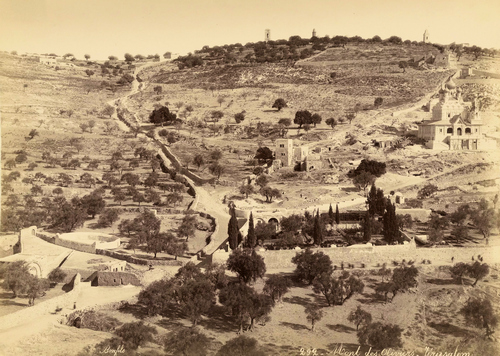
How and why was there such a rapid change in the views of a man who was brought up in a Hasidic family and who studied Jewish literature in depth? There is no answer to this question, there is only speculation and conjecture. You can read about it in detail in Kaj Kjar-Hansen's book. For us it is more important to know how his life was after his return from Palestine.
For almost a year-and-a-half Joseph disappeared from public life and there is no reliable information about this period. The result of his secluded thoughts were thirteen theses, in which Joseph set out his views on how to improve the plight of the Jews in Russia. He wrote that neither emigration to the historical homeland nor assimilation with the native Russian population would help. The only way to salvation lies through the recognition of Jesus as the brother of all Jews. At the end of 1883
page17
the theses, written in Hebrew, were given to Rudolf Faltin, pastor of the Kishinev Lutheran community. Faltin sent them to Germany, where they were translated into German and printed. An abstract in Swedish was soon published in Sweden, followed by translations into English and French.
In March 1884 three representatives of the British Missionary Society came to Kishinev to become acquainted with the new movement. A small conference in Kishinev resulted in new publications. Discussion took place in both the Jewish and Christian press. There was a lot of interest in the ideas of Joseph Rabinowitz, but not overwhelming interest. It has been noted that Joseph misunderstood the mission of Christ, who came into the world to atone for men's sins rather than to grant Jews equal rights with other nations. Joseph later acknowledged this. He described the evolution of his ideas: "In the beginning I saw Jesus as a great man with a heart full of compassion; later as someone who wanted to bring good to my people; and finally as someone who atoned for my sins".
Joseph Rabinowitz was not the first Jew to adopt Christianity and to preserve his Jewish identity but he was the first to raise the question in public. He met with both supporters and opponents. In Russia, most Jews took a negative view of Joseph Rabinowitz's ideas. The newspaper Ha-Melitz, of which Rabinowitz was a regular correspondent for many years, characterized him as an old man who had forgotten everything he knew and lost his mind, claiming that none of the Jews except the brother of Joseph followed him. The Jewish press attributed Rabinowitz's conversion to direct bribery by the Lutheran mission.
page18
PreacherRussian authorities, both secular and spiritual, were favorably disposed toward the new religious trend. On Christmas Eve 1885, Rabinovitz received permission from the Ministry of Internal Affairs to hold public meetings. The first meeting, held at the home of Joseph's brother Ephraim Yaakov, attracted about two hundred people, Jews and Christians alike. The name of the community, suggested by Rabinowitz, "Israelites of the New Covenant," reflected the essence of the movement, which united Jews who believed that the God of Israel, through His Messiah, Christ, had given Israel a New Covenant. According to Russian law, the new community's house of prayer was called a Jewish synagogue, because Jews who believed in Christ remained Jewish. Up to the end of his life Joseph considered himself a Jew. He was convinced that a Jew who believed in Christ did not lose his national identity. An Englishman who accepted Christianity remained an Englishman, as did a German, a Frenchman or any other nationality.
However, the majority of Kishinev's Jewish population considered him a traitor. Crowds gathered around the community prayer house to express their outrage. On several occasions, the police had to be called in to shield Joseph from attacks. On one occasion in February, he was attacked by a street demonstration which threw snowballs at him as he travelled in a carriage with his daughter. There were rumours of his imminent assassination. At the same time, the number of his supporters was growing. The prayer house could not accommodate all those who wished to attend. Joseph received many letters from all over Russia and abroad.
The interest of the Messianic congregations abroad in Joseph Rabinowitz's activities was mutual. Joseph, too, was eager to meet his fellow believers. In the spring of 1885 he went to Germany.
page19
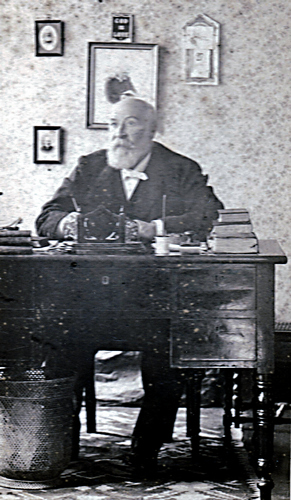
This trip was financed by the most influential of the European Messianic groups, the British Mildmay Mission, whose representatives also travelled to Germany to meet Joseph. The trip proved remarkably successful. Mildmay Mission supported the Kishinev community financially. There were no conditions attached to the financing. The money went directly to Joseph Rabinovitz and he had complete freedom in his activities, both in doctrinal matters and in the practice of worship.
Joseph did not want to associate himself with any of the Christian churches, so he decided to be baptized in the Evangelical Church in Berlin. He was to be baptized by an American priest, Professor C.M. Mead, who later described in detail the events leading up to his baptism. It is customary to choose a new Christian name for the Jews when they are baptized. At first Joseph agreed to take the name "Paul", but then said that according to Russian law he could not change his name.
page20
Joseph's German friends tried to persuade him of the need for the new name, but Joseph was adamant.
It is difficult to understand his stubbornness. I doubt if there was a law in Russia forbidding a new name when a non-Christian was baptised. After all, all of Joseph's sons changed their names, Haim-Volke became Vladimir, Nathan became Peter, David became Ivan. Anyway, the Germans had to agree with Joseph when the priest showed evidence that such a baptism with the preservation of the name had already been in his practice.
There was another circumstance that could have spoiled the procedure. In the Evangelical Church, the sacrament of baptism involved the use of the Apostles' Creed. Rabinowitz had nothing against the Apostles' Creed, but he wanted to express his faith in his own words. Mead found the text written by Rabinowitz quite satisfactory and did not object. Many others, however, and in particular the pastor of the church where the rite was to be held, insisted on the Apostles' Creed. Despite Mead's pleas, Rabinowitz stood his ground. It was a matter of principle for him to be allowed to express his faith in whatever form he chose. Eventually Mead and others involved in the upcoming baptism agreed to dispense with the rite and honor Rabinowitz's wishes. This most important event in his life took place on March 24, 1885. Only a few people attended the ceremony, as it was decided to keep the news secret until Rabinovitch returned to Kishinev.
Despite his disagreement with Joseph, Pastor Meade had no hard feelings or irritation at his behaviour. On the contrary, Rabinovitch made a most favourable impression on him as a man of strong convictions and serious goals.
page21
Mead noted that Joseph was grateful for the help and support of his Christian friends, and readily accepted their advice, but was adamant when it came to subjects he knew better than his advisors.
Joseph was anxious to return home and begin his work. He believed that, knowing the situation of the Jews in the South of Russia, he could find a way to convince them to abandon their prejudices and accept Christ. His plan was to found a Jewish-Christian church, different from the other Christian churches, like the Anglican, Swedish or French churches. He informed the authorities of his baptism, expecting to receive an official clergyman's certificate. However, he was refused. The Israelites of the New Covenant community established by Rabinovitz was not recognized as an independent church with the right to perform baptisms, marriages, and funerals. Nor was he recognized as a priest. This placed his followers in a ambiguous position. Regardless of which church the Israelites of the New Testament were baptized in, they were no longer considered Jewish, but had become Lutheran, Catholic or Orthodox. For this reason, Joseph himself refused to be baptized in the Kishinev Lutheran Church, and chose the Evangelical Church in Germany, which united the various Reformed streams in Christianity. This choice spoiled his relationship with the Lutheran pastor, Faltin, who supported his early steps toward Christianity, but allowed him to remain a Jew. From 1885 until the end of 1890, Joseph Rabinowitz held services at the home of his brother Ephraim Jakob. In December 1890, a new building was completed next to the house where Rabinovich's family lived, and it was named Somerville Hall. after the Scottish churchman A.N. Somerville.
page22
Somerville supported the activities of Joseph Rabinovitch and visited Kishinev in 1888, shortly before his death.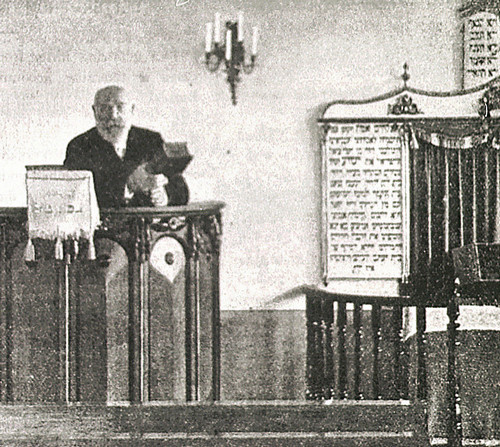
Funds for the building "Somerville Hall", were obtained from a group of Scotsmen. It looked a little like a church, became the venue for the service of the "Israelites of the New Testament ". The advent of a permanent building for Rabinowitz to preach sparked a new surge of interest in his teachings. How many people came to hear Joseph Rabinovich? The auditorium was designed for 200 people, and at first there were not enough seats, people were standing. But it wasn't always like that. The congregation did not have the means used by many other religious missions to attract people- dispensaries for poor .
page23
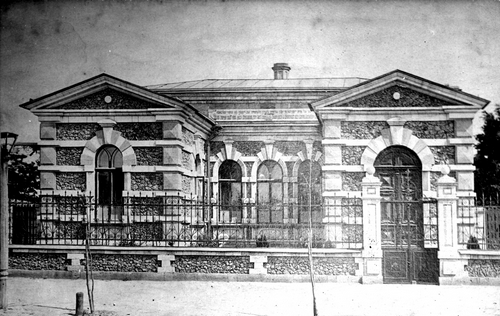
There was no organ and no choir. People came only to listen to the preacher, who spoke Yiddish. Many came out of curiosity, some to gather information against Rabinovich. The number of his followers cannot be judged by the number of visitors. Obviously, they were few, and their number was not growing, but shrinking. But the popularity of Joseph Rabinovich in Russia and abroad was much higher than that of other Jewish preachers. He received a large number of letters both supportive and critical. Jewish newspapers all over the world reported on him. Russian intelligentsia cared about the Jewish question, as testified by V.S. S. Sologuev, V.V. Rozanov and L.N. Tolstoy.
Joseph's activities were mainly confined within the walls of the house of prayer. He rarely visited his parishioners, but there were occasional visits. In 1888 he conducted Bible studies in his house, and in 1891 Bible reading was held on Tuesdays
page24
. Joseph planned to open a school in the community, but did not get permission from the authorities. He had a small printing press donated by Scottish brethren, through which he and his associates distributed the New Testament in Yiddish, Hebrew and Russian, as well as Rabinowitz's sermons. He was assisted by one of his parishioners, R.F. Feinzilber, who from 1890 became his constant intercessor. Joseph's children also helped out. In 1894, together with his son Ivan, they visited the poor people who came to his service. Upon hearing of Rabinovitz's coming, the neighbors gathered, and Joseph prayed with them. In the same year together with his son Peter they went to Kherson, Kiev and Kremenchug to preach among the Jews. The youngest daughter Rachel and eldest son Vladimir helped the most. In 1892-93, on the recommendation of Rabinovich, Mission Mildmay hired his son-in-law Joseph Axelrood to distribute religious literature in Odessa and southwestern Russia. Axelrood's work was short-lived, and he died in 1893. According to the philosopher V. S. Solovyov, "One should not be surprised that Rabinowitz's preaching was not a great success, but that it was nevertheless a success ". Most Jews find it difficult to betray their ancestral faith and to acknowledge Christ. The attitude of the Christian world towards them - restrictions on their rights, anti-Semitism in everyday life, and pogroms - was psychologically and morally unforgivable. Those who were ready for Christian forgiveness and came to the community of "Israelites of the New Testament" faced an insoluble dilemma: they could not receive baptism with Rabinowitz, but after baptism in a Lutheran mission or any other Christian church, they had to leave the community and became parishioners of those churches.
page25
Joseph Rabinovitz's opponents accused him of being bribed by foreign Christian missions. V.S. Soloviev, who met Rabinovich many times and dedicated his work "New Testament Israel " to him, had no doubts about his perfect sincerity. Rabinovich's biographer K. Kier-Hansen also refutes accusations of Joseph's mercenary motives. Before converting to Christianity, Joseph's financial situation was much better than that of the majority of the Jewish population in Russia. His income from the practice of law allowed him to build a house with six spacious rooms in Kishinev in 1873. In 1884, when he publicly announced a change of faith, his practice was reduced. From then on, he began receiving help from abroad. The first funds came from England, from the Mildmay Mission, followed by support from Jewish missionary organizations and private sponsors from other countries. From 1887, when the London Council for Rabinowitz was formed, all money collected from organizations and individuals passed through the Council. In addition to the London Society, committees appeared in Edinburgh and Glasgow, to raise funds from private donors. The annual budget, which included maintenance costs, the money for Joseph Rabinowitz's family, paying his assistants, printing and distributing his sermons and pamphlets, amounted to about £500. After Joseph's death, the London Society used the remaining money to help his orphaned family.
page26
After converting to Christianity, Joseph traveled frequently abroad, where there were many Jewish-Christian communities. In the winter of 1886-1887, he spent a month and a half in England as a guest of the Mildmay Mission. He attended many meetings, met people and gave presentations on his work. He was not always well received. The meetings of 8 and 15 January were on the verge of a riot, so Joseph left them under police guard. From London he went to Scotland, where he addressed several meetings in Glasgow and Edinburgh. During his time in Britain, he made a most favourable impression on all Christian-Jews in contact with him. Modesty, gentleness and childlike openness mingled with energy and inner fire as he spoke of Jesus and quoted from the Gospels. A key outcome of his talks was the creation in Scotland of a committee to support Rabinowitz's work and the London Society for Rabinowitz.
On the way home, Joseph spoke in Leipzig at the Institute of Jewish Studies.
On his second trip to England and Scotland, in the autumn of 1889, Joseph did not return empty-handed. Scottish sponsors had promised to provide funds for the construction of a house of worship for the Kishinev congregation. As early as 1887 Joseph Rabinowitz purchased a parcel of land adjacent to his home in order to have it built. In May 1890, the first stone was laid and by the end of the year, Somerville Hall was completed.
Accompanying Joseph on this journey was his youngest daughter Rachel, who stayed in Edinburgh for two years at the Deaconess School. On the way back from London, Rabinowitz stopped in Paris where he attended two meetings.
A special event for the whole family took place in October 1891, Golda was to be baptised. By this time all of Joseph and Golda's children had already been baptised, the daughters, in the Hungarian city of Budapest in 1887.
page27
Golda was baptised on 5 October 1891 by a pastor of the Free Church of Scotland, working in Budapest.
The third trip to England and Scotland, the shortest, just two weeks, took place in early 1893, when Joseph came to negotiate with the London Society. He surprised everyone by speaking for the first time without an interpreter. He had attempted to speak English before, but unsuccessfully. Now he had mastered the language well enough to read letters and speak.
In the summer of 1893, Joseph spent 35 days in the USA at the invitation of the renowned evangelist Dwight Moody and with financial support from the London Society The purpose of the trip was to pray with the Jews during the Chicago International Exposition. He also wished to see how the Jews immigrated to America. His impressions were most unfortunate.
He last went to England and Scotland in 1896 and spent about a month and a half there from May 18 to the end of June. He was accompanied by Rachel. Joseph spoke at the General Assembly of the Free Church of Scotland and other church meetings. On his way back, he and his daughter stopped in Berlin to see the Berlin Exhibition.
page28
Editions of the Bible in various Yiddish dialects were being prepared. Rabinowitz had to edit the text of the Bible translated into Yiddish according to the dialect spoken by the unsaved Jews. This work took several years. 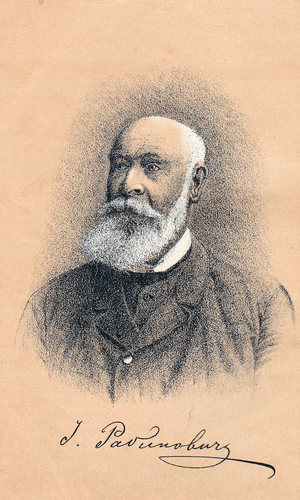
On March 6, 1899 Joseph wrote of his illness, indicating that editing was nearly complete. While receiving medical treatment in Merano and later in a sanatorium in Odessa, he continued to work two hours per day but did not finish the editing. The book was only published after Joseph's death in January 1901.
In 1896, Joseph announced a project to move his work to Jerusalem to establish a school or youth work center there, free from the dominance of any of the existing Christian churches. He argued that the spread of the Messianic movement in Jerusalem would convert the Jewish nation into a Christian nation, preserving its national identity. The project found no support and was shelved. All the more so because Joseph had been given other work to do at the time. A project proposed by Joseph in 1897 to use the railroad for the spread of the Messianic movement remained unrealized. The plan was to build a special wagon to house the preacher and store religious literature, and, with permission from the authorities, travel in it through southwestern Russia, stopping on reserve tracks, distributing the Bible, and preaching to the Jewish population. The idea was not new. American Baptists had already equipped three "evangelical" trains and were about to build a fourth. The approximate budget for the construction of such a car, calculated by Joseph's eldest son Vladimir, an engineer,amounted to £540 .
page29
Rabinovitch's project was supported. Fundraising began. But the leadership of the Mildmay Mission decided to postpone it until the Bible publication was completed.
Joseph was only 60 years old. There were many plans, but as he grew older he thought more and more about death. He had a large family in his care: a wife, younger sons who were students, and three daughters, two of whom were unmarried and one was widowed. Their future had to be taken care of. On 1 December 1897 Joseph Davidovich drew up a will, which detailed how to divide the inheritance. The cash remaining after the funeral and the installation of the monument, was to be received by the female half of the family: the wife and married daughter Sara, 500 rubles each, and unmarried daughters Rebecca and Rachel, 1,000 rubles each. Thereafter, all seven heirs, including the three sons, divided the movable and immovable property in equal shares. In the event of disagreement, the heirs were to settle disputes by a vote, in which the sons each had a vote and the wife and daughters each had half a vote.
It was particularly important to give instructions on the order of paperwork and funerals. In pre-revolutionary Russia, the registration of births, marriages and deaths was handled by the church. But after his baptism Joseph left the rabbinate but did not join any of the Christian churches. In this case a death certificate could be issued by the police. The will stated that immediately after death one had to go to the local police station. The funeral was to be carried out according to local Christian procedures. Joseph did not want unnecessary ceremonies and asked that only his children attend the funeral. The coffin was to be placed in one of the niches of the family vault he had built in the cemetery of the New Testament Israelites, a niche in which he had placed the Hebrew Gospel during his lifetime.
page30
It was only a year and a half before his will was fulfilled. In the autumn of 1898 Joseph suffered from malaria, which made him very weak. On 23 January 1899 he held his last service at Somerville Hall. In March he became worse and on the advice of doctors he went to Merano, for treatment, to a spa town in South Tyrol, accompanied by his daughter Sarah. He had no hope of returning and before he left he gathered the whole family together, blessed everyone and told them where his will was. The air of Merano briefly improved his condition. On 22 April Joseph returned to Kishi. As his son Ivan later wrote, returning to a city where malaria was rampant was a fatal mistake. His father became worse and Sarah and Peter took him to a sanatorium in Odessa, where he died at one o'clock on 17 May 1899.
page31
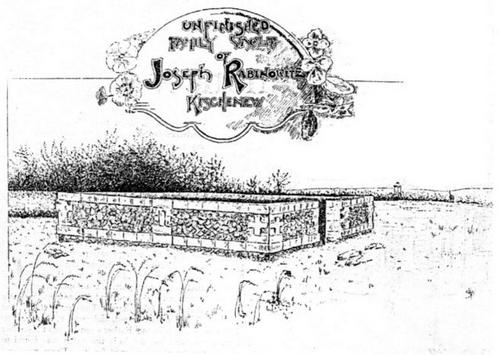
The next morning, the coffin containing Joseph Rabinowitz's body, accompanied by Pastor Kornman of the Reformed Church, was transported to Kishinev and placed in Somerville Hall, where a memorial service was held. In accordance with his will, Joseph was buried in the family crypt built during his lifetime in the cemetery reserved for the New Covenant Israelites outside of town, next to the Karaites' Jewish and Armenian cemeteries. The crypt consisted of eight compartments, with Joseph’s occupying the first. On the tomb was inscribed
"An Israelite who believed in JehovahThe grave has not been preserved.
and his anointed one,
Jesus of Nazareth, King of the Jews.
Joseph, son of David, Rabinowitz. "
Joseph Davidovich did not leave a successor, although in the last years of his life this issue was discussed many times. After his death, there was no one willing to continue the work he had started. It may seem strange that none of his sons followed in his father's footsteps. They shared his views, were baptized, and helped in his work, but none of them became preachers. All of his sons left for study in Petersburg or Moscow after graduating from a grammar school or high school. When Joseph converted to Christianity and began preaching his doctrine among the Jews, his eldest son Vladimir was already an adult, working as a railway engineer in Ungern. The father had to rely on the younger sons, Ivan or Peter, who were baptised as teenagers. But they were in grammar school and did not have the deep religious feeling and interest in holy books that Joseph had from his childhood. Understanding this, their father helped them to be educated according to their inclinations and choices.
page32
After Joseph's death the small group of his supporters broke up. The reason for this was not so much the absence of a preacher as the conditions under which the New Covenant Israelites prayer house existed. We can agree with Kai Ker-Hansen that any, even the best preacher, who continued Rabinowitz's work could only postpone the collapse of the community, not save it. For 13 years Somerville Hall stood unused. Only in November 1912 the Mildmay Mission renovated the house of worship and reopened it. However, permission from the authorities to hold Messianic sermons could not be obtained. In 1913. Somerville Hall was leased to the Evangelical Christian Community. In 1917 the building was put up for sale, and in 1921 it passed into private hands. According to L.N. Tolstoy, the teachings of Joseph Rabinovich had no future. But more than a hundred years passed and the Jewish Messianic community revived in Kishinev. Now it is called "Bnei Brith Hadasha", or translated from Hebrew as "Sons of the New Testament". Its founders remember Joseph Davidovich, who was the originator of the Messianic movement in Kishinev, and publish his proclamations. There are Messianic communities in Moscow, Ukraine, Belarus, Latvia, Israel, Germany, the United States, and many other countries. So the cause of Rabinovitz great-grandfather, lives on.
page33
Olga (Golda) Danilovna Rabinovich (1839-1913)
What do I know about my great-grandmother? Almost nothing. She was in the shadow of her famous husband, and all the references to her are connected only with him. The most important thing in her life was her family, her children, her home. For the sake of her family, she took the courageous step of abandoning the faith in which she had been brought up and followed her husband and children and adopted Christianity. It is safe to say that her life was a success. She lived 74 years, was surrounded by a friendly and loving family, and had prosperity and well-being in her home.
Golda was born in 1839 in the county town of Orheev, owned by the landowner Princess Elena Hangerli.
From various records it is possible to reconstruct the names and dates of Golda's family from grandfather Elia Gershkovich Goldenberg (or Goldenbark) (1774-1840) and grandmother Bailey (b. 1795), her parents - father Daniel Eliovitch (b. 1817) and mother Sura (1818 - between 1854 and 1859). In addition to Golda, Daniel and Sura had three other daughters, Nehama, Rehma and Bryana, and a son El, who died at the age of ten. Sura died at the age of about forty, and Daniel married again to the thirty-five-year-old Hava.
page34
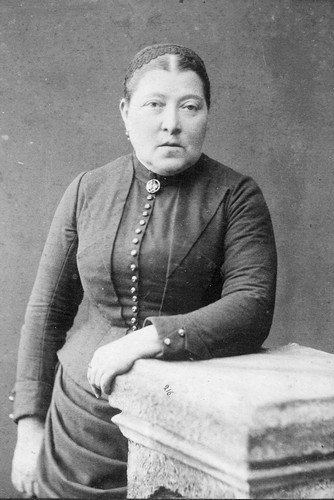
Golda did not have to live with her stepmother; she was already married. In July 1853 she was betrothed to Joseph Rabinowitz, who was a year older than she was. They may have known each other, but matchmaking was a matter for the parents, and the feelings of the children were hardly taken into account. In December 1854 they were married. According to tradition, Joseph moved in with the Goldenbergs for the first year and a half of their married life together. Given the young age of the newlyweds, this was quite reasonable. Joseph was a man of letters and his interests did not change with his marriage. Golda's chief concern was children. She gave birth to seven. Their first child, Haim-Wolke was born on September 13, 1856, followed by Sarah in 1857, Rebecca in 1866, Rachel in 1869, Tikva in 1870, David in 1874 and Nathan (my grandfather) in 1876. If you look at the birth dates of the children, you can see that there was no addition to the family between 1857 and 1866. Rebecca was born nine years after Sara's. This is due to the unfortunate events (the fire and the death of the Tikva) described above. Over the next ten years, life began to improve becase of Joseph's legal practice
page35
In November 1871, the Rabinowitz family moved to Kishinev, settled into a rented house in the town. The death of little Tikva was a great shock to her mother. Life nevertheless followed its course. Joseph worked hard. The older children were growing up and Haim-Volke had left for study in Petersburg. Immersed in domestic cares, Golda was scarcely aware of her husband's thoughts and actions. What totally surprised her was the spiritual upheaval that Joseph underwent after his return from Palestine in 1882. Raised in an Orthodox Jewish family, she could not agree with her husband's new ideas, but could not argue with him either. When Joseph was baptized, Golda bitterly lamented that such a learned and respected man of the Jews had bowed his knees to the despised Jesus of Nazareth. She felt deeply for the children who had followed their father and been baptized. Several years passed before Golda herself took the step. This important event for the whole family took place in Budapest in 1891. The city was not chosen by chance. Rachel had been sent to Budapest for a year after the two years in Edinburgh. Joseph and Golda wanted to see how their daughter would settle in, but the main objective was the baptism of the mother.
The sacrament took place on October 5, Golda received the name Olga, the same day Joseph sent a telegram to the children from Budapest to Kishinev. It contained only two words in Yiddish: "Mama gerettet" (Mama is saved). The atmosphere in the Rabinowitz household is testified by Samuel Wilkinson who stayed with them during his trip to Kishinev. He writes about the hospitality of the hosts, the evenings spent with the family. There was a wife and three daughters at home, English hymns were sung in the evenings, Samuel played the piano and Joseph played the violin.
After her husband's death, Golda Danilovna was left to live with her daughters in the family home. With the loss of the breadwinner there was nothing to live on. Only her eldest son Vladimir, who worked on the railroad, had a steady income. But he lived in another city and had his own family.
page36
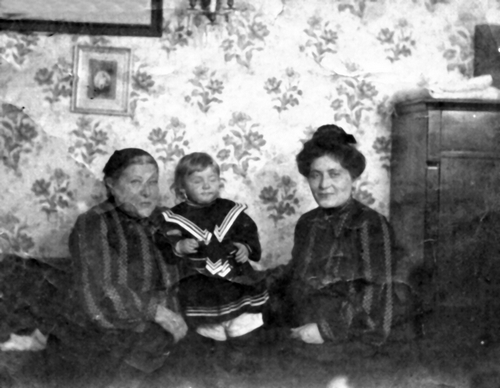
The younger sons Ivan and Peter were students and needed help themselves. A report about the plight of the Rabinovitz family and an appeal to wealthy people to help the widow and children, was published in the Mildmay Mission newspaper. Money began to arrive from Joseph's foreign friends and comrades-in-arms. Somerville Hall remained the property of the family, despite the fact that it was built with money borrowed from Joseph's Scottish friends. In 1903 the debt expired, but was not claimed by the creditors. There was discussion about Mildmay Mission renting the building to use it as a house of worship. The lease would have been a help to the family and a joy that Joseph's work was continuing. But it didn't work out. It took another 11 years until Joseph Rabinowitz's property was deemed free and clear of liens by the courts.
page37
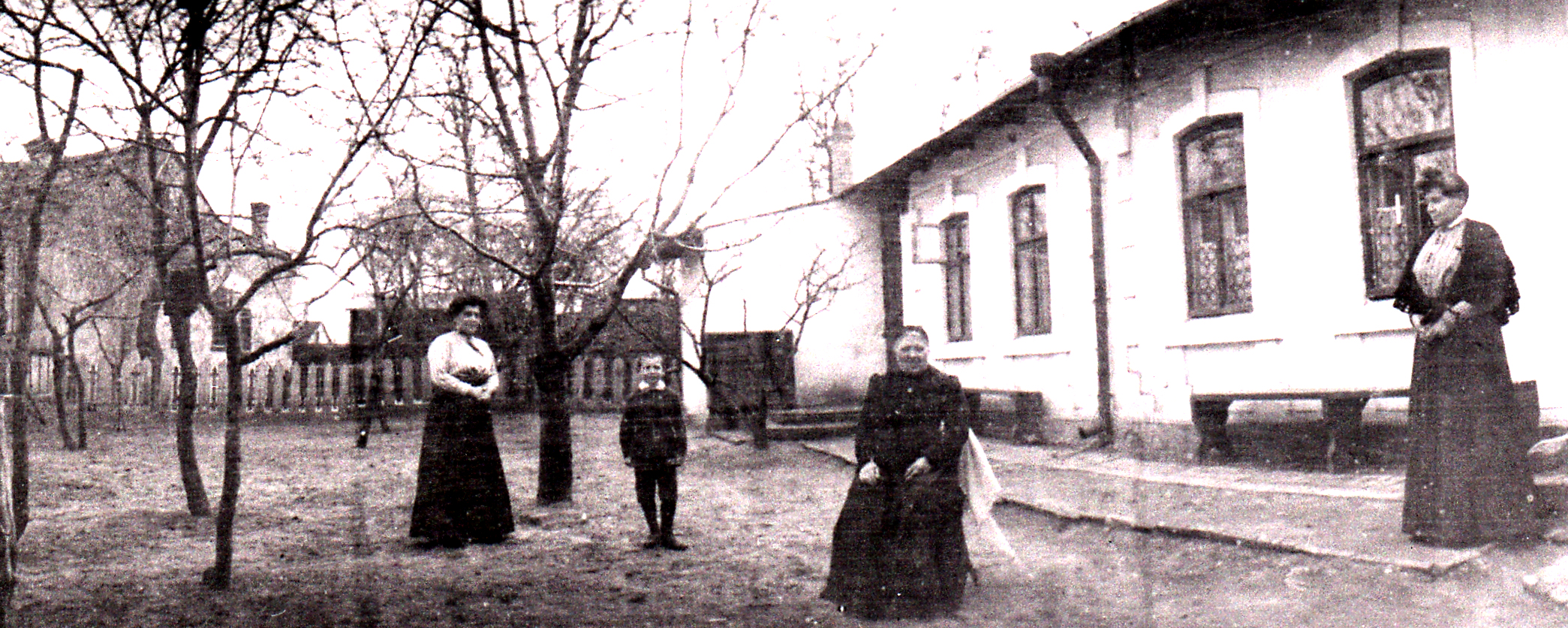
In April 1903 the Jewish population of Kishinev experienced terrible days. On April 19, the first day of Passover, a pogrom began. Shouting "Christ is Risen Again", pogromists burst into the homes of the Jews, smashing and looting their shops, beating men and women and throwing children out of the windows. The pogrom was triggered by P.A. Krashevan's articles about the brutal murder of fourteen-year-old Mikhail Rybachenko, allegedly committed by Jews for ritual purposes. The murder was described in grisly detail, which aroused a desire for revenge. All the more so because the only daily newspaper in Kishinev, Bessarabets, had been waging an anti-Semitic campaign long before the pogrom. It appeared that the boy had been killed by his relatives, but the Ministry of Interior forbade the publication of materials about the case and the slander was not publicly refuted. The police did not intervene. In two terrible days 47 people were killed, 92 were seriously injured, 700 homes were destroyed, 600 shops were looted and 2000 families were devastated.
page38
The Rabinovitz family was not hurt, but was frightened. A few days after the pogrom, S.H. Wilkinson and P. Wolf (a missionary living in Odessa and receiving funding from Sweden) came to Kishinev and brought money to help the victims of the pogrom. A small amount was given to the Rabinovich family.
Testament
In July 1908 Olga Danilovna made a will. She owned at that time one-seventh of the real estate inherited from her husband. The will required that part of the house and the money left after her funeral be divided equally among her children. Wherever she died, she wanted to be buried according to Christian rites in Kishinev in a crypt next to her husband and an inscription quoted from Psalm 22 of King David:
If I walk through the valley of the shadow of death,One phrase in the extract from the deed book of Kishinev notary P.P. Zalevsky, who executed this will, was unexpected for me: "This will at the personal request of illiterate Olga Rabinovich was signed in our presence by the nobleman G.M. Benkevich.
I will fear no evil, for Thou art with me;
Thy rod and Thy staff they comfort me.
Amen
page39
None of her autographs have survived. One explanation remains: Olga Danilovna's native language was Yiddish and she probably could not write in Russian.
The last years of her life Olga Danilovna lived together with her daughters, unmarried Rebecca and Rachel, who returned to Kishinev after the birth of her son Andrew. Of great concern was the deteriorating health of her eldest son Vladimir. His early death hastened his mother's passing. Olga Danilovna died on December 13, 1913 and was buried next to her husband.
page40
The story of the Rabinovitz family would not be complete without the stories of their children and grandchildren. There were six children, the youngest , my father was born in 1915, and nine grandchildren. All except my grandfather Peter, and his children will be discussed here. Separate sketches are written about them. The children of Olga Danilovna and Joseph Davidovich had different lives, they were scattered in different cities and countries, but they preserved warm and close relations for the rest of their lives.
Vladimir (Chaim-Wolke) Josephovich Rabinowitz
Chaim-Volke (Vladimir's birth name) was born in Orgeev on 13 September 1856. When he was three years old his house and all his belongings burned down and the family became poor. It is likely that the young family was sheltered by Golda's parents who lived in the same town. So Chaim-Wolke's early childhood was probably spent at his grandparents' house. Gradually his father Joseph managed to get back on his feet. The family income was sufficient to provide the only son so far with a good education. In 1871 the family moved to Kishinev and Chaim-Volka was admitted to the Kishinev Normal School, which opened in December 1873. There were four classes in the main branch and an additional mechanical-technical class.
page41
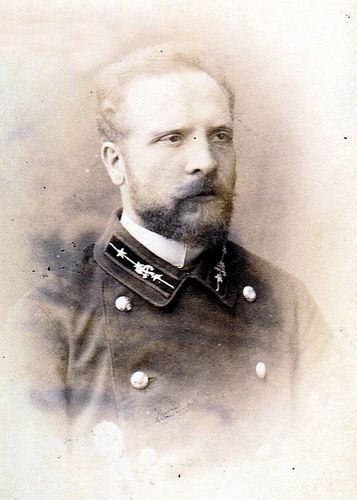
In 1876 Chaim-Wolka turned 20 and was due to join the army. But he was lucky - at the recruitment process he was granted an exemption from military service and enlisted in the militia. He was therefore able to continue his studies. Haim-Wolke entered one of the best technical colleges in Russia - the Alexander I Institute of Railway Engineers. In 1883, having completed a full course at the Institute, he received the title of civil engineer with the right to perform construction work and the right to the rank of provincial secretary on joining the civil service. Chaim-Wolke's first job was with the Belgian Joint Stock Company of the Odessa Horse and Steam Railways. He spent three years in Odessa, where he was engaged in constructing the city transport network, and then was appointed assistant chief of the section for repair of buildings in the Society of South-Western Railways with a salary of 1200 roubles per year and moved to Kiev. Between Odessa and his appointment in Kiev the most important event happened in Chaim-Volke's life, on 23 August 1886 he was baptized in St. Petersburg French Reformed Church, and given a new name - Vladimir. It was just a year and a half after his father was baptised.
page42
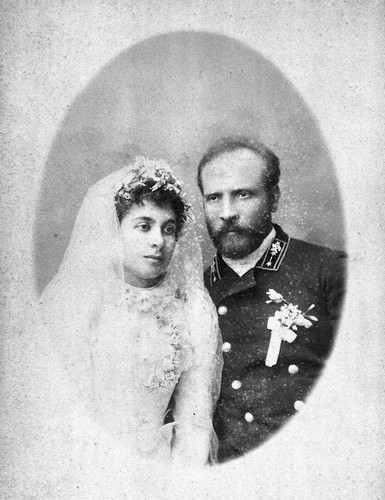
1856 - 1913
In February 1990 Vladimir was transferred to Ungheni as assistant head of the railway. It was a village on the border with Romania with a population of about two thousand, which began to develop rapidly after the construction of the railway. On October 4, 1892 at the age of 36 Vladimir married the 19-year-old daughter of the merchant Julia Avanesovna Dragunova, of the Armenian Gregorian faith. The family settled in the town of Bila Tserkva on Smolyana Street in the house of Herczyk. On 9 August 1893 Vladimir and Julia had a daughter, Victoria and on 18 July 1897 a son, Alexander. The children were baptised in the Kishinev Evangelical Lutheran Church. The family grew and expenses increased. Vladimir began to clamour for an increase in position and salary and a transfer to another station. As the years passed, Vladimir gradually rose from the 12th civilian rank to the 8th: in 1897 - collegiate secretary, in 1898 - titular adviser, in 1902 - collegiate assessor, which in the army corresponded to the rank of major. However, moving up in the table of ranks, he remained in his former modest position of assistant chief of the station.
page43
He repeatedly applied to the Railway Administration for a transfer to a new position. In the autumn of 1898, he got his chance - a vacancy had opened up on the Kharkov-Nikolaev Railway. Vladimir had taken three weeks off for a trip to St. Petersburg. He received a copy of the service record at his workplace and the job went through the chain of command. The Chief Inspector of the Ministry of Transport reported Rabinovitz's application to the Minister. The Minister was ready to support him, especially as not all of the section chiefs had the appropriate education. The inspector wrote a letter to V.A. Myasoedov-Ivanov, head of the Railway Administration. The letter was on ministerial letterhead, but its content was far from formal. It said that the engineer Rabinowitz was a Jew who had converted to Christianity with his entire family, "having lost touch with Jewry, he evidently has not managed or has not been able to make friends among his Christian co-workers and needs some support from his superiors". According to the Inspector, Vladimir enjoyed the patronage of the late D.I. Zhuravsky. This correspondence resulted in a letter from the Ministry to the head of the Kharkiv and Nikolayev Railway, supporting Engineer Rabinovittz's request. Encouraged, Vladimir travelled to Kharkov in February 1899. However there it turned out that there was no vacancy for him and it was not known when he would get one. There was some small consolation in the promise of a job as soon as the site manager's position became available. However, eight months had passed since his trip, and the letter from Kharkov had not arrived. During this time he had lost his father, to whom he was very attached.
page44
A further letter from Vladimir, sent to the Inspector of the Ministry of Transport in September 1899, is full of despair. He describes himself as a "battered and forgotten engineer". He asks for help to get out of this "damned island" and writes that he is capable of more varied and independent activities than that of an assistant section chief. For the sake of his family, he is prepared to accept the post of Section Chief or another suitable post on any road within European Russia. The Ministry enquired with the Chief of South Western Railways about the moral and service qualities of Engineer Rabinovitz and the possibility of his promotion. The reply left no hope: "The moral and service qualities of Engineer Rabinowitz are satisfactory, but as for his promotion to a higher position, this cannot be done on the South-Western Railways. Repeated appeal from the Ministry of Foreign Affairs The fact that there were no vacancies for the head of the railway section did not bring the desired result either. Vladimir worked as an assistant section chief for the rest of his life. We do not know why Vladimir's career was not successful. But it is clear that the situation in which he found himself was burdensome. The monotonous job, the lack of money, the absence of any perspective in life, and the social isolation was having devastating effects on his health. The first symptoms began at the age of 35. They began to worsen in early 1900. In March, Vladimir submitted a report requesting six weeks' leave and a cash allowance for medical treatment. The report was accompanied by the medical board's conclusion that Mr. Rabinowitz, 43 years old, "suffers from degeneration of the posterior columns of the spinal cord in the initial stage" and needs to be treated with hydrotherapy and electricity. He received a leave of absence, but the treatment didn't help.
page45
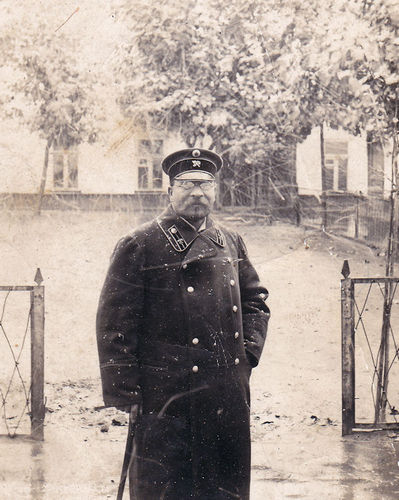
The illness progressed. He was examined by a medical committee in 1901 and 1902. The complaints remained the same: Lower back and leg pain and general infirmity. In 1902, Vladimir again received six weeks' leave and a medical grant. His treatments had continued, but the illness had not abated. A report of the medical board in 1911 stated that he had been suffering for many years from an unknown cause, complaining of intermittent pains from the lower back to the toes, general weakness, rapid fatigue, heaviness and headaches in the evenings. In May 1912. Vladimir has requested leave for 4 weeks for urgent domestic circumstances. It is possible that his mother had fallen ill. Vladimir has only received 2 weeks holiday which he has not used in full - he left for Kishinev on the 27th July and returned on the 4th August. The following year Vladimir requested 6 weeks sick leave for treatment abroad but only received permission for 2 weeks. This was not enough time to travel abroad and undergo a full course of treatment. Each year his health deteriorated.
page46
Doctor's report dated 5 August 1913 stated that Vladimir Iosifovich Rabinowitz "suffers from arteriosclerosis of the tangible arteries, frequent attacks of heart palpitations, chronic articular rheumatism of the lower limbs and haemorrhoids. These seizures are accompanied by frequent headaches and general malaise. In order to cure these illnesses it is necessary for him to undergo radical treatment and to abstain from all mental and physical work. But he was not given leave for treatment and could not leave his job. On October 24, 1913. Vladimir Iosifovich died suddenly of a ruptured heart at the age of 58. He was buried in Kishinev in the family vault next to his father. Julia, who was left with two children, was given a pension of 181r. 25 k. per annum from the emeritory fund of the railway engineers. The sum was miserable, and it was impossible to live on that money. During the last five years Vladimir's salary amounted to 2160 roubles a year, of which 720 roubles for salary, 720 roubles for rent, 360 roubles for canteen and 360 roubles for travelling allowance. Julia applied for a pension from the treasury. It turned out that Vladimir's seniority entitled him to a pension only for a reduced term of service.
The hassle about the pension lasted more than a year; we had to have the medical statement that due to health condition Vladimir was entitled to pension during his life, the certificate from the Bila Tserkva grammar school, confirming that her son Alexander was studying at his mother's expense, and also the certificate of Kyiv governor, that Julia had not lost her right to receive the pension. Whether the widow's efforts were successful, is unknown.
In 1916. Yulia Avanesovna moved to Kiev and in November 1918, five years after Vladimir's death, at the age of 44 years old she married the son of a provincial secretary, Matthew Josephovich Lisetsky, aged 29. The children were already adults.
page47
Victoria Vladimirovna Syrokomskaya
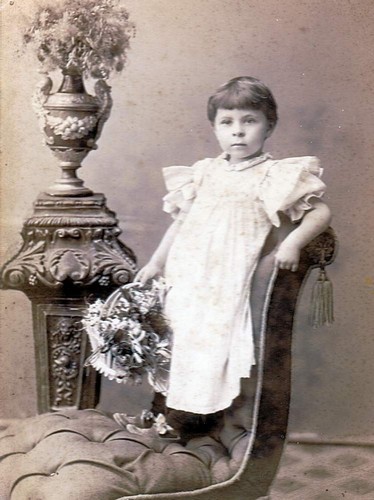
Victoria was born on 9 August 1893 and in September the same year she was baptised in the Evangelical-Reformed Church in Unghene. She is known to have graduated from the Kiev Conservatoire in piano. Since the Kiev Conservatoire was transformed in 1913 from the music school of the Kiev branch of the Russian Musical Society, it can be assumed that Viktoria received her initial musical education at the music school. It is known that after the death of Vladimir Iosifovich, Yulia Avanesovna and the family was in need, when she applied for a pension, enclosed a certificate stating that her son was studying in a grammar school at her expense, but who was paying for Victoria's Studies? None of her closest relatives, neither her grandmother nor her uncles were able to pay for her tuition. It is likely that Victoria studied at public expense, which means that she must have had outstanding musical ability.
On 21 April 1917 Victoria was re-baptised in the Sretenskaya Church in the Second District of Kiev and was anointed with the Holy Anointing, admitted to the Orthodox Greek-Russian Church. And two days later, on 23 April, she married the hereditary nobleman Nikolai Franzevich Syrokomski, aged 29.
page48
One year later, 7 April 1918, their son Vladimir was born.
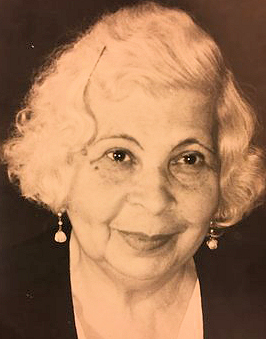
Nikolai worked as an engineer on the South Western Railway. While films were silent,Victoria was a pianist working as an accompanist in cinemas, and giving music lessons.In 1939 Nikolai Franzevich died.
When the war began, Victoria and her son were in Zhmerinka. The Germans were advancing so quickly that the city was captured on 16-17 July 1941, Victoria and Vladimir were in occupied territory. It was not until March 1944 that Zhmerinka was liberated by Soviet troops. In autumn 1945 they managed to return to Kiev. After the war, Vikcoria worked as a typist, and in the evenings she moonlighted as a music teacher.
I never saw Victoria, but I knew that my father's cousin lived in Kiev. I remember her son Volodya, who used to come to Moscow and stay with us. Victoria used to send greeting cards from Kiev for the holidays. The last one came after my father's death. Victoria passed away in 1971.
page49
Alexander Vladimirovich Rabinovitch
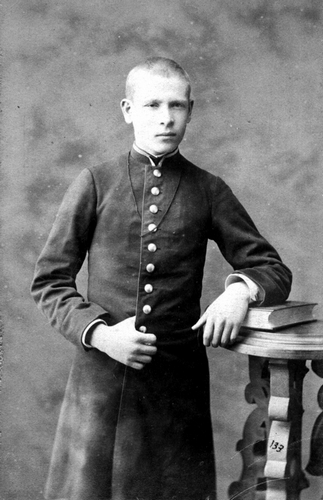
Alexander was born on 18 July 1897 in Ungheni, and was baptised in the Kishinev Evangelical-Lutheran parish. His aunt Rebecca Rabinovitz was present at the baptism. When his father died, Alexander was 16 years old and was studying at the gymnasium in the town of Bila Tserkva. His family was in need, so he had to work part-time in parallel with his studies. After graduating from high school in 1916 he and his mother moved to Kiev, where he entered University
In 1917 under the Provisional Government, Alexander was drafted into the army and sent to the front as a private motorcyclist.
At the end of the same year, a Soviet decree exempted him from military service as a student.
During the civil war, when power in Kiev was changing hands, Alexander joined the Jewish communist party Poale Zion (after the party disbanded in 1923, most of its members joined the Russian Communist Party but Alexander remained non-partisan).
Like his sister, Alexander was drawn to music. In 1920, he dropped out of university to attend the Lysenko Institute of Music and Drama. In 1923 he entered the Conservatoire, taking a class in composition theory. He wrote in his questionnaire that he earned his living through "Soviet service" and lessons. He worked most often as a statistician, and his jobs changed frequently.
He graduated from the Kiev Conservatory in 1925, but he felt his education was not enough to do what he wanted - scientific work. His path to science was long and arduous, but he made it.
page50
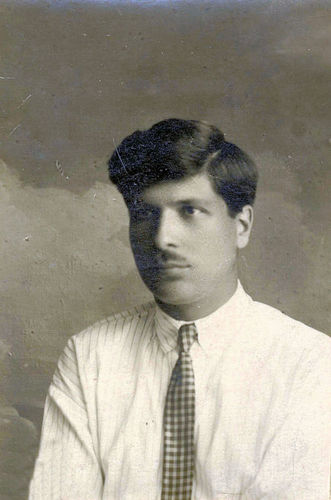
To continue his education, Alexander moved to Moscow. Here he had first and foremost, to find a job. Alexander joined the lamp factory as a statistician, and in 1926 the pencil factory of A. Gammer, where he worked until the autumn of 1928. He needed the money to pay for his studies and help his mother, who remained in Kiev. There he married L.D. Volpin, but the marriage soon ended and in 1928 Alexander re-married Fanny Yakovlevna (Freya Yankhelevna) Roitbarg. Fanny worked as a shorthand typist and interpreter for the Executive Committee of the MOPR.
In 1927 he enrolled at the Moscow Conservatory to study music acoustics at the Faculty of Composition Sciences. He completed the conservatory course in two and a half years, as some of the subjects he had taken at the Kiev Conservatory were relavent.
The tuition fee at the Moscow Conservatory was 36 roubles per year. Alexander applied for a reduction in the fees, as he had his wife and mother as his dependents, to whom he sent 15-20 roubles monthly to Kiev.
page51
In addition his earnings at the factory had been reduced due to the fact that he had to take time off from duty to attend classes at the conservatoire. The following year, however, tuition fees were raised to 64 roubles. This amount became unaffordable for Alexander, as the factory went through staff cuts in September and he was dismissed. The Conservatoire Commission had to release him from payment of tuition for half a year. After leaving the factory, Alexander found a job more suited to his specialty, but at a lower salary. He enrolled at the State Institute of Musical Culture as a research technician with a salary of 70 roubles, half the salary of the factory. In January 1930, Alexander graduated from the conservatory, by which time he had a number of published works, including a textbook on acoustics, adopted as a compulsory textbook for students of the Moscow State Conservatory. In 1930 Alexander enrolled for his post-graduate studies and went to work at the Moscow radio broadcasting centre (MRTU) as a director of radio broadcasting. However, the same year he was fired due to being late for work after his leave, and Alexander moved to the Moscow Sound Film Factory as a mixer and then an acoustician. He then worked in an acoustics laboratory at the Institute of Communications, did research, and in 1940 defended his PhD in acoustics. By this time the family had three children, Jacqueline (1931), Victor (1934) and Julius (1937).
page52
During the war, Alexander was drafted into the army. In his first year he was taken prisoner. Half-Armenian, half-Jewish, bearing the surname Rabinowitz, he only survived by miracle. He was saved by his profession - the Germans were interested in experienced specialists in the field of acoustics - and he was sent to a camp where he worked in his profession. After his liberation in 1945, the Allies offered him a move to the US, but Alexander returned to Moscow, where his wife and children were waiting for him. Almost immediately, a neighbour denounced him and he was arrested and sent to a camp in the Urals. His wife and children followed him. After Stalin's death he was amnestied, but the family did not return to Moscow. Alexander began to teach physics and mathematics at school. The years spent in the German and Stalinist camps undermined his health and he did not live long after his release. He passed away in 1961.
Sofia (Sarah) Josephovna Offenheim
Sara, the eldest daughter of Golda and Joseph, was born in Orhei Sara like all of Joseph's children received her father's teachings and was baptized with her sisters in the Reformed church at Rohrbach near Odessa on 4 October 1887. There is only sketchy information about the subsequent events in her life. She was married twice but had no children. There is a photograph of her and her first husband, Joseph Axelrud, dated 1879. We do not know where they lived or what her husband did for a living. The family was probably destitute. In one of her letters to her sister Rachel, Sophie mentions that in 1885 she went to went to work "on a milk co-operative farm".
page53
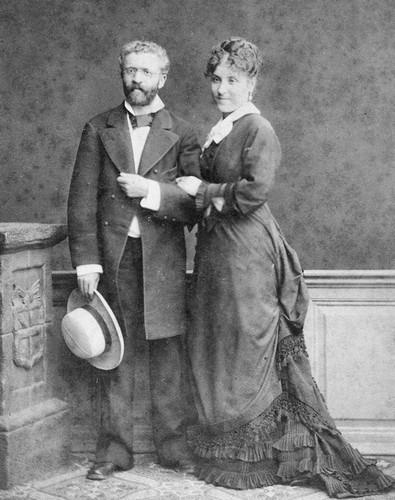
. In 1890 Joseph Davidovich arranged for his son-in-law to work as a representative of the Mildmay Mission in Odessa. Axelrud often travelled to neighbouring towns and distribute religious literature among the Jewish population. He died in 1893 during an epidemic of cholera. After her husband's death Sofia returned to her parents. She helped her father and was by his side until his last days. In March 1899 Sofia accompanied Joseph on a trip to Merano and after his return to Kishinev together with her brother Peter (my grandfather) they took Joseph to a sanatorium in Odessa, where he died.
Sofia's second husband was Ilya Offenheim from Kiev and in 1903 they became the adoptive parents (godparents) of Rachel's son Andrew, who was born and baptised in Moscow. Whether they were living in Moscow at this time or came especially for the baptism of their nephew is not known. In a letter to Rachel in 1937. Sofia writes that she had been living in the flat for 22 years. Was it her first Moscow flat? This means that she moved to Moscow no later than 1915. Her address is known: Tverskaya, Georgievsky Lane, 1, Bldg.22. It was here in October 1921 that Sofia's younger brother Peter stayed with her when he arrived in Tverskaya from Arkhangelsk in search of work. In January 1922, Peter moved his entire family to Moscow, he left his younger sons with his sister while the older ones helped their parents in their new home.
page54
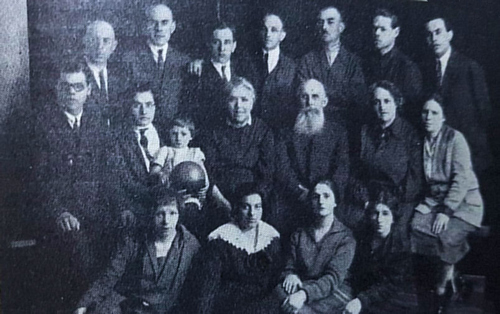
Moscow, 1928.
From Sofia's letters to her sister in England, we know that Joseph's children retained a very warm kinship. The family all gathered at Sofia's and Ilya's house for the new year celibration of 1926/7. There was brother Peter with his wife Glasha and younger sons, Pavlik and Rostik (my father), brother Ivan with his wife Mirra Kalistratovna. On New Year's Eve they wrote a letter to their sister Rachel in England, each adding a few words.
Sofia, the only one among all Joseph Davidovich's children, retained her connection with the Messianic movement. This is evidenced by the representative of the Swedish Jewish mission, B. Shapiro, who visited Moscow in 1928 and met Peter, Ivan and Sofia. According to Shapiro, the sons said that their father's cause lives on, there is a Jewish Christian group in Moscow, but they have no contact with it. They are far from Christianity and have no interest in religion. Sophia, on the other hand, was happy that God had heard her prayers and she had found fellow believers again.
page55
In 1932 Ilya died and Sofia was left alone. In one of her last letters to England, written on 20 March 1935, she wrote that she was growing weaker by the day but that she tried to devote all her mental and moral energies to go on living. She was 78 at the time. She was very ill, especially with her legs, for several months she was confined to her flat, as she lived on the third floor and could not get down. Her brothers helped her financially, but did not visit her often. They worked a lot. Peter brought food once a month. Everyday help was provided by neighbours in a communal flat. Rachel sent 10 shillings twice a year, which was a help. This money could be used to buy groceries at Torgsin. A lonely, sad old age. But her letters were full of warmth and love for her sister and brothers. She rejoiced over the successes of her nephews, brightened her loneliness by reading newspapers, proudly wrote about the success of the Spanish Republicans at Guadalajara.
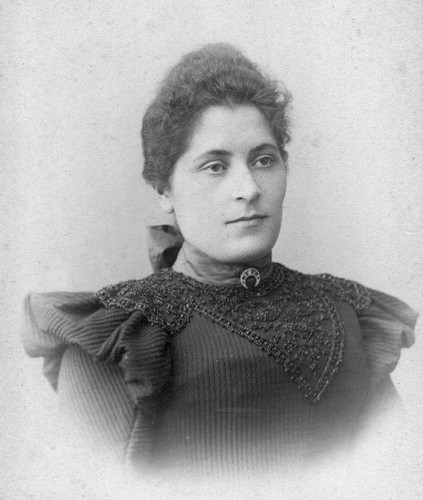
Rebecca Josephovna Rabinowitz
Rebecca Rabinowitz was born on July 20, 1866.in Orgeev and died on November 12, 1914 in Odessa from lung tuberculosis, briefly surviving her mother. She was baptised in the village of Rohrbach, Odessa County, Kherson Province October 4, 1887. Nothing more is known about her. She was unmarried and, and lived with her parents all her life.
page56
Rebecca did not leave a will and her estate was divided by the court between her brothers, sisters and nephews, children of her elder brother Vladimir. Rebecca's estate consisted of one-sixth of her parents' house at 20 Meshchanskaya Street and a deposit in the Kishinev City Public Bank. Altogether, 4,848 r. 40 kopecks. This sum was divided among five heirs.
Rachel Josephovna Kinna
Rachel was born on 1 January 1869 in Orhei. On October 4, 1887, she was baptized with her sisters in the village of Rorbach, Odessa County, Kherson Province. Where she studied is unknown, but when she went to England with her father in 1889, she already had a working knoledge of English and was able to help him. She was admitted to the newly opened Deaconess School in Edinburgh. This school was set up for women who wanted to serve in church parishes, work in overseas missions or be nurses. For several years the Deaconesses practised as nurses in the newly built Deaconess Hospital. Rachel's stay and training in Edinburgh was paid for by funds allocated by the Church of Scotland to the family of Joseph Rabinowitz. Accommodation and meals at school cost £1 per week. Rachel lived at the School for the first year and with a local family for the second year. After graduating from the School, Rachel returned briefly to Kishinev and then was sent to Budapest for a year. Her time at the School left indelible memories in Rachel's heart and had a huge impact on her later life. She became fluent in English which enabled her to assist her father on his trips abroad and to earn a living through teaching.
page57
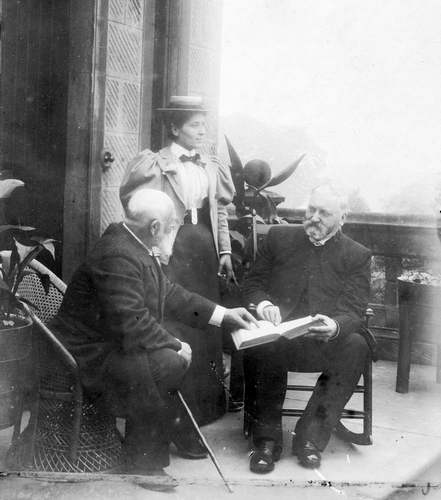
Rachel made a very good impression on A N Somerville, who visited Kishinev and was a guest of Rabinowitz. Somerville wrote: "his [Joseph Rabinovitz's] youngest daughter is a remarkably attractive and intelligent girl, she speaks English well and helped her father in conversation". After her Joseph's death, Rachel moved to Revel, where her younger brothers Ivan and Peter lived. There were probably more job opportunities there than in Kishinev. In Revel she began teaching English and Russian. Where and how she met the Scotsman John Kinna is unknown. It could have been in Scotland while she was studying in Edinburgh or in Revel where John was looking for a teacher of Russian.
page58
In April 1902 they were married. John worked in the Moscow branch of the American photographic materials company Kodak. He was 41 and Rachel was 33. On June 25, 1903 they had a son, Andrew. Shortly after his son was born John left for England and did not arrive in Moscow until mid-September. When he returned, Rachel and her young son went to Kishinev to stay with their mother. In fact she and John parted ways and further contact between them was reduced to letters, only two of John's letters survive. In 1906 one was addressed to Andrew, who was then 3 years old, and another in 1917 was sent to Revel.
Rachel moved to Revel in 1914 after the death of her mother. She and her son settled in the same house with the family of her brother Ivan. With the outbreak of the First World War, Revel became the base of the Russian Baltic Fleet. There were many servicemen and sailors in the town. Rachel began giving private lessons in English. Unexpectedly, among her pupils, who responded to an advertisement in the newspaper was a Japanese officer, who had arrived in Revel to escort heavy canons for the Russian army When the revolution broke out and the Provisional Government came to power in Petrograd, the country was thrown into chaos. Some Estonian political forces wanted autonomy within Russia, others hoped to gain full independence with the help of the German forces, radical parties grew in influence, and Bolshevik slogans gained in popularity. Prices rose, and life in the city became increasingly difficult. Rachel's archives include a letter from John received from Moscow on 26 July 1917. John complained of stomach problems and wrote that he would not be able to come to Revel: "After the visit of your brother I have been ill for about two weeks".
page59
Since correspondence between them was rare, it can be assumed that Rachel's address to John and her brother's visit to him were prompted by special circumstances. Perhaps it was about emigration to England. As for the brother, it was probably Ivan, with whose family Rachel was close and who was also about to leave Revel. The other brother, Peter, was at this time living in Arkhangelsk.
In September or early October 1917. Rachel and her son left Revel. They did so in a hurry, taking only the bare necessities with them, including a small wicker basket containing the family photographs.. Andrew told his son David that when they left they buried all their silver under the house
A certificate from St Peter's Normal School dated 7 September 1917, confirming that Andrew was a Year 5 pupil, and documents dated October 1917 confirming the sale of the house where they lived, have been preserved.
Their journey to London took about two years. They first travelled to Petrograd, where Rachel received a new passport on 17 October. From Petrograd, Rachel and Andrew may have stopped in Moscow, where John, Rachel's older sister Sophia and brother Ivan lived. Whether they met John is not known. In any case, John remained in Moscow, where he died of typhus in March 1920 .Their next stop was in Perm, where Nadezhda, brother Ivan's ex-wife, was living with the children. This is confirmed by a letter addressed to Rachel: Perm, Voznesenskaya Ploshchad, 35, sq.2, and dated 24 April 1919.
page60
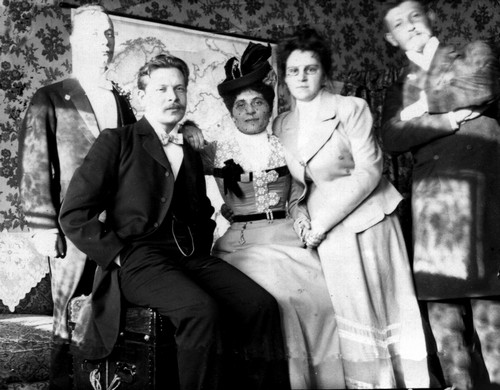
Perm, like the rest of the country, was in turmoil. The city changed hands: at the end of 1918 it was captured by A.V. Kolchak's army, in the early summer of 1919 the Red Army went on the offensive. The financial system was disorganised. After unsuccessful attempts to obtain money in exchange for the State Loan Shares, Rachel and Andrew travelled further East. They travelled by train in a crowded carriage. Many years later Andrew would tell his son David how his mother slept in the carriage on the floor, putting things under her head so they wouldn't be stolen, and that at the stations he would go to the engine for boiling water . Finally, on 30 August 1919. they reached Vladivostok. Rachel obtained a new passport and on November 1, 1919, she and her son managed to get on the steamer 'Monteagle' carring the 1/9th Hampshire Regiment, returning from Yekaterinburg
page61
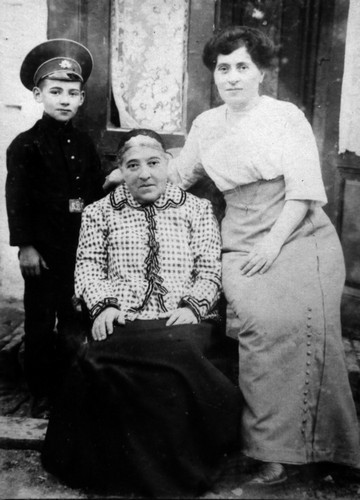
On 16 November the steamer docked in Vancouver, Canada. With the regiment, Rachel and Andrew crossed Canada by train, then boarded a ship and on 5 December 1919 arrived in Southampton. From there, their paths with the Hampshire Regiment diverged. Rachel and Andrew went to London.
Rachel and Andrew were given refugee status, given ration cards and had to find accommodation. Rachel wrote to John Kinna's brother, William, who lived in Tottenham, a district of London. But his family couldn't accommodate her and her son, they just didn't have the space. It was from William that Rachel learned of John's death.
Andrew entered an apprenticeship with an automobile firm in Glasgow in early1920. and for Rachel help came from the Mildmay Mission. In May 1920 an advertisement appeared in a magazine published by the mission: "We are looking for decently paid work for Mrs Kinna, daughter of the formerly well known Joseph Rabinowitz of Kishinev. She cannot do heavy work, but she is an experienced teacher of Russian and could be useful as a companion in a Christian home." Such a job was soon found. Harriet Loisa Green-Armytage invited Rachel to live in her home as a companion.
page62
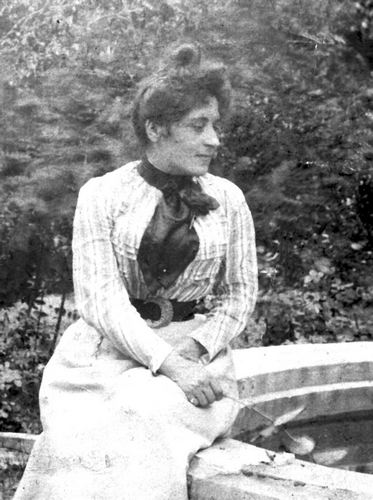
They had much in common, Harriet Louise was a lifelong deaconess at Mildmay Mission. At this time Rachel met and befriended Elisabeth Ivanovna Chertkova, the mother of Vladimir Grigorievich Chertkov, a close friend of Leo Tolstoy. Harriet Louise died 15 May 1925. During her lifetime she bought two plots of land at Wimborne Road Cemetery, one of which was destined for Rachel (1869 - 1937). Rachel received an annual allowance from the total amount left by Harriet Louise as well as most of her daily belongings. Life was not easy for her, but she helped her relatives in Moscow. With the shillings and pounds sent in, sugar, butter and other products not available in ordinary shops could be bought at the Torgsin shops in Moscow. When Andrew finished his apprenticeship he returned to London, Rachel moved in with him. For the last years of her life, she lived together with Andrew's family in their house in Bromley. This house was the birthplace her grandson David, who remembered his grandmother's black skirt and the book she read to him. Rachel passed away in 1937, leaving behind £244 - 1 - 8p.
page63
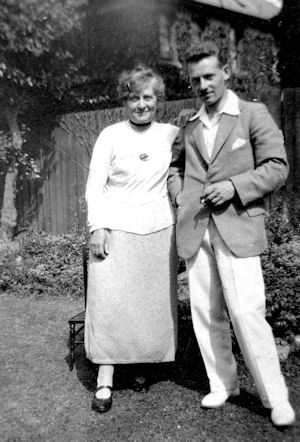
There were still two travelling trunks stored in the attic, with large white capital letters HLGA, which stood for Harriet Louise Green-Armytage. Most of the items belonged to Harriet Louise. The letters that Rachel received from Moscow from her older sister Sophia and her brothers have survived. Rachel wrote her last letter to Moscow on March 8, 1937, Her reply came a few days before her death. Rachel's most precious legacy is the family archive of photographs and letters, preserved during her long and arduous journey from Russia to England.
Andrew Kinna
Andrew was born on 25 June 1903 in Moscow and was baptised in the Evangelical-Reformed Church on 17 August the same year. The godparents,were his own aunt Sophia and her husband Ilya Offenheim. When Andrew was about a year old, his parents separated. His childhood was spent in Kishinev in his grandmother's house, where in addition to her and his mother lived his unmarried aunt Rebecca. Many years later, Andrew told his son David that There were six rooms in the house and they had a cook who he helped bake a kulich for Easter. Andrew went to school number 7 in Kinshinev.
page64
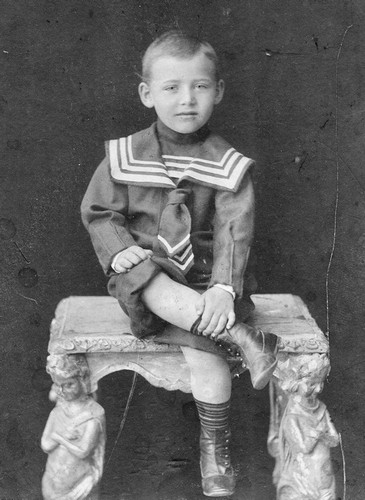
Andrew was 11 years old when, after his grandmother and aunt Rebecca died, he and his mother moved to Revel, where he enrolled in the Petrovskoe Real High School. He grew up as an athletic boy and was fond of drawing. A photograph of Andrew and his cousin Josef Rabinowitsch (Ivan's son) with Japanese Major Otoshi Takeshi with the inscription in English and Japanese: "Presented to dearest Mr Andrew. December 1915. Reval. Major Otoji Takeshi Japanese Army Artillery Brigade " Takeshi was one of Rachele's students and was a frequent visitor to their home. Andrey failed to graduate from the school in Reval. In September - October 1917, threatened by a German attack on Estonia, Rachel had to leave the town. After two years of travelling from Revel to St Petersburg, then to Moscow, Perm, Vladivostok and Vancouver, Rachel and Andrew reached London. Andrew was the 14 year old leaving Reval and the 16 year old arrived in London. The years were lost to schooling, but undoubtedly the journey was a school of life for Andrew. In England, mother and son's roads diverged. Rachel found work in London and Andrew moved to Glasgow, where he joined the Albion Motor Company as an apprentice.
page65
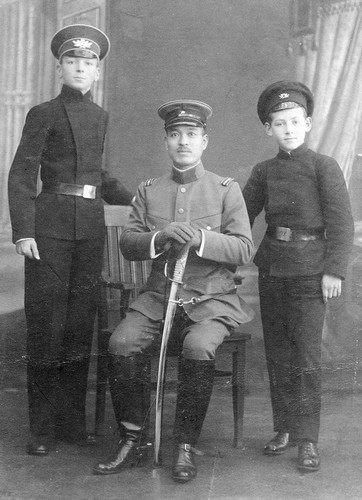
Major Otoshi Takeshi and Andrew
It's hardly.coincided with his plans for life, but in his position as a refugee he had no choice. Rather, Andrew's vocation was painting, which he had practiced since childhood. Among the few things he brought back from Russia were his paintings, painting in watercolor and oil. He continued his painting studies at the Glasgow School of Art. He had many hobbies - in the summer he went hiking, played in the brass band of the club on the euphonium (tenor tuba). He had a girlfriend, Emma, with whom his affair lasted for several years until in 1927 Andrew was transferred from Glasgow to Willesden London depot1 as an engine fitter. Andrew settled at 197 Brondesbury Park, Willesden. Rachel soon moved in with him. In his new job he met Doris Herring, who worked as a telephone operator. On September 27, 1928 they were married. That same year Andrew went to work at the Chiltonian biscuits factory. His duties were not directly related to the confectionery business; he had the responsibity for the maintaince of a fleet of about 20 lorries The young family, along with Rachel, moved to 16 Leyland Road, Lee Green, in London, and in 1932 they had their own new house in Bromley.
page66
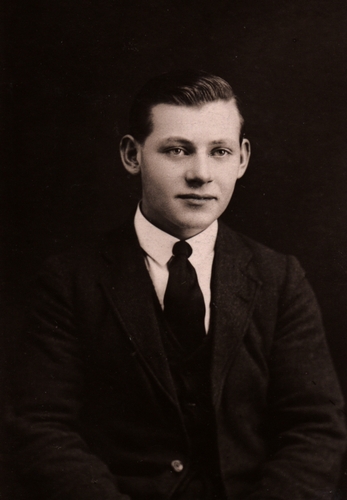
Andrew made his own wooden furniture for the new house, and took care of the garden. In 1933 Doris and Andrew had a son, David, and in 1937 Gordon.
During the war, Andrew was not called up for military service because he worked for a company supplying food for the army. Because he was considered a laborer, he received an increased ration of bread, butter, and cheese on a ration card. In 1943, he joined the local Home Guard and once a week, in the evening and on Sunday mornings, he went to classes. Andrew was a jack of all trades, at the end of the war he began making toy boats out of wood, necklaces out of colored knitting needles, polished caskets with secret locks, which he sold through the local store. He could tune a TV, fix a car. After the war, he completely repaired the house. Andrew tried to teach his sons Russian, but it didn't work out, the children were not interested.
Andrew was not religious, never went to church. He said he had been so "fed on religion" in his childhood and youth that it was enough to last him a lifetime.
page67
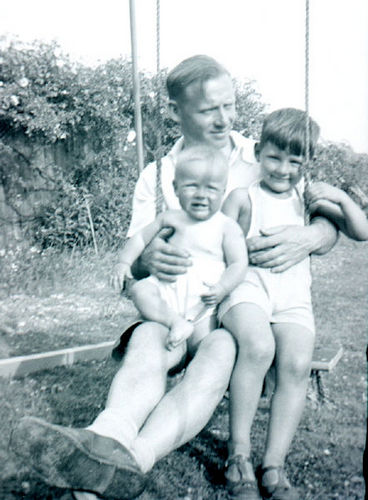
Only once. At the beginning of the war, as David recalled, his father got a Bible in Russian and began to read it aloud and translate it to his sons. Most likely he did this for himself, not for them.
At the end of 1950. Andrew became ill. The illness dragged on for almost a year, and he lost his job at the Chiltonian factory, where he had worked for about 20 years. After he recovered he changed jobs several times until in 1954 Doris decided that the only way to improve their situation would be to sell the house and buy a business. The choice fell on a post office with a second-floor apartment in Camberwell, a London neighborhood. In April 1955, the house in Bromley was sold and the family moved in. The first weeks were very difficult for Doris, as the postal bills had to be turned in every other day, and they usually didn't add up. Andrew found a job closer to home and often helped his wife. Gradually the postal business took off. They bought a car and started going abroad for holidays. But the prosperous life was short. On February 20, 1958. Andrew died suddenly at work from a heart attack, at the age of 55.
page68
Ivan (David) Josephovich Rabinovich
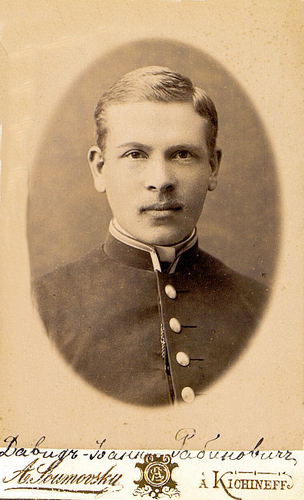
David was born on June 12, 1874. On November 14, 1888 he was baptized, in Odessa in the Evangelical-Reformed Church. and received the name John (Ivan), In many documents and on the photo caption he has a double name, David - John. In 1895, Ivan graduated from the 2nd Kishinev Gymnasium. The graduation characteristic noted his excellent behavior, good diligence, equal curiosity in all subjects. Most of his grades were "good," his German was "excellent," and in Latin and Greek - "satisfactory. The year Ivan graduated from high school, he was 21 years old and was to be drafted into the army. On October 15, 1895 he was supposed to go to the recruiting office, but in summer he enrolled in the History Faculty in Moscow University , where he specialized in history and philology.and received a deferment. The next year Ivan was joined by his younger brother Peter, who became a student in the Mathematics Department of the Physics and mathematics faculity In Moscow the brothers lived together, near the university. Ivan's personal file contains his Moscow address: Tverskaya Part 1, 128, B. Nikitskaya St., sq.1.
page69
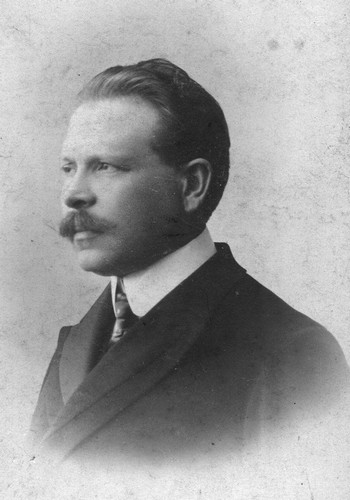
In 1899 Ivan received his second degree and returned to Kishinev. Graduation from university coincided with the death of his father. According to Rachel's testimony, Ivan was going to write a book about his father, "Joseph Rabinovich and His Work."
The book was not written, but the 1903 Mildmay Mission magazine reported that Ivan Rabinovich published an article about his father in Russian. Working on the book required time and the means to live. Neither of these was available.
In 1900. Ivan moved to Revel, where he got a place as a teacher of literature in the gymnasium of Emperor Nicholas . From 1905 to 1912 he taught Latin and geography in the Revelsk Alexander Gymnasium, and in 1913 returned to the Nikolai Gymnasium to teach ancient languages.
In 1901 Ivan married a biology teacher, Nadezhda Dmitrievna. April 4, 1902 they had a son, named after his grandfather Joseph, and August 24, 1903 daughter Vera.
page70
In 1917 The family broke up, Nadezhda and her children left for Perm, and Ivan left for Moscow, where his older sister Sophia lived and where his younger brother Petersoon moved with his family.
In the list of employees of schools in the Khamovniki district for 1918-1924. Ivan Iosifovich Rabinovich is listed as a teacher at School No. 5. From September 1923 he taught geography at the K. Marx Institute of National Economy. It is known that his daughter Vera came to him from Perm at least twice - in 1924 and 1925. When Ivan Iosifovich married for the second time is not known precisely. All we know is that it happened no later than 1926 and that his wife's name was Mirra Kalistratovna. After her death, Ivan married a third time to a young woman. Peter, in a letter to Rachel, wrote that his brother was happy.
When Ivan died and where he is buried is unknown.
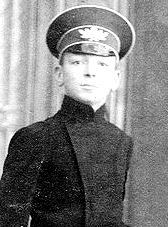
Joseph Ivanovich Muratov (Rabinovich).
Ivan's son Joseph lived a short but tumultuous life. He was born in 1902 in Revel in a prosperous teacher's family. He studied at one of the city's oldest educational institutions, the Gymnasium of Nicholas I, where his father taught. 1917 was a turning point not only for the country, but also for Joseph. His parents separated. Joseph with his mother and younger sister Vera moved to Perm, where in October 1917 he enrolled in Perm Gymnasium No. 1.
page71
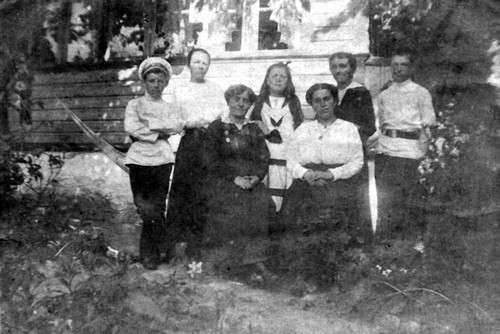
Sarah,? and Joseph jnr. taken c.1915.
A year later, in the fall of 1918, at the age of 16, while continuing his high school studies, Joseph became a student in the History and Philology Department of Perm University. There were no obstacles to this. According to the new Soviet rules for admission to universities adopted in August 1918, universities were open to all who wanted to study. No secondary education certificates were required, the only limitation was the age - at least 16 years old. As a student, Joseph completed his final year of high school and graduated with a gold medal. Student life was unsuccessful. Already in his second year he fell ill with typhoid fever and missed a year. In the spring of 1920. Joseph transferred to Tomsk University to the Philosophy Department of the Department of History and Philology. But he did not stay at Tomsk University either. In the summer of 1921 he transferred to Petrograd University to study the history of religion, and a year later returned to Perm University and settled with his mother.
page72
The reason was poor health and lack of money to live in Petrograd. His mother, Nadezhda Dmitrievna, was married at that time, bearing her husband's surname, Zakharov, but living alone. She taught biology at Perm University, so Joseph was exempt from tuition fees. It seemed that Joseph had every opportunity to continue his studies, but he never finished university.
In February 1924 Joseph changed his last name from Rabinovich to Muratov. Note that around this time his cousins who lived in Moscow, the children of Ivan Josephovich's younger brother, Peter, also received their mother's surname and became Dadykins. What caused the rejection of the surname Rabinovich is unknown; it seems to have been the decision of their fathers. Joseph married and moved to Moscow. This happened no later than 1928. Joseph's wife, Tatyana Petrovna Makasheva, was nine years older than he and worked as a teacher. They settled at the Losinoostrovskaya station, Field Lane, 24. On December 30, 1928 Joseph and Tatiana had a daughter, named, like her mother, Tatiana.
Life was hard for Joseph. In August 1933 he wrote to his cousin Andrew Kinna in England: "Without a completed education it is very difficult for me to struggle for existence. But in order to complete it, I must sacrifice some of my working hours. This would be painful for my budget and could undermine my family's well-being." Joseph begged his brother for help, asking him to regularly send him at least a little money so that he could finish his education and get a decent job: "For me and my family it would be a great help and would bring great joy and relief. As good as Andrew was to Joseph,
page73
he had a family of his own, a son was born, and he could hardly send money to his Moscow cousin. It is not known what Joseph's job was in Moscow. His daughter Tatiana wrote in her autobiography that her parents were employees and that her father had been a worker before the revolution. This is a tribute to Soviet standards, in 1917 Joseph was only 15 years old and in grammar school. Joseph died in 1936. After his death two Tatiana, mother and daughter, returned to Perm and settled 15 km from the city in the village of Mulyanka. The mother got a job at a school as a teacher, the daughter daughter went to study at the same school. In 1943, Tatiana, having completed 7 classes, began working at the factory. A year later she managed to enter the Molotov Pedagogical School. It is worth adding that in her letters to Rachel Sofia never once mentioned Joseph and his family, while she willingly wrote about the successes of her other nephews, Peter's sons and Ivan's daughter Vera.
I remember Aunt Vera Rabinovich, my father's cousin, who sometimes came from Molotov (Perm) to Glazovsky Lane. She was a plump, pretty woman. She was in her fifties at the time. Vera was born on August 24, 1903, in Revel. She attended the grammar school in Revel until the 5th grade; after her parents' divorce in 1917, she and her mother and brother left for Perm, and in 1919, with her mother, who had remarried, even farther east, for the Far Eastern Republic They settled at Petrovsky Zavod station where Vera enrolled in a 4-class mixed gymnasium,
page74
The school was transformed in 1920-21 into the 3rd Grade II school. After graduating from the school in 1921, Vera moved to Verkhneudinsk and entered the service of an ombudsman at the CDVK.
On June 3, 1922, as soon as the food train from Verkhneudinsk arrived in Perm, Vera applied to Perm State University for the medical faculty. Since formally the DVR was considered an independent foreign country, the application was accompanied by letters from the Ministry of Public Education of the DVR and the Baikal Department of Public Education to the Chief Department of the State Police, requesting that Vera Ivanovna Rabinovich be granted a pass to Perm for medical education.
Vera's mother, Nadezhda Dmitrievna (Zakharova by her second husband), also returned to Perm, and enrolled in a work study at the Perm State University. This exempted Vera from tuition fees. She and her daughter lived at 61 Zinoviev Street, bldg. Zinovieva, 61, kb. 3.St. Vera traveled to Moscow for winter holidays, in 1924 and 1925.
page75
Vera went to Moscow to visit her father, who worked as a Geography teacher at the Workers' Department of the Marx Institute of National Economy. In July 1925. Vera was sent on an internship in a hospital at the disposal of the Zlatoust District Health Inspectorate.
Unlike her brother, Vera once and for all chose her profession and determinedly pursued the path she had chosen. She became a doctor of infectious diseases. From 1927 to 1930, she worked as a supernumerary resident in the clinic of infectious diseases of the Perm Medical Institute, simultaneously in the unit for anti-infective vaccinations and in the malaria unit of the Perm Bacteriological Institute. Then 2 years worked as the senior resident in infectious diseases department of Magnitogorsk hospital.
From December 1932 to May 1935 Vera had postgraduate study in a clinic of infectious diseases of the 1st Moscow medical institute. After graduation, she returned to Magnitogorsk, where she was appointed assistant clinician in infectious diseases at the Molotov Medical Institute. In 1937 she defended her candidate thesis. In August, 1941 Vera Ivanovna was mobilized in Red army and through out the war worked as the chief of medical unit. After discharge to the reserve in 1946, she returned to Molotov and went to work in the Molotov Medical Institute, as associate professor, where she worked until her death.
Vera Ivanovna was not officially married. None of her relatives remember the name of her common-law husband. They had an adopted son Arkady, whose fate is unknown. The date of her death is also unknown. The list of her scientific works ends in 1964.
page76
The personal file of Moscow University student Ivan Dadykin I found in the archives quite by accident. Just out of curiosity I looked at the surname Dadykin and... God, that's my great-grandfather! It turned out that he and I studied at the same the same department, only in his time, it was called History Philology. And so began my acquaintance with my great-grandfather.
page77
I now know where Ivan Makarovich is from, where he studied, lived, and worked, and where he is buried, but there are still many gaps. I do not know his exact date of birth. The available documents indicate his age, but there are discrepancies between the certificate issued by the gymnasium and the form list. The June 1872 certificate states that Ivan Dadykin is 19 years old. It turns out that he was born in 1853. According to the service record sheet, compiled in August 1899, Ivan Makarovich was 45 years old. If so, the year of his birth is 1854. In the list of inhabitants of Vilna, compiled in 1922, he was born in 1851.
There is no exact information as to where and in which family he was born. The gymnasium certificate states that Ivan Dadykin was the son of a retired candidate. The University certificate states that he was the son of a non-commissioned officer. Retired candidates were those who had served in the lower ranks for a full term of active service, passed the exam, and were waiting for a vacancy to obtain the first officer rank. By the time his son graduated from university, Makar Dadykin had obtained that rank. His mother's name was Maria, and before marriage she bore the surname of Zaikovskaya. Ivan enclosed his father's service record sheet to his application for admission to University, but unfortunately, it is not in his personal file. In his own 1899 formulary list in the column "from which rank does he come" he wrote "from peasantry". His father Makar (patronymic is unknown) most likely came from a peasant family, worked his way up and tried to give his son a good education.
Ivan lived up to his expectations. Entered Slutsk classical gymnasium in 1868 at age 15 and four years later, in 1872, successfully graduated.
It was one of the oldest educational establishments, founded in 1617, and from 1868 it received the status of a state Classical Gymnasium for Boys.
page78
He studied well, apparently showed promise, and as a student was awarded a scholarship to the Vilna Educational District.
In a petition to the rector of Moscow University Ivan Dadykin asked to be admitted to the faculty of law, but having studied for one year he switched to history and philology. It can be assumed that his father wanted his son to be a lawyer; having broken away from his family and become independent, Ivan followed his inclinations.
After graduation, Ivan Dadykin was sent to work in Vilna. According to the census of 1887 the provincial centre had 154,500 inhabitants, of whom 40% were Jews, 30.9% Poles, 20.1% Russians, 4.2% Belarussians, and just 2.1% Lithuanians. The young lecturer, a graduate of Moscow University, was eagerly awaited in Vilna, but did not hurry to his destination. On June 26, 1877 the governor of the Vilna school district M. Malinovsky addressed to the rector of the university: "I request that Dadykin be sent to his destination without delay and that his papers be delivered to me." The categorical nature of the request did not help. Ivan did not arrive in Vilna until September.
From 16 June he received a two-month leave, which he spent in the province of Kursk. It is not known whether he was visiting his parents, or for any other reason. The letter from the rector in reply to the repeated request from the guardian of the Vilna Region School District makes it clear how Ivan spent his summer holiday - he was finishing his work on his doctoral dissertation.
page79
The thesis was considered satisfactory, and at the end of September Ivan Dadikin received a certificate, which said: "Having behaved very well, he graduated from the History-Philology department, and for his excellent academic record, he was approved as a candidate by the resolution of the university council on September 10. On entering service, he was accepted in the 10th grade. The obtaining of the degree of Candidate of History and Philology gave him the right to obtain a certificate to become a high school teacher in the subject of Slavonic Philology without passing a special examination.
page80
The first job of the young teacher was at the Jewish Teacher's Institute.,At the same time as the Jewish Institute Ivan Makarovich began to teach Russian language, literature and pedagogy in the Vilna Female Gymnasium of the Office of the Empress. In 1878, a year after beginning his service, he was appointed a member of the executive committee of the board of the school district. From 1880 he became a member of the Testing Committee of the district administration in his speciality. His zeal in work was rewarded with cash prizes - sometimes 100, sometimes 200 rubles at a time, as a reward for "diligent and useful service". At the Jewish Institute, he was given the responsibility of temporary director,during the absence of the director.
At the age of 28-30, Ivan Makarovich got married. The exact date of this important event in the life of any man is unknown, but it happened no later than in 1882.
page81
His wife, Maria Ivanovna Sidorskaya, was the daughter of a priest. Children came, two sons and two daughters: Glafira (my grandmother), born 26 April 1883, Andrew - October 18, 1886, Olga - June 8, 1888, Ivan - On November 12, 1889. Maria Ivanovna kept house, her children studied: sons in the Vilna 1st gymnasium, daughters in the Mariinsky higher female school. On August 1, 1883 Ivan Makarovich was transferred from the Jewish school to the Christian teacher's institute, and three years later, in September 1886, to the real school as a teacher of Russian language and literature. He became a class teacher in 1886, and from October 1889 a member of the special committee for discussing the Russian literature programme in classes 5 to 6 of the county's grammar schools. In 1898, he also taught lessons of pedagogy and Russian language at the Mariinsky Women's School.
The schoolmaster's record notes, his strictness and conscientious attitude to his work. On occasion, pupils complained about his excessive demands in the teaching of the Russian language and literature. This was noted in the file on deficiencies in organization of educational work in the Vilna Reals College in 1891. It is unlikely that such complaints could have damaged Ivan Makarovich's reputation.
He was considered one of the most experienced teachers in the district. It was not by chance that he was invited to give public lectures, organized in Vilna in 1900 for all comers.
It was noted in the report by the trustee of the Vilna school district that Ivan Makarovich gave two lectures on Turgenev to which so many listeners came that they had to open the choir. A fee of 20 kopeks to 1 rouble was charged for admission to the hall of Vilna's First Grammar School where the readings were held. All the income from the lectures went to help needy pupils, to establish a fund to organize public readings the following year, and for the monument to Catherine II in Vilnius.
Ivan Makarovich published twoText books on the Russian language and literature and a brochure on the history of the Vilna Real School. All these books can be found in the Russian State Library.
page82
As the years passed, Ivan Makarovich moved up the ranks in the Table of Ranks. By order of the Governing Senate on July 9, 1882 he was promoted to the rank of collegiate assessor, in 1884 - to the rank of court counselor, in 1886 - to the rank of collegiate counselor, in 1890 -
to the rank of state councilor. According to the Manifesto of 1845, the rank of state councilor gave the right to hereditary nobility, but in 1856 Alexander II stipulated that the right to hereditary nobility was acquired only by obtaining the rank of 4th class (actual state councilor). This right could be obtained by awarding orders of sufficiently high status.
Ivan Makarovich received his first order in January 1881. It was the most widespread order of St. Stanislav in the Russian Empire, intended to reward civilian service and socially useful activities. The number of those awarded with the order amounted to almost 900 thousand people for the entire time of its existence, of which over 750 thousand people received the Order of St. Stanislaus, 3rd class, like Ivan Makarovich.
page83
followed in 1885 by Anna 3rd degree, in 1889 by Stanislav 2nd degree, in 1894 by Anna 2nd degree. And finally, on January 1, 1899, the long-awaited Vladimir. By the law of 1876, those awarded with the Order of St. Vladimir of all classes were granted hereditary nobility and pension. Holders of the 4th Class were entitled to a pension of 100 rubles per month.
Ivan Makarovich submitted an application to the Vilna nobles assembly to be numbered among the nobility, as well as his sons and daughters. This petition was granted. On the 5th December, 1899 the Governing Senate at the department of heraldry made the decision to acknowledge Ivan Makarovich Dadykin with his sons Andrew and Ivan and daughters Glafira and Olga to the hereditary nobility status.
Ivan Makarovich bought the estate of Leonovka in the town of Hodutishki, Sventsian district of Vilna province on the border of Belorussia. The only surviving photograph shows the whole family on the porch of the house. Probably taken shortly after the purchase of the estate, in the early years of the new twentieth century.
From 1914-1915 Ivan Marovich was teaching Russian language and was a teacher in Leningrad. Ivan Makarovich taught Russian at the private Jewish male gymnasium established in 1906 by P.I.Kagan This was probably his last place of work. At the age of 60, with more than 30 years of service, he could have retired. But it is unlikely that under the conditions of the German occupation and the change of governments, the pension was paid out properly.
From 1915 to 1922 Vilnius was an arena of confrontation between various political and military forces, power in the city changed hands. From 1915 till 1918 the city was occupied by German troops. After the German surrender a conflict broke out between Poland and Lithuania over the nationality of Vilna and the surrounding territory. The conflict was exacerbated by the involvement of Bolshevik forces and the Red Army.
page84
Power changed several times a year. In December 1918 Soviet power was proclaimed and the Provisional Revolutionary Government was formed, and two months later the formation of the Lithuanian-Belarusian Soviet Socialist Republic ("Litbel") was announced. Two months later, in April 1919, Polish forces occupied the city. In July 1920 the Red Army moved into Vilna again, but in autumn the Poles returned.
Intervention by the League of Nations made it possible to halt hostilities and settle the conflict. An administrative line was drawn, dividing the territory of Lithuania and Poland. Till 1922 the Vilnius area was called the State of Central Lithuania and it was actually under the control of Poland, and in 1922 it was finally incorporated to Poland.
One can imagine what was going on in the city, where there were armed clashes involving not only regular troops, but also numerous self-defence units. During the war the population of Vilna decreased by 40%.
page85
In 1909 there were 205.2 thousand people in the city, but in 1919 there were only 128.5 thousand.
There is no evidence of how the Dadykin family survived all this. It is unlikely that Ivan Makarovich took part in the twists and turns of the "troubled times", as he was already in his seventies. His political views can be judged by the fact that he was a subscriber of the newspaper "Straight Path", published by the Russian People's Union named after Mikhail Archangel. In July 1913.
In July 1913 he sent a letter to the St Petersburg branch of the RNS requesting that the book School Preparations for the 2nd Russian Revolution be sent postage paid.
When Vilna came under Polish rule, he had to adapt to the new conditions. The application for a pension, filed in September 1923, Ivan Makarovich wrote in Polish, but I don't think he knew the language well: "I ask you kindly to issue me a certificate that I am not in the service. The state certificate is required for presentation to the Board of Trustees in order to receive a pension.
There is a letter of Ivan Makarovich, sent to his elder daughter Glasha on the 15th of July, 1928. Reading it, I could clearly imagine how he lived in the last years of his life and I understood something in my great-grandfather's character. In 1924 he was widowed, his youngest daughter Olga with her granddaughter Zhenya and son Ivan lived with him. The Leonovka estate was sold, apparently long before writing the letter, and another house was bought. He writes fondly of the garden he planted with his own hands, of 'cherry and cherry blossoms'.
page86
Most of the letter is about money matters. He was worried that the capital he had accumulated over the years was being spent too quickly. Housekeeping was a major expense and every month Olya and Vanya asked him for money. Glasha, who lived in Moscow, was no exception. The detailed listing of which of the children asked him for how much, and the household expenses could be attributed to natural stinginess, exacerbated by old age. But it is more likely a natural fear of poverty in an old man. He is used to saving a penny since childhood, as he grew up in a poor family, studied on public money, worked all his life to provide for his family and educate his children.
The letter says that some time ago Glasha borrowed 30 roubles from her father and soon informed him that she had sold the dictionary and put the money aside to repay the debt. Ivan Makarovich writes that in a previous letter he reminded her of this, but now asks her to forget about the debt. From Glasha's letter he learned that she had had an accident - she had lost all her luggage on a holiday to Kislovodsk with her husband. Her father worried that she would have to take on an extra load at school in order to "restore the former balance of the household". Father, sister and brother thought of ways to help Glasha. It would be possible, the father wrote, "if Vanya got a salary from September, if Olga got rich. Both were unlikely.
page87
Ivan Makarovich, who cared for his own children and worked with children all his life, did not show any feelings towards his grandchildren. The letter only mentions Olga's daughter Zhenya, who went with her mother to visit her father for 10 days. Glasha wrote to him about her sons, but he asked her not to. Ivan Makarovich cut his Moscow grandchildren out of his life because they had studied in Soviet schools and, in his opinion, were only fit for 'comrades'. I felt sorry for Dad and his brothers, deprived of their grandfather's attention and love. What did Ivan Makarovich know about the Soviet school? And what does this have to do with grandchildren, the successors of the family who bore his surname?
This letter to his daughter was probably his last. Ivan Makarovich died in 1929 aged 75. He was buried next to his wife in the Euphrosyne Orthodox Cemetery St. Euphrosynius in Vilnius. The grave could not be found.
page88
I know very little about my great-grandmother Maria Ivanovna. I managed to get some information about her family, where she grew up, and Natalia Suvorova, granddaughter of her younger sister Katerina, shared her memories about her sisters.
I'll start by telling you about the family.
Parents Maria was the eldest daughter of the hereditary village priest Ivan Sidorsky and his wife Stephanida (Stepanida), daughter of the priest Pavel Tchaikovsky. All I knew about Ivan was that he lived in the village of Bakshty, and for luck I typed that strange name into a search engine. It turned out that Bakshty was mentioned in chronicles back in the XIV century, and at the time when my great-grandfather's family lived there, there were about fifteen hundred inhabitants (according to the census of 1897 - 1403). I managed to find a site "Genealogy. Iviev district My enquiry about priest Ivan Sidorski was answered by Aleksej Evgenievic Ignatovic, who sent copies of the book pages with detailed biography of his great-greatgrandfather.
Ivan Semenovich Sidorsky was born in 1838 in the town of Belsk, Grodno province into a priest's family.
page89
Like many children he attended a theological seminary, which was located in Vilna on the grounds of the Holy Trinity Monastery. The full seminary course was six years and consisted of three two-year divisions. The children of priestly families were maintained at public expense.
In 1859, Ivan graduated from the seminary in the second class. He married Stephanida Pavlovna Chaykova , who was 15-16 years old at that time (she was born in 1845), and in 1861 he was ordained to the priest in Ciechanowiec church ; in 1863 he was appointed the preceptor and a teacher of the law in Ciechanowiec public school. Five years later, upon his request, he was transferred as the rector of the newly built Inturk church and appointed as a teacher of the law in a public school. Since 1887 he was transferred to the village Bakshty, Oshmyansk district of Mogilyovsk eparchy, where up to the end of his life he served as rector of the Church of the Intercession and also served as a member of the deanery board in Volozhin ward, and taught at the Bakshtan public school, for the rest of his life. His diligent service was recognised with numerous commendations, blessings, gifts, and awards. He was honoured by Church authorities with a velvet purple scarf, camilak, or a synodal pectoral cross. In 1896 he was awarded the order of St. Anna of III degree for 25 years of work in public education, in 1902 he was elevated to the rank of archpriest.
Ivan Sidorsky died on September 22, 1911, at the age of 73.
page90
Sisters and brothers
The archpriest had a large family. According to the accounts of his relatives, Ivan Semenovich and Stephanida Pavlovna had 16 children, but only 10, eight daughters and two sons are named in the Strenkowski book. Probably six of them died in infancy. The eldest daughter Maria, my great-grandmother, was born in 1862, when Stephanida was only 17 years old. Then came Lydia (1867), Semyon (1868), Nadezhda (1870), Michael (1872), Catherine (1874), Natalia (1876), Alexandra (1877), Eugenia (1880), Anastasia (1886 ). In 1896 and 1898 Father Ivan had Vladimir Josephovich Sidorsky, born in 1892, the son of the former priest of Tsitsinskaya church, who died in 1893.
Father Ivan, a graduate of a theological seminary, being himself a teacher at a public school, could not leave his children without an education. It is known, that his sons served in various government offices. Semyon served in the Warsaw fiscal chamber, and then moved to Vladivostok to the district court. Michael was a sacristan in the Gudevichi church in Volkhov county, and in 1898 entered the service of the excise department. Daughter Aleksandra taught in the Bakshtan female school. All daughters married into educated men.
The kinship between the Sidorskys remained throughout their lives and continued in successive generations. My grandmother Glafira, Maria's daughter, was friends with her aunts. I meet two of them living in Moscow, Grandma Sasha and Grandma Katya. Alexandra Ivanovna's fate was difficult. Her husband priest Vasily Belov was exiled, her son Nicholas died in 1920 and during the war her son Peterdied. She was left with her youngest son Michael, who had some kind of mental disorder, and his mother took care of him all his life. When I was little, my mother and father and I used to visit Grandma Sasha and Misha. They lived very modestly. I remember well when we had tea with them.
page91
I also remember Ekaterina Ivanovna (Granny Katya), a skinny little old woman, always smoking a cigarette. Catherine was married to the excise official Alexander Vasilievich Grabovsky. They lived in Vilna. They had four children: Sergey - died in the First World War, Vladimir - died of typhus in Chernigov, Paul - lived in Baku, had 4 children, then moved to Kiev. The younger one, Mikhail (1903-1978), was married to Maria Alexandrovna Suvorova (1909-2003). Their daughter, Natalia Mikhailovna, has kept in her memory the details of the large Sidorsky family and the connection to many relatives.
From her stories I learned about the families of other Sidorskij sisters. Eugenia Ivanovna was married to the priest Boris Alexandrovich Prisyolkov. They had three children, Lyudmila, Vitaly and Arseniy. Anastasia Ivanovna was married to the lawyer Mikhail Fedorovich Shtark and lived in Vilnius. Their daughter's name was Galina.
Husband, children, grandchildren
Maria Ivanovna's whole life was devoted to taking care of her family and children. Until the age of 20 while she lived with her parents she was helping her mother with the household chores as the eldest daughter, took care of her younger sisters and brothers. Once married, she raised her children.
It is not known when and where she met her teacher of literature Ivan Dadikin. We can safely assume that they were married no later than in 1882, as on 26 April 1883 Maria gave birth to a daughter Glafira (my grandmother). The sacristan at her baptism was her mother, Stephanida Pavlovna, who became a grandmother at the age of 38. Three years later, in 1886, Stephanida and Maria gave birth in the same year, Stephanida a daughter Anastasia and Maria a son Andrew.
page92
The aunt and nephew turned out to be peers. Maria and Ivan had a total of four children, two girls and two boys. In 1888 Olga was born, and in 1889 Ivan. The husband worked hard, the children grew up and studied. The sons graduated from grammar school, the daughters from the Mariinsky higher school for girls.
Maria Ivanovna died in 1924 and was buried on the Efrosinjevo Orthodox Cemetery in Vilnius. The grave is unknown.
page93
The older Glafira, my grandmother, completed a course in Paris and at the age of 20 she got a job teaching French in various educational institutions in Vilna. Apart from teaching she worked as a translator. In 1907 she married mathematics teacher Peter Rabinowicz and moved to Reval. She visited her parents often and her elder sons Ivan and Vsevolod were born in Vilna. So Maria Ivanovna at 46 years became a grandmother, and had the happiness to nurse little Vanya and Seva. She did not get to see her younger grandchildren, Pavlik and Rostik. After Glafira and Peter moved to Arkhangelsk in 1914.
It was not the distance that prevented them from meeting with their relatives as much as the outbreak of the World War and then the civil war. During the Soviet years, Vilna was taken over by Poland and Maria Ivanovna and Ivan Makarovich had only correspondence with their elder daughter who moved from Arkhangelsk to Moscow. There is a separate essay about Glafira, so I will move on to her younger sister with whom she was very friendly.
Olga married George-Joann-Michael Alexandrovich von Gibschmann, a railway engineer of the Lutheran faith, at the age of 22. He was 10 years older than she, working as assistant chief of the 22nd section of the North-Western Railway.
They were married on 17 October 1910 at Vilna Prechistensky Cathedral.
page94
The bridegroom's name was Dadykin. The groom's guarantors were his brothers, solicitor Alexander Alexandrovich von Gibschman and court counselor Dmitri Alexandrovich von Gibschman. The bride's guarantors were a railway engineer, Pavel Ivanovich Mashtakov, and collegiate counselor PeterOsipovich Rabinovich, husband of her elder sister Glafira.
Olga and George settled in Gatchina, where their daughter Kira was born on 31 October 1911. The parents were Konstantin, a brother of Georgije, and Maria Ivanovna, the mother of Olga. Another granddaughter of Maria Ivanovna, Eugenia was born on 30 August 1917. The surrogate was Olga's brother, Ivan Ivanovich Dadykin. The children were registered as Russian and Orthodox, as was their mother Olga.
The years of the Civil War were a severe ordeal for the Gibshman family. In 1919 they moved from Soviet Russia to Vilna, where Olga's parents lived. Georgi obtained a job as head of the Road Coating Department. Shortly after formation of Vilna railway directorate in early 1920, he was appointed vice-director of the road department. The town was occupied by the Red Army units from July to October 1920. Many of the directorate's staff evacuated, but the Gibschmans were unable to leave as Olga fell ill. As qualified railway engineers were in demand under any government, Georgi continued to carry out his profession, but he was arrested and deported to Minsk.
page95
Georgi managed to escape and return to Vilna, which had come under Polish control. He was hired back to work in the Vilna Railway Directorate, but no longer as a vice-director, but in a modest position in the technical department. Soon after, in January 1921, he was appointed head of the bridges department.
In 1923 Giorgi applied for Polish citizenship, It was not easy because of a file in the archive, which contains documents about Georgi's past: an application from February 19, 1923, in which he renounced his Russian and Ukrainian citizenship, extracts from the registry books, and all kinds of service notes. Employees of Vilna directorate in a petition in support of Georgi, characterized engineer Gibschman as a man of exceptional giftedness, honesty and responsibility, especially noted his outstanding productivity of work on restoration and repair of bridges within Vilna directorate. On January 9, 1924 the Gibschman family was granted Polish citizenship. It is not known how their subsequent fate took shape.
Nothing is known about Andrew, the eldest son of Maria Ivanovna and Ivan Makarovich, His name is not among those buried at Efrosinievskoe cemetery where his parents and younger brother Ivan were buried. Ivan Makarovich does not mention him in his letter to Glafira in 1928. It can be assumed that Andrew died early, perhaps perished during the civil war.
Ivan, the youngest son, it is known only that he was a lawyer. In 1917 he was a candidate for the judicial office at Vilna judicial chamber. In his letter to Glafira from 1928, Ivan Makarovich mentioned that his son could not find a job, and he had to help him with money. There is no information about Ivan's family, probably they did not exist. Ivan died in 1934 at the age of 45. He is buried in the Euphrosyne cemetery in Vilnius.
page96
Grandfathers
I didn't have any grandfathers. Both died before I was born, and my mother and father never told me much about them. They each had their own reasons. My mother's father was dispossessed and then repressed as an enemy of the people. Daddy's father was Jewish and had the last name of Rabinovich. I do not know if my father was informed about this dark spot in his biography when they met in 1948 in the editorial office of "Young Bolshevik" magazine. But I do know that he concealed the fact that he bore my mother's and not my father's surname. Mum only found this out by chance after I was born. It was like this. Auntie Shura, my mother's sister, was walking with me in the yard of our house in Glazovsky Lane. My grandparents had lived there since the mid-20s, the yard was small and everyone knew each other. "Is this Rabinowitz's granddaughter?" - Aunt Shura was suddenly asked by an old man sitting next to her on the bench. It was 1949, the campaign against cosmopolitanism was in full swing, and this question hardly pleased my aunt. "You are mistaken," she replied, "this is the granddaughter of the Dadikins. "Do you live on the first floor? In flat 3?" - the old man persisted. "Yes," said Aunt Shura. "That's what I'm telling you, that's Rabinovitch's granddaughter." Aunt Shura grabbed me in her arms and ran home. "Nina, do you know who that is?" "My Mashenka," my mother said confusedly. "It's Rabinovitch's granddaughter!".
page97
The news had no effect on our family, except that Auntie Shura started calling me "Our little Sarochka".
My grandfather's picture was on my father's desk. I knew he was a maths teacher and died during the war in evacuation in Sosnovskoye in the Gorki region. Dad and his brothers went to look for his grave, but they didn't find it.
Mum didn't have a picture of Dad. When he was first arrested, she was 5 years old. She did not remember him and did not recognise him when he returned from the camp. He was buried in Andreapol. In 1990 my mother and I went to her motherland, the cemetery was abandoned, only mounds with some crosses and monuments remained. We could not find my grandfather's grave.
Parents. Baptism. University
My acquaintance with my grandfather took place seventy years after his death. It began with the personal file of a Moscow University graduate, preserved in the Central Historical Archive of .Moscow. I learned that he was born in Kishinev, Bessarabian Province, on 19 February 1876 and was baptised on 13 November 1888 in Odessa by Kornman, the pastor of the Evangelical-Reformed parish. Being baptised at the age of 12 in an Evangelical-Reformed church is understandable. After all, his father Joseph Rabinowitz himself converted to Christianity in 1885. My grandfather received the name Peter at baptism, was named Nathan until he was 12 years old, and later in many official documents was referred to as Nathan-Peter.
page98
Gradually the name Nathan fell away and the patronymic Josephovich was transformed into Osipovich.
Nathan was the youngest of seven children. The difference between him and his elder brother Vladimir was 20 years. The closest in age was David (after baptism Ivan), born in 1874. David and Nathan were baptised on the same day and studied at the same Grammar School - Second Kishinev Grammar School, with a one year difference, Ivan studied in the Grammar School for 11 years and Peterfor 12. Peter did well in all subjects, but German he got an 'excellent', the same as his brother Ivan. It is possible that the family spoke Yiddish, so German was easy to learn. One after the other the brothers entered Moscow University - Ivan in 1895 into the Department of History and Philology, Peter in 1896 - into the Mathematics Department of the Faculty of Physics and Mathematics. In Moscow the brothers lived together, near the university. Ivan's personal file contains his Moscow address: Tverskaya section, 128, B. Nikitskaya str. 1. Their father Joseph did not attend gymnasium or university, but he gave his sons a good education. After their baptism they were not subjected to the rule.
page99
Arrest, expulsion from Moscow and return
In February 1899 a wave of student unrest spread across Russia. They began at St Petersburg University, then spread to other educational institutions, Moscow, Kiev and other cities. In all, over 25,000 students took part in the unrest. Mass arrests and expulsions weakened the movement and by the end of March it subsided. But on April, 6, student G. E. Lieven committed suicide in Butyr prison, which caused a new rise in unrest. About 200 people gathered for a demonstration in Moscow. To what extent Peter was involved in the student protests is difficult to judge, but clearly he did not stay away. Let us turn to the documents of the Department for the Protection of Public Safety and Order in Moscow.
By order of Colonel D.F.Trepov, chief police officer of Moscow, on the night of 11 April 1899. The Security Department proceeded to eliminate the student Executive Committee at Moscow University, of which Nathan-Peter Rabinovich was a member.
On April 11 his room was searched. At the same time the room of Brother David-Joann was also searched.
page100
The brothers then rented two rooms in Sergeev's house on Znamenka 11. Five manuscripts, 22 notes, 12 business cards, nine books and six photographic cards were seized from Nathan-Petr, and he himself was sent to the Basmanny Police House under arrest. The contents of the seized materials are not disclosed in the search report. Nothing was found in the brother's possession. A total of 23 students were arrested. David-John did all he could to help his brother. According to his version, his brother was mistaken for his namesake, in reality he was not involved in the riots. On the very next day after his arrest, David-Joann secured a letter from Veliaminov, Chairman of the Tver Trust for the Poor, in order to go to Trepov and clarify the misunderstanding. It is not known whether he was received by the chief of police, but Trepov asked the security office for information about Nathan-Peter Rabinowitsch. According to the security office there was no mistake. The guilt of the arrested Rabinowicz was confirmed by the Executive Committee Bulletin found in his possession and the note: "Save yourselves! We are open. I am losing my head." Furthermore, surveillance of the Rabinowitzs' flat on Znamenka revealed that Nathan- Peter's deputy on the Executive Committee visited the brother of the arrested Rabinowitz after his arrest. Sitting in solitary confinement in the Basmanny Police House, Peter wasted no time. On 14 April he wrote a four-page petition requesting his release. He writes that he has always stood aloof from the student movement, that he has devoted all his time to dance evenings, tutoring and patronage, being an employee of the Tversky Trusteeship of the Poor, citing the illness of his father. He asks to be released in time to come home for Easter and signs "loyal subject N. Peter Rabinowitz". The members of the student movement were treated quite humanely. A few days after their arrest the Chief of Police of the Moscow Regional Police, decided that all arrested students were to be released from custody and sent from Moscow to their places of residence.
page101
The police were not allowed to take Nathan-Peter to the city, but on 16 April he received a pass from the Okhrana department to travel from Moscow to Kishinev. On arrival he was obliged to report immediately to the local police department. He was forbidden to reside in Moscow and elsewhere in the Empire. It was in fact an exile. The expulsion of his youngest son from Moscow a year before his graduation was a serious blow to his ailing father. Joseph Davidovich died a month after Peter's arrival, on 17 May. It was undoubtedly a great loss for the whole family and for the 23-year-old Peter. It is difficult to judge from photographs, but from descriptions he and his father looked alike - both blond-haired and grey-eyed. V.V. Rozanov, who met Peter and his young wife on the steamship, remarked that Peter did not look Jewish at all, and the same was said about Joseph by people who knew him. As for his religious views, the son was far from his father. Joseph Davidovich gave his sons the freedom to choose, and none of them continued his cause. A few days after her husband's death, Olga Danilovna began a struggle to get her son back to Moscow. She sends telegrams to the head of the Moscow Security Office and the Moscow chief of police with a request to allow her son, student Nathan-Peter Rabinovich, to come to Moscow for 5 days. The mother's request was supported by Prince Kantakuzen of Kishinev. In a telegram to the police chief of Moscow he wrote that he vouched for the reliability of Nathan-Peter. The Moscow Security Office complied with the mother's request.
On 28 May a telegram was sent to the Kishinev police chief that Nathan-Peter Rabinovich was allowed to come to Moscow for five days. The circumstances of his return to Moscow and to the university raise questions. On 4 June, just after his arrival in Moscow, Nathan-Peter received permission to stay in the city.
page102
On the 16 June (Nathan-Peter is already in Moscow) the policemaster appeals to the governor of Bessarabia to inform Nathan-Peter that he has not been expelled from Moscow University and can return to Moscow. In other words, only two months after his expulsion from Moscow and expulsion from the university, the ban on Nathan-Peter Rabinovich living in Moscow was lifted and he could continue his studies. Could it really be that he was arrested and exiled by mistake? No. A certificate from the Okhrana office dated September 9, 1899 confirms Rabinovich's participation in the activities of the Executive Committee, many of whose members were banned from living in Moscow and Moscow Province for two years. It remains to be assumed that the attention of the Moscow Governor General's attention to the case of student Rabinovich was due to the fact that he was the son of Joseph Davidovich, whose activities had aroused interest in Russian society and whose death was reported in the newspapers. It is possible that the departed father helped his son to return to Moscow and finish university with his name.
Peter passed the remaining examinations and one more special examination in the physics and mathematics testing commission, and on 31 May 1900 he was awarded a 1st degree diploma.
page103
Having obtained a degree from Moscow University, Nathan-Peter returned to Kishinev and in July 1900 applied to the State Bank for employment. Without confirmation from the Police Department that he was fit to work for the bank, he was not accepted. On August 12, the Police Department informed the State Bank that there were no obstacles for serving in the bank; Peter was not subject to unofficial police surveillance and was not restricted in his choice of residence. In September Peter arrived in Moscow, rented a flat in Leontievsky Lane in the Shkott House, expecting to be assigned to the bank. But that was not the case. Things were dragging on. The Moscow governor showed interest in appointing Peter Rabinovich to the bank's service. On September 22, a request was received from the governor's chancellery to the chief of police asking about the "moral qualities and political trustworthiness" of PeterOsipov Rabinovich. The answer came more than a month later, 25 October. The Police Department of the Ministry of Internal Affairs reported to the Governor that there were no obstacles to Rabinowitz being appointed to the Moscow office of the State Bank. This did not mean that Peters' participation in the student Executive Committee, his arrest, his exile to Kishinev, his close acquaintance with the rioters had been forgotten. In internal correspondence from the Police Department relating to October 1900, all of his past "transgressions" were set out in detail.
My grandfather was not destined to become a bank clerk. While this bureaucratic correspondence was going on, he searched for alternative ways and found a job, which became his profession for life.
Revel. Pernov. Marriage
On 10 October 1900. Petr was appointed mathematics teacher at Revelskaja female gymnasium, and from the next school year he was transferred to the position of mathematics teacher at Revelskaja Imperial Gymnasium according to his application. It was the oldest grammar school in town and apparently paid a higher salary.
page104
After his father's death, Peter lost his material support and had to help his mother. As a student he moonlighted as a tutor, but the main support came from his father, who paid for his sons' university tuition and their living expenses in Moscow. While working in the Nikolaev Gymnasium, Peter additionally gave lessons at various educational institutions: the Girls' Gymnasium, the City Girls' School, and at the private school of P. Ebergardt. Thus he almost doubled his earnings, getting 750 rubles in the gymnasium and 636 rubles for extra lessons.
The money was needed for trips abroad. In the summer of 1903, after the Jewish pogrom in Kishinev, he travelled to London to make arrangements with the Mildmay Mission to restore Somerville Hall, the house his father had built for the New Testament Israelite community. In 1905 he took ten days leave during the school year to take his sick nephew abroad. He travelled abroad during the summer holidays of 1905 and 1906.
In the summer of 1904, Peter did not travel west, but went on a business trip to the east. When the Russo-Japanese War broke out, he petitioned to the General Directorate of the Russian Red Cross Society and was sent to the Far East on an errand.
page105
Apparently the assignment involved escorting loads for the wounded. Judging by the Red Cross medal he received in 1907, he did well.
After two school years in the Nikolayevskaya grammar school Peter made an attempt to move to Warsaw. But things did not go well there. On July 31, 1903 he was assigned to the Warsaw Secondary School, and on September 19, without having started classes, he returned to the Nicholas I gymnasium.
It seems that things were going quite well for him at St. Nicholas Gymnasium. Apart from teaching he was approved as a class teacher, which gave him a raise in salary. The director of the Gymnasium said that his service was "very useful and very zealous". His social activities were shown by his work as a clerk in the Society for the welfare of needy pupils of the upper secondary school. In August 1905, an order was signed approving him to the rank of collegiate assessor with seniority from 10th October .1900 a year later, on 19th May 1906, he was promoted to the rank of court counselor. On November 5, 1906. On November 5, 1906, "on the basis of the imperial order of August 28, 1904". On 5 November 1906, "on the basis of the Imperial order of 28 August 1904", the Ministry of National Education awarded him the title of teacher of a gymnasium from the time when he started teaching, i.e. from 10 October 1900. Not everything is clear in the last order. It is possible that a university graduate needed pedagogical experience in order to be promoted to the post of secondary school teacher. But was it really necessary to receive the imperial permission to acquire this rank? If so, why did it take another two years for the Ministry of Public Education to issue the relevant order after the Imperial command? What was it: bureaucratic delays or some real problems? It is more likely the former.
page106
A few months later, on the first day of the new year 1907, he was awarded the Order of St Stanislaus, 3rd class, for "excellent and diligent service and special labour". This was the youngest and most common order in the hierarchy of the Russian Empire. It was received by almost all civil servants, who served the established terms and had the class ranks. I am not going to belittle the merits of my grandfather, but it is not very clear what the "special works" are and whether it is possible to judge the "excellent " service of a teacher who had worked for only 6 years and had changed (or 3, if you discount the Warsaw Secondary School).
On 20 April 1907, at the age of 31, Petermarried Glafira
Ivanovna Dadykina. Where and how they met is unknown. Grandfather was working in Revel. Grandmother was 23, she lived with her parents in Vilna, taught French in gymnasium and in real school. She moved to her husband in Revel, and in the summer they went on a honeymoon trip on the Volga by steamer.
It was on this trip that they met .V.V. Rozanov, and from him we can learn about the impression given by
page107
by the young couple. Peter, "a fair blond man of good height, with an open cheerful face... With a simplicity that I know of no example, he told me how their "affair" had been two weeks old, how he had not left her side since their first chance and unforeseen meeting, and was now taking her, his treasure, to show her to his family somewhere in the south. She remained silent, inserting few words. And though she taught new languages and he taught maths and physics, but, being the same age as him, she was somehow mentally and spiritually more mature than him, older than him. In him so fermented marital "champagne": never have I seen that the young husband to such an extent mlel was captured by his "new happiness", was so enthusiastic about the object of his adoration, which I didn't find particularly beautiful at all. My grandmother did not like the last phrase, and she was seven years younger than my grandfather. Looking at pictures of her in her youth, I, too, cannot agree with Rozanov in his assessment of her appearance. Otherwise he is probably right. I remember my grandmother as taciturn and slow, but I knew her in her old age, when the effects of a stroke were taking their toll.
On 2 October 1908 they had their first child, named Ivan after Glafira Ivanovna's father. Peter looked for extra income to provide for his growing family. He took lessons in mathematics at the Estonian Knight's and Dome College, and tried to obtain a job at the V. F. Stürmer Commercial School in St Petersburg. Instead, in August 1909, he was assigned to teach mathematics in Pernov Gymnasium, with the duties of inspector of the gymnasium, and the family moved to Pernov. Of course, Pernov was not Revel, but the post of inspector was a promotion and salary. The inspector was assistant to the headmaster for teaching and educational work, and in the absence of the headmaster, he fulfilled his duties. In the same year he was promoted to the rank of collegiate counselor and received a commemorative medal on the 200th anniversary of the Battle of Poltava.
page108
On 3 April 1910 a second son, Vsevolod, was born. His biography lists Vilna as his birthplace, although the family was living in Pernov at the time. Apparently Glafira Ivanovna left for her parents at the time of delivery. The elder Vanya was only a year and a half old and it was difficult to cope with the two little ones alone. And two years later, in 1912, another son, Pavel, was born.
On the first day of the new year 1912, PeterOsipovich received a new award - the Order of St. Anna, 3rd class. The Order was superior to the Order of St. Stanislaus and gave him the right for personal nobility. In 1913 he received a commemorative medal in honour of the 300th anniversary of the House of Romanov and the highest gratitude for the booklet presented to the Emperor on the role of the House of Romanov in the history of the Russian education and Russian. .science.
page109
In 1913, after four years in Pernod, the family returned to Revel. Peter Osipowicz was appointed to Alexander Gymnasium in Reval as a teacher of mathematics and physics with the responsibilities of inspector. At the beginning of 1914 he received the rank of State Counsellor.
Arkhangelsk Lomonosov Grammar School
Despite his successful promotion, awards and new rank, he worked for only one year in Revelsk Alexander Gymnasium, and by the decision of the trustee of the Petrograd school district of July 17th, 1914. Petr Osipovich was transferred to the Wesenberg Gymnasium as a mathematics .teacher. It is not known whether the transfer from the provincial centre to the district centre was connected to any kind of trouble in the service. It is also unknown why on September 25, 1914, after the family had moved to Wesenberg and the school year had begun, he was appointed to the Lomonosov Grammar School in Arkhangelsk.
The new job was well worthwhile. The Lomonosov Grammar School, the oldest in the Arkhangelsk Province, was founded
in 1811 on the basis of the main public school and was named after Lomonosov. By the time Peter Osipovich entered the service, the gymnasium had its own buildings: a three-storey stone one on Troitsky Prospect and a two-storey wooden one on Pskovsky Prospect. Both buildings had electric lighting. The gymnasium had a house church, a good library, subject rooms, a gymnasium and a canteen for low-income .pupils.
page110
From 7 August to 8 September and from 18 September to 1 October 1914.
PeterOsipovich takes leave to move and settle his family in the new place. By this time there are already three children in the family: Ivan 6 years old, Vsevolod 4 years old, and two-year-old Pavel. The move to Arkhangelsk, 1400 versts away from Vesenberg, demanded great expenditure for the family of five. Just packing and transporting their belongings cost about 400 roubles. Peter Osipovich had to go into debt and on 31 October he approached the director of the Gymnasium with a petition for financial assistance of 200 roubles. The request was approved, and although a flat was not mentioned in the petition. he was apparently given a service flat. The new teacher turned out to be proactive. As soon as he began his work, Peter Osipovich approached the trustee of the Petrograd school district with a proposal to set up a popular scientific cinematograph for pupils. It was a new undertaking, the popular-science cinema was just taking its first steps. It is not known whether popular science films were shown in Revel
page111
In his memorandum to the director of the gymnasium he refers to St Petersburg, Moscow and other major cities where attempts had been made to organise educational cinematography for students, but he certainly had some experience of organising cinematographic sessions for students. There was also persistence. After receiving a refusal from the trustee of the Petrograd school district in November, he shared his idea with the pupils' parents, had talks with the inspectors of public schools in Arkhangelsk and, having secured their support, on January 16, 1915, sent a letter to the director of Lomonosov Moscow State University. He sent a memo to the director of Lomonosov gymnasium proposing to organize for the students several film shows of scientific content, educational films about travels along the Volga, the White Sea, the Caucasus and the Crimea, as well as classical films, "Dead Souls", "Eugene Onegin", "Macbeth", historical films "Life for the Tsar", "Peter the Great", "Dmitry Donskoy". Everything was thought out: programme of shows, participation of teachers, minimum ticket price, (for poorer pupils - free of charge).
The idea was quite sensible. But even this time, Peter Osipovich's proposal was not supported by his superiors. The Trustee of the Petrograd School District granted permission after a year and a half. In August 1916, the heads of educational institutions of Arkhangelsk met to discuss the issue of setting up a scientific cinematograph for students. P.O. Rabinovich was a member of the commission in charge of this matter. It is unlikely that the commission was able to carry out its plans. There was a war going on and a revolution looming.
Despite the fact that the city was far from the fronts and had never been attacked by the enemy, the First World War, which began in the summer of 1914, felt like a war. The First World War broke out in Arkhangelsk. Arms and military equipment for the needs of the Russian army coming from the Entente countries passed through the port of Arkhangelsk. A brigade was sent to guard the maritime traffic.
page112
The city has a large number of military units from Russia and abroad. A large number of military units, both Russian and foreign, were stationed in the town. From the summer of 1915. Arkhangelsk and the province were placed under the direct authority of the War Ministry. The construction of the broad-gauge railway from Arkhangelsk to Vologda for the transport of goods was started, new warehouses were built, and ship-repair workshops were expanded. The population was growing rapidly.
The outbreak of World War II could not but affect the life of the gymnasium. The teaching load increased as some teachers were conscripted to the army. Classes went on as usual, but meetings of the teachers' council were more and more often told about the recruitment of new graduates, the collection of donations and aid for the army, the organisation of a workshop for casting shrapnel, the creation of a medical unit consisting of school pupils which could operate during the summer months in the near rear of the army and a field work unit for the central provinces. From the teachers' salaries, 1% was deducted monthly for the Red Cross and 1% for the families of front-line soldiers.
PeterOsipovich was not conscripted, but was stationed, albeit briefly, in the active army. In March 1915 he was sent to the front to escort transports with Easter gifts from pupils of the Lomonosov Grammar School. He found himself in Peremyshl, the Austro-Hungarian stronghold, which capitulated on 9 March after a lengthy siege. Four army corps, no less than four, surrendered. How did the town look like, judging by the testimony of V. Brusov, who was a war correspondent during World War I: "All roads from Peremyshl are filled with prisoners. Highway for tens of versts looks blue of bluish Austrian uniforms. The prisoners march in large crowds under escort of few Cossacks, they also march in small groups, with out escort and none
page113
attempt to escape Peter Osipovich managed to collect eighty items of Austrian marching equipment from the streets of the city and brought them to Arkhangelsk for the gymnasium museum.
In autumn 1915 the family had more problems. On October 12
(25 New Style) my father Rostislav was born. Labor were difficult, Glafira Ivanovna was ill for a long time. The director of the gymnasium allocated 100 rubles for her treatment.
At the beginning of the next school year Peter Osipovich petitioned the Petrograd school district for a transfer to
He was transferred to Velikolutskoe Non-Formal Secondary School and received a new appointment on September 10, 1916. What was the reason for his desire to change his job? He had worked in Arkhangelsk for only two years, moving from Revel with three small children was a difficult and costly undertaking. And now there were four children, the youngest was not even a year old. Velikolukskoe Secondary School was the oldest and best in town, but Arkhangelsk's Lomonosov Grammar School was hardly inferior. Maybe they did not like the northern climate? Or did PeterOsipovich's eagerness to change places make itself felt?
From further developments it is clear that his leaving Lomonosov gymnasium was not due to problems at work or bad relations with his superiors. Whatever the motives of this decision, the family move to Velikie Luki did not take place. It turned out that there was no suitable flat in Velikie Luki and the headmaster of the Lomonosov Grammar School interceded for PeterOsipovich to return to his old job. The family remained in Arkhangelsk, where they were to survive
revolution and the civil war.
page114
1917. A new private grammar school
Life in what was regarded as a political backwater town was relatively peaceful. Army mobilisation and food difficulties did not cause widespread unrest among the local population until the spring of 1917. There were no workers' strikes, no revolutionary organisations. The main engine of the revolution were, as historian L.G. Novikova notes: "Not the workers or peasants of the province, but military garrisons and naval teams arriving during the war, along with guest construction workers, providing support for the more radical political forces. "
The news of the events of February in Petrograd and the abdication of the Tsar was greeted with great enthusiasm in Arkhangelsk. On 10 March, a solemn divine service was held in the square in front of the Trinity Cathedral. The huge cathedral could not accommodate all those wishing to attend. After the service the celebration continued in different parts of the city. The Red Cross appealed to N.K. Kiesel, chairman of the pedagogical council of the Olginsky gymnasium. Kiesel asked for the hours of cocoa distribution so that the Red Cross representatives could note how much the children's general appearance had improved since the hot lunches were given to them, he replied with a letter full of bitter sarcasm: "In consequence of your honourable letter I consider it my pleasant duty to inform you that the pupils of the 2nd Mixed Grammar School (Olginsky) entrusted to me, whose own building has been placed entirely at the disposal of the Allied American troops, study in various temporary rooms and in the same rooms they are served cocoa at the following hours: [continued listing 6 addresses with breakfast times]. While I heartily welcome the desire of the representatives of the American Mission to visit us, I feel at the same time obliged to express my regrets that I shall not be able to meet representatives of the American Red Cross in all the premises mentioned above and to thank them for their kind attitude towards Russian children in this difficult time which we are experiencing in Russia.
When the onslaught of the Reds began, it became even more difficult. It is enough to read the decrees of Lieutenant General Miller, the Commander-in-Chief of the Armed Forces on the Northern Front, to be convinced of this. From December 1st 1919 the inhabitants of the town were obliged to hand over new and used fur coats, warm hats, blankets, overcoats, uniforms and trousers to the War Department.
From December, 19th it was forbidden to take cattle and meat out of limits of Arkhangelsk and Pechersk districts.
Failed evacuation
In August 1919 the evacuation of the Allied Expeditionary Force began. and Civilians began to prepare for evacuation.
On August 23rd, 1919, a list of employees of the Lomonosov Grammar School was submitted to the office of the Governor-General of the Northern Region.
The revolution led to confusion in the system of government. Alongside the Arkhangelsk City Duma and the newly formed Council of Workers' and Soldiers' Deputies, various improvised committees appeared. In the spring and summer of 1917, the Provisional Government Commissar, the Duma Ordinary Committee, the Public Security Committee and the Provisional Provincial Committee were all vying for supreme political power in the city and province. It was not a dual power as in Petrograd, but a multiple power system, in fact a power vacuum. The city's food supply was deteriorating, prices were rising, and it was becoming increasingly difficult to survive in these conditions.
page115
Among the many different organisations in the city, a small professional association emerged, far removed from politics and with no pretensions to power. On 31 August 1917, the Association of Teachers of the Lomonosov Grammar School was founded. Its initiator was PeterOsipovich Rabinovich, who suggested opening a grammar school for children of both sexes through the efforts of the Association. At the founding meeting he was elected chairman of the Association and head of the gymnasium.
There was a definite need for a new high school in Arkhangelsk. During the war the population of the city increased from 45 thousand people in 1915 to 56 thousand in 1917. There was a shortage of educational institutions. The teachers of the local high school had to earn extra money to supplement their income. It is evident that the question of organizing the Partnership and the new school was agreed beforehand with the management of Lomonosov Grammar School. After all, classes were planned to be held in its wooden building
The tuition fee (50 rubles per semester) corresponded to the tuition fee of the Gymnasium.
page116
The only difference was that the Lomonosov gymnasium was male and the Tovarstvo gymnasium, in keeping with the tendency of the time, was mixed. The recruitment to the gymnasium went well and the first class was full, but the legal status of the new gymnasium was unclear.
Correspondence between Peter Osipovich and the trustee of the Petrograd school district about the opening of an evening school with the same programmes and the rights of the state high schools in Arkhangelsk lasted for months. And what months! During this time the Provisional Government fell, Soviet power was established in Petrograd, and the management of public education was taken over by the State Commission on Public Education, headed by the president A.V. Lunacharsky. Confusion reigned in the administrative structures and all matters previously subject to the approval of the Trustee of the Educational District and the Minister of National Education were temporarily handed over to the Pedagogical Councils of the upper secondary schools. By decision of the teachers' council. In January 1918, the Gymnasium was granted legal status of a secondary school.
Under the Bolsheviks and the Provisional government of the Northern Oblast.
Soviet power was proclaimed in Arkhangelsk. On 17 February 1918, but it was not until the summer that the Bolsheviks managed to take control of the Arkhangelsk Soviet and abolish the previous provincial authorities. The Petrograd Provincial People's Commissariat for Education started to send out circulars announcing the general plan for the organisation of public education, the election of all the teachers and administrators, and the removal of the information about religious beliefs and origins from certificates of education. All these orders
page117
were noted by the Pedagogical Council of the Lomonosov Gymnasium, but took no action.
The first step of the new government that directly affected the gymnasium was the
decision to abolish preliminary school exams and preparatory classes, it was passed by the Archangelsk Collegium for Public Education on May 8, 1918. On behalf of the Pedagogical Council, which the new government had not yet had time to reform, a request was sent to the Public Education Department demanding an explanation on what grounds this decision had been taken. The answer was an angry letter from the Commissar of the Arkhangelsk Public Education Department to the Narcompros, in which he referred to the Lomonosov Grammar School as "one of the most bourgeois grammar schools in Arkhangelsk", "a school for plutocrats and sabotaging, always putting sticks in the wheels, bourgeois clique".
We can imagine what awaited the Lomonosov Gymnasium in the next academic year, had the Soviet regime survived a few more months in the city. But the gymnasium and the whole population of the province were saved by the weakness of the new government. From the spring of 1918, the popularity of the moderate socialists in Arkhangelsk, as in the whole country, began to grow rapidly again. In June, the Mensheviks and Social Revolutionaries in Arkhangelsk called on the city's population to oust the "robbers and traitors in power", and managed to secure the re-election of the provincial and city councils. The local Bolsheviks, fearing that they would not be able to retain leadership in their hands, requested urgent dispatches from the centre of agitators, Cheka officers and military units of Latvians. The arrival in Arkhangelsk at the end of May of the "Soviet revision" led by Commissar M.S. Kedrov with the broadest powers delayed the fall of the Soviet power in the city. The intervention of the members of the revisionists in the conduct of the elections succeeded in securing a majority for the Bolsheviks and the Left Socialist Revolutionaries in both councils.
page118
Despite the suppression of organised opposition, the threat of famine fuelled mass discontent with Bolshevik policies. At the beginning of July food rations were again reduced in Arkhangelsk province. The last straw which broke the cup of patience and pushed the population into open revolt against the Bolshevik authorities was the mobilization into the Red Army. Revolts broke out in a number of district towns. On 2 August 1918, in support of the opposition, an uprising took place in Arkhangelsk.
A 9,000-strong detachment of the British army landed in Arkhangelsk. By autumn, the total number of expeditionary troops had reached 23,500. The Bolshevik leadership was evacuated. Soviet power was replaced by the Supreme Administration, and then by the Provisional Government of the Northern Region.
Allied troops had to be accommodated somewhere. The Government Commissar of the Arkhangelsk province ordered almost all the schools in the town, except the primary schools, to house the military units of the Allied command arriving in Arkhangelsk. The start of classes was postponed indefinitely. A meeting of the heads of the city's educational institutions, attended by PeterOsipovich, decided to enforce the vacancy of the occupied premises. As a result, the educational institutions had to squeeze in, But the school year started on time. They switched to work in 2 or even 3 shifts. Classrooms were hardly available at various schools, attached to churches and orphanages. The children suffered from overcrowding, lack of special furniture, and stuffiness. Lessons and breaks were shortened, and teaching of handicrafts, gymnastics, singing and drawing was discontinued.
During the last week of August 1918, meetings in the public education department of the Northern Oblast Administration were held almost daily. They discussed the laws passed during the Bolsheviks' rule, school autonomy, teaching of God's law, new spelling, etc.
page119
The first step in public education taken by the new government was the provision for secondary school autonomy. The board of trustees of the upper secondary school was abolished. The treasury took over the costs of teachers' salaries. The men's gymnasiums received full subsidy for the maintenance of the building and the household expenses. The professional organizations were forbidden to interfere into the educational-administrative affairs of the schools.
The instructions of the Provisional Government's Department of Public Education were discussed at pedagogical councils and were carried out only if the teaching staff agreed with them. For example, the teachers' council of Lomonosov Gymnasium, having discussed the proposal of the Public Education department to present programmes of study for the next academic year by June 1st , concluded that this was not possible before the start of the school year. In the opinion of the teachers, the course programmes should not have been once and for all fixed, as they were a reflection of the internal character of each class. Even the question of switching to new spelling was decided by pedagogical councils. Some schools adopted the new spelling, others did not.
A draft of the Rules of extracurricular supervision for pupils of Arkhangelsk secondary schools, proposed by the Department of Public Education was widely discussed. The goal was clear - to protect children from the temptations and dangers that lurked in a city filled with foreign sailors, where all sorts of debauchery places were open. Pupils were forbidden from visiting masquerades, clubs, restaurants, pubs, billiard rooms, tea rooms, coffee houses, kitchens, etc. The theatre, cinema, circus and concerts were accessible only after obtaining a permit from the authorities of the educational establishment. Participation in dances and games was only allowed at children's and pupils' parties.
Some schools accepted these rules completely. Others considered them unnecessary. The Lomonosov Grammar School for Boys in Arkhangelsk accepted, by a majority vote, the publication of
page120
government rules are unnecessary. According to Peter Osipovich, who spoke at a joint meeting of the Presidium of Parents' Committees, teachers' councils of secondary schools and higher primary schools in Arkhangelsk, the rules did not stand up to criticism because prohibitive measures could not be implemented. He felt that in addition to prohibitive rules, positive measures were needed. The joint caucus decided to ask parents' committees and teachers' councils to hastily work out the issue of educational entertainment for pupils.
Authorities changed, but the problems remained the same. Survival was essential. Prices were rising and salaries could not keep up. In May 1918, while the Bolsheviks were still in power, the teachers' council of Lomonosov gymnasium decided to ask for a monthly allowance for half a month from the gymnasium's special resources. This did not work at that time because a law had been passed which stated that all money would have to go to the state treasury. Under the conditions of autonomy, the gymnasium was given back the right to have a special fund. In January 1919 the teachers of Lomonosov Grammar School received half pay for the previous year from the school.
The Pedagogical Council of the Tovarstvo Gymnasium decided to raise the tuition fee to 150 roubles per year in the Preparatory Class and to 200 roubles for the others. - There was an increase of fees for the other classes. The teachers were paid a higher tuition fee. The teacher's fee in the preparatory year was 120 roubles per month, the fee in all other classes was 150 roubles, and the superintendent was paid 200 roubles so that he could work in the school during his reception hours.
By the 1919-1920 school year, the gymnasium had 4 basic classes and one preparatory one.
To enrich the school's finances, a charity performance was staged in January 1919 in the theatre of the Union of Industrial and Commercial Employees, followed by a dance with sale of drinks and goodies. The net proceeds from the evening amounted to 8781 roubles. 55 kop.
page121
The Pedagogical Council, which met after the charity event, decided to buy its own house for the gymnasium. Peter Osipovich was instructed to enter into negotiations with a certain Nedoshivin, who was selling a house on Pskovsky Prospect and, if not successful, to find other premises, mostly in the centre of the city. Funds were also allocated to buy books for the pupils' library and a fund of aid to the poorest pupils was started.
Some help to the Arkhangelsk pupils was provided by the allies. The American embassy organised free showings for the pupils at the Edison cinema. The American Red Cross delivered free breakfasts to schools - cocoa and biscuits. True, from February 1919 only cocoa was given out. Of course, this was a paltry compensation for the requisitioned school buildings. When the American Red Cross Mission page122
appealed to N.K. Kiesel, chairman of the pedagogical council of the Olginsky gymnasium. Kiesel asked for the hours of cocoa distribution so that the Red Cross representatives could note how much the children's general appearance had improved since the hot lunches were given to them, he replied with a letter full of bitter sarcasm: "In consequence of your honourable letter I consider it my pleasant duty to inform you that the pupils of the 2nd Mixed Grammar School (Olginsky) entrusted to me, whose own building has been placed entirely at the disposal of the Allied American troops, study in various temporary rooms and in the same rooms they are served cocoa at the following hours: [continued listing 6 addresses with breakfast times]. While I heartily welcome the desire of the representatives of the American Mission to visit us, I feel at the same time obliged to express my regrets that I shall not be able to meet representatives of the American Red Cross in all the premises mentioned above and to thank them for their kind attitude towards Russian children in this difficult time which we are experiencing in Russia.
When the onslaught of the Reds began, it became even more difficult. It is enough to read the decrees of Lieutenant General Miller, the Commander-in-Chief of the Armed Forces on the Northern Front, to be convinced of this. From December 1st 1919 the inhabitants of the town were obliged to hand over new and used fur coats, warm hats, blankets, overcoats, uniforms and trousers to the War Department.
From December, 19th it was forbidden to take cattle and meat out of limits of Arkhangelsk and Pechersk districts.
Failed evacuation
In August 1919 the evacuation of the Allied Expeditionary Force began.
Civilians also began to prepare for evacuation. On August 23rd, 1919, a list of employees of the Lomonosov Grammar School was submitted to the office of the Governor-General of the Northern Region
page123
of 9 people wishing to evacuate from Arkhangelsk with their families. Peter Osipovich Rabinovich and his family: his wife Glafira Ivanovna aged 36, sons Ivan aged 11, Vsevolod aged 9, Pavel aged 7 and Rostislav aged 3. In the column "Desired place of evacuation" PeterOsipovich wrote "south of Russia". For some reason he wanted to go to the south and not to the Baltic, where he had worked for many years and where Glafira Ivanovna's parents lived. Maybe he wanted to return
to his native Kishinev. The question of the desired place of evacuation was rather symbolic, since all three steamships provided by the Union Evacuation Bureau were going to England. This was the only possible route from Arkhangelsk. For those wishing to leave for the Baltic region and to the south of Russia, it was proposed to register places on these steamships, in order to change in England to steamships, going to the south of Russia and the Baltics. The steamships set sail on 12 September. Passports and tickets had to be obtained before departure. One can imagine the haste and turmoil with which the passengers had to pack their bags and prepare their documents.
The staff of the High School did not have enough money to pay for the journey. The Provisional Government of September 9, 1919, granted the evacuated men who were on government, military or civil service a lump-sum payment of 1000 roubles per family member, up to 3,000 R; the head of the family got 2 months' pay which had to be paid within 2 months. The treasury paid for 3rd class travel, for 1st and 2nd class you had to pay extra. Anyway, the last British ship left Arkhangelsk on 27 September, and PeterOsipovich Rabinowitsch's family stayed in the town. Couldn't leave? They did not want to? Were they afraid of the difficulties of the long journey into the unknown? God knows. But they were clearly not expecting the Bolsheviks to come. In November 1919, PeterOsipovich became a member of the Cultural and Educational Department of the Staff of the Commander-in-Chief of the Russian Armed Forces of the Northern Front.
page124
What could a mathematics teacher in the cultural education department at headquarters do? Organise film screenings for soldiers, as he had once suggested for students? Why did he, who had worked in two gymnasiums, burdened with a family, take on an extra workload? Did he need the extra income? Did he expect to evacuate with his headquarters? If so, PeterOsipovich's calculations were not justified. On February 19, 1920, together with General E. K. Miller, more than 800 military and civilian refugees left Russia. The Rabinowitz family was not among them.
On 20 February the Red Army occupied Arkhangelsk. On 20 April Peter Osipowicz was arrested by order of the provincial Cheka. His colleagues tried to save him. A day after his arrest the chairperson of the school board of Lomonosov gymnasium turned to the Archangelsk GubChK (the provincial special commission for counterrevolutionary struggle and sabotage) with a request to release Rabinovich because the gymnasium had lost its only high-school mathematics teacher, and there was nobody to replace him at the end of the school year. The answer came the next day: we could not release him until the end of the investigation.
The 1920 minutes of the Arkhangelsk GubChKhK meetings are very short: "We heard the case of ... accused of ..., we decided ...". Often the ruling boiled down to one word: "Shoot". I could not find my grandfather's name, and the protocols for the following years have not survived. My grandmother told my mother that when the Bolsheviks came to Arkhangelsk, she had to bake pies and sell them at the market. It most likely dates back to 1920, when she was left alone with four boys. Daddy recalled that as a child he used to wake up in the night from hunger and ask his mother for food.
page125
Moving to Moscow
Grandfather did not stay long in the Cheka. In the questionnaire filled in November 8, 1921, when he joined the Glavprofobr, he wrote that in 1920-1921 he worked as a manager in the Himdrevbureau. That is, having been released from prison, PeterOsipovich did not return to the gymnasium, but took up an administrative position. Such a drastic turn in his professional activities was most likely due to financial reasons. His salary in the Chemdrevbureau was three times higher than in the gymnasium. But he did not give up his teaching job either: he concurrently held classes at the Water Technical School.
The Arkhangelsk period of his life ended there. As you know PeterOsipovich did not like to sit in one place for long. His next goal was Moscow. First he had to find work in the capital. In October 1921 he goes to Moscow and submits an application to the organization department of Glavproprofobrazov with a request to enroll him as an instructor. The address on the application was Tverskaya, St George's Lane, 1, apt. 22, where Sister Sofia lived.. The family remained living at Pskovsky Prospect, 8, apt. 7, Arkhangelsk Since October 25 Peter Osipovich was enrolled at Glavprofobr for the position of travel instructor for a period of 2 months. On November 17 he joined Glavkustprom after only one month of service. It is possible that he applied to several organisations at the same time in order to choose a suitable position.
page126
According to Dad, the whole family moved to Moscow in 1925.
In his brother Seva's biography, the date of the move is 1924. Pavlik's diary survives, in which the trip is described in such detail that there can be no doubt that it took place earlier. Pavlik refers to the end of 1920 or the beginning of 1921.
8 years old at the time, and recorded his memories of the trip in 1930. From documents about Peter's employment with the Glavprofobr, it seems likely that the move took place in the winter of 1921-1922.
According to Pavlik's recollections, his grandfather managed to obtain through the Cavalry School, where he was teaching, a teplushka, a freight car with a stove, converted to carry people.
page127
The wagon was loaded with all the family belongings and firewood.. The journey was 11 days, while the journey by passenger train from Arkhangelsk to Moscow took no more than a day and a half. Pavlik writes that "it was a terrible ride. The frost was 20-25 degrees, and you had to heat the stove all the time".
Here in the wagon, father and the boys were sawing and chopping wood, and someone was constantly on duty near the stove, tossing fuel into it. The wagon was overcrowded, and someone was constantly touching the heated cooker, burning their clothes. The wagon was attached to various goods trains which were going in the direction of Moscow, but no one paid any attention to the fact that there were people in the teplushka. When the locomotives were maneuvering at the stations,pushing the carriage, all the things moved, threatening to crush the passengers. A derailment occurred on the way, delaying the journey for more than a day. Fortunately the teplushka, in which the Rabinowicz family was travelling, was not damaged. There was only a strong jolt which caused the belongings to fall and the cast-iron stove to fly apart.
At the beginning of January 1922 the train reached Moscow-3 station but it was 3-4km before the city, and the passengers were told that the train would be sent to the freight station of the Yaroslavsky railway station only the next morning. There was no patience to sit and wait in the teplushka. At a family meeting we decided to leave our things in the wagon, lock it and go to Moscow on foot. On a frosty January evening Peter Osipovich, Glafira Ivanovna and the boys, the eldest being 12 and the youngest 5, walked to Yaroslavsky Railway Station, got on a tram and went to Sofya's house on Tverskaya Street. The next day the father, his mother and older sons, Vanya and Seva, found a few carts and moved their belongings from the teplushka to the flat. The younger ones, Pavlik and Rostik stayed at their aunt's for two days.
A flat was given to Glafira Ivanovna, who had taken up the position of a teacher in the Rukavishnikov orphanage. It was not a flat, but four rooms with a kitchen,
page128
in the main residential building on two floors. Two rooms on the third floor and two rooms with a kitchen on the second floor. Things were piled up on the first floor, as these rooms were not heated, and the family was housed in two tiny rooms on the third floor. It was a difficult life. As Pavlik wrote in his diary, "the food was disgusting". PeterOsipovich and Glafira Ivanovna received food rations, but very little for a family of six. They mainly ate frozen potatoes.
The Moscow period of life is evident from scattered mentions in documents and surviving letters.
In the list of Moscow teachers for the years 1922-1923 I found three Rabinovichs, Peter and Ivan Osipovich and Glafira Ivanovna. Peter Osipovich and Glafira Ivanovna worked at School No 5, Ivan Osipovich at School No 31. Unfortunately, we could not find out anything about these schools apart from their addresses. Another testimony to the early years of his life in Moscow is contained in a letter from Peter Osipovich to his sister Rachel in England on 31 December 1926: "Lately my affairs have improved a little; I don't know if for how long, but for the time being I am in misery." In his vocabulary, the word 'miserable' had a different meaning from the accepted one. Grandfather's life could never be
page129
aimless and contentless. It is worth mentioning that, as well as teaching, he spent his whole life writing popular science articles and pamphlets and producing physics and mathematics textbooks. For him, "to be poor" meant, not being able to provide a standard of living. In order not to "vegetate", he worked hard. From a letter to Seva in 1936: "Working now in two schools. Apart from last year's school, I also work at the adult school in the factory. I have a lot of classes there, so I have to leave in the morning and only come back late at night. On such days, I don't even eat lunch at home but in the canteen. In 1936 his youngest son Rostislav was preparing to enter university. Peter Osipovich wrote to Seva: "With Rostislav entering college, Mom and I will consider our mission in relation to the children, to ensure they have a higher education. Of course, we have to wait another five years until Rostik will finish the course, but the main thing will be done."
Peter Osipovich turned 60 in 1936. He worked, as always, from morning till late at night. "You can't have it any other way, otherwise we won't live, we'll be in misery. "It's a good thing I'm healthy enough to work all day long." He was healthy enough for another six years. Peter Osipovich was still to see his three sons off to the army, to evacuate from Moscow. A terrible blow for him was the loss of Pavlik, who disappeared at the end of March 1942 on his way from the newly liberated Kaluga to Gorky. Peter Osipovich died on 1 May 1942 in Sosnovskoye in the Gorky region.
page130
The image of my maternal grandfather, formed in my mind from scrappy references to him by my mother and her sisters, was of a man with golden hands and a very kind heart. It was said that he built a house, one of the best in the village, with gold coins placed in the corners of the crown for good luck, remembering his tender attitude towards his daughters, dreaming of giving them an education. Had it not been for collectivisation, he would have lived with his family in this house for the rest of his days, educated his children, brought his grandparents' grandchildren for the summer. He was 46 years old when normal life ended for him, and not only for him.
My historic homeland is not accessible now - the roads are overgrown. The village of Zabolotye, as well as others nearby, are gone, although they are still marked on the map. When I went with my mother in 1990, life in the village was still warm, but no longer were there any friends or relatives there. Only the foundations of the house my grandfather built have survived. We were told that someone had bought it from the timber company and moved it to another village.
I found out everything I could about my grandfather in the criminal files kept at the Tver Center for Documents of Contemporary History. The OGPU and NKVD investigators recorded in detail the testimony of the accused and witnesses, collected certificates, made an inventory of property, wrote indictments, "troikas" passed sentences. In the investigation, which were done in a hurry, words were missed and words were twisted
page131
names and surnames, sometimes difficult to make out, and fiction cannot be separated from truth. The life of Vasili Panfilovitch Boykov from September to December 1930 can be reconstructed literally day by day. In my account of him, therefore, this period will be described in the greatest detail. I do not intend to prove that the charges against him were fabricated and he was unjustly convicted. That is obvious. Especially since my grandfather didn't need it - he was rehabilitated in 1989 in both cases, those of 1930 and 1937. I just want to look into the events that changed the life of the Boykova family dramatically and influenced his daughters' and, indirectly, mine to a considerable degree.
Ancestors
Let me begin from afar. Vasiliy's ancestors, serfs, found according to the revision lists (censuses of the tax population), lived in this land in the middle of the XVII century. The grandfather belonged to an ancient peasant family. But one cannot call it a Boikov family. The serfs had no surnames. In the revision lists peasants were recorded by their own name, indicating the name of the father, date of birth and children. The surname Boykov appeared not earlier than the 1860s, that is after serfdom had been abolished. In a revision list of 1858 Vasily's father Pamfil was recorded as Ivanov, i. e. Ivan's son. At the time of the revision he was 13 years old, so he was born in 1845.
page132
We may assume that the origin of the surname is connected with my great-grandfather's quick-witted nature. I must say that his son Vasili was distinguished by this character trait, and Vasili's daughters, my mother and aunts, fully justified their surname.
My great-great-grandmother, Marfa Vladimirovna born in 1828, married at 15, and had a daughter Marya (1843) and son Pamphil, and at 18 was widowed. She married for the second time to Andreyan Ivanov. He was only a year older than Marfa, and also a widow with two small sons.
Pamphil Ivanov lived with his mother and stepfather. Andreyan and Marfa had 5 more children: Fedosya (1849), Natalia (1850), Lukeria (1852), Titus (1855), and Tatiana (1856). In 1858, when the revision list was compiled, Andreyan was 31 years old. Marfa was 30.
This still very young family by today's standards had nine children aged from one and a half to 14 years old and lived in the same household with Ivan Evstigneev, Andreyan's father who was 57 years old. Mark Kozmin also lived with them.
In the village of Zabolotye there were only 4 households, of 17 men and 20 women. Its owner was Ostashkov landlord, Lieutenant of the Guard Vasily Sergeyevich Kushelyov. Along with other neighboring villages of the Ostashkov district Zabolotye was inherited from his father, Major-General Sergei Andreyevich Kushelyov, after partition with his mother, brothers and sisters.
Next door to the family of Andriyan and Marfa lived the family of Andriyan's aunt, Vasilisa Evstigneeva 58 years: the head of the family,
page133
her husband Semyon Tikhonov, 52, and their married sons, Ivan, 22, and Isai, 19, cousins of Andriyan. Ivan married Fevronya Safonova, who was 8 years older than he and had two daughters by his first marriage. Their son Sergei was born in 1857. Isaiah had no children in 1858. Seme's aunt Praskovya Ostafeva lived with them. Two other households were transferred from the village of Tserkovishche after the revision of 1850. They were the family of a widow Sofia Andreeva 74 years old and her daughter Alexandra Ivanova 39 years old. There were seven illegitimate children of Alexandra. The senior one in 1852 was taken in recruits, the others 3-22 years old, lived with their mother and grandmother. From Tserkovishche the family of Mikhail Ilyin, aged 38, and Avdotya Nikitina, aged 32, with four children was moved to Zabolotye. Such was the population of Zabolotye in the middle of the 19th century. Large families lived together for several generations. Pamphil's birth father was not easy to find.
It was known only that his name was Ivan, that he was between 20 and 30 years old in 1840s, and died between 1845 and 1849 (between the birth year of his son Panfil and the revision of 1850). In the villages of landlord Kushelyov, there was only one Ivan iand he lived in Kocherginya Niva, next to Zabolotye. Thre peasant's name was Ivan Ageevich, who, according to the 1834 revision, was 8 years old (that means he was born in 1826), and he died in 1847. There are no other Ivan's, who died at a young age between 1845 and 1849, in the landlord's property. It appears that Marfa Vladimirovna lived in Kochergin Niva before marrying a second time, and her first husband was Ivan, son of Agey Pavlov. Ivan was Vasily Panfilovich's grandfather and Ivan was my great-great-grandfather.
So, the historical homeland is moving from Zabolotsk to Kochergin Niva, but it's not far. Let's go further back, into the 18th century. Agey was born in 1774, and, at the time of the birth of his son Ivan was no less than 52 years old. It's likely that this, too was a second marriage.
page134
His father Pavel Kuzmin was born in 1756, married early and became a father at the age of 18. Ivan was apparently his first-born. Pavel died in 1806 at the age of 50. Pavel's father Kuzma Fyodorov was born in 1738, at the age of 18 he already had a family and a son. Kuzma died in 1796.
Fedor Vasiliev, who is Kuzma's father according to the register books, was not a native of Kocherginaya Niva, but was transferred here from the village of Khvostovo. Regarding his paternity arise some doubts. After all, he was born in 1674. So in 1738 at the time of Kuzma's birth he was 64 years old. He died after 1744, the date of his death is unknown exactly. Thus nothing prevented him from becoming a father. We do not wish to throw out Fyodor from the rosary on the basis of suspicions of infirmity. All the more so since we have reached the 17th century. And there remains the last known ancestor - Vasily Nikiforov. There is no doubt that he is the father of Fyodor. He was born around 1650, and died in 1719 at the age of 70 years. I have to write "Pra" before the word "grandfather" seven times to determine my kinship with the venerable Vasily Nikiforovich.
Youth. Work. Family. Children
But let's return to Vasily Panfilovich. He was born in 1884 in the village of Zabolotye of Davydovskaya volost of Ostashkov district. Vasily was younger, when he was born, his father, Panfilu Ivanovich, was 39-40 years old. According to the memories of my aunts,
there were five children in the family - Peter, Mikhail, Catherine, Semyon and Vasily, perhaps more if you count those who died in infancy. They were the first generation of peasant children born free.
His father's farm was small - 5 dessiatinas of land, a horse and a cow. According to Vasiliy, his father worked part-time selling buttons and other small items. Neighbors recalled that at one time Boykov's father was selling herrings. A certificate, issued by the Klyuchevskii Village Council in November 1930 after Vasiliy's arrest, stated that he was a trader before the revolution. Vasiliy was referred to as "the former trader" by some of the witnesses interrogated by the investigator in the autumn of 1930. Vasiliy himself didn't confirm it. It is likely that before he went to work, his trading activity was limited to helping his father in the shop. page136
From the age of 14 Vasily worked in the cities in various factories, visiting home from time to time. In 1908, at the age of 24, he married Maria Yegorovna, and in 1909 they had a daughter. She was named Maria, like her mother. She was the only one of my aunts who remembered her grandfather Panfil and spoke of the strict order in his house. We ate from the communal cauldron, taking meat from the soup was allowed only at the sign of my grandfather. The guilty would be hit on the forehead with a spoon.
Vassili's family lived in his parents' house and he earned money at various enterprises and construction sites. For three years he worked in Riga as a carpenter, then in the settlement of Okhvat, and during the war at a stud farm in Ostashkov. Vasiliy did not serve in the army, neither in the tsarist, nor in the White, nor in the Red, but in 1919 he helped the Red Army as a handyman. After the war he worked in an artel of lumberjacks, from 1925
page137
In 1927 he worked as a carpenter in the Tsentrbumtrest in Andreapol, then for a year and a half until 1927 in Zaples, and then in the Leninskiy Regional Executive Committee in Andreapol. As he himself told the investigator, "I have not been home much all these years, because I live only on side earnings, and my wife runs the household at home". This was confirmed by other witnesses: "He wasn't at home much - he worked as a carpenter, locksmith and a blacksmith. He was a jack of all trades.
The family was growing. A son Ivan was born in 1915, a daughter Vera in 1919, and a daughter Alexandra in 1922. Four children, Ivan, Peter, Martha and Varvara, died in infancy. Returning to the village in 1923, Vasily began farming but did not abandon his carpentry trade. Apparently at this time he separated from his parents and built his own house. Nina, my mother, was born in that house in 1925, when Vasili and Maria were already in their forties.
Vasili was an enterprising man, running a blacksmith's shop in the village, organising a carpenters' artel of seven men, being the commissioner of this artel and supervising the work. Although the artel worked for the state organizations - it built a stall and a storehouse for Zapadoles - he was accused of exploiting other people's labor and in 1929 was individually taxed 155 rubles for agricultural work, which was 10 times higher than the usual tax. Vasily filed a complaint and after a prosecutor's inspection he was exempted from the individual taxation.
1930. The "kulak" and the "dispossessor".
In the second half of 1930 the economic pressure on the one-man farm increased. Tax policy became its main tool. According to the decree of the USSR Council of People's Commissars of July 7, page138
The tax on the individual farmer had risen by 15% compared to the previous year. In comparison to the collective farmer, the individual farmer had to pay 10 times as much. The accelerated industrialisation demanded more and more money.
On 5 September 1930. The Politburo of the Central Committee of the All-Union Communist Party (Bolsheviks) adopted a resolution "On the mobilization of the population's money". This decision of the Party was to be implemented by the local authorities.
The Commission of the Executive Committee of the Lenin district, relying on the local groups of the poor, drew up lists of kulak households for individual taxation. In the Kliuchevskii village council four people made the list: Feofan Andronov (Lapshin), Evgeny Khorkov, Filipp Kuzmin, and only one from Zabolotye - Vasily Boykov. He was given a firm task: to deliver 36 poods of rye, 36 poods of oats, 20 poods of flax seed, 12 poods of barley, 50 poods of hay. This turned out to be practically impossible. Vassili complained to the procurator and he withdrew his firm assignment. But times came when the law was no longer in force and the prosecutor's ruling had no weight whatsoever.
The events that changed the life of Vasiliy Panfilovich Boikov and his whole family began on September 9, 1930, when the chairman of the Kliuchevskoe village council, Fedor Bogdanov, with witnesses Alexander Fedotov and Grigory Panfilov came to Zabolotye village to hand to Vasiliy Boikov a decree of the Leninskiy District Executive Committee that he should pay 138 rubles. 65 kopecks of agricultural tax and a penalty of 33 rubles. 24 kopecks, for a total of 171 roubles. 89 kop. He was threatened with arrest for malicious non-compliance with the firm assignment. The landlord was not at home, he was working in Andreapol. His wife, Maria, refused to sign the documents and stated categorically that she would not pay. She said: "Take what you need". On the same day, in the presence of the same witnesses, an inventory of the property was drawn up. The "mobilisation of funds from the population" was well under way. The inventory was made on a printed form specially designed for the non-poor peasants.
page139
The list is a list of all the buildings and livestock of the peasantry. It listed all the possible farm buildings and livestock, indicating the number and approximate value. The most valuable property of the Boykova family was the new house. It was valued at 400 rubles. The immovable property included 2 old barns, a new barn, a old riga, a new bathhouse, an old stable and an old blacksmith shop. Together the value of these buildings was 158 rubles.
The iron cart was valued at 30 roubles, and the old sledge at 5 roubles.
The livestock included an old horse (50 rubles) and a cow (70 rubles), one sheep (10 rubles), one calf (5 rubles), one pig (25 rubles) and six hens.
The house furnishings are clearly incompletely described: a chest, a bed, a samovar and an accordion. All the items except the accordion are listed as old. I can believe that there was only one bed in the family - for the parents, and the children slept on the stove and on the bed. But where was the table? What did the samovar stand on? Where were the chairs? Of course, there were a table, chairs or benches, but most likely they were homemade (Vasiliy was a carpenter), and these household items were of no value to the inventory. However, there was a very detailed list of all the carpenter's, blacksmith's and farming tools, everything with which Vasili Boykov earned his living - plough, lathe, grinder, hammer, saw, lantern, various planers, vice, axe, workbench, pliers, tongs, anvil, hammers. And who played the new accordion? I think it was bought for Ivan. If his father had played it, the accordion would have been in the family. Most likely, the accordion came when the son grew up.
On September 30, 1930 Vasiliy Bojkov's fate was decided by the People's Court of Leninskiy district of Western region under the chairmanship of Petrova with the people's assessors Egorova and Lapshina. The public trial took place in the village of Klyuchevoye. Vasiliy had come to the trial from Andreapol, where he was working at the time. He was charged under Article 61, part 2 of the Criminal Code -.
page140
failure to fulfil an individual task. The chief witness for the prosecution, Fyodor Bogdanov, chairman of the Kliuchevskoi village council, stated that Boykov used hired labour, that he was maligned by the Soviet authorities, did not obey any regulations, had been contracted to work and had rented out his house in recent years.
Vasiliy did not plead guilty. He said that his daughter Maria was a member of the collective farm, and that he himself had been employed all the time. He does not work the land because he is disabled, his wife works in the fields. They hired a worker to help her for three weeks. He turned in only 3 poods of rye for the harvest because there was not enough crops. The court decided to postpone the decision and demand from the District Executive Committee whether the district commission had cancelled the individual taxation of Boykov and whether he had been deprived of the right to vote.
The next hearing was held on 19 October. The composition of the court assessors was changed: Sintsova presided, Klauser and Savitskaya were people assessors. It turned out that the district executive committee and the village council had disobeyed the decision of the prosecutor of the Toropets district to withdraw the individual taxation and the firm grain-raising task from Boykov, and the property of the accused had been seized in his absence. The prosecutor filed an appeal against the dismissal of the case against Boykov with the Regional Prosecutor's Office. This time too, the court considered that there was a lot of ambiguity in the case and postponed the decision.
The notarized copy of the Prosecutor's decision to abolish individual taxation "due to the contradictory nature of the decisions of the RNC and the Poor People's Group and the lack of evidence of wage labour" can be found in the archived criminal case file. It came by post to Zabolotye on 9 November, when the addressee had already been arrested. If the letter had arrived earlier, nothing would have changed. Neither the court decision nor the prosecutor's order had any weight. The Boykova case was taken up by the Leninski District Party Committee. In spite of
page141
the party committee, which was not aware of the prosecutor's protests, ruled on 7 October 1930 that the Kharkov and Baykov farms were kulaks and were individually liable to agricultural taxation correctly. The ruling of the Party Committee is certified by the signature of the head of the general department of the RCVP(b).
In order to hand down a court verdict, it was necessary to back up the decision of the "Party Troika" with additional charges. On October 16 the GPU received a denunciation that on October 14 a kulak and a deprived man Boykov, being intoxicated, propagandized against the Soviet Union at a mass congregation of people. The economic crime (non-payment of the agricultural tax) turned
into a political one. The denunciation was brought against one person, while the investigation case was brought against four peasants, who were listed as individually taxed by the Kliuchevskii village council. In this way the case looked more weighty, and stretched to the exposure of an anti-Soviet kulak organization. The individual tax arrears were all different: Kuzmin, the only one on the list, completed the task. Khorkov and Andronov did half of it, and Boykov was the worst defaulter - he turned in nothing. But this was overshadowed, the main thing was to collect testimony about their anti-Soviet activities.
The investigation was short. Within three days, on 23-25 October, the OGPU investigator interrogated five witnesses. They were all poor, fellow villagers, and some relatives of the suspects, most of them illiterate. The investigator himself was not good at literacy, there were many grammatical mistakes and repetitions in the protocols, and it was difficult to distinguish one witness from another by the wording of the protocol.
The accusations common to all were as follows. The kulaks Andronov, Boikov, Kharkov and Kuzmin evaded the grain harvesting tasks and hindered measures
page142
The Soviet government and incited the middle classes and the poor to do the same. They conspired not to pay tax, with the aim of materially undermining the Soviet state, and agitated among the poor and collective farmers, saying that under the guise of grain procurements the Bolsheviks were plundering. They spread rumours that the Soviet government was about to end, threatened revenge against the Communists and anyone who joined the collective farms, and intimidated the poor.
The gravest accusation against Vasili Boikov was that he threatened to kill the chairman of the village council, Bogdanov. Gerasim Yegorov claimed to have heard Boykov say: "It will be necessary to remove from this world the chairman of the village council, Bogdanov, who, like all Bolsheviks, robs and taxes individually. According to Maria Artemyeva, Boykov said that all collective farmers should be shot and hanged for supporting Soviet power.
The evidence gathered was sufficient to warrant an arrest. Fedor Andronov (Lapshin) was arrested on 25 October, and on 27 October Vasily Boykov was arrested at his workplace, both of whom were sent to Velikie Luki. Their third accomplice, Yevgeny Khorkov, was arrested on 7 November and also placed in a house arrest facility in Velikiye Luki. Filipp Kuzmin was already under arrest by this time. They were accused of organised agitation against the Soviet power and deliberate failure to carry out a firm task, i.e. crimes under Article 58, paragraphs 10, 11 and 14 of the Criminal Code, and Boykov, in addition, of threatening and preparing to commit terrorist acts against responsible officials, Article 58, paragraph 8. Article 58 of the Criminal Code of the RSFSR established liability for counter-revolutionary activity. Paragraph 10 referred to propaganda and agitation calling for the overthrow, undermining or weakening of Soviet power, paragraph 11 to all kinds of organisational activity aimed at protests of the prosecutor, it ruled on October 7, 1930, that the farms of Kharkov and Baykov were kulaks and were individually liable to an agricultural tax. The ruling of the Party Committee is certified by the signature of the head of the general department of the RCVP(b).
In order to hand down a court verdict, it was necessary to back up the decision of the "Party Troika" with additional charges. On October 16 the GPU received a denunciation that on October 14 a kulak and a deprived man Boykov, being intoxicated, propagandized against the Soviet Union at a mass accumulation of people. The economic crime (non-payment of the agricultural tax) turned into a political one. The denunciation was brought against one person, while the investigation case was brought against four peasants, who were listed as individually taxed by the Kliuchevskii village council. In this way the case looked more weighty, and stretched to the exposure of an anti-Soviet kulak organization. The individual tax arrears were all different: Kuzmin, the only one on the list, completed the task. Khorkov and Andronov did half of it, and Boykov was the worst defaulter - he turned in nothing. But this was overshadowed, the main thing was to collect testimony about their anti-Soviet activities.
The investigation was short. Within three days, on 23-25 October, the OGPU investigator interrogated five witnesses. They were all poor, fellow villagers, and some relatives of the suspects, most of them illiterate. The investigator himself was not good at literacy, there were many grammatical mistakes and repetitions in the protocols, and it was difficult to distinguish one witness from another by the wording of the protocol.
The accusations common to all were as follows. The kulaks Andronov, Boykov, Kharkov and Kuzmin were evading the tasks of grain harvesting, hindering measures
page143
The charges of revolutionary sabotage. All of these charges were punishable by requisitioning part or all of their property and imprisonment for up to three years. Paragraph 8 stipulated responsibility for committing terrorist acts directed against representatives of the Soviet power, for which the highest measure of social protection was the execution or declaration as an enemy of the workers with confiscation of property and deprivation of citizenship; under mitigating circumstances, imprisonment for not less than three years with confiscation of all or part of the property.
The questionnaire of the arrested man, Vasiliy Boykov, aged 46, listed him as illiterate, a carpenter and locksmith by profession, living from his farming, carpentry and locksmithing trades. The family consisted of 6 persons: wife Maria aged 46, son Ivan aged 19, daughters Vera aged 10, Alexandra aged 7 and Nina aged 5. The eldest, Maria, by this time was living separately. A certificate issued by the Village Council stated that from 1929-1930, he was deprived of his electoral rights as a former merchant and kulak, exploiter of others' labour, although there were no documents to prove that in the criminal case file. In 1929 he owned 5 dessiatinas of land, 1 horse, 2 cows, 2 sheep, a 16x14 arch house with outbuildings, 3 barns, a smithy, a barn, and a threshing-floor. As a kulak he was assessed with an individual tax, fined five times, and his property confiscated.
Vasiliy Boikov's associate Yepifan (alias Feodor or Theophan) Andronovich (or Andreevich) Lapshin (alias Andronov), 66 years old, lived in Sintsovo village of Klyuchevskii village Soviet together with his wife Katerina for 70 years. He was illiterate, engaged in rural labour. During the first interrogation he admitted that he had hired a worker, i.e. used hired labour, but only in 1927 or 1928 during the harvesting for three weeks, when his wife was ill. A certificate from the village council states that he employed
page144
The Lapshin farm was taxed to the tune of about 200 roubles. In 1927 Lapshin's farm was taxed about 200 roubles, and he was deprived of voting rights. In 1929 he owned 2 cows, an ox, 2 horses, 6 sheep, 6,9 dessiatinas of land, 2 huts, 2 barns, 4 barns, a threshing shed and a bath. As a kulak he was subjected to an individual tax, fined five times and his property confiscated.
Another accomplice of Vasily, Yevgeniy Efimovich Khar'kov, 48 years old, not very literate, lived in the village of Maloe Vdovino, Klyuyevsky village council, had a large farm (2 huts, a yard, 2 sheds, a stable, a barn, a bathhouse, 2 cows and heifer, 1 horse, 4 sheep and a piglet), but his family was not small - seven people, including five children aged 4 to 17. In addition to farming, from 1920 to 1929 he worked as a forester for the Tsentrbumtrest of the Leninsky District. In 1929, he injured his leg, spent 6 months in the hospital, and then lay at home and could not work. This is confirmed by available in the file certificate of Andreapol outpatient clinic, issued on March 1, 1930, according to which he was considered disabled of the third group for 6 months. His disability had not saved him from trial. In 1930 he was tried for failure to meet a firm grain procurement target and although the prosecutor reversed the court order, his property was confiscated and nothing was given back. As a former merchant in 1929-30 he was deprived of voting rights.
Philip Kuzmin lived in the village of Khvostovo; before the revolution he was engaged in trade, hired farmhands until 1924, and afterwards during the summer season he resorted to day labourers on field work. For this reason, in 1930, he was taxed individually, he was deprived of the right of suffrage and his property was confiscated. Many of the defendants and witnesses referred to him as a nurse and said that they had sought medical help from him, including Vassili's treatment for Spanish flu. None of the official certificates, however, confirm this. One month before the investigation began, Kuzmin had already been sentenced to two years for failing to comply with a firm
page145
He was not summoned for interrogation. After the arrests, the investigation continued and new facts confirming and aggravating the guilt of those arrested were entered in the interrogation reports. The defendants denied everything. They did not organize any gatherings, knew each other only slightly, did not agitate, did not threaten anybody, did not intimidate the poor. Lapshin, the only one among them, pleaded guilty for having failed to fulfil the firm assignment in time, "because I have no able-bodied men besides me". Boykov and Khorkov referred to the prosecutor's order, which cancelled the firm assignment, and to the absence of the required grain.
Vasiliy Panfilovich said at the interrogation that no evil On the contrary, I worked in the collective farm of Kliuchevskoe village council for two days for free, made beds for them, organized the Red corner in Zabolotsk school, bought them a red flag with my own money. When my daughter joined the collective farm, I gave her a cow. I myself helped to conduct contracting in the village council, which can be confirmed by members of the REC Zaytsev and Alekseev. I have no doubt that he was telling the truth, because each of these facts could be easily verified. The question is what was the motivation of his actions. Did he want to help the collective farm? Most likely, he helped Maria, his eldest daughter, who had been drawn to the collective farm when she was young. He gave her a cow and for two days he made beds for the collective farm for free. As my eldest aunt told me, collectivization in Zabolotye started with a commune; they lived in the lord's house, slept and ate together. Vasily Panfilovich made beds for the communards, so that my daughter would not have to sleep on the floor. He organized a Red Corner in the school? But his children were studying there. According to Vasily Panfilovich, during the grain harvest In 1929 his daughter Maria, a member of the Komsomol and a collective farmer of the Kliuchevskoe kolkhoz, brought him a representative of the Komsomol to stay with him.
page146
He was the head of the grain procurements office with a group of four men. He did not speak of any agitation against the grain procurements, on the contrary, by housing the brigade he indirectly assisted in the campaign.
It is evident from the materials of the investigative case that all the anti-Soviet statements of the accused were recorded from the words of witnesses. Thus, Gerasim Yegorov claimed that at one of the kulaks' meetings Kuzmin proposed "not to give a single pound of bread, and let them Communists turn around and go away with nothing to eat, it is better to let the bread rot than to give it to the brigands". And Lapshin made a suggestion: "Hide your bread, so it won't rot, otherwise they will come to us with searches and tell the peasants the same, and make them do it". Boykov briefly said: "And if anyone doesn't listen to us, we will remove him quietly, we will say that bread will be taken away before grain, and then the Communists will give him a pound each". At another meeting, according to Yegorov, they decided "to make it clear to the peasants that they will be branded in the collective farm and there won't be a damn thing of their own".
Questions arise: How did the collective farmer Yegorov end up at the meeting of the kulaks? Why did the "evil kulaks," as Egorov calls them, openly urge him to resist the authorities in his presence? How accurately was the witness able to convey the statements of the assembly participants? The only answer to these questions can be that there were no kulak meetings. They were invented by the investigators to increase the gravity of the guilt.
The testimony of witnesses on the statements of the accused at village meetings on grain procurements and collectivization is more like the truth: Kuzmin, Lapshin and Boykov shouted: "We have no bread, why do they shake out the last crumbs", and at a meeting on collectivization: "We do not need your collective farms, you want to force the people into the serfdom". But the same testimony shows that the poor supported and defended the screamers when they tried to drive them out of the meetings. References to the darkness of the peasants who believed the "kulak provocateurs" do not look convincing. The "kulaks" were not distinguished
page147
from the rest of the peasant population, neither by education nor literacy. The wealthy, energetic landlords were more confident because they had something to lose. They did not believe the promises of the government and spoke openly about it. Witness Yegorov described their agitation as follows: "Don't trust those bastards, communists, that they will improve peasants' life. Where is their improvement, when a peasant did not receive a herring for many years - on the contrary, they took away last bread. Now they made up this five-year plan in order to rob peasants of their debts for five years". During the subscription for the loan, Boykov told everyone everywhere: "Do not subscribe to the loan, it is enough to rob peasants, they promise to give peasants goods, but in fact they take away everything from peasants". According to Fyodor Bogdanov, chairman of the village council, Andronov and Kharkov spoke in the village council in the presence of the poor about the policy of grain procurements as a policy of robbery. But they were telling the truth! Indeed, the authorities were robbing the countryside, feeding peasants with empty promises that were never fulfilled, splitting the peasant community, trying to destroy even the slightest pockets of resistance, and inciting war.
Clearly, there was no room for neutrality in this war. Vasiliy Panfilovich Boykov had either to abandon his entire household and leave for the city with his family, who had extensive experience as a carpenter and locksmith, or stay in the village in the hope that such unjust rule would not last long. According to witness testimony, he believed that the Soviet regime would collapse soon, especially since official propaganda justified the emergency measures by the threat of war. Indeed, if the world war had brought about the fall of the tsarist regime, how could the Soviets have survived the war?
The third option is to join a collective farm and voluntarily give everything
The money that Vasiliy Panfilovich had gained was hardly worth considering. Firstly, as a rule, kulaks were not admitted to collective farms. Secondly, he would never forget his kulak past.
page148
The use of hired labour, the occupation of trade before the revolution. And thirdly, he was not restrained with his tongue, he said what he thought. When workers at the logging operations in Andreapol were driven to the river to unload firewood in the fall in bad weather, Vasili declared to the public: "There is no smoking, no food, nothing in power, and fools go out to work". It was on October 14, when he was already accused of the failure of the firm assignment. It was this and other similar statements of his that were cited in the statement which reached the local department of the OGPU that served as the reason for his arrest.
Thus, looking at the events of autumn 1930 from a distance of ninety years, the arrest of Vassily Panfilovitch looks quite logical. However, the view from the distant future allows us to see only the most general picture; the details which are visible to contemporaries are blurred.
"By evil and personal accounts"?
The only living witness I was able to ask about the reasons for my grandfather's arrest - my great-uncle Ivan Semenovich Boykov, Vasily's nephew - told the following story. It was as if the chairman of the village council had started courting Maria, Vasily's eldest daughter, and she had not reciprocated. The chairman threatened that he would dispossess her father. Maria told her father about this and advised him to join the collective farm. Vasili refused, and the chairman took revenge on the unyielding girl by dispossessing her father.
I confess, I didn't believe Uncle Vanya's story. But not because I doubted his memory at all. In 1930 he was 16 years old, living in Zabolotye, so everything happened in front of his eyes for a while.
page149
And at his 97 years of age, he was sane and remembered a lot of things. My opinions came from the fact that Uncle Vanya's story of his grandfather's arrest took on a romantically implausible connotation, as is often the case in family lore. Even if one does not use the cliché "kulak", it cannot be denied that Vasiliy Boykov's family was quite wealthy by village standards. Wasn't it enough to shake out all the money from such farms during the mass forced collectivization, the struggle to fulfill the state grain procurement plans, for the failure of which the local authorities were responsible with their heads? So Uncle Vanya's story remained in my memory as an amusing family tale, and I remembered it when I read my grandfather's criminal record.
On December 5, as the investigation was nearing its end, Vasili Panfilovitch was again summoned for interrogation. Investigator Mindlin again asked about threats against the chairman of the village council Fyodor Bogdanov. Vasiliy replied that his "daughter, a member of the Komsomol together with Bogdanov revealed the kulaks every year", and he himself was with Bogdanov on good terms, had no malice towards him, and never threatened him, and Bogdanov spent several nights in his house.
On 6 December, the investigation was completed. On 8 December, two days after the interrogation, Vasil applied to the Smolensk investigation department of the OGPU with a statement, which refuted what had been said during the interrogation. He wrote: "I have had strained relations with the chairman of the village council since last year because of my daughter, a Komsomol member of the collective farm, who lives in the same collective farm with the chairman of the village council and does not get on with him. The statement said that accusations from Bogdanov and other witnesses are based on personal accounts: "Many people are angry with me because of my daughter, who as a Komsomol member participated last year in the commission on individual taxation and the provision of bread". According to Vasiliy Panfilovich, one of the witnesses, Maria Artemieva, was exposed by him
page150
as a moonshiner, for which she was fined 150 rubles. It was for this that she told the chairman of the village council that Vasiliy threatened to kill him.
I wonder who helped Vasiliy Panfilovich to write this statement. It is written in ink on ruler paper, more competently than the protocols of the investigators. The arguments in defense are quite convincing:
The following statement to the chief of the OGPU from the investigator
The report was written by prisoner Baikov Vasily Panfilovich himself. It is dated 11 December. This means that the previous statement of 8 December was ignored.
He requests to be summoned for interrogation once again. He still hopes to prove his innocence, as he believes that he is being accused "out of malice and personal accounts". This is the only document in the case, written in Vasiliy Panfilovich's hand, and it is so illiterate that it is hard to understand in some places. When I imagine my grandfather, still hoping for justice in cell 8 of Velikolukskiy Domzak, scrawling crooked letters on a piece of paper in a box with a simple pencil, tears well up in my eyes. All in vain. He was not summoned for interrogation, and even if he had been, it would not have changed anything.
The question remains as to the personal motives of Fyodor Bogdanov, The main witness for the prosecution was Bogdanov.. Fyodor Bogdanov was not a local, originally from the village of Sobolevo, Kozhukhovsky village council. A 30-year-old bachelor, indigent, member of the VKP(b), he was appointed Chairman of the Kliuchevskii Village Council in the spring of 1930, moved to Kliuchevoye and energetically took up his work.
page151
Vasily's eldest daughter Maria was 21 at the time. She had already been married and had a son. My aunt told me that she had married at 16 for love to a man of her age, Konstantin, a year later the young family had a son Lyova, but the family broke up. She didn't return to her parents' house but joined a collective farm. The collective farmers lived in a commune in the former masters' estate in Klyuchevoye. She did not mention Bogdanov and his courtship, but the young single chairman might well have been attracted to Maria. Even in her old age she was attractive, cheerful, sharp-tongued, and in her youth she had enough suitors. What was going on between her and Bogdanov was unknown, but if he was rejected, he could hold a grudge against Maria and her whole family.
Other witnesses to the prosecution may have had personal motives as well.
With the appointment of Bogdanov as chairman, the entire composition of the Kliuchevskii village council changed. Alekseev, Yemelyanov, and Ivan Fedorov were dismissed. They were accused of being "peasants", for giving certificates to kulaks, that they are serfs and in this way allowed to avoid taxes. The new chairman in accordance with the line of the Party started an attack on the wealthy landowners, and of course there were people who willingly supported him. There were many people who resented their rich neighbours - some owed money and could not repay, some were jealous.
For example, Yegor Aleksandrovich Gorbachevsky from the village of Kochergino, born in 1901, from poor and illiterate family, was a hired labourer before the revolution, and in Soviet times he was employed by wealthy neighbours. In 1927 and 1928 he worked for Boykova, in his own words, for free, i.e. without wages. He received only bread and old boots in return for his work. Gorbachevsky dared to ask for money only at the end of his second year of service. In reply, Boykov said: "What salary do you want, you be content to chew my bread" and chased him away. According to Gorbachevsky, he was afraid to sue for fear of his master. It is not clear from the witness' testimony why Gorbachieuski worked for two whole years for free and why he was afraid of Boyko?. According to
page152
Gorbachevsky, the other kulaks, Kuzmin, Lapshin and Kharkov, also hired poor people to do the harvest without paying anything. Whether this was in fact the case is unknown, but it is clear that different forms of economic relations existed in the village community, intertwined with kinship relations. Poor people could borrow money or food from wealthy neighbours and then work it off in a neighbour's field. A hired labourer could work for food and lodging.
The style and content of Gorbachevsky's other testimonies reveal the hand of an investigator who used ready-made formulations of party documents and instructions. As if the enemies of Soviet power, Boykov, Lapshin, Kuzmin and Kharkov, had organized themselves into a group and carried out counter-revolutionary work since the October Revolution. During the Civil War, they hid bread in wagons and openly campaigned. They practically seized power - they did whatever they wanted. During the collectivization they campaigned against peasants joining the kolkhoz, called for revolt and intimidated them in every possible way. Can we believe that all this was said by an illiterate peasant?
This is roughly the same picture of kulak lawlessness, another witness, fifty-year-old Ivan Petrovich Petrov from the village of Sokroshchino, Kholmsk district. He and his wife did not have their own house and farm and from 1923 they were hired to graze cattle in Zabolotye and the surrounding villages. According to the protocol of the interrogation, the illiterate shepherd, after taking a good look at the population, quickly realized that "Soviet power does not exist in these villages thanks to the counter-revolutionary work of kulaks, Vasily Boykov and Yevgeny Kharkov, who all these years, until they were arrested, were continuously agitating against Soviet power, having totally disorganized the population". Petrov said to the District Police Committee, that he had taken the cattle away from Boykov , and when he returned, his wife told him that a meeting of peasants had ruled that Boykov and Kharkov were not kulaks and that he, Petrov, should be evicted from the village as an informer.
page153
The shepherd was refused an apartment, and only thanks to the chairman of the village council he managed to find a place to live.
It seems that Soviet power really only reached these remote places with the beginning of collectivization. In the twenties, the usual way of life was preserved in Zabolotye and the surrounding villages. For generations, farming families had lived in the same place, bound together by kinship ties, neighbourly friendship or enmity. There was certainly opposition between the rich and the poor in the village community, but there was much that united them. A rich neighbour would lend money or grain. The meeting that Petrov describes was spontaneous; it was not the local authorities or the village council that brought the peasants together. People came out to defend their fellow villagers, those who were not afraid to defend common interests at village council meetings. Petrov, an outsider, was a stranger to them.
page154
Sentence
When the investigation was completed, Lapshin was released on his own recognizance. He was the oldest of the accused, complained about his health and pleaded guilty to failing to fulfil a firm assignment. Dudikov, head of the outpatient clinic of Velikolutskiy Domzak, issued a certificate that Lapshin was suffering from atherosclerosis. Boykov and Kharkov remained under arrest. They also had health problems. In 1929 Vasiliy Panfilovich was declared disabled of the 3rd group by the Leninskiy Regional Executive Committee because of atrophy of the right leg muscles. But that was not confirmed by the manager of Domzak's dispensary. The medical report on the results of medical examination read "healthy". The medical report from Kharkiv indicated "low mobility in the left limb joint".
The indictment in the case of Boykov, Kharkov and Lapshin is five pages of typewritten text. For the credibility of the charges, it includes all the materials collected by the two investigators working on the case, Lenin District Commissioner Lobanov and D. Mindlin, Assistant Commissioner of the 3rd Division of the Velikolukskiy Operative Sector. The accused are presented as persistent enemies of Soviet power, who organized "anti-Soviet activities aimed at disrupting all activities of Soviet power". The most dangerous among them is Boykov, who, in addition, "terrorized and threatened the public workers of the village". All these offences fell under Article 58, paragraphs 10, 11 and 14 of the Criminal Code, and in addition, Boyko? was added to Article 58, paragraph 8.
On December 7, the case was sent to the Special Board of the OGPU Collegium for extrajudicial consideration. On 25 December, at a meeting of the "troika" of the OGPU Department for Zapablasts, it was decided that Boikov and Kharkov should be sent to a concentration camp.
page155
Lapshin was released from prison for three years, the first from 27/X-30 and the second from 7/XI-30. Lapshin was released on old age.
Given the nature of the charges, this was a relatively lenient sentence. In fact, of the three, and for Boykov four, paragraphs of Article 58, only one remained - paragraph 10, propaganda and agitation, which contained a call to overthrow, undermine or weaken the Soviet authorities. The organized counterrevolutionary activity (item 11), counterrevolutionary sabotage (item 14), and also the terroristic act against the representatives of the Soviet power (item 8) that Vasiliy Panfilovich was accused of, were not taken into consideration by the "troika" despite all the evidence that had been collected and included into the indictment. On January 31, 1931, the place where they were to serve their sentences was determined - the Mariinsk concentration camp .
Whether he was sent to Mariinsk is unknown. My mother said that her father was working on the construction of the White Sea-Baltic Sea Canal. Three years later, by the end of 1933, Vasily Panfilovich returned to Zabolotye. After all the requisitions, the family was left with a house with outbuildings and a cow. Vasiliy was registered as a peasant as a sole proprietor, and worked part-time as a carpenter. Children grew up: Ivan lived separately, the daughters Vera, Shura and Nina studied in Andreapol. It seemed that life gets better. But in 4 years all the nightmare we had gone through was repeated.
1937
On July 31, 1937 N.I. Yezhov, People's Commissar of Internal Affairs of the USSR, signed Operative Order #00447 "On the Repression Operation of the Former Kulaks, Criminalists and Other Antisoviet Elements". The order stated: "Since August 5, 1937, in all republics, regions and districts to begin the repressive operations against former kulaks, active anti-Soviet elements and other criminals."
page156
One of the largest mass operations of the Big Terror was launched. Plans for the number of arrests were approved at the local level, but they were exceeded.
On November 23, 1937 the house of the Boykova's was searched. The owner was arrested, although nothing was found. There is no arrest warrant in the investigation file, only the search warrant and the search report. On the back of the warrant and the copy of the search report it is written: "for illiteracy, I signed my name at my personal request", and there is a signature of the witness Sergey Smirnov. It turns out that Vasiliy refused to sign the documents and the witness signed for his illiterate wife. What was Vasiliy Panfilovich accused of?
In the certificate of the Village Council, enclosed in the investigation file, he lists Boykov's past "sins": before the Revolution he owned a kulak farm with 4 cows and 2 horses, before 1918 he owned a grocery store, under Soviet rule he used hired labour and had his own blacksmith shop. He had already paid for all this with three years of camp and requisitioned property. What did the investigators charge him with this time? When one reads the investigation file, one is led to the conclusion that the charges against Vasili were sought after he was arrested. He was interrogated for the first time on 29 November, six days after his arrest. These six days were spent questioning witnesses.
The interrogations were conducted by Junior Lieutenant Filippov, Head of Leninsky NKVD Department. He was one of the first to summon Yakov Smirnov. He said that he went to Boykov's house on November 23 and had a conversation with him about life on the collective farm. Boykov allegedly said: "You work day and night at the collective farm ... and you will be hungry, you will never earn money for bread at the collective farm". On the same day, November 23, Boykov was searched and arrested for no apparent reason.
The whole thing looked like a planned action. Boykov, as a former fist and anti-Soviet element, was an obvious candidate
page157
for an arrest. All that was needed was a reason. Knowing Vasiliy's attitude to collective farms, his neighbor Yakov had no difficulty in steering the conversation in the right direction. On the same day a search warrant was issued and the arrest warrant was probably forgotten. The investigator easily transforms the anti-colkhoz statements of the accused, which Yakov quotes, into "anti-Soviet agitation".
The testimony of one witness was not enough. The next was a Komsomol member, Nikifor Fedotovich Tsvetkov from the village of Zabolotye. According to him, at Yakov Smirnov's house, where the collective farmers had gathered on the occasion of the October holidays, Boykov said: "You won't get anything for your workdays, you have to fill up a lot of funds and give them to the state, and until you pay, you will go hungry yourself". Nikifor remembered a meeting of collective farmers in early May, where Boykov said: "The plans of the collective farms are exorbitant, you cannot fulfil your plan, your land is bad, and no matter how hard you work, you will still starve". It turns out that the former kulak, who had served his time, was attending collective farm meetings and, moreover, was conducting anti-Kolkhoz propaganda there. Who invited him to these meetings and how was he allowed to say such things?
Tsvetkov and Smirnov testified that Vasiliy Panfilovich had great influence over the chairmen of the kolkhoz, and that their miscalculations were connected with this. Smirnov said that in 1935, when Boykov had just returned from serving his sentence, at his request, kolkhoz chairman Modestov ordered all the kolkhoz cows to be herded into one stable to make room for Boykov's cows. As a result of the excessive restraint 5 calves were run over by the cows. The absurdity of this accusation does not embarrass the investigator. How many cows could a newly freed former kulak have?
According to Smirnov, after Modestov's death Boykov's nephew Pyotr Vasiliev became the chairman of the kolkhoz, through whose fault the potatoes were badly insulated for the winter. According to Tsvetkov, 24 quintals of oats given from the storehouse to the chairman of the kolkhoz for sowing,
page158
were not sown. The act submitted to the REC remained without consequences, and the seeds ended up in the barn of the kulak Boykov.
In addition to these accusations, Ivan Semenovich Myagi, the receiver of the Andreapol lumberyard, said that in October, a peasant named Ivan started asking Boykov to make frames for the windows of a shop in Kliuchevoe. Boykov quoted a high price. To Ivan's objection, Boykov said: "That's not how the Soviets are treating us, they've skinned us all over, but this mockery of the people won't last long. Soon there will be no Soviet power".
If everything the witnesses said is true (and each of them has been warned about the responsibility for giving false testimony), it turns out that the former kulak, a communalist and anti-Soviet, after serving his sentence, felt at ease in his native village. He went to the collective farm meetings, gave instructions to the chairman of the collective farm, cursed the collective farms and the Soviet power, slammed high prices for his work. I think this is not far from the truth. After all, Soviet orders had not had time to take deep root in peasant life, had not broken the relationships established over generations within the village community. Vasiliy Boykov was known as a jack-of-all-trades, brave with his tongue, saying what many thought, but were afraid to say. Such people were respected and listened to. Such people were ruthlessly mowed down by the authorities with the hands of the NKVD.
On the basis of the testimonies, the following were formulated charges, none of which Vasili Panfilovich knew. Here is an extract from an interrogation on 29 November, conducted by investigator Prokofyev in the prison in Toropets, where the arrestee was held:
Question: The investigation has information that in October of this year you were talking near a shop and conducting propaganda, spreading provocative rumours about the overthrow of the Soviet power. Do you confirm this?
page159
Answer: Not confirmed.
Question: The investigation established that during the October festivities in the house of Yakov Smirnov you conducted propaganda against the collective farm system. Do you confirm this?
Answer: I do not confirm that.
Question: The investigation knows that in May of this year in the house of collective farmer Tsvetkov you conducted propaganda against the implementation of the state sowing plan among the present collective farmers. Do you confirm this?
Answer: I don't confirm that.
Question: The investigation has data that on November 23rd of this year in the house of Baikov Vasiliy in a private conversation you conducted propaganda against the collective farms, at the same time you disseminated provocative rumours about hunger in the collective farms. Do you confirm this?
Answer: I don't confirm that.
Question: The investigation found that in September 1928 on the porch of the Cvetkov house you were carrying on propaganda among the people present; at the same time you used foul language with regard to the Soviet authorities. Do you confirm this?
Answer: I don't confirm that.
Question: Do you plead guilty to the crime?
Answer: I plead not guilty.
The defendant's confession mattered only if a public trial was being prepared. But Vasiliy Boykov was too small a man, one of hundreds of thousands, and his fate was decided by
The "troika" of the UNKVD of Kalinin Oblast. Case No. 10717 of the Leoninskiy District Department of the Administration of People's Commissariat for Internal Affairs (UNKVD) about Vasiliy Panfilovich Boykov was considered on December 4, 1937. The charge read that he "being hostile to the Soviet power, carried out the k-r agitation of defeatism and anti collective farm character, called collective farm workers for non-fulfillment of state plans and assignments, discredited the Soviet power bodies". In the minutes of the "troika" meeting this issue is number 62. One can imagine how many cases per session had to be resolved
page160
The court had to take a look at it, and how the decisions were stamped. The grandfather received 10 years of imprisonment in a correctional labour camp, counting the term from 23.XI.37. Where he was sent, it is not specified in the case file, it remains to be found out.
In 1940. Vasiliy Panfilovich filed a complaint to the prosecutor of the Kalinin region with a request to review his case. The review was formally carried out. The Prosecutor requested the case of Boykov, and on July 8, 1940, Azarov, Assistant to the Regional Prosecutor for Special Cases, reviewed it. Azarov's conclusion was a summary of the case file with the conclusion that Boykov had been "convicted correctly and that there was no basis for reconsidering the case against him".
For the second time, the Boykov case was requested by the MGB Department of the Kalinin Region on April 21, 1951, and was returned in May. The reason is not specified. We can only speculate on the fact that Lieutenant Colonel Filippov was the head of Division A of the MGB in Kalinin Region. Wasn't it the same Filippov who, in November 1937, as a junior lieutenant in charge of the Leninsky District Department of the NKVD, interrogated witnesses and fabricated the Boykov case?
page161
The last letter
The only letter Granddad sent to his wife on January 9, 1944 has survived in the family archives. I present it in full, correcting the spelling.
A man of low literacy (the letter is full of errors and lacks punctuation), he addressed his wife in "You" and with a capital letter. He has been separated from his family for many years, and has been worried about his children and nephews, writing letters to relatives and sending telegrams, but not always getting answers. He doesn't complain about anything, on the contrary, he writes that he works hard, eats well, is warmly dressed and about to return home. How is that possible? His ten-year sentence of 1937 is not over yet and he is already free? And in order to return home he only needs a summons from the District Executive Committee, which during the war was required for any travel of civilians. His mother said that he had been released from the camp due to illness, although there was no mention of his health in the letter. Perhaps he did not want to frighten and upset his wife.
I do not know if it is possible to find out where he served his time, when and why he was released. It is known that he returned from the camp totally ill and died in his homeland in 1945. She did not recognize him. Mother was a Komsomol member. She did not believe that in our country an innocent person could be condemned. Vasily Panfilovich was buried in Andreapol. The grave has not been preserved.
page162
My grandmothers were born in the same year - 1883. Glafira Ivanovna was born in Vilnius. It is now Vilnius, the capital of Lithuania. Maria Yegorovna - in the village of Zabolotye in Tver province. This village no longer exists, only its name on the map. Maria Yegorovna studied in Paris, taught French and German, translated children's stories from French. Maria Yegorovna was illiterate and used to put an X instead of her signature. Glafira Ivanovna had four sons, Maria Yegorovna had four daughters. It so happened that the youngest son of one of them married the youngest daughter of the other. Now both my grandmothers lie side by side in Vvedensky cemetery.
Glafira Ivanovna Dadykina
What I remember about my grandmother:
My most vivid memory of my grandmother is from December 1, 1956. I was coming back from school, entering our courtyard, and my friend Galya came running towards me: "Masha, your grandmother has died! In the scale of our yard, where everybody knew each other, and my grandmother had lived here for more than thirty years, it was a significant event. Mattresses, pillows, sheets and blankets were being taken out of our apartment to the rubbish bin.
I was seven years old and it was my first encounter with death. I can't say that I grieved too much, but rather that
page163
I was curious. I was not allowed into my grandmother's room, only in the evening the next day my mother took me in her arms and came up to the coffin so that I could say goodbye to my grandmother. It was a little scary. My parents didn't take me to the funeral and asked my teacher to leave me after school. When I said that my grandmother had died, the teacher calmly said: "It can't be helped, old people die." Her indifference surprised me then. At home, all the adults talked about my grandmother's death with sadness.
A few months after the funeral, the phone rang, and I picked it up, asking for Glafira Ivanovna. "She's not here," I answered, and my mind raced: "No, and she never will be, she's dead. I couldn't say those words out loud.
When I was born, Grandma was 66 years old. It doesn't seem like much now, but Grandma seemed old and tired then. The photographs from those years confirm that impression. There was much to be tired of. Grandmother raised four sons, lost one of them, buried her husband, moved many times with her family from city to city, survived the revolution, two wars, evacuation, and a stroke. The family, already not small, grew. Sons married, grandchildren were born. They all lived in one flat, to be exact, in three rooms of a five-room flat with no conveniences. Only the eldest son Ivan lived with his family separately, but often came to stay overnight at his mother's place. Grandmother's room was passable, the bed was behind a screen, next to it there was a washbasin and a jug of water. The same room was usually used for family celebrations, for receiving guests.
I realize now how difficult it was for her to keep the peace in the home, building relationships with her daughters-in-law, and taking care of her grandchildren. She was neither a housekeeper nor a housewife, giving wise advice, meddling in other people's affairs, and always in the kitchen. In this apartment crowded with sons, daughters-in-law, grandchildren and neighbours, she managed to maintain her
page164
private world and live their lives. And this commanded respect. All her sons called her by her first name, while her father was addressed as 'You'. This had been the custom since childhood. The older grandchildren, Lyonya, Olya and Nina, were also on a first-name basis with their grandmother, daughters-in-law and neighbours called her only by her first and middle names. I never heard anyone call her "Baba Glasha".
My grandmother made a strong impression on me the first time I met her.The old grey-haired woman was sitting in an armchair, reading a French book
page165
I was struck by her appearance, her manner of speaking, the interior of the room, the atmosphere of the old house. Mamma was 23, she had lived with strangers for most of her life, and when she arrived in Moscow, she huddled in her older sister's nine-metre room. She really wanted to stay here.
I was the youngest granddaughter, the fifth. A month after the birth my mother's maternity leave ended, she went to work and I was left with my grandmother. After the stroke, she couldn't take me in her arms and even talking to me was difficult for her. That's why I was a late talker. It got easier when Natasha came. She was a housekeeper in the family of Séva, my father's brother, and she lived in the same flat as us. When Seva moved to a separate flat Natasha came to live with us and became an au pair for my mother and a nanny for me. But she is a separate story.
There was an icon in my grandmother's room, but I didn't see what-
if she had ever prayed or been baptized. My parents were communists, but they didn't mind if my grandmother baptized me. She did not, saying that baptism only made sense if the child was brought up religiously.
I don't remember my grandmother playing or doing anything with me. It must have been difficult for her. Once a friend came to her, with whom she was speaking French. Pointing at the objects around her, I began to ask her what they were called in French. My curiosity quickly waned but the three French words that I took from her have remained in my memory for all my life: "le table", "la chaise" and "la fenêtre". The teaching of German was entrusted to her friend Krimhilde Karlowna who stayed with us for several years after my grandmother's death. Since then I learned more German words than French, but I did not master the language. I can't blame it on Krimgilda Karlowna, for whom the German.
She loved me. And I used her kindness to do all sorts of things. I'd crawl into the closet so she wouldn't find me, or hide my textbook. I'm ashamed to remember.
My mother told me that in the last years of her life my grandmother used to give her belongings, something left over from her jewelry, a sewing machine, to her loved ones. "So they wouldn't wait for me to die," she used to say. It was a wise thing to do. On the one hand, it was a pleasure for her to please a relative, on the other hand, by giving away her belongings she prevented possible quarrels that often break out when dividing an inheritance, no matter how modest it was.
However, the sons did fight after her death. It was the first family quarrel I had ever witnessed, maybe the only one I ever had. I remember that Daddy shouted at my brothers and they shouted at him, but Daddy was louder. I was scared. I didn't know what it was then, but now I can
was a native tongue. She was a very gentle person and loved me
page166
I took advantage of her kindness to do all sorts of things.
I'd crawl into the wardrobe so she wouldn't find me, or hide my textbook and notebook. I'm ashamed to remember.
My mother told me that in the last years of her life, my grandmother used to give her belongings, something left over from her jewellery, and a sewing machine to her loved ones. "So they wouldn't wait for me to die," she used to say. It was a wise thing to do. On the one hand, it pleased her to please a loved one; on the other, by giving away her belongings, she prevented the possible quarrels that often erupt when dividing an inheritance, however modest it may be.
However, the sons did quarrel after her death. It was the first family quarrel I had ever witnessed, and perhaps the only one I had ever witnessed. I remember that Dad shouted at my brothers and they shouted at him, but Dad was louder. I was scared. I didn't know what it was then, but now I can
page167
guess that the reason was the room that had been vacated by my grandmother. Uncle Vanya, who had family problems and needed a place to live, wanted to occupy it. Uncle Vanya was supported by Uncle Seva. Dad stood up for his right to a place to live. As a result, we took over Grandma's room and Dad's relationship with his older brothers deteriorated for many years.
The last "hello from my grandmother" I received unexpectedly many years after her death. One day in the cafeteria at the Faculty of Journalism, I found myself at the same table with an elderly man in whom I recognized Vsevolod Ruzhnikov. He had been married to a friend of my mother's when he was young and used to come to our house. I told him I was Nina Dadykina's daughter. 'I remember your family,' he replied, 'and I remember very well your grandmother Glafira Ivanovna, who taught German at our school. How pleased I was!
Vilna
By studying the history of the family, I learned a lot about my grandmother. She was born on April 26 (May 9), 1883 in Vilna, in the family of Ivan Makarovich Dadykin, gymnasium teacher, and his wife Maria Ivanovna, née Sidorska. She was baptised on 12 May in the Prechistensky Cathedral. The godparents, that is godparents, were her grandmother, the priest's wife Stephanida Pavlovna Sidorskaya, and a collegiate secretary Vasily Georgievich Bogoyavlensky.
Glafira was the eldest child in the family, and in 1886 Andrew was born,
Olga in 1888, and Ivan in 1889. When it came time for the children to study, Ivan Makarovich, who already had extensive teaching experience and had worked in various educational institutions of the city, Glafira and Olga entered
page168
the Mariinsky Girls' High School, and the brothers, the Vilna First Gymnasium. After graduation her father sent Glafira to the Alliance Française course in Paris.
The journey was not limited to Paris. Then there was a trip to Berlin and Cologne. A lot of impressions for a twenty-year-old girl who had spent her whole life in Vilna. In Berlin we stayed in the New York Hotel and had lunch in a restaurant on Friedrichstrasse.
Lunch cost 1 mark 40 pfennigs. We visited museums, the aquarium, and the famous Berlin Zoo. She wrote to her parents about all this in French. Glafira returned to Vilna in August 1903, and for a long time afterwards she received French postcards from her new friends.
This is how my grandmother obtained the profession she had been doing all her life - she became a foreign language teacher. She had the title of house teacher, which gave her the right to teach in private boarding houses and junior classes of city schools. page169
Glafira Ivanovna started working in 1903 at the age of twenty in the Vilna Trade School, a year later she moved to the Vilna First Men's Grammar School, where her brothers studied , and to the Vilna Secondary School, where her father worked, and to the Vilna Normal School, where her father worked. Apart from teaching, she did translations. In 1905 she published two fairy tales, translated from the French in the children's magazine "Zorka" in Vilnius, under the editorship of S A Kovalyuk, "The Real Treasure" and "Christmas Night". She also travelled to Geneva and Vienna during the summer holidays of that year, to practise her German. She wrote to her sister Olya and brother Vanya in Russian: "I send greetings to the inhabitants of Leonovka from mountain Switzerland. My soul is always in Leonovka. I am dreaming of coming back. She was anxious about her work, asking her brother if the magazine “Zorka” had been sent, and if her stories were in it, she was also concerned about having lessons at the Real School when she returned.. page170
Where and when my grandmother met my grandfather is unknown. I believe it happened in the winter of 1907. She was 23 at the time and he was 30. My grandmother's business card has been preserved and on the back of it is written in fine calligraphic handwriting:
Grandfather was born on the 19th of February. So, acquaintance took place earlier. In a conversation with VV. Rozanov on the steamer during the wedding journey, Peter Osipovich said that their romance was made in a fortnight with the first casual and unforeseen meeting. They were married on 29 April in Vilna in a secondary school church. An invitation was preserved in which the parents of the bride and groom "humbly ask to welcome their daughter and son to the marriage".
Pioter Rabinowitz taught mathematics in a grammar school in Revel.
After the wedding journey along the Volga, Glafira Ivanovna moved in with her husband and, as appropriate, took his surname. The address where the young family settled - Gonziora street, 11, flat.3, echoes her grandmother's last address - Glazovsky lane, 10, flat.3.
page171
Revel, Pernov, Arkhangelsk,p>
In Revel, Glafira Rabinowitz joined the newly established private Gymnasium. This was the first private grammar school for girls in the Estonian province. The very next year, she decided to start her own business. In July 1908, she received permission to found a two-class private school for boys with a preparatory class, teaching in Russian. The first success was inspiring. The private school of Mrs Rabinowitz had not yet begun to operate when the plan to convert it into a four-class progymnasium emerged. Glafira Ivanovna justified this by the fact that there was an acute need for a Russian educational institution in Reval, that the two government gymnasiums were overcrowded and could not accept all the children who had passed their examinations.
The hand of Peter Osipovich can be felt here. In August 1908 she was seven months pregnant when she applied for a pro-gymnasium. It is unlikely that Glafira Ivanovna made up her mind to undertake such a demanding and responsible undertaking without her husband's support and assistance.
page172
On 2 October her first son Ivan was born. Not without her husband's help, the young mother with a baby in her arms continued to take care of the school's affairs throughout the school year: selecting teachers, looking for premises, corresponding with the inspector. She was waiting for permission to open a pro-gymnasium. The answer came negative at the end of the school year. The Board of Trustees of the Riga educational district justified its refusal by the impossibility to evaluate the educational work in the school, the tutor of which was Glafira Rabinovich, as it had only been opened recently. Having failed to obtain permission for a pro-gymnasium, Glafira Ivanovna announced the closure of the school. Instead of Mrs. Rabinowitz's school, it became Jan Kirsipu's school, at the same address with the same statutes and programme.
It happened in August 1909 when Peter Osipovich was appointed the teacher of mathematics in Pernów gymnasium, in August 1909, with the duties of inspector. It is difficult to say what was the cause and the consequence. Did Glafira Ivanovna give up the school because of her husband's new appointment and the family move, or did the failure of the private gymnasium venture prompt Peter Osipovich to look for a new job with a higher salary? As far as I'm concerned, Grandfather's character was all about him. He was impulsive, restless, often changed jobs, moved from town to town. Obviously
page173
it was he who wanted to establish a private grammar school in Revel, but could not do so as he was working in the state grammar school. So the documents were drawn up in the name of his young wife, even though she was pregnant. We started with the school, hoping to turn it into a gymnasium. It did not work out at once and the interest was lost.
Jan Kirsipu, who inherited the college after Glafira Ivanovna left, tried again in 1916 to get permission to turn it into gymnasium, but was again refused.
But in 1917 my grandfather managed to organise his own gymnasium in Arkhangelsk. However, it was not private, but belonged to the teachers' association, headed by Peter Rabinovich. The time was difficult and the school did not exist for long.
My grandmother no longer took part in my grandfather's undertakings, but took care of the children. Two years after Ivan Vsevolod was born in 1910, in 1912, Pavel and in 1915 Rostislav .
With the advent of 1917 life became increasingly difficult, grandfather's wages were insufficient. When the youngest son was only 2 years old, Glafira Ivanovna had to go out to work. From 1917 to 1919 she taught French
page174
at the Olginsky Grammar School, as French was not a compulsory subject. The teaching load was light.
Things became especially difficult in 1919-1920 when Arkhangelsk was occupied by the Reds and Peter Osipovich was arrested by the KGB. His son Pavlik recalled that time as a famine, when his mother and brothers travelled to the village to get food in exchange for items. By some miracle Peter managed to free himself and bring his family from Arkhangelsk to Moscow in the early 1920s .
Surname
When and for what reason Glafira Ivanovna regained her maiden name is unknown. Obviously it was not earlier than 1920 and not later than 1928. In 1920 Glafira Ivanovna Rabinovich's name can be found on the list of those wishing to occupy
page175
pedagogical posts in Arkhangelsk. In the list of teachers of Khamovniki district of Moscow for 1918-1924. Glafira Ivanovna is listed with the surname Dadykina-Rabinovich.
Ivan Makarovich Dadykin's letter to his daughter, written in July 1928, was preserved; the addressee is Glafira Ivanovna Dadykina, with a postscript "Rab. Probably wanted to write "Rabinovich". In the preserved pre-revolutionary postcards addressed to Glafira Ivanovna Rabinovich, the surname is obscured. Who, when and why did it is a mystery.
The surname was also changed for her sons. In the lists of students of Lomonosov Grammar School, Ivan and Vsevolod are Rabinovichs. In the yearbook of the Agricultural Academy's Organizer Agronomists Course for 1931, Vsevolod has a double surname - Dadikin - Rabinovich. Perhaps he enrolled for studies in 1927 under his father's surname, and during his studies he changed his surname. So this confirms the assumption about the time of the surname change. The younger ones, Pavel and Rostislav, went to school after the revolution, under which surname is unknown. But eventually they all became Dadykins. And this surname the sons passed on to their children.
The surname Rabinovich suddenly returned to the family in the next generation. The great-granddaughter of Peter Osipovich Rabinowicz, Irina Dadynovych as an adult and very consciously took the surname, that was put under the photo of her grandfather Vsevolod Petrovich in 1931 and became Dadynovych-Rabinowitz. I wonder what her grandfather and grandmother would have said.
Moscow
The first temporary accommodation in Moscow was two rooms in the building of the former Rukavishnikov Orphanage (Nesvitskaya's house on Smolensky Boulevard) . Soon the Peter Osipovich received three rooms in a five-room communal apartment for the rest of their life.
page176
The neighbours, like the grandparents, were school teachers.
Since French was not taught in a Soviet school, Glafira Ivanovna began to teach German. Grandfather and grandmother worked hard, they had to raise their sons and give them an education. The older sons graduated from institutes and got married, and some children were born. The oldest was Lyonya, the son of Ivan and Lina. He was born on January 22, 1934. The same year, on June 9, Nina, daughter of Seva and Lelya, was born in Magadan. Ivan's family lived separately, while Seva and Lelya moved to Moscow after the birth of their daughter and settled in Glazovsky with their parents. Ninotchka, the first girl in the family, became everyone's favourite. Peter Osipovich wrote to his son in the north that Glafira Ivanovna often took Ninotchka for walks on the boulevard, and on weekends they all went together to Filevsky park. In the summer Lelya and Ninotchka were sent to the country house and the grandparents missed their granddaughter.
Every summer Glafira Ivanovna and Peter Osipovich went to Kislovodsk. In 1936, Peter Osipovich was lucky to receive a free voucher, while the Glafira Ivanovna baught a voucher to the same sanatorium. After Kislovodsk they planned to go to the sea. Peter Osipovich wrote to his son Seva: "The sanatorium is brand new, a good one. The rooms are only for two, so it is possible that we will be in the same room, and no one will annoy us, as it happens for the most part in the common rooms of most sanatoriums."
Peaceful life was cut short on 22 June 1941, when Ivan, Seva and Rostislav were conscripted into the army. Pavel worked in Kaluga.
In August Peter Osipovich, Glafira Ivanovna, Lelya and Nina evacuated to the Gorki region. Letters from their sons went to the address:
Glafira Ivanovna returned to Moscow, apparently in late summer 1943.
page177
My grandmother's letter, sent to him at the front in May 1944, has been preserved in my father's archives, in which she describes in detail how she spent her birthday. I shall present this story in full with some comments. According to the new style, grandma's birthday was on May 9, i.e. the day she described was exactly a year before the end of the war. Grandmother had already returned from the evacuation and was living in Glazovsky Lane with her daughter-in-law, Sevina's wife Lelya (Olga Fyodorovna) and granddaughters. Nina was 10 years old and Irina was 1 month old on her grandmother's birthday. Sons Vanya, Seva and Rostik were at the front.
Here is what the grandmother wrote: page178 page179 page180
I only saw my grandmother Maria Yegorovna once. She lived in the village with the family of Aunt Vera, my mother's older sister. When I was about four, my mother and I went to visit her, but I don't remember it. Everything I know about her I heard from my mother and my mother's sisters, something I managed to find in the criminal record of my grandfather Vasily Panfilovich. I will try to collect these crumbs and tell you about her life.
Maria Yegorovna was born in 1883 in the village of Zabolotye, Tver province. The exact date is unknown.
birthdays were not celebrated in the village. The parents' names were Yegor and Maria. When I asked about my grandmother's maiden name, my mother and her older sisters answered that it must have been Yegorova, as her father was Yegor. Maria had a sister Praskovia and a brother Semion. There may have been more children in the family, but in those years in village families many died in infancy. It is known that before her marriage Maria served as a maid in the house of the landowner V.S. Kushelev. She did not study anywhere and remained illiterate for the rest of her life.
In 1908, at the age of 25, rather late by village standards, Maria married a fellow villager Vasily Boykov. He was a year younger than she, was a tradesman and was away from home for long periods of time. They lived with their father-in-law, Panfil Ivanovich, until 1925, when Vasiliy built his own house.
page181
In 1909 they had a daughter, who was given the same name as her mother and grandmother - Maria. Maria Yegorovna gave birth to nine in all: after Maria came Ivan, then Vera, Pyotr, Martha, Varvara, another Ivan, Alexandra and Nina. Five survived: Maria, Ivan (1915), Vera (1919), Alexandra (1922) and Nina (1925). The youngest, my mother, was born when my grandmother was 42. It turns out that about twenty years of Maria Yegorovna's life were spent pregnant and nursing her children. As my mother's older sisters told me, my grandmother gave birth at home behind the stove, and nursed for a long time, the youngest until she was about four or five years old. My mother remembered quietly asking my grandmother to go out into the halls and suckle, embarrassed in front of everyone. Maria Yegorovna was already a grandmother at that time. Her first grandson, Lyova, was born in 1926. Grandmother nursed him too.
Pregnancy and nursing did not relieve the village woman from housework and household chores. Vasily continued to work as a carpenter, and a blacksmith, to earn money. Field work and the vegetable garden fell to Maria. Was she happy? She hardly thought about it. There was no time to care for the children, when there was the livestock, the work in the fields, and the housework. Her husband did not drink or hit her, but was often absent from work and brought guests when he returned. We did not live poorly by village standards. I can judge the relationship in the family by my mother and her sisters. They were all very affectionate. I never heard a rude word from them, they never punished us children. They could take offense at each other, but they never fought.
The family's life changed dramatically in the autumn of 1930, when Vasili was arrested and imprisoned for three years. The details of the arrest and trial are described in an essay about Vasili Panfilović. Little is said about Maria Yegorovna in her husband's criminal record, but even this little testifies that her grandmother behaved with dignity. When the commission came to describe the property, Vasiliy was not at home. Maria refused to sign the documents, saying only: "Take what you need. No begging, no tears, no shouting.
page182
She was left with four children; the youngest, Nina, was 5, Shura was 8, Vera was 12 and Vanya was 15. The eldest daughter, Maria, lived alone. The property was requisitioned, they were left with only the house with outbuildings and a cow. How did the grandmother live after her husband's arrest? How was she, the wife of a kulak, treated by the fellow villagers, many of whom testified against her grandfather? How did she cope with her one-man farm when the majority joined the collective farm? From the sketchy memories of my mother and her sisters, we know that they lived poor, milk with crumbled black bread was a delicacy. But that was the way almost everyone lived. A primary school was opened in their house. Mother recalls that when she was very young she was not allowed to go to school, and would hide under the table during lessons. She was very keen to learn.
At the end of 1933 Vasily returned to Zabolotye. He did not join the collective farm, registered as a sole proprietor, earned his living as a carpenter. In 1937 he was arrested again, accused of anti-Soviet agitation. The investigation took about 10 days, he was arrested on November 23rd, and on December 2nd a "troika " issued a verdict of 10 years.
page183
in labour camps. Maria Yegorovna was again left alone. Her husband sent her rare letters. She could neither read them, nor answer them herself, she asked her children.
Children grew up and moved away. Only two children - Maria Yegorovna and younger daughter Nina, are listed in the household book for 1940. Vera got married by that time. Shura moved in with her older married sister Maria. Next door lived son Ivan with his wife Praskovia and stepdaughter, Vasily's nephew Vasily Semenovich with his wife Marfa and two children. Among her neighbours were also those with whom Maria Yegorovna found it difficult to meet. They were Nikifor Tsvetkov and Yakov Smirnov, on whose denunciation Vasily Panfilovich was convicted.
With the beginning of the war the Leninsky district, which included the village of Zabolotye, quickly found itself on the front lines. In July 1941. Nina left for evacuation, and Maria Yegorovna was left alone. Fierce fighting raged until the end of August, by September the area was occupied by the Germans. Zabolotye stood far from the roads and there was no military action there. The house built by Vasiliy was not destroyed, and Vera moved in with Maria Yegorovna with her two-year-old son Valerik. Vera helped the partisans and went to the location of German units, on the instructions of the squad leader, while Maria Yegorovna baked bread for the partisans. The occupation was short. On January 16, 1942 the Leninskiy district was liberated.
At the beginning of 1944 she received a letter from her husband. He asked her to speak to the chairman of the village council and go to the district executive committee, to petition for him to be sent a summons to return home. The ten-year sentence had not yet expired and Vasili could only be released because of illness. Maria did her best to get her husband to return home. It succeeded in March 1944. In the farm book for 1945 they were both registered, Vasily Panfilovich as the head of the family, and he got his old job back.
.
page184
On 1 December 1945, Maria Yegorovna left Zabolotye for good. She moved to Turginovo with her daughter Vera. Maria Yegorovna lived the last years of her life with Vera's family. She died on 5 September 1954 in Moscow and was buried in Vvedenskoye Cemetery.
page185
The older I get, the more I remember my parents. I often have the same dream: I urgently need to call my mum or dad, I haven't visited them in a long time, I feel ashamed, I grab the phone, but I can't get through. Mum and Dad lived together for about 15 years, some of that time they were happy, otherwise they couldn't have made my childhood happy.
Thanks to them for that.
Childhood
My mother was born on 23 February 1925, the date on which we always celebrated her birthday, although all the documents indicated a different date, 24 December 1924. Why this happened is unknown. That date appears on her birth certificate dated August 5, 1936. The handwritten document form says "copy", but I suspect that before she was 11 years old, Mum simply did not have any birth certificate. The compulsory issue of birth certificates by the local authorities, and their uniform format, was not established until 1935. This was the first time that Mum received one, and it did not list her parents. Not only was there an error in the date of birth, but
page186
The name of the village is "Adriapol" instead of "Andreapol".
The name was corrected, but the date of birth remains for the rest of her life.
The school was in Andriapol, 25 kilometres from Zabolotye. It was too much for the girl to travel that way every day, so Nina had to stay overnight with relatives. When her mother retired, she said that she would write her memoirs "My childhood without a doll", but she told me very little about her childhood. One story she remembered was that she was walking home from Andreapol, an aunt caught up with her on a horse-drawn cart. She asked for a ride, but the aunt just whipped the horse and sped away. I imagine a small, tired girl walking along a forest road and try to understand what was behind it. Heartlessness or a personal grudge against Vasily Panfilovitch? Probably both.
page187
Nina was said to resemble her father in appearance: high cheekbones, slightly slanted eyes. It is difficult for me to judge, there are no pictures of my grandfather. He was arrested in 1930, Nina was only
five years old. Vasily Panfilovitch's first term ended in 1933,
and he was arrested again in 1937. My mother sometimes said that she was glad I had a "good biography". Only when I grew up,
I understood what she, who had been branded the daughter of an enemy of the people all her life, meant. In her CVs and questionnaires, she had to write that her father had been dispossessed and then convicted under
Article 58. She recalled how bitter it had been when she was rejected from the Pioneer camp at school, and how she had had to struggle to be accepted into the Komsomol and the Party. She always tried to do her best in school and work hard. I remember my mother coming home from work one day upset. A colleague, with whom she was friends, called her the daughter of a fist.
page188
Khrushchev's rehabilitation of victims of Stalinist repression did not affect the peasants who had suffered during the years of collectivisation; my father was only rehabilitated at the end of the Soviet regime, when my mother was retired.
During the war
Nina was 16 when the war started. She lived with her mother Maria Yegorovna in Zabolotye. Her father was in prison, her elder sisters were married, Shura lived in Moscow with Marusya. The Red Army was retreating, in August the front was approaching the Andreapol district. Marusya was calling for her to evacuate with the academy where she worked. Not to burden her sister, Nina and her friend decided to make the long journey to the Urals on their own. There, in Verkhny Ufaley, lived the family of Major Nikitin, who had stayed in their house during the retreating battles. The major wrote to his family to help the girls. Nina and her friend travelled a thousand kilometres to a complete stranger's house with this letter. They were welcomed and helped to find a job. Mum finished the course and joined the staff in July 1942 as a junior laboratory assistant
page189
in the chemical laboratory of the Ufaleisky nickel plant. I do not know how Nina's friend's fate turned out, but for my mother the Nikitin family became family for the rest of her life. Every time my mother's "brother" Zhenya, son of Major Nikitin, and his wife Zoya came to Moscow, they visited us. The friendship with Olga Velichko, with whom my mother worked in the laboratory, lasted a lifetime. It was wartime, the girls from the factory performed for the wounded in the hospitals. Nina recited poetry and sang. She had a good voice in her youth. From the childhood I remember my mother singing "Here under alien sky, I'm like an unwanted guest..." and songs of Vertinskiy, whose concert she managed to visit. She came back home in 1943. But her name is missing in the estate books of Zabolotye. Judging by Alexander Parshikov's letters addressed to "Andreapol Poste Restante",
page190
Nina lived in Andreapol until the autumn of 1944. She probably worked in the Komsomol district committee or at the local newspaper. Since November 1944 letters from the front started to come to Velikiye Luki to the regional committee of Komsomol.
My mother met Sasha Parshikov in Andreapol at the beginning of 1944. She was 19, he was 22. Sasha was a native of Byelorussia from Bogushevichi village in Berezina district of Minsk region, he had studied at technical institute before the war in Leningrad. On the front junior engineer-Lieutenant Parshikov served in aviation corps in communication company. The corps was stationed for some time at a military airfield 3 kilometres from Andreapol. The acquaintance was short. The war was going on, our troops were moving to the West. Sasha's first letter was written
page191
in March 1944, the last one in March 1957.
March 1957. More than 60 letters in all. My mother kept them through numerous moves and two marriages, and I only dared to read them 20 years after her death. It was an affair of very young people, in which a crush turned into a friendship due to external circumstances. The war was coming to an end and the question of the future arose, but Sasha neither offered nor promised anything. He wanted to continue his studies in Leningrad, his family would have been a serious hindrance. He constantly advised Nina to go to school. My mother was keen to do so herself.
Komsomol Central School
In 1945 Nina was taken to the Velikoluky Regional Komsomol Committee as an instructor in propaganda. It was a great leap in the career of a twenty-year-old girl. Perhaps it was connected with her joining the party. It was not easy for the daughter of an "enemy of the people". At first she was rejected. Nina did not give up and wrote a letter to the secretary of the regional party committee, referring to the words Stalin once said that children are not responsible for their fathers. She was summoned to the Obkom of the All-Union Communist Party(b), they talked to her. Such militant girls with a good tongue and writing were needed by the Komsomol, and she was accepted.
page192
The date Nina joined the Party was February 1946, before which she was supposed to be a candidate for at least a year. I believe the story of my mother's entry into the Party began in Andreapol, she was taken as a candidate in the Regional Committee. Here she was admitted to the Party and sent to the newly established six-month courses for Komsomol workers at the Central Komsomol School. She went to Moscow to study with her party card.
The Komsomol training center was the only place where people could be enrolled. It was a privileged educational institution. It was situated in Veshnyaki, near the Kuskovo estate, in the suburbs of Moscow. Students received a scholarship of 900 rubles per month, were provided with dormitory, three meals a day and study aids. Attention was also paid to the appearance of the trainees. In January 1946, the Central Committee of Komsomol decided to give men one shirt and two pairs of socks, and women one blouse and two pairs of stockings, as well as 200 grams of laundry soap and three boxes of matches .
After a six-month course, Nina was accepted on a two-year course. Teaching was based on the curricula of teacher training institutes. Students studied Soviet and general history from antiquity to the present, the history of the All-Union Communist Party of Bolsheviks, international relations, political economy, mathematics and ismatism, Russian and foreign languages, and literature. Unlike in teacher training institutes, there was no pedagogy but the history of the Party was studied in more detail. The students were divided into three
page193
departments. My mother was a student in the youth press department. On her transcripts, her grades were mostly excellent, few good and none satisfactory.
The student years were probably the happiest of her life. Mum often reminisced about them, and continued to be friends with many of her classmates, Zoya Yakhontova becoming her closest friend for the rest of her life. When I told Sergey Sergeevich Dmitriev, who was head of the history department at the CKCS in the post-war years, that my mother had studied with him, he remembered 'two Ajaxes', as he called inseparable friends Nina and Zoya. His friendship with Leonid Pochivalov and Valentin Kononenko lasted a lifetime. And now, turning over the pages of my graduation album of 1948, I meet familiar names of my mother's classmates, who used to visit us at home.
The Central Committee for personnel training for the regions and my mother received an assignment to Velikoluksky Regional Committee, from where she came to study. But there was no suitable position there, or maybe she managed to persuade the secretary in charge of human resources. I remember my mother talking about Kostya Vishnev, who helped her a lot. She returned to Moscow and got a job as head of the editorial office of Young Bolshevik, the Komsomol Central Committee magazine. She moved in with her older sister, Marusya,
page194
in a nine-metre room in a communal flat. To move from a city in ruins to the capital was a great stroke of luck for her and, as it turned out, for me.
Marriage. Glazovsky Lane.
She met my future father at the magazine's editorial office. Rostislav Dadykin was a postgraduate student at the Institute of History and temporarily worked at Young Bolshevik as head of the Marxist-Leninist theory department. Their romance was swift. On September 9, 1948 Mum was hired by the publishing house, and they were married on October 24. My mother told me that my father proposed to her using the word "you". She was 23 and he was 10 'years older.
They settled in Glazovsky Lane in the communal flat where Rostislav's parents had lived since the 1920s. They had a separate room, which at that time was a luxury. Many started their family life in the same room as their parents, at best shielded by a wardrobe. Their room was entered through their grandmother's, who slept behind a screen. Dad's older brother Seva's family lived in the next room with their two children, and their nanny lived in the hallway behind the wardrobe.
There were also neighbours - three sisters, one of them with her husband and daughter. There was no bathroom or hot water in the flat. So the bathing of children, washing of adults, washing and drying took place in the shared kitchen. I vaguely remember the kerogas and primushers we cooked on, and the smell in the shop where we went to get paraffin. Then came the gas cooker. All this was the norm, and many of my childhood friends and classmates lived in far worse conditions. I think my mother, who grew up in the countryside, lived in a dormitory, and a rented house in Andreapol and Velikie Luki, did not experience any domestic difficulties. She got on well with her mother-in-law.
page195
She had a relationship with Lina, Dad's brother Vanya's wife, and with Dad's nieces Olya and Nina. A former neighbour, Georgi Nikolaevich, used to visit us on University Avenue.
The education I received at the CKCS was equivalent to an incomplete higher education Mum didn't want to stop there, I think Dad supported her in this. In April 1949, she enrolled in a correspondence course withh the Department of History in the Moscow State Pedagogical Institute . She was accepted as a student at once, taking all the courses she had taken at the CKCS, but she was required to take two more exams. But she didn't have to study. A month after giving birth to me , my mother went back to work, and during the lunch break, rushed home to feed me, thankfully the editorial office was relatively close by. Combining work and a baby was difficult, and with schooling simply impossible. It was probably because of me that in November 1949 my mother went to work as a newsreader, and 4 years later returned to be in charge of the editorial office.
It was a difficult time for the family. Dad was writing his dissertation and had to resign from the magazine in August 1950. He did not work for half a year, and they lived on Mom's salary alone. At that time an event happened that influenced the rest of Mom's life. She became pregnant. I was one year old, my parents could not afford another baby. Abortion was forbidden at that time, on pain of criminal liability. There was only one thing to do.
page196
turn to the aestheticians,who did it at home illegally. Criminal abortions often ended in complications. That's what happened to my mother. She could no longer have children.`
In May 1951, Dad defended himself, and the following year he was hired as a junior researcher at the Institute of History. Life became easier. Soon my father's brother Seva got a separate flat and we got the room. Natasha, the housekeeper who worked for Seva, also joined us. This was a great relief to my mother. Natasha did all the housework, shopping, cooking, cleaning, and looking after me. After my grandmother died, our living space expanded even more. We had as much as three rooms.
Studying at the High School and a new job
Mum didn't give up her dream of higher education. In 1960 at the age of 35, she enrolled in the journalism department of the Moscow Higher Party School. Once again, the student.
page197
In those years the whole system of education in the country was restructured under the slogan of strengthening the link with life. After Khrushchev announced, at the 20th Congress of the CPSU, that the party's educational institutions were training workers "who did not know the basics of concrete economy", the curriculum of the High School urgently included courses in cattle breeding, mechanization and electrification of agriculture, technology of major industries, etc.
My mother's classmates, many of whom worked in different branches of industry and agriculture, helped me prepare for the credits and examinations in these subjects. They often met at our house. The only "satisfactory" grade in my mother's report card was in industrial and civil engineering.
I had to study for four years, but in less than two years the Moscow Higher School was transferred to Leningrad, leaving Moscow as the only place to go. Mother had to go back to work in the magazine and continue her studies by correspondence. She finished the remaining courses in one year early in the spring of 1963 and received her diploma at the age of 38. She was the youngest of the sisters and the only one to receive a higher education.
While still a student, in May 1962, mother was transferred to the position of deputy executive secretary of the magazine (now called The Young Communist) and a year later she became executive secretary. In December 1964 she transferred to the magazine Agitator. In December 1964 she was transferred to the magazine Agitator as Deputy Executive Secretary. This was considered a promotion because Young Communist was published by the Central Committee of the Komsomol and Agitator by the Central Committee of the Communist Party of the Soviet Union. I must admit that I was saddened when my mother told me that she would be working at the Agitator. It was a thin propaganda magazine that no one read. True, it had a huge circulation, but that was only due to its price. Party members were obliged to subscribe to the party press and most chose the cheapest edition. I dreamed that my mother would work in some
page198
popular literary magazine, such as Yunost, Novy Mir or Foreign Literature. But fate decided otherwise.
My mother wrote to Alexander Alekseyevich about her first day at her new job: "I got to know my colleagues. They are all respectable and venerable, intelligent and party-minded. Mother herself had never been respectable even at an older age. She was cheerful, sociable, easy to get along with people and quickly fitted in with the new team. Working in the Party magazine offered few privileges, essential at a time of growing scarcity. Thanks to Agitator, she had a separate two-room flat after her divorce from my father. A special cupboard offered products not available in ordinary shops. In summer, you could rent a room or cottage at the state dacha, and in winter you could go there for the weekend. Mother worked at Agitator for 24 years, until she retired.
Divorce and New Marriage by Alexander Brattsev
The 1960s were a time of big changes in my mother's life: her studies and graduation from the High School, her transition to a new job, divorce, new marriage, moving to a new flat. My finishing school and going to university should be added to that, as it was also a time of much excitement.
I don't remember exactly when the breakdown in our family began. I can only guess at the reasons, and I don't want to write about them. My mother started having problems with her thyroid on a nervous basis, and she was seriously ill. My parents' final divorce was a relief for me and, I think, for them as well. Very soon Dad and Mum had new families. In May 1965 my mother married Alexander Alexeyevich Bratcev. Their romance, which developed before my eyes, annoyed me. At the age of 15 it seemed to me that
page199
at their age, you don't fall in love, and Mum only needs to get married so she won't be alone at her old age. My mother was 40, and Alexander Alexeyevich was 43. For years I had thought that my mother's hasty marriage after the divorce was solely an act of self-assertion, a response to my father's marriage. After reading their correspondence, I saw that this was not entirely true.
They met in Leningrad when Mama was visiting Shura's sister's house. There was a family party of some kind, and among the guests were neighbours, Shura's friend Sonya and her husband Sasha. Mum and Alexander Alexeyevich started a correspondence, writing and calling each other almost every day. Their letters are full of tenderness, love and care for each other. From his letter: "After my mother, you were the only one who showed me real care and attention. Almost every weekend Alexander began to come to us in Moscow, laden with gifts. Every time he came, it was a festive occasion, with guests gathering and dancing. He used to sing "I met you and all the past..." I can't stand that romance ever since.
They met when they each had 16-17 years of family life under their belt, going downhill. There were teenage children with whom they had to explain themselves somehow. Aleksandr Alekseyevich had a more difficult time in that respect than my mother. In the autumn of 1964, having left the family, he wrote to her: " Suffering for Yurik, I'm sorry for seventeen 'very badly lived joyless years."
Divorce in those years was not easy. All sorts of barriers were erected to preserve the "Soviet family". Divorce cases were public, announcements about them were printed in local newspapers. I remember such an advertisement about my parents' divorce in the Vechernyaya Moskva, after which friends poured in to reconcile them. Communist divorce cases were often sorted out at work in the party committees. And in the characteristics of the divorced, it was obligatory to write that the Party Committee knew the reason for the divorce. Mother and Alexander went through all this.
page200
Sonia, Aleksandr's wife, did not work and tried her best to hold on to her husband. There was shouting, threats and cursing at home, and at work talks with the secretary of the institute's party committee and the rector. The last straw was a letter to the Party Committee from the village of Suzun, where Alexander's parents lived. As if visiting his parents, Colonel Brattsev had seduced his neighbour's wife and destroyed the family. The party committee sent an enquiry to the Suzun district committee. A personal case was made about the morality of the Communist. As a result, Alexander Alekseevich was reprimanded, but not for destroying the Suzun family, but for not helping to save it. The whole story half a century ago now looks ridiculous and ludicrous, but it cost Aleksandr Alexeyevich a lot of nerves and health. "Losing weight, grow old, turn grey," he wrote to Nina.
page201
Mum also had to explain herself in her party office. As I was surprised to learn from her letter, Dad had come to her work about the divorce case. Mum was extremely indignant. Fortunately, this was before her move to the Agitator. Finally, in March/April 1965, the divorce proceedings were over and they were married on 21 May.
I was lying at home that day with angina and had no idea that I had a stepfather. Only by the tension and excitement of Aunt Marusya, who stayed with me, I sensed that she was hiding something. Finally the phone rang, I heard "Congratulations," and I guessed what it was all about. Of course, I knew my mother was going to marry Alexander Alexeyevich. It was all going to happen, and she asked me if I minded. But it was a bit frustrating.
Next came the question of moving Alexander Alexeyevich. to Moscow. Mum said she was ready to move to Leningrad herself, but there was a place to live in Moscow, Mum had a good job and the prospect of a separate flat. For half a year they lived in two cities. In January 1966 we moved to Universitetsky Prospekt and soon Alexander moved in. He got a transfer to the Sports Committee of the Ministry of Defence. After the communal flat in Glazovsky Lane, a separate two-room flat with a bathtub and hot water seemed posh. It was the first flat of my mother's life and she lived in it for the rest of her life.
page202
The first years with Aleksandr Alexeyevich were happy. We all travelled together to Suzun to visit Aleksandr's parents. We fished in the Ob River and spent the night in a tent. Alexander Alekseevich got on well with his son Yurik and he began to come to us from Leningrad. Mum and Alexander Alekseevich were keen on building a dacha. At that time, plots of land were being distributed all over the country and garden associations were being set up. This was done partly to make up for food shortages, partly to ease the pressure on the consumer market of the money supply accumulated by the population. My mother got her six acres in Veliaminovo from work and the work boiled over. With great enthusiasm they planted apple trees, currants, strawberries, dug beds. It was more difficult with construction, since building materials were in short supply. My sister Vera helped out by sending us planks and timber from Kalinin. In summer, Veliaminovo became the holiday destination for the sisters with their children and grandchildren. Often friends came to visit. They were accommodated, as they say, in cramped quarters, but not in misery. The house was small - six by six metres, the kitchen was arranged in a shed. There was also a sofa to sleep on. We spent the holidays at the cottage.
In December 1971 I got married, mother and Alexander Alekseevich were left together. The following year my mother became a grandmother. It is difficult for me to judge from the outside, we lived separately, but it seems that it was at this time that the changes in my relationship with Aleksandr Alekseevich began. Now often after work my mother would rush not to her husband's house, but to her grandson's. She would bring bags full of groceries. She came back late and tired. Alexander must have felt sorry for her, reproached her, got angry at us, got jealous. I don't remember him ever coming to see me and Mum. And we started to visit them rarely, only on family holidays, at which sometimes there were clashes between him and Kolya. Mum suffered, but tried not to show it. Only once, when it was particularly hard for her, she said that
page203
she wants to part with Alexander Alexeyevich. A serious obstacle to this was the flat issue. The separation entailed exchanging the flat, which was long and complicated. We suggested that Mum should give Alexander Alekseevich our small two-room flat and that we should move in with her. Fortunately this did not happen. Slowly, somehow, everything went back to normal.
Changes in the country and in life
Things were going well for my mother at work. There is no list of commendations for "valorous work" in her work record book. Among them, there was a medal "For Valor in Labor", a sign "Winner of Socialist Competition", a bronze medal of VDNH. She was especially proud of the title of "Honoured Worker of Culture", awarded in 1981, and the "Badge of Honour" awarded in 1983.
Mother began to travel abroad on business trips. An unspoken gender principle applied to international exchange between journals. If a woman came to Agitator from Poland, Bulgaria or any other journal, she had to accompany her to Moscow and then pay a return visit. Apart from the technical support staff, Mum was the only woman at the Agitator. She was about 45 when she first went abroad. It was Poland, then Bulgaria and Hungary. Despite the formal partisan nature of the trips, Mum made new friends, a Polish woman Kristina and a Bulgarian woman Penka. The correspondence with Kristina from Warsaw continued for many years. The last letters came when they were both retired and Christina was seriously ill. At Penka's house in Sofia, Kolya and I stayed once when we were travelling in Bulgaria. Penka admired Mum and called her 'the charmer'.
page204
When my mother turned 60, she started talking about retirement. She began to have health problems and found it hard to walk. Every year we persuaded her to go on holiday to a sanatorium, but she categorically refused, resting only in the countryside. It was difficult to give up her job, not only because of the money, but also because of the fear of being left without work and without communication, but Mum decided to do it, only perestroika was underway in 1988. "Agitator" had not long to live, but nobody guessed it then.
Life was changing rapidly in the country. People were reconsidering the events of Soviet history and a new wave of de-Stalinization was beginning. In 1989, as soon as the Decree of the Presidium of the Supreme Soviet "On Additional Measures for Restoration of Justice to Victims of Repression in the 30s-40s and early 50s" was issued, my mother filed an application for the rehabilitation of my father. The stigma of being an enemy of the people was removed from Vasily Panfilovich, and mother and Aunt Shura were recognised as victims of Stalinist repression because they had been deprived of their father at a young age. Along with a personal certificate.
page205
In addition to her status as a pensioner received for her long-term work for a party magazine, my mother was given a certificate as a victim of political repression by the very party she had worked for all her life. Both statuses gave her some benefits.
When my mother retired, she made plans for how she would help me around the house, cook soup for us, and even go through buckwheat grits. Of course, I didn't believe it for a second, but I was glad my mother was finally living for herself. Her joy was short-lived. The next year she was offered a job in the editorial department of the newly created Congress of People's Deputies of the USSR. Fantasies about soup and buckwheat were instantly forgotten. Mother began to edit the congress transcripts and felt herself in the thick of things. It was a time when parliament was still a place for discussion, when meetings of the congress were broadcast on TV and deputies were known by sight. Transcripts of the sessions were prepared for publication at short notice and the editors' working hours were irregular. Mum did not complain, she enjoyed doing the job. It all came to an end in September 1993, due to well-known historical events.
In January 1994 Alexander died. He had been seriously ill for the last years of his life - ulcer, asthma, diseased lungs, problems with his legs, in short, a whole bunch of ailments. Already withdrawn, he withdrew into himself. He was happy with his cat Carrot-top, who was allowed everything. It was not easy for me to hold a conversation with him; perhaps it was different with my mother. Many years later, going through my mother's archives, I found a dacha diary and memories of Alexander Alekseevich, which he had written when he was already ill. Mum was very distressed when he was gone.
Mother was left alone at the age of 69. She still had strength, she came to visit us, went to the cemetery, met with friends. From May we started dreaming of moving to the dacha, waiting for the warm weather to set in, for the house to warm up. In June we moved her and Ryzhyk to Veliaminovo. Zoenka (Aunt Zoya, Zoya Nikolaevna),
page206
her closest friend sold her house in the same village and they settled together. We used to visit them (probably less often than they wanted) and bring them groceries.
The last years
Year by year, my mother grew weaker and weaker. A succession of illnesses set in. At 7 a.m. my mother called to say that she was having a heart attack and the ambulance was taking her to hospital. I had a lecture first thing in the morning, no one to replace me. I read it automatically and rushed to the hospital. It was a city hospital in Fili. I was not allowed into the intensive care unit, I was only able to talk to the doctor, who said that the heart attack was extensive and the situation was very serious. I could find out about her condition over the phone, so I had to wait and hope. When I called the next day, I was told that my mother had been transferred to a normal ward for her infraction in the intensive care unit. It turned out that when they took her away from home, she had hidden cigarettes in her dressing gown pocket and in intensive care she got up and tried to go out for a smoke.
There were eight people in the ward, three of whom were bedridden. I came every day and stayed with my mother until evening. The attending doctor said that if she smoked she would die. Neither that nor my persuasions and pleas had any effect, no remedy for nicotine addiction worked. The addiction was stronger than the desire to live. My mother would resort to tricks, asking to be taken to the toilet as she was supposedly unable to use the ship. I gave in to her entreaties, we crawled to the toilet and the smell of smoke wafted from the stall. It was a nightmarish three weeks. And yet she survived!
Then there was lung cancer, which somehow miraculously disappeared. At the time, such diagnoses were hidden from patients and only reported to relatives. When she was discharged from Volyn Hospital
page207
the doctor told me that a lung operation would not be possible, incase it caused further tumour growth. There is no other treatment available. In general, she will live as long as she can. Mum didn't want to move in with us and Auntie Shura came to stay with her. I tried to find the strength not to cry in front of my mother and looked for doctors who could help her. We took her to consult with doctors who offered their own method of treating cancer, under some invented pretext. This methodology included daily dousing with cold water, to which my mother only laughed. This went on for about a month. Then a miracle happened. My mother had an X-ray at the clinic and it was discovered that there was no tumour.
page208
Then there was a fracture of the neck of the femur. My mother had osteoporosis and often broke her arms, legs and ribs. After her femoral neck fracture, she was in danger of becoming bedridden. But she was lucky, she had an operation straight away and was able to walk. She left the hospital on crutches, but refused to move in with Carrot-top and me, wanting to go home. She wanted to do everything herself. When I went to her house to clean it, it turned out that she had already vacuumed while sitting on a chair. By the summer she was already walking around with a stick and started asking to go to the cottage. It was her last summer.
The hardest part was seeing my mother go, and feeling powerless to hold her back. She always greeted me with a smile, dressed up, didn't complain, rarely talked about illness. The last time she came to visit us was on December 15, when my husband and I celebrated our 30th wedding anniversary. She sat with the guests at the table and made a toast. She didn't visit us on New Year's Eve, she stayed home alone, but a neighbour she was friends with invited her to visit. We were at her place on January 1, and on the 7th, my mother called and asked me to come. She had fallen ill, could hardly get out of bed, hardly ate anything, spoke little. The doctor, who had treated her for many years and was very good to her, suggested she had a stroke and said she needed to go to hospital, they could help. Kolya and I packed her things, helped her get dressed and walked to the car. I could have gone with her, but I decided that I should go back and clean the flat and go to the hospital the next day. My mother didn't say anything, just looked at me in silence. We never saw each other again.
My mother was put in the intensive care unit, and no visitors were allowed there, neither children nor parents, no matter what condition the patient was in. Such an inhuman order existed then. I called the doctor every day, I was told that the treatment was going on, in a few days she would be transferred to a regular ward where visits were allowed. When I asked if my mother asked for permission to smoke, I was told no, I realised
page209
things were really bad. I decided to go to the hospital, to bribe the doctors and to get a chance to see my mother. But it was too late. In the early hours of 16 January 2002, I received a message from the hospital that my mother had passed away. She was 76 years old. The cause of death was listed on the death certificate as heart and lung failure. Mum is buried in the Vvedenskoye cemetery next to her grandmother, older sister Marusya and nephew Lyova.
Mama was a bright, easy-going, infinitely kind person. She did not like to argue, but she had strong principles in life and always did what she thought was right. I don't remember her ever quarreling with anyone or scolding me, although there was plenty to quarrel. I always knew that no matter what happened, she was on my side. Her love is my support in life.
page210
School and Technical School
Rostik, as everyone close to me called my dad, was born in Arkhangelsk on 12 October 1915. He went to school in Moscow, where his family had moved in 1921. His school years coincided with the time of searching for new teaching methods and pedagogical experiments. The new curriculum adopted in 1923 introduced a complex method of teaching, which denied systematic study of disciplines. The first stage school had three sections of study: 'Labour', 'Society' and 'Nature'. Teaching of arithmetic and Russian as separate subjects was abolished, and the learning of reading, writing, counting and measuring was to be merged with the study of real phenomena. Tuition fees were introduced. Fortunately, the teachers' children were exempt from it, otherwise my grandparents would not have been able to educate their four sons. The environment in which Dad grew up compensated for the vicissitudes of school teaching. Not only my parents, but also my neighbours were teachers of the old, pre-revolutionary school system, of my older brothers some were studying, at technical school, some at university, and there was a good library at home. The boys next door were all the children of school staff.
The influence of school manifested itself in a keen interest in politics and social disciplines. According to family stories, at home above his desk Rostik hung a poster "Young Bolshevik's Corner". Peter Osipovich wrote to his son Seva "He is not, after all, an engineer, not inclined to technical disciplines, but more of a humanist. He has always been fond of diamathism and Leninism,"
page211
However, despite his inclination towards the humanities, after completing his seven-year schooling in 1930. Rostik enrolled at the Lenin Polytechnic in Moscow. He was allocated to the Moscow Autogenous Plant, where he worked as a technician from 1934 to 1936. It was at that time that he published his first article in the plant's newspaper which he kept in his archives. The article, in which he criticized the foreman for excessively restricting the independence of young technicians, was signed with the ridiculous pseudonym of Malashkin. I do not know whether the pseudonym was disclosed or whether this criticism had any effect on the author.
The Autogenous profession was in high demand, In a letter that Peter wrote to his son "I often had to go on business trips and the pay was good". In November 1936, Rostik has been on a business trip to Donbass for almost two months. Now he is working in Moscow, but he will have to go again soon. page212
IFLI
Rostislav entered the History Department of the Moscow Institute of Philosophy, Literature and History (MIFLI or IFLI) in 1936. It was created in 1931 on the basis of departments and faculties of Moscow State University. According to Liliana Lungina, who had studied at the IFLI since 1938, it was "such an elitist educational institution of the Pushkin Lyceum type created by the Soviet power at a time when it became clear that highly educated people were needed for relations with foreign states " . It is enough to name the professors who worked at the IFLI to appreciate the level of their teaching. They were M.V. Alpatov, V.N. Lazarev, A.V. Artsikhovsky, K.V. Bazilevich, S.V. Bakhrushin, S.D. Skazkin, M.N. Tikhomirov and many others. To enter the IFLI one had to pass ten examinations, including physics, chemistry and mathematics. For a person who had worked in a factory for two years, this was more difficult than for guys who had just finished ten years of schooling. Unfortunately, I never questioned my father about his student years, but I can gauge the atmosphere from the memories of IFLI graduates
page213
that reigned in this university. From the memoirs of the philologist N.I. Balashov: "Study was a passion. There was a rush to learn and to think. We sat until closing time in various libraries in Moscow and in the offices of the IFLI.
Papa studies mostly excellent and good; his record book gives satisfactory marks only in military studies and in source studies
From M.N. Tikhomirov. He joined the Komsomol at the age of 21 at the IFLI. This is rather late for a man who aspired to a career in public work. Rather, he associated his future with science and teaching. In his final year he was working as a history teacher in the ninth form at school no. 103 at the same time as his studies.
Graduation coincided with the outbreak of war. In June 1941 the last exams were passed, a diploma was received, and in July Rostislav was called up into the army.
page214
War
His army service was not at all what one would have expected. For a historian with a university degree, the road was straight to an officer training course for political officers. And so it was at first. As his grandmother wrote in one of her letters, Rostik was sent to a course in the Gorky region. Exactly what happened to him on the course is unknown, but he was a common soldier during the whole war, he was in artillery and motor reconnaissance. Why did he not become an officer? Here is the version I heard from my mother, who was told to her by my father. Grandma sent Rostik a parcel wrapped in a German newspaper. Before the war, when the Soviet non-aggression and friendship treaties with Germany were in force, German newspapers were sold in Moscow, and Grandma, a German language teacher, was buying them. Wrapping up a parcel, my grandmother took one of the old newspapers without looking, and thus decided my son's military fate. He was expelled from the courses, and in August 1942 he was sent to the Kalinin front as a private.
Judging by his father's Red Army service record book, which was issued before his discharge in October 1945, one could trace the course of his front-line fate. He got to the first battalion of 47th guards artillery regiment in a rank of guards Red Army soldier. The post is written in abbreviated form "Ord. commander". We can assume,
page215
that he was the commander's lieutenant, but it is unlikely that a Muscovite with a college degree was suitable for the position.
Rostislav found himself on the Kalinin front during the fighting near Rzhev, which went down in history as the Battle of Rzhev, one of the bloodiest battles of the Great Patriotic War.
Since March, 1943 he fought on the Second Baltic, since September, 1944, on the First Baltic, since February, 1945, on the Second Byelorussian front. In March 1944 he joined the motorized reconnaissance, and in the last year of the war he became a political instructor (company or battalion Komsomtag). His last position in the army sounds rather strange - political group leader.
Apparently, he conducted political training with groups of soldiers. He was never wounded, went to hospital only once due to illness. During the war he received two medals, both in 1945 -
"For the Capture of Koenigsberg" and "For Victory over Germany" and thanks for his participation in the battles.
Here is the enumeration of these fights in 1943-1945: liquidation of German summer offensive in July 1943. ; liberation of Belgorod, Kharkov, Znamenka, Kirovograd, Zvenigorod, Shpola, the end of Korsun-Shevchenko operation, the breakthrough of German defence at Uman, reaching the state frontier with Romania, the liberation of Borisov, Minsk, Molodechno, Vilnius, breakthrough of German defences west of Šiauliai, access to the Baltic Sea near Kretinga, liberation of Mlava, Dzialdovo, Ploňsk, invasion of East Prussia, liberation of Gdańsk.
Graduate school. Marriage
In November 1945 my father was demobilized and was immediately hired as an instructor for propaganda at the Moscow City Committee of the Komsomol. In the summer of 1946 he went to the graduate school of the Marx-Engels-Lenin Institute of the Central Committee of the Communist Party. Here he also joined the Party.
page216
Since the IMEL postgraduate school was closed in the spring of 1948, the postgraduate students were transferred to the Institute of the History of the Academy of Sciences of the USSR, in the History of Soviet Society sector. The next two decades of his short life were associated with this institute.
Simultaneously with his postgraduate studies, in May 1947 Rostislav got a job in the journal of the Central Committee of the Komsomol "Young Bolshevik" as the head of the Marxist-Leninist theory, and then he was promoted to the post of deputy head of the department. He met Nina Boykova, who soon became his wife, in the magazine's editorial office. She was 23 years old, he was 33. She was beautiful, cheerful and sociable. He was a tall interesting man, "promising" as they would say now. I think girls in those post-war years did not pass him by. As my mother told me, their romance was short. After a month of courting Rostik proposed, they got married on October 24, 1948, and Nina moved to Glazovsky Lane.
It's hard to say what was more in this impetuous marriage, the sudden outburst of love or the desire to have a family of their own and children. It all worked out. On August 26, 1949 A daughter was born in Grauermann's maternity hospital, which was the closest to Glazovsky Lane. Daddy really wanted a son. When he found out that a girl was born, his first reaction was:
page217
"Well, it can't be helped. But that didn't stop him from loving me. While my mother was pregnant, they called the baby 'the little man'. It became my childhood family nickname. Even in my eighteenth birthday card, alas the last one written by Dad, he refers to me as "my darling little man".
As a child I saw my dad working from home a lot more than I saw my mum going to work every day. He had a large desk covered with a green cloth and a lamp with a green glass shade. The desk was still my grandfather's, massive, oak with carved round legs. And the lamp, also antique, with a round metal base standing on three sphinxes. The desk was always littered with papers, and Dad got very angry when Mum or our housekeeper Natasha tried to wipe the dust off it and tidy it up.
To finish his dissertation, Dad had to quit his job at the magazine in August 1950. When the text was already written, he was hired as acting editor-in-chief of Voprosy Istorii, where he worked from February 1951 to April 1952.
Institute of History of the Academy of Sciences of the USSR.
In May 1951 he defended his thesis on "The beginning of mass socialist competition in industry", and in January 1952 he joined the Institute of History as a junior research associate of the socialist period sector. In 1954 he was transferred to the World History section and a year later, in September 1955, he became a senior fellow. In January 1958, when work on "World History" was completed, he returned to the department of the history of Soviet society, and from January 1959 he became head of the group on the history of the Soviet working class and the industry.
page218
The last entry on his personnel sheet was made on 8 July 1968: "Expelled due to death".
His academic career was short, but he managed to do a lot. He published a monograph on the subject of his dissertation, was one of the authors and editors of collective works such as the ninth volume of 'World History', the eighth volume of 'The History of the USSR', 'The USSR in the Period of National Economy Restoration', 'The Contemporary History of the International Labor Movement', 'The Formation and Development of the Soviet Working Class (1917-1961)'. Many of works on the history of the working class of the Union republics, remain in his library with notes of thanks for his help in editing. In the last years of his life he worked on his doctoral dissertation "The Working Class of the USSR in the Years of Socialist Reconstruction of the National Economy. 1928- 1937". The chapter he managed to finish was published after his death. Now, thirty years after the collapse of the USSR, it is clear that his work has not outlived its time, nor, for that matter, .
page219
have most of the Soviet historiography. My father honestly did his job within the established rules and in accordance with an ideology which he wholeheartedly embraced. He was the only one in his family to choose a profession involving the ideological service of power, which his parents could only treat as a necessary evil. He never spoke of politics with me, and never once mentioned Stalin's name in any context. I remember adult conversations falling silent when I entered the room, and the phrase, "This is not a telephone conversation. I asked my parents about Stalin myself when I went to school. It was 1956. It turned out that half the class had two portraits in their textbooks, of Lenin and Stalin, and the other half had only Lenin.
Dad did not influence my choice of department, but when in the second year I had to choose my future specialization, he advised me to go to the department of Soviet history to study cultural history. I took this advice as a testament. He was ill and I knew that he had cancer. We were living separately at the time, Dad had another family. page220
Divorce and remarriage
I was about 11 or 12 years old when my parents told me they were getting a divorce. The news came out of the blue. I'd never seen them fight before. And suddenly! The world was falling apart I was playing in the yard and ran home for a minute to get something. I was in a big hurry to get back, but my parents were unaccustomedly serious about asking me to stick around. They need to talk to me. And what did they say? They are getting a divorce and ask me who I want to stay with. I love them both and there is no choice. I keep quiet. They keep talking quietly to each other and I realise that they have already decided everything for me, that I am going to live with my mum and my dad agrees.
Then there were several years of a nightmare that is hard to remember. Dad's desk and all his books were moved to Grandma's former room, and my mother and me to the other two. The door between the adjoining rooms was closed by a wardrobe. Aunt Marusya, mother's older sister, and numerous friends would come and try to reconcile them. Peace was restored for a while. The furniture moved again, the closed door was opened. But it wasn't for long. Everything repeated itself: rearranged furniture, closed doors, endless adult conversations. Mum was ill. She lost a terrible amount of weight. I remember she put on my pioneer uniform, which fit her. She had a nervous breakdown. My aunt said my father wanted to send her to a psychiatric hospital. This is probably the scene that sticks in my memory - Dad says something to me, probably about Mum, and I shout: "I hate you!" Mum had to have an operation to remove her thyroid gland, but was offered an alternative treatment - to take radioactive iodine.
And she agreed.
page221
When my parents finally divorced, things calmed down. The idea of divorce as the inevitable and correct outcome of married life had been ingrained in my mind for a long time. Even as a fully-grown girl, what they call a "marriageable girl", I believed that one should not get married for life.
The divorce happened when my father met Nadezhda Mikhailovna and moved in with her. The initiator of the divorce, the reasons for which I can only guess, was originally Dad. But it must have been difficult for him to take the decisive step when everyone around him was urging him to keep the family together. Especially since there was nowhere to go and it would have been difficult and time-consuming to exchange our rooms.
My relationship with him quickly improved. He did not immediately introduce me to Nadezhda Mikhailovna, for a while he took me to dinner at the House of Scientists on Kropotkinskaya (now Prechistenka) or to Prague. Then he started inviting me home to his new family. I had no prejudice against Dad's new wife; on the contrary, I was grateful that the long nightmare of divorce was over.
I met Nadezhda Mikhailovna's youngest daughter, Nina, her husband, Tolya, and their two-year-old son, Dimochka. Nadezhda Mikhailovna's eldest daughter, Luda, was also married and lived separately. They were all very nice nice nice people. I think Papa was happy in his new family.
Illness. The last year.
But it didn't last long. In the summer of 1967 Dad became ill, some kind of gallbladder problem. In September he had an operation. When I called Nadezhda Mikhailovna to inquire about the results, she asked me to come. It turned out that Dad had bile duct cancer, inoperable. Medicine was powerless.
page222
Nadezhda Mikhailovna found some healers who prescribed him an unusual treatment. He had to look into the eyes of a live pike. As absurd as the recommendation seemed, Dad, being quite a rational person, agreed. He and Nadezhda Mikhailovna went to Tarusa, rented a cottage there and arranged with a fisherman to supply live pike. They told me that they wanted to have a little break in nature. I found out about the pike when I came to Tarusa to visit my father. they told me that, the whites of his eyes became noticeably lighter, although the yellowing did not go away completely. And the pike had turned yellow after the session.
On the healers' advice my father began to follow a special diet. I do not remember what it consisted of. I remember only that instead of yeast bread he ate matzah, for which Nadezhda Mikhailovna went to synagogue. But nothing helped. He continued to grow thin, yellow and weak. The only thing in which doctors' predictions were not justified, he had no pains, which cancer patients usually have.
In the last year of his life, Dad's relationship with his older brothers, which had deteriorated after his grandmother's death because of the "housing problem", began to improve. I actually reacquainted myself with Uncle Vanya and Uncle Seva, whom I had not seen since early childhood. Dad invited me to dinner one night, when he was supposed to have Uncle Vanya and Tatyana Borisovna over.
page223
A funny scene occurred during dinner. My dad asked me what I was going to drink. I was 18 years old, I felt very grown-up, and I was not restricted in my choices at home. I calmly replied that I would probably have some cognac. Everyone laughed, because they weren't expecting such an answer. Dad was shocked: "How? Are you allowed to drink cognac at home?"
Before the new year, Dad was still working, going to the institute. He did not know that he had cancer, at that time such a diagnosis was concealed from the sick. He believed in a cure. In the spring, when Dad was no longer going out of the house, he asked me to go to the institute to deposit books in the library. But neither then, nor afterwards in May, when Nadezhda Mikhailovna left on a business trip and I stayed with him for a week, did he have any faith in his recovery. He hardly got up, sat on the sofa, terribly thin, with a swollen belly, and said he would get better. What was it? The psychological defence that cancer patients have in their final stages? Or was he sparing me? God knows. Luckily he wasn't in pain, and that I was able to spend the week with him. I waited for him to tell me something important while we were alone. Once he talked about my mother, wanting to explain why he couldn't live with her. But I wouldn't listen.
In June, Nadezhda Mikhailovna rented a dacha in Klyazma and moved Dad there. I was to be sent to the construction camp for a month, but in order not to be away from Moscow for a long time, I replaced the construction camp with a ten-day trip with a propaganda team. The plan was that, on my return, I would stay at their dacha. On 7 July 1968, when I was in Western Ukraine, I learned that my father had died. I went straight from the train to the funeral.
He was cremated in the Donskoye crematorium, and the urn was buried there. I didn't see Nadezhda Mikhailovna for some time. And once I met her by chance in the street. We exchanged telephone numbers, and I started to call her and visit her from time to time. She lived many more years after Dad's death, even got married again, but she kept very fond memories
page224
of Dad and was always happy to receive my calls and our meetings. When I suggested that Dad's urn be moved from the Donskoye crematorium to the Vvedenskoye cemetery, where his mother is buried, she asked me not to do it before she died. Her parents were buried in the crematorium cemetery, and when visiting their graves, she would also visit Dad. When she passed away in 2003, we moved Dad's urn to Grandma's grave.
page225
We lived in flat no. 3 in building no. 10 on Glazovsky Lane, on the second floor.
More precisely, it was the second and a half floor, because there was also a semi-basement in the house, where people also lived. Grandparents and four sons settled in that flat in the early 1920s, when they moved from Arkhangelsk to Moscow. It was service housing for the teachers of the Rukavishnikov Orphanage, built before the revolution. Initially the house had two floors but in the mid 1930s two more floors were added. The flat had five rooms, three of which were occupied by my grandparents' family and two by neighbours.
The flat I spent my childhood in was strange, unlike any other flat I had ever lived in or visited. Like Pinocchio, who suddenly found a secret door behind a painted hearth, as a child I would occasionally discover that behind a curtain or behind a cupboard there were some doors leading nowhere. All five rooms in the flat were passageways, and the biggest room had four doors. It gave us access to another room, a corridor, a hallway, and the neighbours. The door to the neighbours was always closed, while the others were opened or locked depending on the changes in our family composition.
page226
The time came and Peter Osipovich and Glafira Ivanovna's sons married and had children. Vanya and Lina separated from their parents in 1933 and rented a room. In 1934, after three years in Magadan, Seva returned with Lelya and little Ninotchka. It became crowded. Peter Osipovich with Glafira Ivanovna in one room, Pavlik and Rostik in another, the third room was given to a young family. Seva earned good money in Kolyma, and in 1936 it gave him the opportunity to join the construction cooperative. They promised the first 50 flats would be ready in the spring of 1937. Only in 1954 Sergey, Lelya and their two children (their second daughter Irina was born in 1944) managed to get a flat on Peschanaya Street.
Of our three rooms, one was occupied by my grandmother, the other by my mother and father and the third by my father's brother Uncle Seva with his wife and two daughters, Nina and Ira. From the hallway there was an exit to the front staircase that led to the street, but it was closed, and everyone went through the back door, which went into the courtyard. This was common in Moscow houses. Shelves were made in the doorway of the hallway and covered with a curtain. There was a windowless room where Natasha slept on a chest of drawers in a nook behind a wardrobe.
When Seva and his family moved to a new flat, Natasha and I were moved into his room. The vestibule became an anteroom, Natasha now slept on a small sofa instead of a chest. And Grandma's room was no longer a passageway.
For my mother and me, this flat was our first home. I lived in that flat for 16 years, Mum 17, Dad about 40. We had no bathroom and no hot water, there were occasional bedbug infestations, but we had lovely neighbours, a cosy Moscow courtyard. My happy childhood was spent here. I still remember where everything stood and hung, I remember our yard, our girlfriends, our neighbours.
page227
Natasha (Natalya Petrovna Chihireva)
Natasha lived in our family for several years as a housekeeper, but to me she was like a grandmother. She was always there for me. She lived with us, ran the household, went shopping, cooked dinner, baked cakes for Easter, braided my braids, and got me ready for school. She was small and round, with a kind, gentle face, riddled with pockmarks. I loved to sneak into her cozy little corner behind the wardrobe, where she slept on a chest, and she would tell me stories. In the summer I was usually sent to the country house with my mother's sister Aunt Shura and my cousins Misha and Ira, while Natasha went on holiday to her home country. Parting with Natasha left me in tears. One summer, I was 5 years old, she took me to Tetyushi. It was a small Tatar town on the high bank of the Volga River. The only thing I remember was the long, steep wooden staircase leading up to the river. (This staircase is mentioned in I. Ilf's "Notebooks". But I found out about it many years later).
Natasha must have been from this town. How old was she? I know that she retired and left us when I was about 10 years old, so I can guess that in 1959-1960 she was at least 55. Natasha was
page228
a professional housekeeper. As a child she had contracted smallpox, which left mark on her face. Perhaps that is why, without any expectation of marriage, she went to Moscow and worked as a housekeeper for different families, all her life. She came into our family from my father's brother Uncle Seva, who lived with us in the same flat, and even earlier she worked for T.M. Zueva, Minister of Culture of the RSFSR. Natasha often remembered her daughter Belochka and held her up as an example to me.
Natasha had an elder sister who lived near Astrakhan, near the Orangery fish processing plant. From there Natasha often received parcels - one-litre glass jars of black caviar, not factory-packaged. Back then caviar did not seem like a super delicacy.
When Natasha retired, she went to live with her sister, but our connection was not cut off. She corresponded with my mother, and in 1969 I went to visit her. My first impression of meeting her at the train station in Astrakhan was that Natasha turned out to be very small in stature, but her appearance hardly changed. She lived alone in the cottage left behind by her sister's death. I spent about a week with her. I never saw her again. I don't know when she died.
Anna Osipovna and Alexandra Osipovna Sokolova
At that time, our neighbours were two lovely old women former teachers - sisters Anna Osipovna and Alexandra Osipovna Sokolov and Georgy Nikolaevich Sibiryakov, husband of their younger sister Nina Osipovna, who herself lived mostly with her daughter.
The elder Anna Osipovna was quite decrepit, she did not go out, and the path from her room to the kitchen was not easy for her. She usually stopped in the doorway to take a breather and when traditionally asked how she was feeling, answered that she was in pain. I, a little girl, didn't understand how she could be in pain
page229
all at once, and asked, "Do your legs hurt? And your arms? And your head hurts?" Instead of saying, "Leave me alone, silly girl," Anna Osipovna would patiently answer my questions in the affirmative. I kept up: "Is there anything that doesn't hurt?", Anna Osipovna thought for a second, then touched the tip of my nose and said: "Only here it doesn't hurt."
All their household chores fell to their younger sister, Alexandra Osipovna, who was little tougher. She did the shopping, cooked the meals and looked after her older sister. One day I had to sew on something, a button or a collar that had come undone. Natasha wasn't at home, so I went to Alexandra Osipovna. She gladly agreed and said she would teach me how to do it. While she went to get sewing materials, I ran away and hid in the wardrobe. I still remember with shame how she walked around our rooms, looking for me and calling out for me, but I never came out. In spite of all my foolish childish antics, they loved me and often invited me to their house for tea. They had a black cat called Pan, beautifully bound books (the Brockhaus and Efron dictionary), and a picture of Leo Tolstoy on the desk.
Georgi Nikolaevich lived with them in the passage room. His passion was travelling in the mountains. Throughout the year he put aside money from his pension to save for a trip to Kyrgyzstan or the Caucasus. There was almost nothing left for food, so he ate bread and tea. He never said he was hungry and never asked for anything, but when Aleksandra Osipovna or Natasha offered a leftover bowl of soup or a second meal, he gladly agreed. He was terribly thin, shaved his head and wore a beard. I don't know if this is true, but the adults said that one day an artist in the street offered Georgi Nikolaevich the chance to pose for a picture of the Rising in Buchenwald, but he declined. When Georgi Nikolaevich was unable to walk in the mountains, life lost its meaning for him and he began to talk about suicide. Next to the kitchen sink he hung a piece of paper with the inscription:
page230
"The traveller who walks the mountain path over the abyss, remember that you are a tear on your eyelash". That was what he was going to do - go to the mountains and not come back.
A few years later he tried to carry out the plan, though not in the mountains, but in a flat. At that time Anna Osipovna and Alexandra Osipovna were no longer in the world, my mother and I moved to University Avenue, my father was not at home. No one heard Nina Osipovna's screams, in front of whom it was happening. Fortunately, the bad show ended safely. The rope broke and he survived. Georgy Nikolayevich was taken to the police station and was required to give a written undertaking not to repeat such attempts.
He himself was glad to be alive. When he came to visit my mother and I at Universitetsky Avenue, he would walk (ten kilometres one way!) all the way, he would tell me with apparent pleasure in detail how he hung himself and recite a poem he had written, which began with the words: "In the afterlife I staggered". The obsessive thought of suicide would not leave him. He said that the written commitment he gave to the police applied only to the place of action, his flat, and that there were many other places where it was possible to end one's life. As far as I know, he died naturally.
page231
The kinsmen on my mother's side were very friendly with each other. It was one big family, including siblings and cousins. They were all born in the remote village of Zabolotye in the forests in the west of the Tver region, from which they strove with all their might to escape, and then remembered fondly.
page232
Life scattered them to different cities, but they were always in touch and, if anything, rushed to each other's aid.
Only my mother's sisters and brothers, the children of Maria Yegorovna and Vasily Panfilovich Boykov, will be discussed here. The closest cousins were the children of Semyon Panfilovich, my grandfather's brother, Aunt Katya (Ekaterina Semyonovna), Aunt Zhenya (Eugenia Semyonovna), and Uncle Vanya (Ivan Semyonovich). They were left without a father at an early age and my grandfather helped them. Uncle Vanya did not live long enough to reach 100 years of age. He was the last of my relatives to tell me how my grandfather was raised.
My sisters called her Marusya, Manya, Manechka, I called her Aunt Marusya,
Auntie, and in her old age she became Grandma Mania to everyone. She was the eldest in the family, the connecting link for the relatives. She loved us all, took an interest in our affairs, helped us all.
Youth
Maria was born on March 26, 1909 in Zabolotye. It is written in her labour book that she had a primary education, but according to the story of Baba Mania herself, she only studied at school for two years. As the eldest she had to help her mother with the housework and look after the children. At 16 Marusya married Kostya, who was two years her senior. At 17 she gave birth to her son Lyov. Lyova was only a year younger than Marusya's younger sister Nina, my mother. Family life with Kostya did not work out. According to Baba Mania's story, he had a fling, and she could not forgive the infidelity.
page233
Marusya was attractive, cheerful, sociable and sharp on the tongue. She was courted by the chairman of the village council, Fedor Bogdanov, a 30-year-old bachelor. She joined the Komsomol under his influence rather than by conviction, and when collectivisation began she joined the commune. Maroussa didn't like life in the commune and didn't stay there for long. The commune collapsed, the communes were replaced with collective farms. Together with Bogdanov and other activists Marusya agitated fellow-villagers to join the collective farm.
In the autumn of 1929 mass forced collectivisation began. The authorities turned from agitation to financial pressure on those who refused to join the collective farms, and to criminal prosecution. When this wave reached Zabolotya, Marusya ran to her father to warn him that if he did not apply to join the collective farm, he would be dispossessed. Vasily Panfilovich did not listen to his daughter.
Officer's Wife
Marusya married for the second time in 1931 to Alexei Shabokhin. He served in the army with the rank of military officer of the 2nd rank. According to Baba Manya, there was no great love on her part, but Alexei insisted and she agreed. Alexei adopted Lyova, and Lyova and Marusya carried his surname for the rest of their lives. To help her mother, who was left alone with the youngest children after her father's arrest, Marusya took in her sister Shura. Alexey was transferred to Bobruisk, then to Zubtsov, and Marusya followed her husband with Lyova and Shura. In 1936 Alexey was sent on a several-months trip to Spain. She learned of her husband's whereabouts, his shell-shock injury and the Order of the Red Banner only after his return in March 1937.
. page234
After Spain, Alexei was sent to study in Moscow at the Red Army Military Academy of Mechanisation and Motorisation. They were given a room in the Academy's dormitory. Marusya completed a course for a bank teller and joined the workforce in October 1938. On December 30 of the following year she was dismissed for truancy. That was the only disciplinary offence in her service record book. On the other hand, the section on awards and decorations was filled out to the very last line. The next entry in her workbook after her dismissal casts doubt on the absenteeism charge. On 29 December, the day before her truancy at the Pervomaisky District Savings Bank, Marusya had been hired as a supervisor at the Baumansky District Savings Bank. I believe she had moved to a job closer to home but was not let go from her old job. She got a new job and was dismissed from her old job for absenteeism.
. page235
When war broke out, the senior cadets of the Academy were speedily released and sent into the active army. In October 1941, Alexei left for the west and Marusya, Lyova and Shura left for the east. The Academy and family members were evacuated to Tashkent. Marusya was hired as a cashier in the Academy's financial department and in July 1943, she was transferred to the post of treasurer of the financial department. In the summer of 1943, the Academy returned to Moscow. Maria continued to work at the Academy, while Lyov was waiting to be drafted into the army. Alexei and Maria decided to send their son to study at a tank school so that he could become an officer. The school accepted 18-year-olds, and in 1943 Leo was only 17. Alexei arranged with the head of Samarkand Tank School, a good friend of his, that Lyov would be enrolled in 1944, when training had already begun.
Son
In February 1944 Lyov became a cadet. The first months were the hardest for him. He had to get used to the army discipline and catch up on missed work. Letters from Samarkand have survived. He asked for books to be sent to him for lessons. He wrote to Shura that he didn't even think about girls, that all he could think about was how to sleep. Day and night he sat at his books. By May his studies had improved: "Not a single bad or mediocre mark, good and excellent in all subjects. Wanting to join the Komsomol, he asked his mother and father to send him Party references.
Lyova was homesick, but did not complain. The exception was a letter of 22 July, in which he wrote that he had been walking barefoot for half a month to all his classes, and asked his mother to send him some boots, a dressing gown and a pair of trousers. A few days later, a correspondent from his company came to Moscow to collect the goods for Lyov.
. page236
What happened to his clothes and shoes? He had written in previous letters that he had received new boots and that the cadets had been promised new uniforms by 1 May. Lyova did not explain this; a comrade who came from Samarkand had to tell me about it. The only thing I can say is that the cadet food ration was in short supply and that Lyov (and probably other cadets, too) were swapping clothes for food in the bazaar.
In November 1944 Lyova took the last state exam at the school. He hoped that before being sent to the active army they would be taken through Moscow and he would be able to call at home. He asked his mother to write in detail about all the news from Moscow, and most importantly, he asked: "Try to get gold epaulettes." The epaulettes had only recently been introduced in the army and the young lieutenant wanted very much to show off in front of his relatives and friends. It is not known, whether Marusya got gold shoulder straps or not, but she managed to see her son before he was sent to the front.
Lyov got to the front in the beginning of 1945. The army was advancing fast, there was no time for letters. A postcard congratulating him on the 8th of March came from Stanislav (Ivano-Frankivsk), the next was from Budapest. On 13 May, Lyov wrote that they were marching through Germany. On 22 July a letter arrived from Vienna.
. page237
War was about to end, but Liova was able to "smell the powder". In one letter he remembers his friend who saved his life, in another he says that the tank had burned out, he had been knocked out by the shell and was in the infirmary. At the end of 1945, Lyov sent a photograph from Romania with the inscription "In Memory of
mother from son" as if he had foreshadowed his departure.
After the war María waited for her son to return home, but in the first year only older children were to be demobilized. Lyov remained to serve in the garrison. In early 1946, thanks to her connections at the Academy, María was able to send a letter to Leo from Moscow. "Mama, what makes you better than anyone else? - My son wrote back, "I am ashamed of my co-workers. He said he could leave at the earliest in three months and asked for a call back to his brother-in-law who saved his life.
It is not known exactly when Leova returned to Moscow. It most likely took place in August 1946. On 3 January he was 20 years old. It was on that day, which proved to be a fateful one for him, that he went to Turgunov to visit his grandmother and aunt Vera, but he did not arrive. If it were not for his accident, Liova would be considered missing.
His aunt's husband, Peter Louvrevitch, was a local police officer. In his daily report of events he wrote
. page238
A woman said that there was a young man in underwear and no documents near a railway track. Nearby lay a letter that had been thrown away or thrown away by a perpetrator. After reading the letter, Peter Louvrevitch realized it was Lyov. The letter was written by María to her sister Vera. He was buried in Moscow at the Vvedenka Cemetery.
The killer was not found. It was thought to be a deserter who killed Lyov for the sake of military uniforms and documents.
After the war.
María was left alone with her grief. Her husband did not return to her. In the last four years, Alexei stopped writing not only to her but also to his son. This could be explained by the rapid advance of the army, and heavy fighting, but he did not take part in the battles and served as chief of the tank repair plant of the 1st Balkan Front. For three months in school, he has sent his father seven letters, but he has received no answer. Maria and Lyova were worried about Alexei's silence. Lyova wrote to his mother: "I'll have to talk to him like an officer when I finish school. I will settle accounts with him for myself and for you."
Alexei only turned up in the spring of 1946. He had an affair with a nurse at the front and she gave birth to a child who was deaf and dumb. Alexei asked for a divorce because he couldn't leave his sick son. Maria didn't write to Leo about it, and the son, sensing something wrong, repeated several times in his letters the question about his father, asking him not to hide anything. The fact that his father had left the family, Lyov only found out after he returned home. I don't know if Maria told him that Alexei was not his own father. Perhaps she did. I thought it was strange that Lyov went to visit his grandmother on his birthday and didn't celebrate his twentieth birthday at home. When I asked Grandma Manya,
. page239
she said they didn't have the money to invite guests. I can assume there were other reasons too.
Alexei was at Lyova's funeral. I think that after the divorce he provided some kind of assistance to his ex-wife. He was quite a wealthy man, finished the war with the rank of Colonel Engineer, continued to serve in the army, and after his retirement he worked as director of the Kharkov tank repair plant.
Maria continued to work at the Academy. In 1948, she was transferred from the position of treasurer of the Finance Department to that of cashier. But she became tired of working with money and asked to be a dispatcher at the motor pool. She worked there until she retired in 1964. As a loner, she was given a nine-metre room on the third floor of a three-room flat. Her neighbours were an elderly, intelligent couple, David Efremovich and Sofia Yakovlevna Rosenblum.
page240
Maria was only 37 when she was divorced, but she never remarried, although there were offers. The suitors were all military, which meant leaving Moscow and moving around the garrisons. It wasn't the capital that kept her going, it was the cemetery where her son lay. She was often there. For many years she had a friend, Lieutenant Colonel Nikolai Nikolaevich Shcherbanenko. He was younger than her, married, and worked at the Academy.
Her family was all of us, sisters, nephews, then our children. The sisters were very friendly. Before the war and in the evacuation Maria's family lived with Shura. After the war, Maria took Nina in, already in Moscow. Her nephew Valera, who studied at the medical institute, lived with Aunt Maroussia for several years. At the first call she went to help, if someone close got ill, if it was necessary to look after the child. The sisters called each other almost every day. When the phone bills came in for calls to Leningrad, where Shura lived, and to Kalinin, where Vera lived, Aunt Marusya sighed heavily, but immediately added: "Well, you can't call from beyond the world.
She had many friends. I remember big picnic trips to the forest with the Miroshnikovs and Chernovs. They were a family of officers from the Academy with children about my age. We had no car and they drove trophy cars. The big black car was affectionately called "polecat". The same group once celebrated New Year's Eve with us.
I loved to visit Aunt Marusya, her room seemed unusually cosy to me. My mother and I often went to visit her, and at the same time to wash up. We had no bathroom in Glazovskoe, but Aunt Marusya had a bathroom with a window and a gas boiler. Sometimes I would stay overnight at her place. And then she would take me to work early in the morning and send me to school in a car with a driver who was on the way to some were. She took advantage of her position as a dispatcher. She was treated well and never refused.
page241
Every year, on 3 January and 26 March, we gathered in her little room to celebrate Levin and her birthdays. The table took up the whole length of the room, and the neighbours, who were also at the table, helped with the dishes and chairs.
The later years
As the years passed, there were fewer guests. Friends passed away, neighbours one after another died. Grandma's mother moved into one of their rooms, bigger and with a balcony. And instead of an elderly Jewish couple, a young family with a young child moved in. At first everything was fine, but soon the neighbours got divorced but did not move out. Things got ugly, the husband got drunk, the wife got drunk. It got "fun." We suggested to Baba Mana that she move in with us, and Nina asked her to move in, but she refused.
Life was hard for her. She had a small pension She did some knitting as a part-time job. When she was in her sixties, she was diagnosed with breast cancer, and her breasts were removed, there was no chemo back then. She survived. As she got older. she had diabetes. Until it was diagnosed and treated, there was fear that it was the end. Baba Mania never complained and seldom asked for anything. Before I went to see her, I always asked her what to bring. The usual answer was: "I've got everything, come and get some pancakes. It was easy to guess that there was nothing in the house apart from flour and milk.
She had an easy temperament, I don't remember her being discouraged, as it was hard for her. She used her small pension to pay for her funeral. She was afraid to keep money at home because of her neighbours, and it was hard to go to the bank. My grandmother, chose me as her bank. I kept her money, she gave me instructions on how to bury her. Every time she talked about it, I stopped her because I found it hard to listen and think about her death. And she had a great time.
page242
Years ago, no one ever died from talking about funerals. When colour TVs came along, the coffin savings came in handy. She hesitated for a long time, I persuaded her: "Don't worry, we'll bury you when we have to, just take your time. In autumn 1992, Baba Mania asked me to move her to Nina's. It was painful to watch her go down the stairs, knowing that she would never return home. She did not live with her mother for long. On December 14, 1992, she passed away.
When someone close to you passes away, you often feel guilty about it. This feeling occurred to me at least twice during my grandmother's lifetime. One day we were celebrating the birthday of Leon, her favourite grandson. We called Granny Mania, not thinking how she would get there. She didn't come. Then she said she went out into the street, started catching a car. Whoever stopped, asked too expensive. She went back home. I could have picked her up, but I didn't.
Another incident is related to our trip to Zabolotye. It was in 1990 or 1991. We went with my mother to her hometown and decided not to say anything to Baba Mana. She was already walking badly, not feeling well, which could have made the trip more difficult. When she found out, she was upset. It was the last chance for her to see her home. Besides, it turned out that her cousin was alive, with whom she would be able to see.
page243
Baba Manya asked to be buried in her son's grave, put Levi's letters in the coffin and put her a picture of her and Lyova. In the hustle and bustle of the funeral I forgot to put the letters with her. They were left in her room and I found them, when I was going through Baba Manina's things. Now I'm glad I forgot.
From the letters I learned what and who my cousin Lyova was. I didn't get a picture of him for the memorial until 29 years later.
page244
I've only seen Uncle John once, and I remember it vaguely. My mother and I went to Zagorsk to visit him. All I remember is the word "sausage," As he called me affectionately for always asking for sausage. My mother brought it for him from Moscow, a product that was unavailable in the village. At that time he was already very ill. On 19 November 1955, at the age of 40, he died. The death certificate states the cause of death as tuberculosis and gastric cancer with metastases. Ivan was born in 1915 in the village of Zabolotye.
The family inventory of belongings, made in 1930 at the time of his father's arrest, includes a harmonica. Obviously, it was bought for his son. According to the memories of his relatives, Ivan was very good at playing the harmonica. His musical abilities were also developed by one of his sons, Vadim, who became a music teacher in Toropetrov. When his father was arrested again in 1937, Ivan was already 22 years old and was not counted among the members of his family. From the estate records of 1940, he had married Praskovya Feodotova, 13 years his senior, with her daughter Anna, born in 1926. Ivan and Praskovya were not farmers, but workers. The family worked in forestry, but there is no record of where they worked. Most likely he was a plotholder, baker, like his father, working as a hired labourer. They had no household. Apparently the marriage was not registered, they had no children. They separated in June 1940, the estate book says that he went to Moscow, but is it really true that he did?
page245
He had another family: his wife Taisia Lukinichna and sons Viktor and Igor. Igor was born in September 1941, after the war had already started. Where they lived is unknown, most likely in the same area, but in a different village. There are no Ivan and Taisia Boikovs in the Zabolotye farmstead registers, but a summons to the army in January 1941 came for him from the Leninskoye
That was the name of Andreapolsky District Military Registration and Enlistment Office till 1965. Ivan was enlisted as a private in the 1241 Rifle Regiment. With this regiment he participated in liberation of his native Kalinin region, fought in Ukraine, took part in forced crossing of Dnepr.
In January, 1944 his fighting army life came to an end. Ivan was arrested and sentenced on January 19 under Article 197.7 of the Criminal Code of the RSFSR and the Law of 07.08.1932. Article 197.7 dealt with the AWOL of enlisted men and junior enlisted men. Ivan was subject to item "d", the most severe - absence without leave for more than a day, which was qualified as desertion and was punished by imprisonment from 5 to 10 years, and in wartime - execution with confiscation of property.
The law of 07.08.1932 was known as the "Law of Three Spikelets". In fact, it was not a law, but a Resolution of the CEC and the CPC of the USSR "On the Protection of Property of State Enterprises, Collective Farms and Cooperatives and Strengthening of Public (Socialist) Property". The decree stipulated imprisonment for not less than 10 years and, under aggravating circumstances, execution of the perpetrator. What Ivan's crime consisted of is unknown. He was sentenced to 10 years in labour camps. Given the likelihood of capital punishment, he got off lightly.
A shabby piece of paper from Ivan's camp life has survived - a pass written out in the name of the employee of camp station no. 7, tseytnik Ivan Vasilievich Boikov, which gave
page246
The right of entry to all construction sites from 8 a.m. to 8 p.m. until December 31, 1952. On the triangular stamp could be read "Ministry of Internal Affairs of the USSR - Directorate of the ...russian Railway Construction. In other words, already in 1952, Uncle Vanya was released on parole from prison and worked in the camp as a foreman. Parole was granted for special work distinctions.
At that time Ivan met Antonina Utkina while building a railway near Salekhard and the Obskaya station. Antonina was a native of the Zagorsky district of the Moscow region and had been working in the North temporarily on recruitment. In 1952, Ivan and Antonina returned to the Zagorsk District and settled in the village of Semenkovo. In 1953 they had a daughter Lyudmila. The marriage was not registered and, according to the laws of the time, the father's name was not included on the daughter's birth certificate.
page247
Life seemed to be going well, but Ivan's health was damaged. The front, the camp, the work in the North were not in vain. A letter from Ivan, addressed to my parents and me, aged five, was preserved. It was written a year before he died, on March 14, 1955, while he was living with his sister Vera in Kouchelino. He had just come out of hospital, was feeling a little better, had almost no more pain, but continued to lose weight. Vera was doing well, but he was missing his village and was going home at the end of March.
There was no food in the village, so Vanya asked Mary for three dozen eggs, and 6 kilos of oatmeal. He died on 19 November at home.
page248
Vera was born on 25 September 1919. After graduating from the seventh grade in Andreapol in 1934, she left for Minsk and enrolled in a six-month course of the Gostrudeskassa.We can only guess how a 15-year-old girl from the countryside got to Belarus 600 km away from home. She probably wanted to get away from home, to see new places. Most likely, her sister Marusya, who lived in Bobruisk at the time After she finished her course, she found herself a job in Bobruisk and was employed as a controller in the postal service.
In May 1936, Vera returned to Andarépol. She was not yet 17 when she was hired as an assistant bookkeeper at the Red October factory. In one year Vera was the assistant bookkeeper at the plant, and the next year she was the senior bookkeeper at the district office. It was a demanding job involving money. She had to work very hard to be trusted, as she was the daughter of a kulak, and in 1937 her father was sentenced for 10 years for concentration revolutionary activities. That year Vera joined the Communist Party. In 1938 Vera married Sergei Karabashov and on 4 May 1939 gave birth to a son, Valery, which was the name many people used for their sons back then, in honour of a trainee named Khkakalov. According to the records, Vera and Sergiy's family life was short for reasons beyond their control. In the certificate issued by Leninsky.
page249
In an interview with a family member on 23 August 1941, Serey was registered with the Local Branch of the People's Commissariat for Internal Affairs in Lenin,
On 1 October 1939 he was drafted into the army by mobilisation and assigned to the unit as a private, but it does which unit. It turns out that a year after marriage and 5 months after the birth of his son, Sergei never returned home. When war broke out, his relatives had no news of him, and most likely the certificate was issued at their request.
Another certificate from the Office of the Record of Absentee and Missing Personnel records shows the date of enlistment in 1942 and the place of enlistment in Leningrad. It also states that in February 1944, Sergey Ivanovich Karbashev disappeared without a trace. According to the family story, Sergey was killed in a train hit by a bomb on the way to the front . It's possible that's what happened. In the early months of the war there was no record kept of the personnel of the retreating army. When recovering each lost or missing soldier, mistakes were unavoidable. The Leningrad region may have become a part of the army. If Sergei had fought in February 1944, his participation in the fighting would have been documented. But there are none.
page250
After her son was born, Vera went to work as an accountant at a food processing company (which one is not disclosed in the employment booklet). Valerik was probably at his grandmother's house in Zabolotye.
When the war began, Andreapol very quickly became a front-line town. From September 1 to October 7, the area was occupied partially, then completely to January 16, 1942 In September 1941, Vera went to the village to her mother and began to help the guerrillas. She received a certificate dated January, 18, 1942, from the town Soviet of the Leninskiy district of the Leninskiy district. There survived the certificate issued to her on January 18, 1942, by the town Soviet of the Leninskiy district, signed by the commander of the Partisan detachment, M.I. Kruglov, which informed that V.V. Karbasheva went to the Karbasheva on the instructions of commanders to reconnaissance the location of German troops. The certificate of reward describes her help to partisans in detail: "she went to the district centre to establish the location of German stores, the number of military units and the movement of trains, and helped the unit with food from her farm". Needless to say, how dangerous it was. Any assistance to partisans was punishable by death. Aunt Vera told how the Germans arrested her once. She was saved by chance. During interrogation a local old man came into the house, he was asked if he knew the detained girl. He replied
Shortly after the liberation of the Andreapol district in March 1942, Vera and her son moved to the village of Turginovo. This was probably due to marriage. She met Pyotr Lavrovich Lebedev in a partisan detachment. Lavrych, as he was called by all his relatives, adopted Valera. Only many years after his stepfather's death did Valera learn that he was not his real father. Lavrych worked in the district police department, and
page251
Vera got a job at a village catering office as an accountant, and in November 1943 she joined the District Consumer's Union as a chief accountant. In September 1943 she became a candidate member of the CPSU, and in October 1944 she was accepted as a Party member. At the end of 1945, after the death of her father, Vasily Panfilovich, her mother, Maria Yegorovna, moved in with Vera from Zabolotye.
In 1946 all family moved to Udomlya, where Vera is an accountant. Two years later they moved to Bologoye, and from 1949 to 1956 lived in Kushalino. Moves were probably connected with Lavrych's transfers from one job to another. Vera, with her experience as an accountant and her party affiliation, found work easily in new places.
page252
In Bologom, she was head of the planning department of the timber processing plant; in Kushalino, she was chief accountant and later head of the district procurement office of Rosglavmoloko and Gormolzavod. From that time, for almost forty years until her retirement, Vera worked in the dairy industry. They lived well. In a letter dated March 14, 1955 her brother Ivan, who was visiting his sister in Kushalino, wrote to her sister Nina in Moscow that Vera bought a gold watch and a TV set. Televisions were a rarity in Moscow in those years, not so much in the village. Buying a gold watch was also rare.
Valera was finishing the 10th grade and was dreaming of becoming a geologist when Lavrych died suddenly. It happened in a dream and made such a strong impression on his son that his plans for the future were radically changed. Valera decided he wanted to become a doctor. In 1956 he enrolled at the second Moscow State Medical Institute. N.I. Pirogov. He lived with us in Glazovsky Lane for the first time. On September 1, my brother accompanied me, along with my parents, to my first class. And for him student life began.
After her husband died and her son left, Vera moved to Kalinin. She was appointed director of the main dairy in Negotinsky and a year later took over as head of the main dairy in Kalinin. In this position she worked for about 30 years. Vera was given accommodation on Zoya Konoplyannikova Street on the outskirts of the city in a small wooden house, half of which was occupied by the office where Vera worked as director.
page253
Vera was only 37 and did not stay alone for long. Her new husband was Alexei Antonovich Ivanov, who was seven years younger than her. They met on the highway near Kalinin, when Ivanov, an officer on duty at the traffic police station GAI , stopped the car in which Vera was traveling to the district to the dairy plants. Vera often had to drive along this route, and every time Alexei was on duty, she was stopped there.
In the summer, the whole family gathered at the house on Kononoplyanynikov Street. My aunt Chura came from Leningrad with her children Misha and Ira, and from Moscow with my children Marusa and Nina. Aunt Yura did not work and usually stayed with the children all summer. Vatera came, first alone, then with his wife Natasha. I can't imagine how we all stayed in the house, but I remember it was crazy and fun.
page254
Life in Tver was not much different from village life. The wide, unpaved street faced a small cemetery, beyond which the town ended. We children would ride our bikes, go to the meadow to get grass for the rabbits Aunt Vera kept. Nearby was the Tvertsa, where we went for a swim. Sometime between 1970 and 1971 Vera and Alexei were given an apartment to live in. Now my kinfolk used to gather in the summer in the village of Borki.
There were more of us, nephews grew up, started families, brought their own children. The Boykova sisters became grandmothers and looked after their grandchildren. Aunt Vera made arrangements with the chairman of the collective farm, who knew us, that we would be allowed to live in the former manor house. It was very dilapidated, in the autumn the workers who were brought from the city to pick potatoes and other vegetables used to live there. The house stood on the high bank of the Volga at the edge of the village. The windows had a view of the Volga. We washed the huge veranda,
page255
Auntie Vera was still working, but often came to visit us in the company car. The sisters would say: "The headmistress is coming. She had worked in that position for a long time and had developed a superior stature and habits. The sisters and Uncle Lyosha laughed about it. Using her position of authority and connections, she helped many people, some to move from the village to the city, some to get jobs. And there were always people around her ready to help her.
In 1988 she retired, but she could never sit idle. She was involved in the organization of the veterans' movement in the region, was elected a member of the Presidium of the Tver City Council of Veterans, was the chairman of the Veterans' Trade Service Standing Committee.
page256
Aunt Vera had to bury her third husband too. Alexei Antoninovitch was diagnosed and soon died. Problems started for my son. In Soviet times it was not customary to pay doctors for their services, but there was and still is a tradition of thanking them. He was a doctor of God, and there were many grateful parents. Cognac was the usual gift. He was addicted to alcohol, and the more he got, the more he drank. Divorced, married again, divorced again, married again. Valera, the only son who was Aunt Vera's joy and pride, became her pain. They lived in different cities, she in Tver, he in Moscow, and she was not immediately aware of the danger of what was happening. Her love for her son obscured her eyes, preventing her from seeing the hard truth. Aunt Vera blamed wives, girlfriends, friends, colleagues, but not her son. In 1995, Valera was discharged for health reasons. In his later years, quite ill, he lived in Tver with his mother. He died on 20 July 2001.He was only 62 years old.
Vera Vasilyevna was a strong person. Life went on. There were grandchildren, children, friends. As a veteran she was invited to various celebrations. What I admired about Aunt Vera was that she remained a woman and continued to attract men. Her inner energy, her charm, her affability, her kindness.
. One day I found her in her bathrobe, unclothed, with droopy eyes. We were going to go to the cemetery, but she felt uneasy and doubted she could do it. Suddenly a friend of hers called and said he was coming to pick us up in his car. Aunt Vera transformed herself at once, and when Ivan Ivanovich arrived she was there in full order.
Aunt Vera died in February 2004. She was buried next to her son in a nearby Pertizian cemetery outside of Tiberias.
page257
Shura, the only blue-eyed blonde of the sisters, probably the funniest of them all, was born on 6 May 1922. She was only 8 years old when her father was arrested and Shura's older sister Maria took her in. Marusa's son Lyova was four years younger than Shura. They were like brother and sister, friends, quarrelled, joked with each other. In letters from the school and from the front. Lyov often refers to her. Shura and Marusya's family moved from town to town where Marusya's husband, Alexei, was taken to serve in the city. In 1938 Alexei enrols in the Red Army's Military Academy of Mechanization and Motorization and the whole family moved to the capital. Shura finished school and got a job to work at the Academy as a technician. That's where she met cadet Igor Ivkov with whom she would later marry.
In October 1941, during the German offensive against Moscow, the Academy and the families of its staff were evacuated to Tashkent. They returned to Moscow in August 1943.
page258
In 1944 Shura married Igor. After graduation he started work at the Academy. The young family was given a room in the Academy's dormitory and their son Misha was born here on December 20, 1944. In 1947 Igor was appointed to the Leningrad Military Institute of Physical Culture and Sport that had just been created. It was a great success for him. He was returning to his hometown, where his mother and other relatives lived. He continued to do what he loved - motorcycling. Only now he was teaching, and his sporting career had to end. They settled in a large communal flat in Kanonerskaya Street, which before the revolution belonged to the family of his mother, Nadezhda Aleksandrovna Ivkova, née Kovanko. Igor's sister Elizabeth and her husband, an elderly woman, lived in the same flat as his mother.
page259
Nadezhda Aleksandrovna's nanny, Baba Sasha, and other neighbours.
On 14 July 1951, Ira was born to Shura and Igor. Soon they received new accommodation on Karl Marx Street. It was an unusual flat, which could be called semi-detached. You enter from the staircase and find yourself in a wide corridor with windows, turned into a communal kitchen. From the kitchen doors led to the rooms. Shura and Igor had a huge room, about 40-50 metres long, with high ceilings and large windows, and two small dark rooms without windows or doors. One of the rooms was a passageway to a large bathroom with a toilet.
I spent almost every summer holiday with Aunt Shura as a child. My mother worked and gave me a lift to her non-working sister. Sometimes we rented a dacha near Leningrad or Moscow, but most often we spent the summer at Aunt Vera's, in Kushalino or Kalinin. It was freeing for us children. As a child, Auntie Shura seemed strict to me, but now I understand how difficult it was for her to cope with three children
page260
in this wooden house without any facilities, she made pancakes, a favourite of ours, thin and small. She had to divide the pancakes in three for us, otherwise it could come to a fight.
Shura devoted her whole life to her family and children. She was a wonderful hostess and it was always a joy to come to their hospitable home. The train arrived early in the morning, Uncle Igor usually met us in his "Pobeda", and on the way we were sure to greet Peter the Great, passing by the monument. At home, a beautifully set table with pies was waiting for us.
The children grew up, Misha graduated from school and entered the Military Academy of Communications, while Ira was already in high school. Aunt Shura was fed up with staying at home and got a job, first as a cashier in a cinema, then in the housing department of the Lesgaft Academy. She did not work long. Misha got married and In 1969 he and Luba had Igor. Aunt Shura became a loving and devoted grandmother.
When Igor was two years old, he was brought to Moscow for a consultation at the Filatov Hospital, where Valera Lebedev worked. Aunt Shura and Igor lived with us in Moscow for a while. Igor was very funny and started talking early. I volunteered to walk with him. I took a book to read to him, figuring that the child would play in the sandbox on his own. I was sitting on a bench, with a book in my hand, and Igor was quietly doing something of his own. We do not disturb each other. Suddenly Aunt Shura comes running in. Her heart felt that I am no babysitter. Indeed, it turned out that Igor was crawling around the bench and picking up cigarette butts. Auntie Shura remembered this story for a long time.
In 1974 Ira got married and soon there was another grandson - Misha. Trouble increased. Ira's husband Volodya worked as mate on a long-distance voyage and could be at sea for several months.
page261
We all lived together, which proved difficult. We had to split the flat into two. Misha grew up as a sickly boy, Auntie Shura went to help Ira almost every day, bringing groceries and cooking. In 1988 Uncle Igor passed away. The family became orphaned, life became harder. Uncle Igor worked at the Academy until his last days and received a military pension. After his death, the only regular income of the family was Aunt Shura's pension, which she received for her husband. Ira occasionally worked at the school as a maths teacher, but Misha was often ill and she babysat for him. Auntie Shura's relationship with her son-in-law did not work out, which eventually led to a divorce.
In the early 1990s Ira tried to go into business. High incomes loomed. There was talk of a trip to Paris, property sales in Spain. Sixteen-year-old Misha, who had not finished school, was handing out business cards,
page262
which said in French that he was an agent for a firm. The euphoria was short-lived. One of the big deals fell through, the firm went bankrupt, and the debts were pinned on Ira. She was threatened and forced to sell her flat to pay it off. She and her son and Auntie Shura were relocated to a flat, which was supposedly bought in her name, but turned out to be rented. Two months later they were thrown out on the street.
It is hard to write about the last years of Aunt Shura's life. Ira and Misha did not work, lived on her pension and were sinking ever lower. My brother Misha and his wife Lyuba bought them a room in a shared flat, brought them food and clothes, tried to help with their work. But they never returned to normal life. Auntie Shura refused to move in with her son and lived with her daughter and grandson until her last days. She died in autumn 1999. She is buried in St. Petersburg next to her husband.
page263
It so happened that after my grandmother's death my father had a quarrel with his brothers, and they did not see each other for many years. They reconciled when Dad got sick. I met Uncle Vanya and Uncle Seva in the hospital where Dad was hospitalised. One day, when Dad was no longer there, I met Uncle Vanya and Tatiana Borisovna, his wife, at the Vvedenski cemetery, where Grandma was buried. Uncle was very affectionate with me, inviting me to visit. I wanted to go, but I never did. I regretted it very much.
My father's elder brother Ivan was born in Revel on October 2, 1908, and studied at Lomonosov Grammar School in Arkhangelsk, where his father taught him. He studied well, and in 1919 was promoted to second class with a second-class award. He had to finish school in Moscow, where the family moved in 1921. After completing his studies he entered a technical college, then an institute specialising in electrical engineering.
He was an athletic, slim attractive young man, keen on cycling. One day, in 1931 or 1932, he cycled to the Crimea. And that journey decided his fate. In Yalta he met the tanned and beautiful swimmer Lina and took her with him. For a while,
page264
they lived in Efremov, a small town in the south of the Tula region. Ivan was sent there for the construction and commissioning of a power station. Here, on 22 January 1934, their son Leonid was born.
Back in Moscow the young family settled in a communal flat not far from their parents. The baby was sent to the Crimea to stay with Lina's parents. Family life did not work out. Both gave each other reasons to be jealous. Vanya often visited his parents and was even going to move in with them. In 1936 Vanya and Lina separated. Vanya rented a flat for Lina, and Peter Osipovich arranged for her to work as a bookkeeper in the factory. Glafira Ivanovna was very worried about her son and wrote to Seva in 1936: page265
In the early summer of 1941 Lina and the children went on holiday to Yalta. Ivan was against the trip, as the situation in the world was tense, smelling of war. His fears were not unfounded. Not four months into the war, Crimea was occupied. Contact with his family was lost. As Olga recalled, it was a miracle they had survived. Ivan was at the front, and when the Germans came, a neighbour reported that a Soviet army officer's family was living there. Fortunately Lina learned of the denunciation and managed to escape from Yalta at night with her children. Four-year-old Olya remembered that night's escape for the rest of her life. Fate took them to the steppe Crimea, to the former German villages of Reiter and Totmann. Here they spent the occupation. It was not until early May 1944, when the Crimea was liberated, that a postcard arrived from Lina to their Moscow address. Lina wrote that they were living on the collective farm and that the children were healthy. Ivan was at the front and a flatmate took the postcard to Granny in Glazovsky Lane. One can imagine how happy the grandmother was after almost three years of uncertainty to find out that Lina and the children were all right. She immediately wrote Lina a postcard and gave her address to Vanya, Seva and Rostik. As soon as Ivan had
page266
the opportunity, he went to see his family. Olya did not immediately recognise her father. She remembered him as a young man with beautiful hair, but he arrived completely grey.
After the war and his demobilisation, Ivan went to work for the Ministry of Food Industry, and later worked in the enterprises of that Ministry. As the children grew up, Ivan and Lina separated. Ivan soon married Tatyana Borisovna Gavrilenko, whom he met at work. She was much younger than him and they had no children. Ivan died on August 28, 1981 of a stroke. He is buried in Nikolo-Arkhangelsk cemetery.
Reminiscences of Olga Ivanovna Demitrovich, daughter of Ivan Petrovich
"The end of the war caught us in the village of Totmann. We lived in a real clay mazanka, occasionally refreshing the floor with water and wet rags. There were lots of snakes around, but as I remember, no one was hurt. The stove was heated with brushwood and animal dung. They were dried cow cakes and we hunted for them like mushrooms. There I went to school, which was organized in the surviving building of the club. We wrote on notebooks made from newspapers. My mother's sister, Antonina Kirillovna, who was a teacher by training, was the teacher. When the white acacia trees were in bloom, my brother Leonya and I used to eat their bunches. When I grew up, I tasted it - no flavour, and it tasted awful at the time. When the war ended, we moved to Simferopol and then to Moscow.
We settled in a communal flat in Durnovsky Lane. It was a one-storey annexe, with five stone steps.
page267
There was no central heating, the kitchen was heated with a stove, the toilet was cold, and cooking was done in the communal kitchen on a gas stove, one for three families. We had one room for four people. Dad often went to Grandma's house at that time, not because of bad attitudes, but because of the terrible cramped conditions. Then Leon left by assignment and there were only three of us. Despite the cramped conditions, my mother managed to make our room comfortable and arrange it so that everyone had enough room. We even had an Adler motorbike in the basement, which my dad had brought with him as a licensed trophy from Germany.
I remember the first time I met my grandmother. She was very happy, but she was saddened by the fact that her hopes for Pavalik's return were ended. having survived the war, he was lost on the way home. He was carrying some kind of food, which in those days was probably of great value, he was presumably thrown off the train. We searched for him in hospitals and even psychiatric clinics, as some strangeness was noted in his letters. Pavalik's demise had put grandfather on edge and he died.
page268
My brother and I went to school In Moscow, Leonid to boys' school, I think it was no. 69, and I went to school no. 71 for girls, where our grandmother worked as a German teacher. She had retired the year before I arrived, but right up until my graduation the teachers remembered her as an extraordinary person and teacher. She never raised her voice, never judged or scolded anyone, and at the same time had such influence, such charisma (as they say nowadays), that it was impossible to disobey her. We, the grandchildren, my brother Leonid and I, referred to my grandmother only as "you".
My brother, unfortunately, studied poorly, skipping classes and not doing his homework. Dad had to do his homework with him and explain what he, could not and did not really want to learn at school. They would sit at the dining room table, and I would do my homework next to him, so I knew the curriculum for two classes ahead of him. As soon as my father closed his eyes and dozed off, my beloved brother would be away and run to his friends in the yard. The only thing that saved him was my grandmother. She was the only person he dared not disobey. For particularly important tasks, he would be sent to his grandmother's house. He was afraid to lift a finger, let alone run away.
Unfortunately, my brother's life didn't turn out well. All my father's efforts to help him finish ten years of school were unsuccessful. After the seventh form, he enrolled in a technical college, where he studied oxygen and welding. After graduation my brother was sent to work in a closed area far away from Moscow. There he had access to alcohol, from the loneliness and away from loved ones he became addicted to alcohol. Before he reached the age of 60 he passed away.
But back to our childhood. Our first school year in Moscow ended early for us. On 19 May 1946 my mother and brother and I flew to Germany to visit my father. He was working as an airfield dismantling engineer.
page269
We spent a summer in Germany in a small village near the Baltic Sea. And here a story happened, so unusual that I will tell it separately. Mum went away for a few days. We kids, led by my brother - I was 9 years old, my brother was 12, the others were somewhere between 8 and 10, mostly girls - decided to explore the pier in the little harbour, where there were many boats and motorboats tied up. I walked up to the very sdge, to measure the depth with a stick, and of course slipped into the water. The depth was much deeper than my stick. None of the adults were around, my brother had stepped aside, and the other children came to the edge and staring at me in horror. I couldn't swim, but there was no fear. The water was already lapping at me and I had time to say goodbye to my mother, father and Comrade Stalin (it really was). Then my brother saw what was happening, ran to the edge of the pier and held out his hand to me, but I kept getting carried further away. By some miracle, my brother saw a long pole on the bank (apparently, it was used to push the boat from the shore), handed it to me, I grabbed it and he pulled me out. Dad and Irma were running to the shore with a blanket. They put me to bed and for two days I felt like a princess. The discharge came later. Everyone went for a boat ride and as soon as I felt the water under the boat, I was hysterical. I remember every detail of that story. What if there had been no pole?
Daddy really wanted his daughter to skate. But where to get them? They weren't on the market. Here's what he came up with: he bought some good leather shoes somewhere (there were no synthetic ones yet) with spikes on the soles, apparently for running. He bought some hockey skates, the simplest ones, called "eiderdowns," and had them screwed onto the shoes. They were my first skates, and I first skated on a frozen piece of asphalt in the yard. Usually in the summer the sons sent grandmother, to the dacha . None of them had their own dacha, so they rented it. It was mostly paid for by Uncle Seva. He was successful quite early on, holding high-paying positions and helping out regularly with the finances.
page270
. One summer my grandmother lived in a cottage with us. I was about 15 or 16 years old. It was a group of people: my mother, my cousin from Krymma, my brother Leonid, me, and of course my grandmother. She quickly became well known among the locals for her unconventional routine and fixed daily schedule. While everyone was asleep, Grandmother went to the river for a swim, then a morning walk and then breakfast.
That time when we were living at the cottage, my brother had to go to a military training camp. As a technical school student, he was exempted from military service during the training period. It was decided to organise a holiday camp on the occasion of the holidays. We all thought we were taking him somewhere far away for a long time. We bought a lot of local food and two young chickens. There was no fridge and the chickens, or rather the poultry, were bought alive. One we ate at the party table. Who took on the role of bailer, I can't say, but it was probably our hostess, and the other stayed on to live. He was mostly fed by grandmother. The chicken grew up, never left grandmother's side, and accompanied her on her daily walks. Grandmother liked to walk a long distance in the evening, the lane was a well-trodden path, which was very comfortable for her unmistakable companion, a cockerel that had grown up towards the end of summer. In the village they used to say: "We've got a madwoman who lives here.
page271
I remember very well our grandmother's walks in the cold weather in her fur coat., and the rooster waddling after her with his chicken-like gait. He would only follow Granny, never us.
Uncle Seva visited Grandma at the dacha. One day he brought bananas. We were all given a banana, and it was the first time I had ever tasted one. I thought it was the tastiest thing I'd ever eaten. Now I can confess that I couldn't sleep at night, so I got up and quietly ate another one. Apparently, Uncle Seva had brought quite a lot of them and my "crime" had not been noticed.
Every year on 9 May my grandmother celebrated her birthday. It was her day and all her friends and relatives never forgot it. Grandma didn't invite anyone and didn't appoint any specific time, everyone came when they wanted and when time allowed. The table was already set in the morning, some came for breakfast, some for lunch, and some even spent the whole day at Grandma's, myself I remember at lunch and in the evening at dinner. The sons usually gathered in the evening, they all sat around a large table, with a large bench attached to the table, there was enough space for everyone, and food, albeit modest, was also available. When Uncle Seva was in Moscow, the table was laden with delicacies. I remember my grandmother's soup, very clear, with unusually neatly diced vegetables. My mother found this soup too bland. She was born in Crimea and was used to spices, but I, on the contrary, found the soup very refined, so I still remember it. There was also baking, which Natasha, the domestic helper, was good at. The most important thing I remember is that family gatherings on this day were always very bright and friendly. My grandmother had such a special aura, no one ever quarreled or spoke ill of anyone in front of her.
My last birthday during my grandmother's lifetime is particularly memorable for me. My mother, despite having problems
page272
was always throwing parties and having quite a few guests, mostly my school friends. On my eighteenth birthday, my dad and grandma came. My father looked very mysterious and pleased, and my grandmother handed me a shabby box, tied with a rubber band, and in it was my grandmother's most prized piece of jewellery, a diamond brooch in the shape of a lily of the valley sprig. She said: "Just don't pawn it or sell it," and walked into the room where my friends were sitting. Everyone, of course, gasped when they saw my grandmother's gift.
Why did Granny say: "Don't pawn it"? Before the war she had given my mother some rings, which my mother took to a pawnshop because she had no money. After the war it was still possible to buy them back, but either my mother did not know, or she had no money, and she was ill. In short, the things disappeared. Why this valuable present was given to me? My grandmother had other granddaughters - Nina, Irina, and Masha. Nina was even older than me. I think there was only one reason - I was the granddaughter of her eldest son.
The rest is very hard for me to remember and the guilt still haunts me to this day. But first things first. Very quickly my grandmother's first wish was violated by my mother. The brooch moved to a pawnshop and since then I've only seen it in between redemption and a new pawning. Of course it's terrible that my mum did that, but it's easy to judge, but it's very hard to sit without money, and with children, too. The temptation to get money quickly and easily and to buy groceries is great. That's how I found the way to the hated pawnshop.
Then, when I was already married, we moved to a new co-operative flat on Molodezhnaya. I had my favourite brooch and sometimes adorned my hair. I was again terribly short of money, I had debts to pay, and I so wanted to buy new dishes. And then my "friend" comes along and makes me this offer: "Sell the brooch to me, and if you change your mind, you can always have it back".
page273
I finally spent the money I had been dreaming of, skis and something else. Three months later, I was terrified, I called my friend: "Ira! I'm ready to live on water and bread, give me back my BROOCH!" And I hear in reply: "Oh, my mum has it." She did not return the brooch. That story still haunts me to this day. I even believe that all my subsequent troubles and mishaps are because I didn't comply with my grandmother's request.
My narrative of my grandmother would be incomplete if I didn't talk about her beloved sons. The youngest Rostislav, everyone called him Rostik, was very handsome, tall, cheerful. Externally, he was somewhat different from the other brothers, looking more like grandfather, while the other three brothers looked like grandmother, especially the older brother Ivan, my dad. Ivan and Vsevolod, Uncle Seva were very friendly with each other.
page274
Seva was born on 3 (16) April 1910 in Vilna. His family lived in Pernov at this time, but Glafira Ivanovna went to her parents for the time of his birth. In 1919 he entered the preparatory class of the Arkhangelsk Lomonosov Grammar School, where his father taught. He finished school in Moscow where his family moved in 1921.
After completing a seven-year cycle, he studied at Pedagogical Course No. 7 in the Khamovniki District. In the characteristics issued to him at the courses, noted: "The success rate is average. He performed satisfactorily as an intern. General giftedness is above average. Pedagogical also...". This is the time of Seva's first publication, in the magazine "On the way to a new school" (No. 3, March 1927) it was an essay on the practice at the experimental base.
Then he studied at the K.A. Timiryazev Academy of Socialist Agriculture , from which he graduated in 1931. In January 1931 he met his future wife Olga at a meeting of future agronomists who were heading for collectivisation at the Timiryazev Academy.
In the same year they set off together to work in the Far East at the Rodnichnyi flax farm in Shmanovsky District.
page275
In October 1932 they signed a contract with Gostrest Dalstroy and left to work in Nagaevo Bay (Magadan construction area). Here their daughter Nina was born on 9 June 1934.
After the birth of their daughter Seva and Leleya (Olga) returned to Moscow. They settled with their parents on Glazovsky Lane. The older brother Ivan by this time was already married and living separately. The younger ones, Pavlik and Rostik, had to squeeze in and give up their room to the young family.
In Moscow, Vsevolod joined the Committee of the North at the All-Russian Central Executive Committee as a consultant on northern agriculture. In the capital he did not stay long. Already in the summer of 1935 Vsevolod was sent
page276
to Yakutia as part of the Special Indigirskaya Expedition of the Glavsevmorput, for the first agronomic reconnaissance of the huge, previously unexplored Indigirka River basin. His wife Lelya and little Ninotchka stayed at home with their parents. The steamer Rusanov, on which he was to sail, set sail from Arkhangelsk and he was once again in the city of his childhood. The route of the expedition can be traced by the short messages sent by Vsevolod from the "Rusanov". On the morning of the 18th of July they left Arkhangelsk, and on the 21st of July they anchored in Varnek Bay on the Vaigach, where the icebreaker "Lenin" was anchored. The timber carriers Sakko, Molotov and Peasant Fram approached here. On 25 July the caravan moved on to the Kara Sea.
Letters and telegrams were being sent to and from Moscow. They came more or less frequently depending on where the expedition was. Several parental letters have survived. Glafira Ivanovna and Peter Osipovich were worried about their son: "After all, you,
page277
you live in a terrible environment. Especially when I remember the terrible cold and frost, it always makes me sick," Father wrote on 18 June 1936. A letter dated 7 November 1936, from Galafira Ivanovna
Seva returned from his expedition in 1937, for a few months he worked for the Russian Federation Ministry of Agriculture, and in January 1938, they were in the Polish Republic. Together with Leila, they joined the staff of the European Plant Research Institute, where they researched farming in the Far North and Sub-Arctic. In the 1930s, when the exploration of the Northern Sea Route began, the field gained particular prominence. The base was the Polar Research Station at the Kola Peninsula Institute of Plant Industry. They travelled as a family to the city of Kirawsk in the Marmara region. In early 1941, Vsevolod was awarded his doctorate
page278
He was invited to work at the Institute for Permafrost Research of the USSR Academy of Sciences.
His work was interrupted by the war. From 23 September 1941 to 15 July 1946 he was in the army in action: a infantry battalion of the MGVK. In December 1942 at the Kalinin front, Vsevolod was severely wounded in the chest by a shrapnel. This shrapnel stayed in him till the end of his life. In 1944 Major Dadikin was awarded the Order "Red Star". Even more joyful event of the year was the birth of his daughter. Irina was born on April, 9, 1944. In 1945 Vsevolod was awarded with medals for capture of Berlin, for clearing of Warsaw and for a victory over Germany.
In July 1946, after his demobilization, he returned to the Institute of Permafrost of the USSR Academy of Sciences, and plunged into his beloved work. After five years of hard work, in 1951 he submitted his doctoral thesis. His monograph "Peculiarities of plant behaviour on cold soils" was awarded the Timiryazev Prize in 1953.
Vsevolod's work involved constant business trips. He taught a special course on plant physiology in the North at the Natural Faculty of the Yakutsk State Pedagogical Institute, and from 1952, he headed the Yakutsk Institute of Plant Biology.
page279
In 1952, he was transferred to the post of the First Deputy Chairman of the Presidium of Yakutsk Branch of the USSR Academy of Sciences and from 1953 to 1957 served as Chairman of the Presidium.
From 1960 to 1962. Vsevolod worked in Petrozavodsk as Chairman of the Presidium of Karelian Branch of the AS USSR. He was then invited to lead a new line of research in Russia related to space plant breeding.
In Moscow, the organization p/n 3452 (the future Institute for Medical and Biological Problems of the Institute for Biomedical Research) was established, where systematic research on cultivation of higher plants in closed systems began under the leadership of S.P. Korolev as part of the Space Exploration Program. In March 1970, Vsevolod Petrovich started teaching work at the Moscow Forestry Engineering Institute, where he became head of the Department of Botany and Plant Physiology. Here he worked until the last days of his life. He died suddenly on his birthday, April 16, 1976. A shell fragment, which he had been carrying in his heart since the war, dislodged, and his heart stopped. He was 66 years old. He was buried in Moscow at the Khimki cemetery.
page280
Paval's Diary
Pavel was born in Arkhangelsk in 1912, and exactly 30 years later, in 1942, he went missing. Not at the front, but on the home front, on his way from Kaluga to Gorki region, where his parents were evacuated. He didn't have time to marry, didn't leave children behind. I know about Pavlik, as he was always called in the family, thanks to his diary and a few letters that my grandmother and father kept. Thanks to them for that. The diary is two thin notebooks, the first dating from 1930, the second from 1936. Pavlik kept the diary irregularly, according to his mood. Such moods most often occurred when he was feeling lonely and unhappy, so the general tone of the entries is minor. He complained about constant bad luck, about life "playing a cruel joke on him". At times there are even flashes of suicidal thoughts.
This is partly due to his age. Pavlik started keeping a diary at the age of 18, an age when people tend to be pessimistic. In reality, it wasn't all bad. He grew up in a close-knit loving family, was educated, specialised. One only has to look at his photographs to see that he was good looking and the girls liked him. The latter finds plenty of evidence in his diary and is confirmed by our housemate in Glazovsky Lane, Lidia Kanevsky, who thought that Pavlik was the handsomest of the brothers. She must have been in love with him.
Another reason for his pessimism was his poor health. He was ill a lot as a child. In documents in the Arkhangelsk archives of the
page281
Lomonosov Grammar School for 1919, I found a record that the mathematics teacher P. O. Rabinowitsch was temporarily absent for 18 days due to the illness of his son. There were four sons, and it was not clear which one of them was seriously ill for a long time. After reading Pavlik's diary I realised that it was him.
Moving to Moscow. Friends. School
He went to school in 1918. The civil war was raging, power was changing hands in Arkhangelsk. With the arrival of the Reds and the establishment of Soviet power new school programmes were introduced and all pupils were left for a second year. Before a few months of schooling had elapsed Pavlik fell ill with scarlet fever and then malaria, with complications of the heart. He missed more than half a year and was forced to stay in second grade for another year.
In the winter of 1921-1922 the family moved to Moscow. For eleven days they travelled by train in a 20-degree frost. The train could barely make it there. When they got off at numerous stops, the snow was sticking to their boots, melting in the wagon. Pavlik was constantly freezing. "We were all ragged," he writes in his diary. - I was wearing four pairs of trousers, of which not a single pair was intact. On my feet were huge felt boots, which were unstitched and 'plank' wet." As a result, he developed rheumatism.
Pavlik was often absent from school, so he spent two years not only in the second, but also in the fourth grade. Since his parents were at work and his brothers at school, he, left at home, had to cook for the whole family. The staple food in the early 1920s was frozen potatoes. The ten-year-old Pavlik peeled, cut, fried and boiled them. "Since then I have had a perpetual blister on my hand from the knife," he writes in his diary ten years later. According to him, he "did not see childhood", "as he did not experience the pleasure of running and playing together
page282
with his mates, which all the boys aged 10-14 were doing.
Of course, there is an exaggeration in these words. He saw his childhood, he ran around with his mates and he was no Cinderella in the family. After listing his misfortunes and illnesses, Pavlik writes that in fourth grade he skated decently, that they had "a decent company of children of employees Rukavishnikov orphanage, with whom we were skating on the boulevards and clinging to the tram. The company was of various ages and included boys and girls who lived in Glazovsky Lane in houses 10 and 12. The yard of house №12, where the company usually gathered, was called Grachevsky, because the house once belonged, as Pavlik writes, to Count Grachev, and was built in the shape of the letter "Г ". The boys played robbery-cossacks, hide-and-seek, sang songs, put on plays, and Pavlik took part in it all.
In the company at Grachev's Yard in the winter of 1926-27, Pavlik got to know Nikola Nikolaevich. Pavlik met Nina Pavlova, to whom many pages are devoted in his diary, and who was obviously his first love. She did not know how to skate and he happily began to teach her. He was 14 years old. The school boys laughed at him and teased him for his friendship with the girl.
page283
This distinguished them from the "decent company of employees' children", who, though they clung to the tram, recognised that it was possible to be friends with girls. To get rid of the taunts of his classmates, he referred to the girls he knew as his cousins. This was not the case with his younger brother. Pavlik's numerous hobbies were a constant subject of Rostik's taunts.
Gradually the boys grew up, and the backyard parties were replaced by the school ones, but there were few close friends. Pavlik was fond of amateur radio, photography, went to the cinema and theatre. The second year in grade 4 Pavlik joined the Young Pioneers in the club educators Khamovniki district. Initially, everything was interesting to him and he developed a lot of activity: organized in a school cell "Friend of MOPR", was secretary of the detachment, a counselor link. But the work increased every year and he got bored with everything. In the second year of the 4th form and in the 5th form, he was one of the best pupils, especially in physics and mathematics. In Grade 6 he moved into the middle ranks in all subjects except Mathematics, where he remained one of the top performers. When in Grade 6 he was invited to join the Young Communist League, he resigned from the pioneer group.
In Grade 7, he started having problems with his studies. Perhaps the reason was the girls. He was able to do geography and social studies handily. His older brother Seva helped him with Russian, who wrote two home essays for him. In mathematics he felt quite strong, but was careles with his homework and constantly clashed with the teacher. The result was a satisfactory grade ("oud") for the year. The worst thing he did was in German. He received an "F"-grade and was offered to take German in the Fall. Pavlik wanted to "get off as quickly as possible
page284
from the school" and decided he could do it in a week. According to him, the German "gasped, but still agreed to accept credit for the whole year". He studied for eight to ten hours a day, in the morning with a teacher he knew, and in the evening with his mother. When he arrived on the appointed day to take the test, it turned out that the German, Elizaveta Petrovna Rein, was ill, and the test was postponed to a week. Pavlik did not wait for her to recover, but went to his boss Boris Grigorievich and said that he had to leave in 3-4 days, and he needed the certificate of completion of a seven-year school in order to apply for a technical school. Boris Grigorievich wrote a note that the German was passed, and the certificate was given to Pavlik. So the boy was not a plaything in the hands of an evil fate, as he sometimes thought, but had enough self-confidence, persistence, and agility to solve his problems.
Technical School
Pavlik didn't know where he was going to study before he got his certificate, but he was sure he would not stop at a seven-year school. He was interested in electrical and radio engineering, but opted for the Kamenev Technical School of Construction. B. Kamenev, where his father was working at the time, and where Pavlik thought it would be easier to enroll. Industrialization was underway, and competition for technical schools was large. Pavlik applied to the Faculty of Rural Refractory Engineering (later renamed to the Faculty of Rural Industrial Engineering), where there was an insufficient number of applicants and it increased the chances of admission. At a family meeting it was decided that Pavlik would go to Zaporozhye with his father, where PeterOsipovich was put in charge of the excursion base, and would study there for the entrance exams.
page285
On 14 June 1928 he left Moscow by train. Pavel remembered his trip to the Far East. Firstly, he had met a girl he knew in a parallel class who liked him, and secondly, he and his father were at the construction site of Dneprostroy and were caught up in the opening of the first factory canteen in the USSR, which was to serve Dneprostroy workers. Pavel writes that "Dad talked to the head office management " and they were allowed through "as representatives from Moscow". Not only was it a meal, but it also included a sumptuous three-course meal that included chicken broth, chicken under white sauce, ice cream and a bottle of beer. It was their best meal of the entire time they had been in the South Caucasus. It is clear that Peter Osipovich had nothing to do with either Dneprostroy or the factory canteen, but he seemed to be quite personable and able to talk to people. Five days later Seva arrived in Zaporozhye. Peter Osipovich and his eldest son were busy organizing excursions, while Pavlik was preparing for the entrance exams to the technical college. His father helped him in mathematics, and Seva in physics, chemistry, social studies, and geography. After a month and a half in Zaporozhye he was sent to Golitsyno, Moscow, to study Russian language and literature with Seva's father. He had to make up for the gaps in his school education. In the first exam, which was Social Science, Pavlik received an 'fail', but he explained it as an accident: a boy from the village school answered before him, answered weakly, and the teacher mistakenly put his mark on Pavlik's ticket and did not want to correct it. Since Pavlik describes the course of the exam and his answers to each question in detail, I can draw only one conclusion: there was no mistake. He did well in physics and maths. He received a "wud" (very satisfactory) for his essay on "What is the meaning of the revolutionary holidays," and an "oud" for Russian. He was accepted and began lessons on 1 September 1928. In 1930 at the technical college
page286
An institute was established to which the strongest students were transferred. Pavlik was not one of them.
Every summer the students of the technical college were sent for practical training. In 1931 Pavlik had serious problems at his job at a building trust. For the first time during his studies he received several reprimands, including a severe reprimand with a warning to withdraw from work. A bad report on the internship threatened him with expulsion from the technical school. The depressed state Pavlik was in can be seen in a draft letter addressed to one of his colleagues at the trust. She was older than him and, seeing the worries of a nineteen-year-old trainee, decided to talk to him. There were no friends or family around and he was in desperate need of an understanding companion. The letter seemed like a continuation of the conversation, or rather it was a conversation with himself and about himself. At work he felt like an outcast: "I am scolded here and hated to some extent and it is impossible to work in this environment. He wrote that he was ill, "almost disabled", suffering from rheumatism for ten years: "my hands and feet are cold, I often can not walk or write", he wrote about a "home" or "family" troubles, which made him more "dry" and "callous", about the betrayal of a friend, which forced him to withdraw, that often thinks about the purpose of life, but nothing to console them, that life is cruel and dictates their laws, but he can not obey them. Pavlik was at a crossroads, doubted his choice of profession - he did not know whether to return to Moscow to study or go elsewhere. He was tormented by a feeling of his own uselessness. Was the letter sent to the addressee? I don't think so. He was selfish and lonely, he just needed to speak out.
Anyway, the crisis was over, life went on. Pavel graduated from technical school, but finding a job in Moscow was not easy, there were job cuts everywhere. When, after a month and a half of searching for a job, he was invited to work at the Kalacheevsky fur farm, he gladly accepted.
page287
Work. Institute
I worked in my field of specialisation on a building site. Industrialization was taking place and it was not easy to fulfil overestimated, sometimes unrealistic, plans. The amount of work was growing, there was a shortage of materials, the supply of food was reduced, the staff of workers was cut. Pavlik had to be tough, which did not suit his character. He writes in his diary: "Rations and absenteeism are two very unpleasant things, because of them you constantly see workers crying in the office, which works on itself. At present the workers' armory is being reduced for truancy, which means throwing eight families with small children overboard, depriving them of their livelihood and giving them a 'wolf's ticket', i.e. a certificate that says "dismissed for truancy", which they cannot get anywhere with, because there are many unemployed people who do not have such certificates. Such people are simply doomed to perish...".
In 1934 he enrolled at the institute. He studied well, worked hard and made good money. He bought himself a new bicycle. He took after his father. He did not like to spend time in one place - the best leisure for him was travelling. After graduating from the institute in 1938, Pavel was sent to Kaluga, but regarded the city as a temporary home. He left part of his belongings and his personal archive with his parents in Moscow. His girlfriend Zoya stayed in Moscow and wrote less often than he would have liked. I assume that Zoya was the daughter of the Aksenovs, with whom my parents were friends. It is no coincidence that upon arriving in Moscow in August 1941, Pavlik stayed with them in Bolshoy Novinsky Lane for three days. His parents were in Kasimov at the time. Then it turned out that Peter Osipovich came to Moscow on August 16, but the meeting with his son did not take place. Pavlik could have stayed in Moscow, but he did not know that his father was coming.
page288
Missing in action
In September, Kaluga was bombed, the city was occupied on 12 October and contact with Pavlik was cut off for several months. On December 30, 1941, Kaluga was liberated during the Battle of Moscow. In January 1942 a registered letter arrived from Pavlik to his parents: "My dear Muscovites! Who of you lives in Moscow? What do you hear from the other members of our family? I live in Kaluga all the time. I have been working almost all the time. Now, if I can manage, I would like to go home for 3 to 5 days for warm clothes and tell you about my life and get to know yours.
My parents were in Gorky Region, and Glafira Ivanovna received a letter only when she returned from the evacuation. Instead of an answer to the letter Pavlik received a telegram from his mother, sent in October 1941. The telegram was not sent to the occupied territory, but it was delivered to the addressee immediately after liberation. And from Moscow in January 1942 Zinaida Yakovlevna Aksenova wrote to him and told him the address of his parents in Sosnovskoye. Pavlik immediately wrote to them and to Zinaida Yakovlevna. Correspondence with his parents and brothers resumed.
Then Pavlik disappeared. He sent his last postcard from Kaluga on 24 March. It was addressed to his parents in Sosnovskoye
page289
He was sent to 49 Frunze Street in the Gorki region. Pavlik wrote in bewilderment
"In two days I will leave Kalaga for you on the Kaluga-Gorky route via Tula-Ryazen-Penza.
There is no other way. I'll tell you why I'm coming to you when I get there.
Two days later he sent a telegram to Sosnovskoye: page290
I don't want to end the story of the ancestors with a story about Pavlik's unhappy fate. But it would be wrong. After all, the ancestors are followed by their descendants, about whom we could write another book, and not one. Grandchildren, great-grandchildren, great-great-grandchildren of Rabinovich, Daddykins, Boykovs have different surnames, they live in Russia, Great Britain, Austria, Belgium, Israel, USA. I suspect not all of them speak Russian.
When I started my family history studies, I wondered how my ancestors survived the terrible cataclysms of their time - the pogroms, revolutions, World Wars I and II, the Civil War, Stalinist repression, the collapse of states. Now, as I am finishing this book, I am faced with the same question, only much more distressing, because it does not concern the past, but the future - the future of my children, my grandchildren, my great-grandchildren. Times are troubled. Where can one find support, strength to stand, to preserve oneself, to live worthily?
Our ancestors survived. For all the differences in the fates of my Kishinev, Vilnius, Zabolotsk, Jewish and peasant ancestors, there was something in common that united them. They stayed out of trouble, shunned politics, did their work, bore and raised children. At the hardest times, their family and kinship ties were their support. We could say that they were following a well-known maxim: do what needs to be done, and what will be will be.
Sources
1. Russian State Archive of Ancient Acts (RSAAC)
Ф. 350. Landrace books and register books.
2. State Archive of the Russian Federation (GARF)
Ф. 5235 Department of Public Education of Provisional Government of Northern Region.
Archive of the State Archives of the Russian Federation (GARF). Arkhangelsk.
3. Central State Historical Archive of St. Petersburg (TsGIASPb)
Ф. 381. Petrograd Institute of Railway Engineers.
4. National Archives of the Republic of Moldova (NARM)
Ф. 134. Revision lists of the Jews from Orhei Bessarabia region.
5. Tver Center for Documentation of Contemporary History (TCDC).
Ф. 7849. Д. 23487. Criminal Case #1241.
6. Central Historical Archive of Moscow (TsIAM)
F.418 Moscow Imperial University: Op.310.D.784.
7. Lithuanian State Historical Archives
F.1293 Op.1. Vilna real school. Opt.9, 13.
F. 567 Administration of the Vilnius school district, 1775-1919.
F.57o. Vilna Jewish Teachers' Institute, 1873-1915.
$.574. First Gymnasium of Alexander | Vilna. 1810-1915.
F. 1214 Mariinskiy School.
8. State Archives of Arkhangelsk Region
Ф. 127. Arkhangelsk Province Gymnasium for Boys named after M. M.V. Lomonosov.
Ф. 3122. Department of Public Education at the Supreme Administration
and the Provisional Government of the Northern Region.
9. Provisions on the Mariinsky University for Women in Vilna
10. Savitsky L. Orthodox cemetery in the city of Vilna. Vilna.
To the centenary of the cemetery church of St. Euphrosyne 1838-1938 t. Vilna, 1938. Nirz://zaraytiz.5i/sogtropelLawz/lav/. eitozitsem Madysne_u_uyupo. threads.
11. Serebryakov M. V. Historical sketch of centenary existence of the
of the 1st gymnasium in Vilna. 1803-1903. Part 1. Vilna, 1903.
12. A collection of speeches by Joseph Rabinovich. Kishinev: Bi. 2014.
13. Soloviev V.S. Extracts from Memoirs of I.D. Rabinovich. Rabinovich. Solovyovs'evskie
issledovaniia [Solovyov's Studies]. Issue 3(43), 2014.
14. Solov'ev V.S. I.D. Rabinovich. Nenrologist. /ir:/ il. OfpYavo.ti/oomeu 9/28.
15. Solovyov V.S. New Testament Israel // Solovyov V.S. Collected Works in Zo. 2 vol. SPb.
Publishing house St. Petersburg. book publishing association Prosveshchenie, 1944, 1.4. С. 207-222.
16. Sharapov YL. Lyceum in Sokolniki, An Essay on the History of IFLI.
M. AIRO-JH, 1995; In that distant IFLI. Memories, Documents, letters, poems, photos. Moscow: Philological Faculty of Philology of Moscow State University, Moscow, 1999.
Literature
1. Bausr SF. The oldest grammar school in Russia. Sketches from the past.
of the Revelsk Gymnasium of Emperor Nikolai |. Revel, 1910.
2. Vasiliev, Yu. A., Mukhamedjanov, M. M. History of the Central
Komsomol school at the Central Committee of Komsomol, 1944-1969. Electronic Edition. Moscow Humanitarian University, 2011.
3. ebov I., Historical note on Slutsk gymnasium from 1617. doll p. - Vilna, 1903.
4. Dadykin I. M. Short historical note on Vilna real school / compiled by. I. M. Dadykin. - Vilna : type. "Russ Pochin", 1903.
5. Zemskov I.V. Russian Teachers. Daily life of teachers of zemstvo schools, gymnasiums and practical schools. 1870-1916. М., 2010.
6. Kiesel N.K., Mazyukevich V.I. Historical note of Arkhan Lomonosov Gymnasium in Arkhangelsk (1811-1911). Arkhangelsk, 1912.
7. Novikova L.G. Provincial "counterrevolution" [White movement Movement and the Civil War in the Russian North] // Nirz:// Ну5фогумиКиеа4тв.ги/324394. .
8. Silin A.V. Teachers of the European North in the years of the Revolution
Russian Revolution and Civil War (1917-1920). Dissertation. On the competition of academic articles of
Candidate of Historical Sciences. Arkhangelsk, 2000. .
9. Strenkowski S.P. "Priestly and clerical workers of the Prelate of Lida and Oshmiany parishes in the fiftieth and early twentieth centuries. Belarusian State Pedagogic University. Minsk: MGIRO, 2019. (Based on the documents of the Lithuanian State Historical Archive)..
10. Kai Kjaer-Hansen The Herzl of Jewish Christianity. Joseph Rabinowitz and the Messianic Movement. The Handsel Press Ltd Edinburgh. 1995.
Maria Rostislavovna Zezina
My ancestors Biographical sketches
Artist: xxx
Layout preparation: 'oroipe.gi
Signed in print 01.10.2022
Format 70x100/16
Typeface: Meyu
Digital printing
Typeset 40 copies.
Vera Ivanovna Rabinovich.
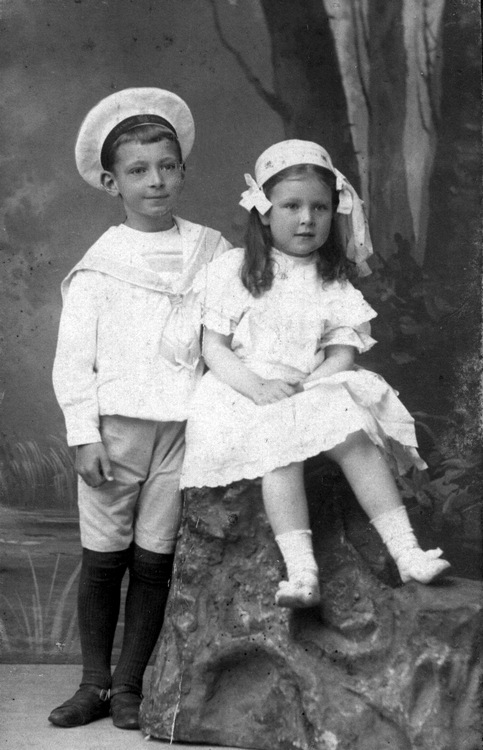
Ivan Makarovich Dadykin
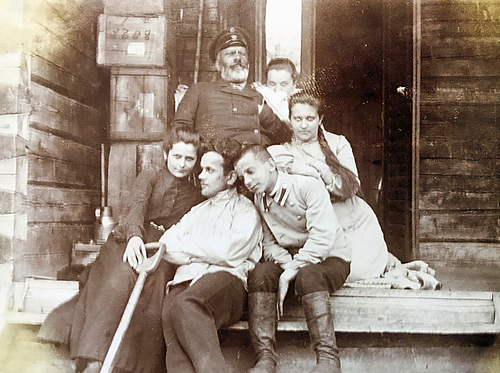
Glafira, bottom row: Olga, Andrey, Ivan, 1900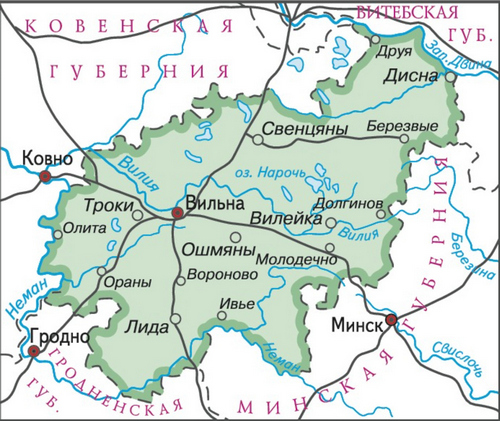
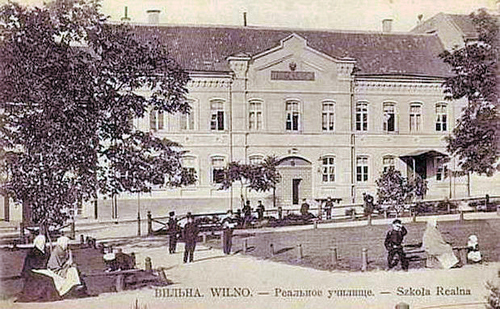
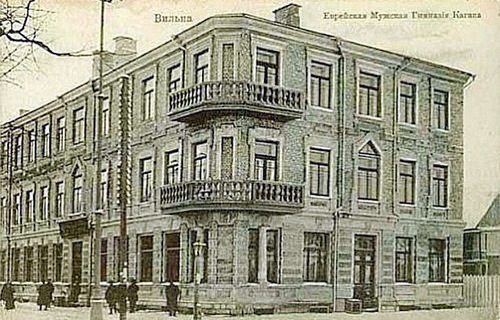
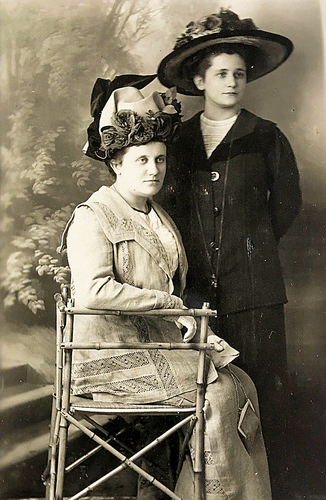
Maria Ivanovna Dadykina
Children of Ivan and Maria Dadikin.
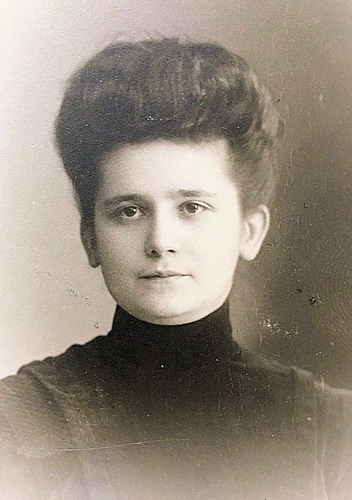
GRANDPARENTS
Peter (Nathan) Osipovich Rabinovich
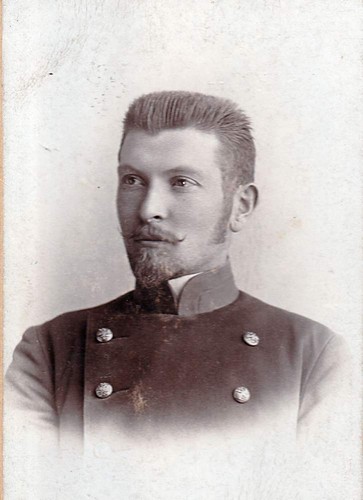
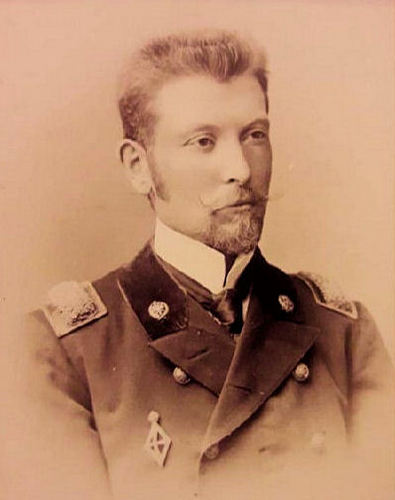
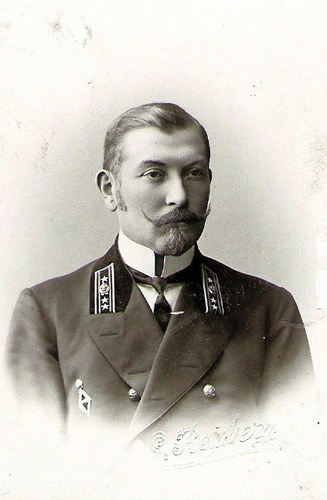
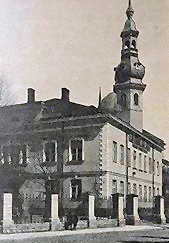
1843-1909, Revel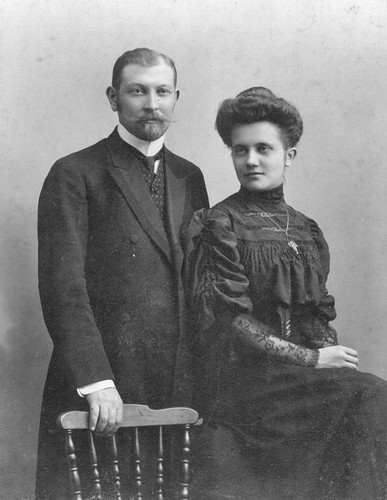
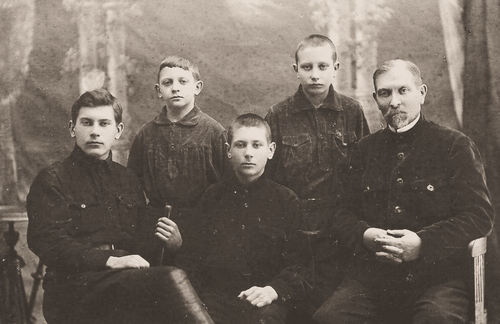
Ivan, Rostislav,Vsevolod, Pavel, c.1924.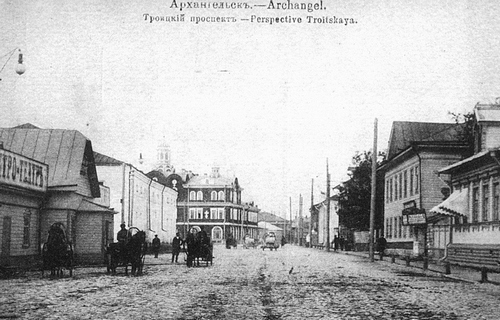
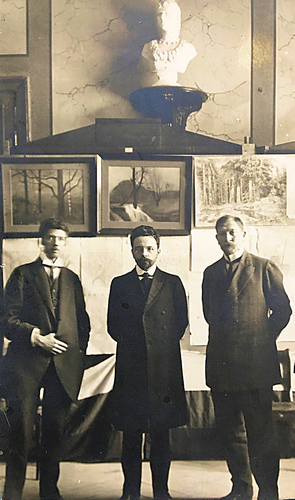
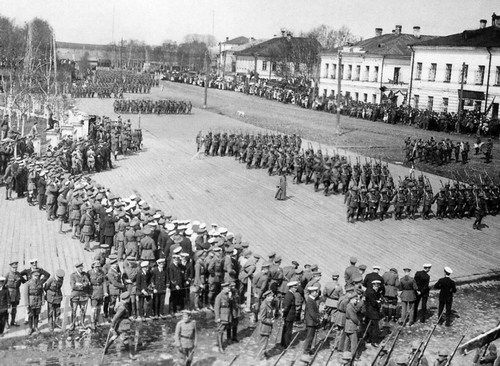
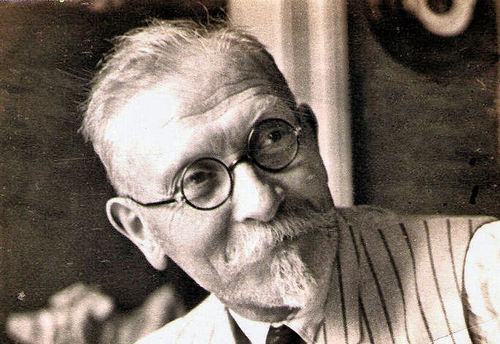
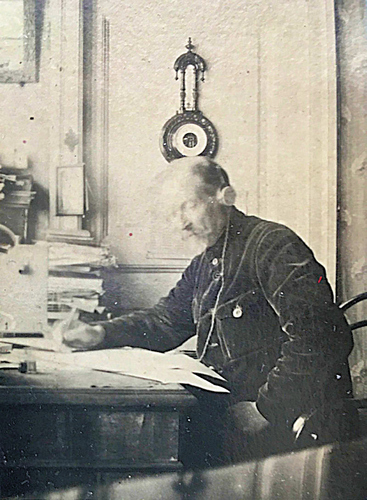
Vasily Panfilovich Boykov
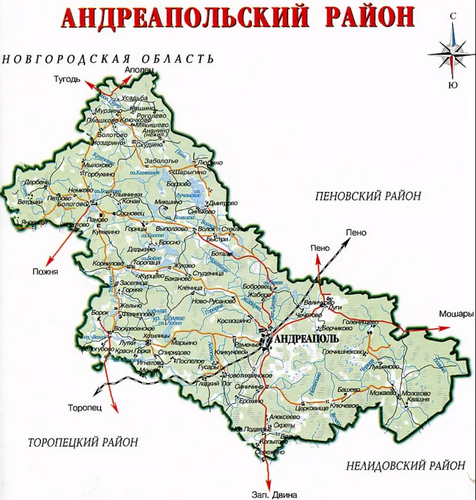
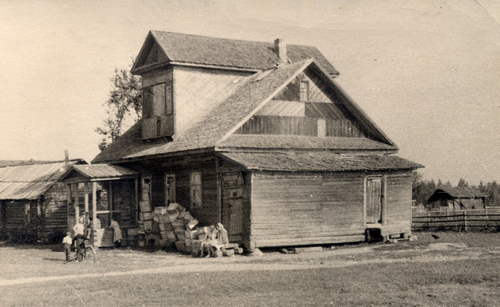
1) according to his social status he cannot be an enemy of the Soviet power, because for 14 years he was a worker,
2) for the last 8 years he has been working as a carpenter, the tax was paid, personal taxation was taken off by prosecutor's decision,
3) during the grain procurement he was not at home, thus he could not conduct any subversive work in his village,
4) the accusations are based on settling personal scores.

"Hello, dear wife Masha.
I am pleased to inform you that I received your letter of December 27, 43, for which I thank you. I didn't know that the children had moved back to their homeland and I kept writing them letters and receiving nothing. I gave Nina a telegram, but there was no answer. All the time I was thinking about the children. Masha, I received your letter, I've been missing you, and I want to go home. Masha, if you get my letter, go to the district executive committee and ask
from them to give me a summons. On the call they will give me a ticket and I will come home. When you go to the district executive committee, talk to the chairman of the village council. Maybe he'll help you, take the summons and send it to me. Masha, I work at the collective farm, making wheels and sleds. It's a lot of work. I eat well, I dress warmly. I bought a fur coat. Masha, why do not you write me anything about Vanya and nephews. You write that Nina has moved in with Vera. I don't know if Misha's nephew is dead. Did Nura come with Nina or stayed in Ufalei? Write everything in detail. Then goodbye. I send my best regards to my wife Masha and Praskovya Yegorovna and to all the relatives and my friends. Your Vasya.Grandmothers




"Dear Petya, please accept this cushion made by me as a present on your birthday. Put it on the sofa and think of me while you are looking at it. Your Glasha".
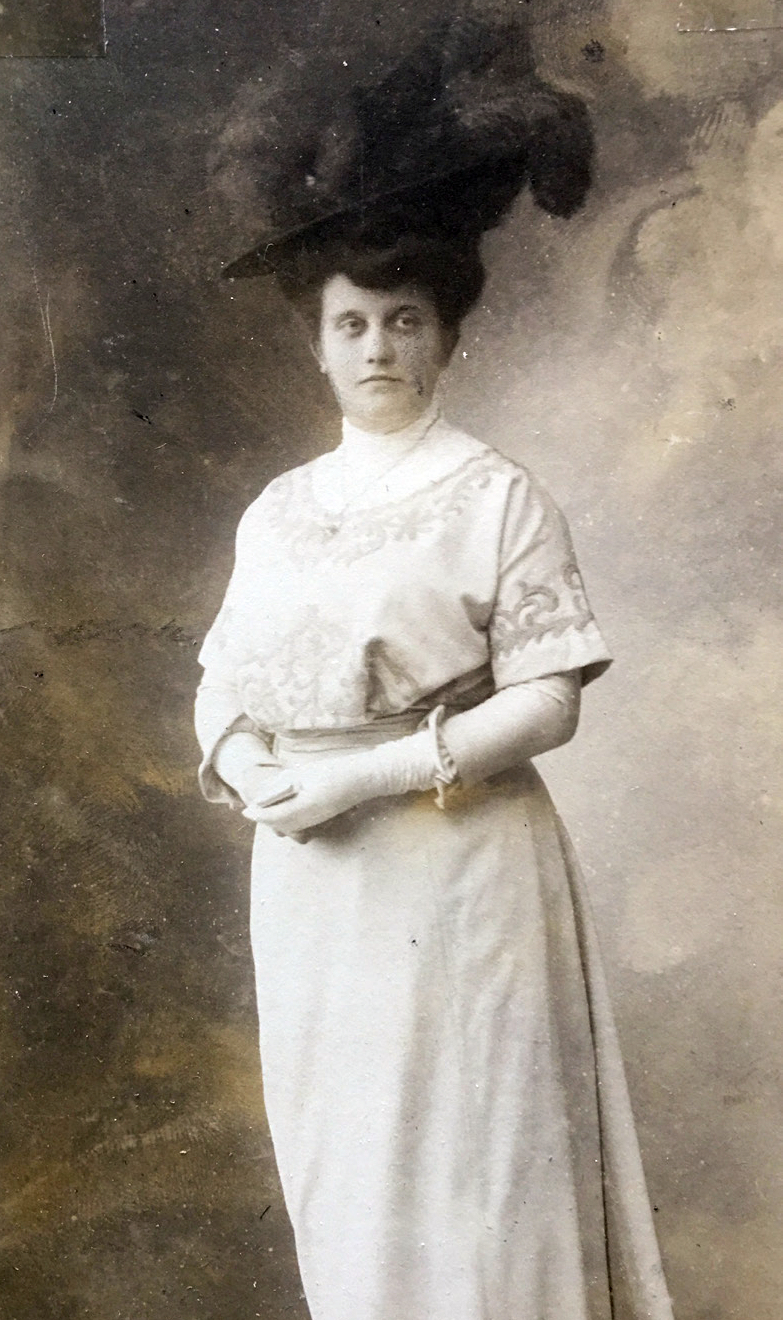


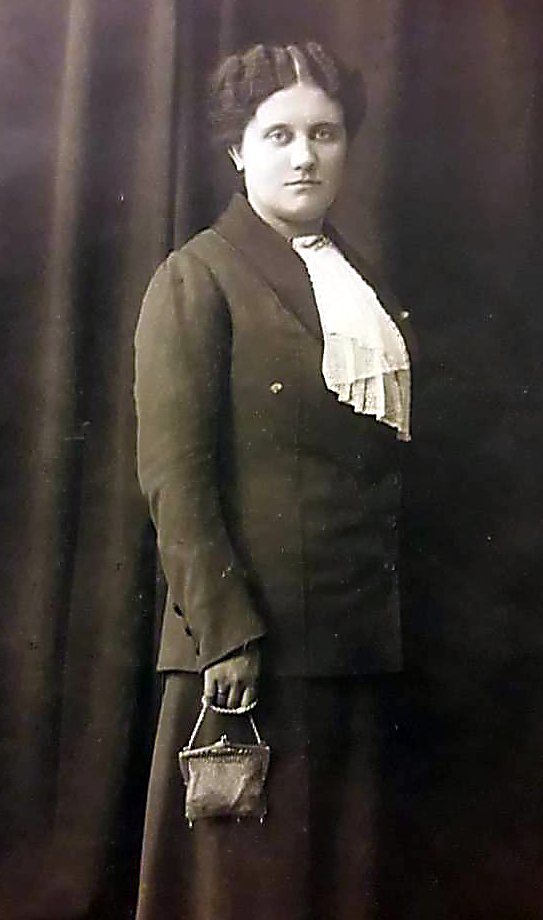
. 43 Kantaurovo, Gorki Region, Borsky District.
Here Peter Osipovich and Glafira Ivanovna received news of the disappearance of Pavlik, who was on his way to them from Kaluga. Soon Peter Osipovich passed away. He died on 1 May 1942."I got up at 4 o'clock in the morning and fried pies with rice and keta until six o'clock. At six o'clock Lelya got up, fed the baby and came to congratulate me. She gave me some sugar, and from Vanya she brought a bottle of cologne (a rarity nowadays) and a real napoleon cake. Vanya heard from me that I wanted to buy a pastry and have coffee with it at the commissary. He remembered all this when he left, and instructed Lelya to bring me such a present. At 6:30pm Lelya left for the distribution centre, where they only give us food on Tuesdays, and I stayed with the children.
At 8 a.m. N.A. Brzezinska came to see me. I treated her to tea and cakes. I did this while holding tiny Irina, who was already hungry and screaming her head off. Then
As you can see we are not living poorly. This is how Granny celebrated her 61st birthday.
After the war, Granny suffered a stroke, the effects of which lasted the rest of her life. Next stroke she did not survive. Glafira Ivanovna died on December 1, 1956. and was buried in Vvedenskoye Cemetery.

Maria Yegorovna Boykova

PARENTS
Nina Vasilievna Bratseva

Maria Yegorovna, 1932-1933.
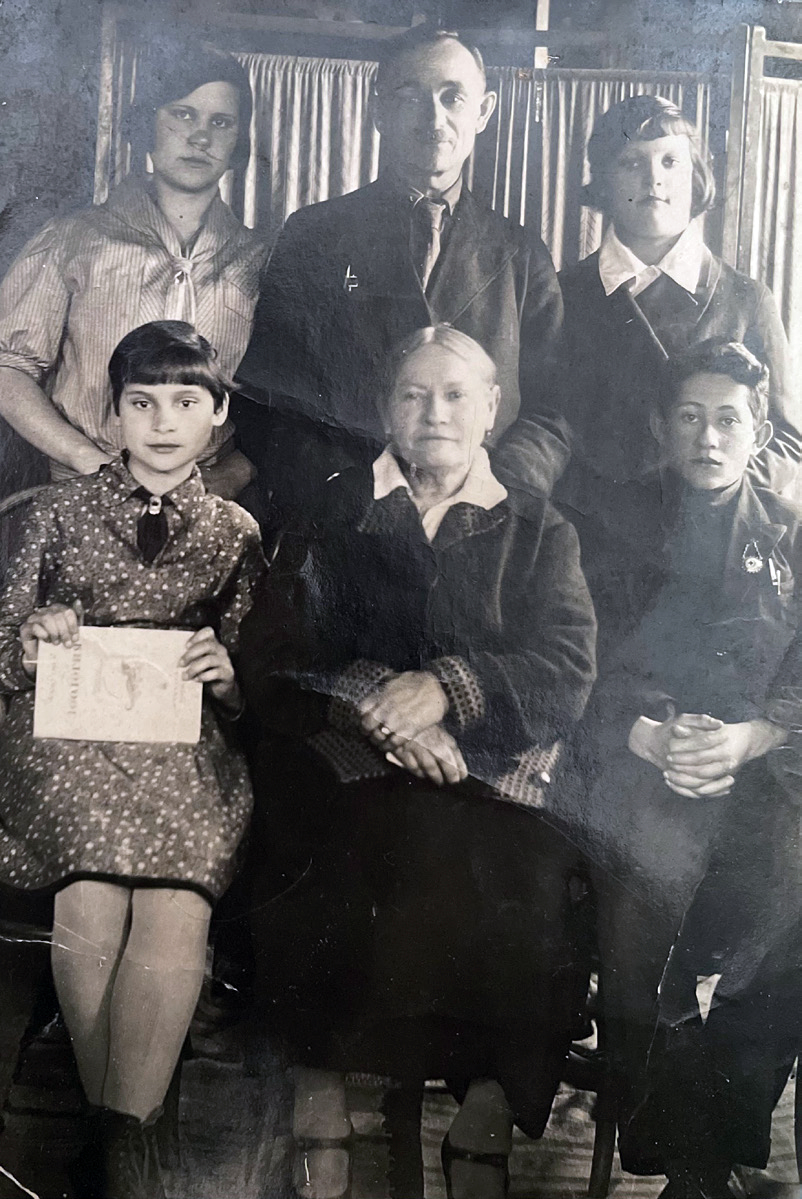
Shura right in the second row, 1939.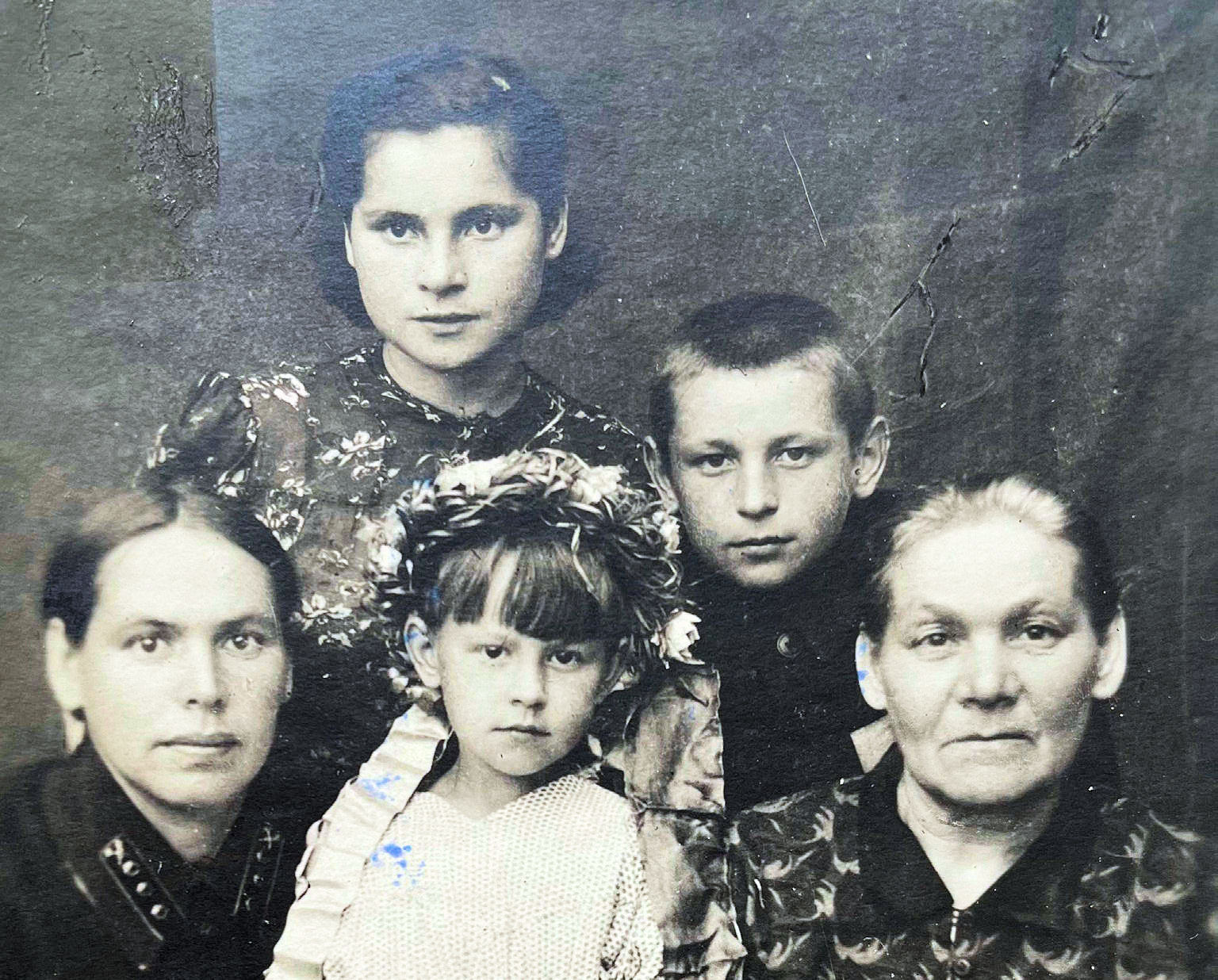
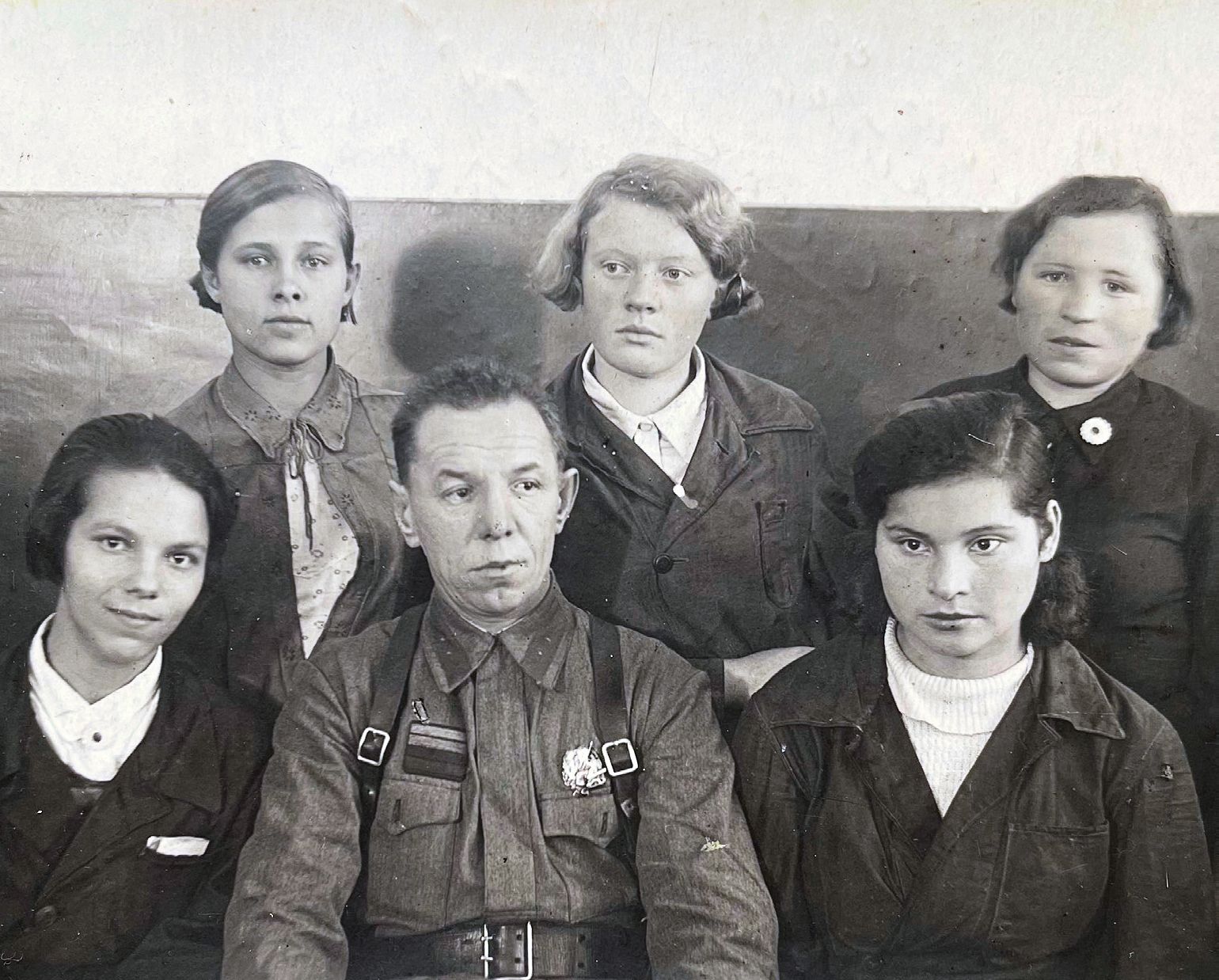
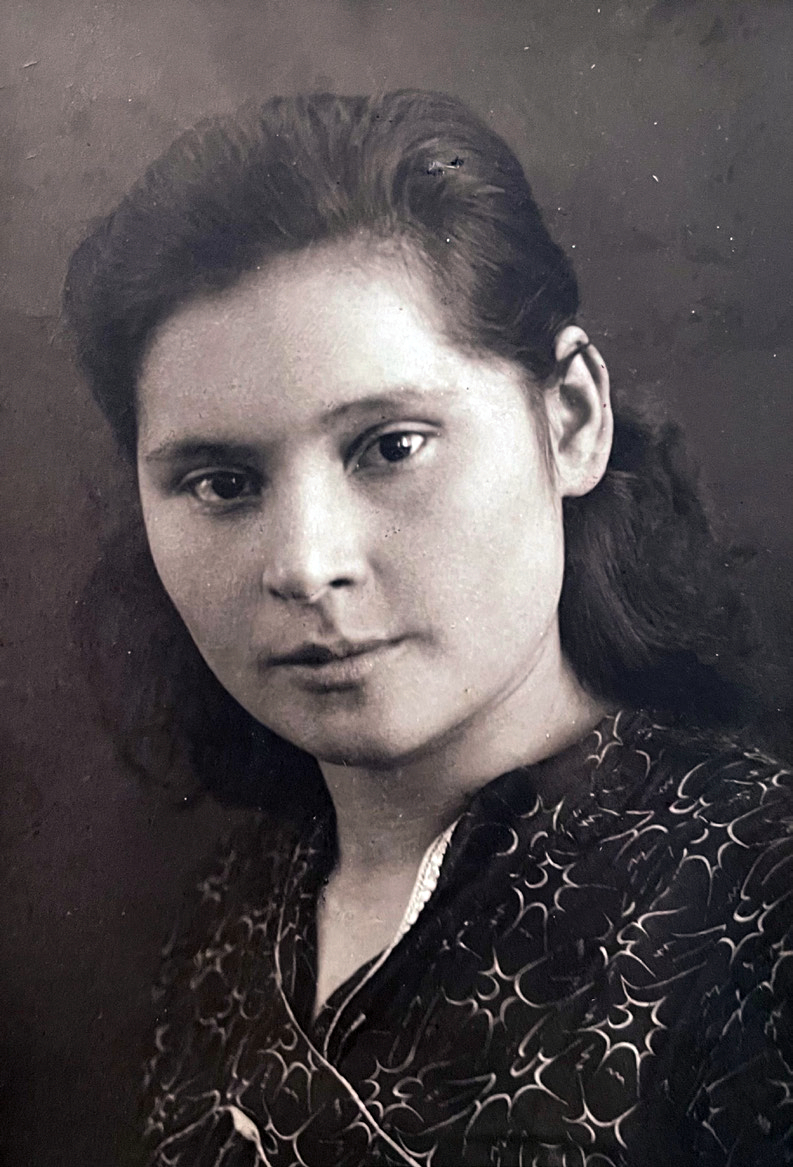
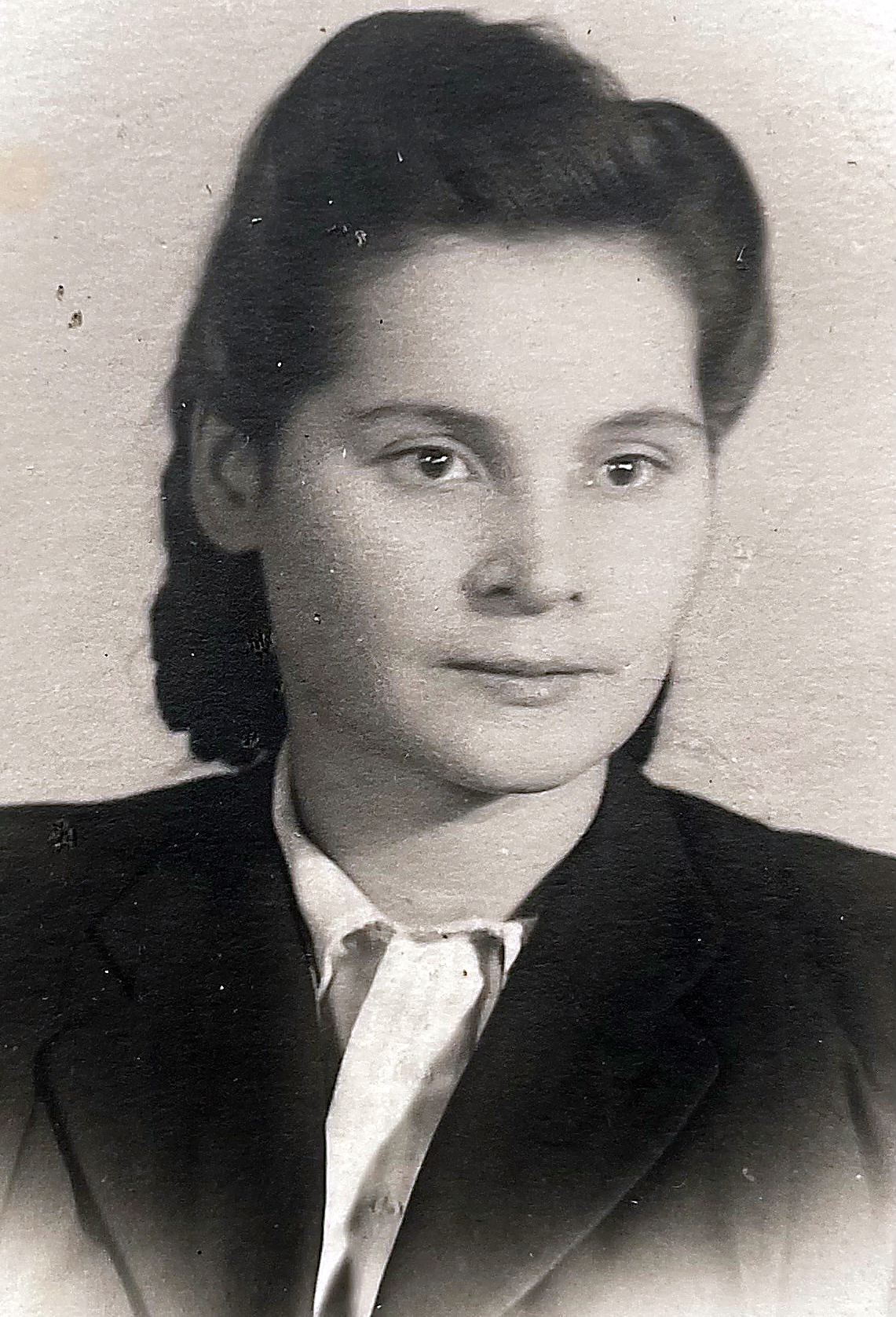
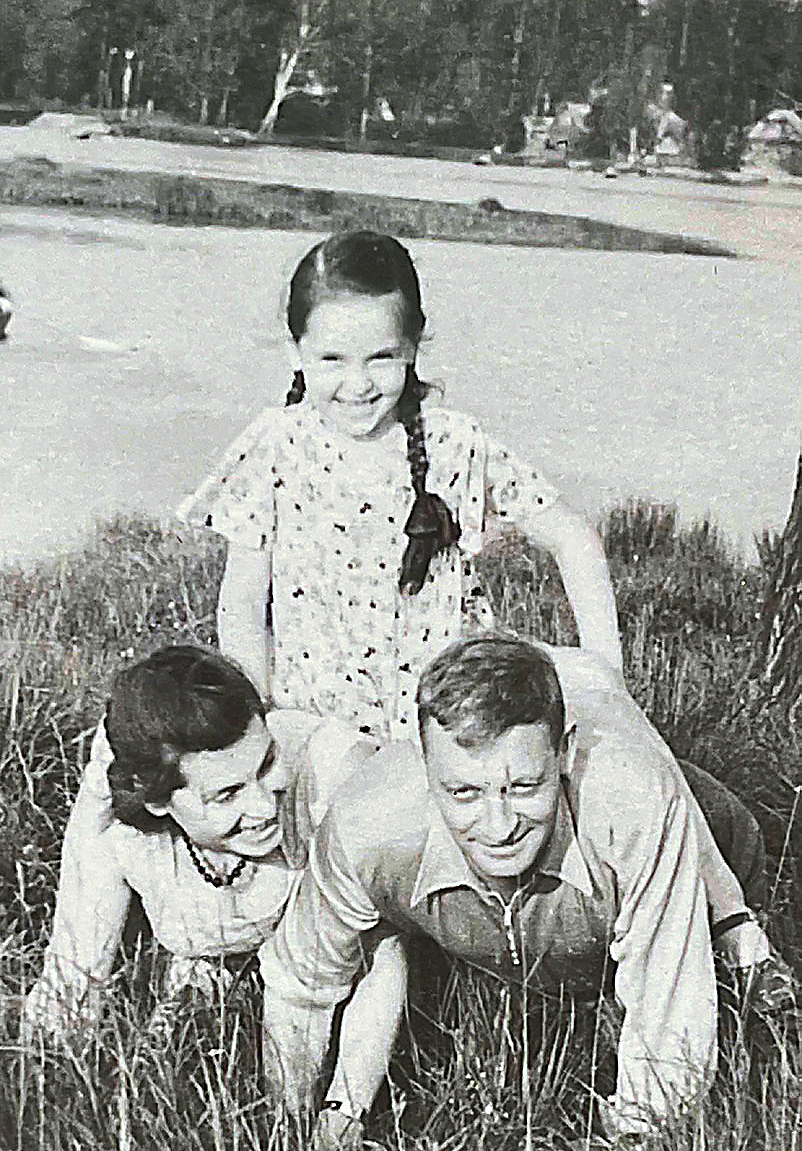
Alexander Alexeyevich Brattsev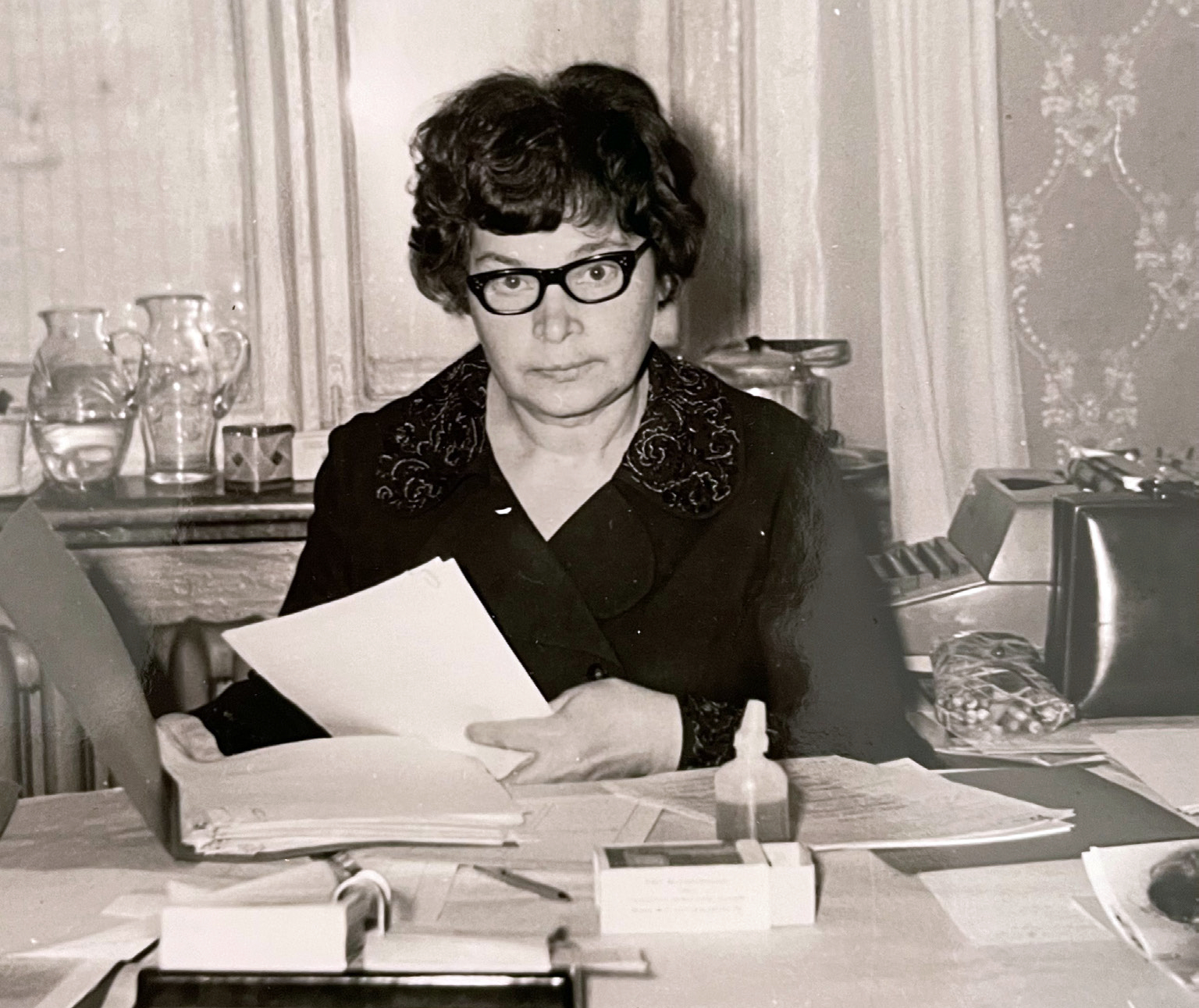
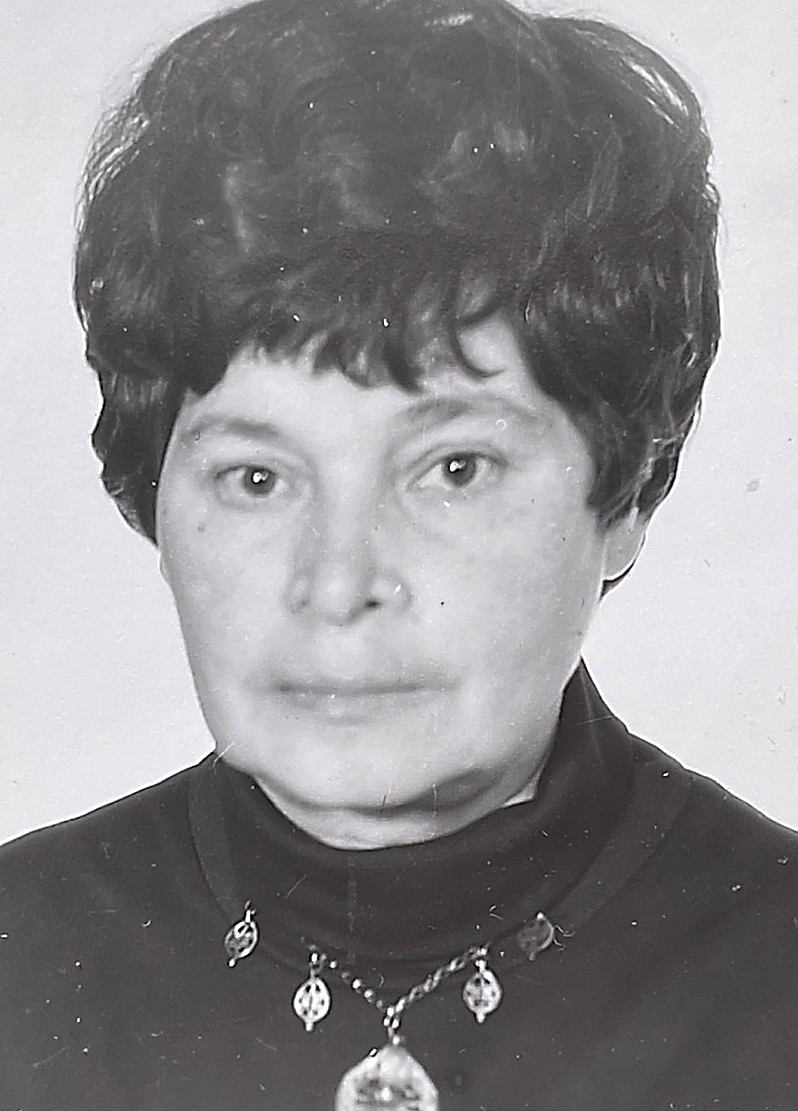
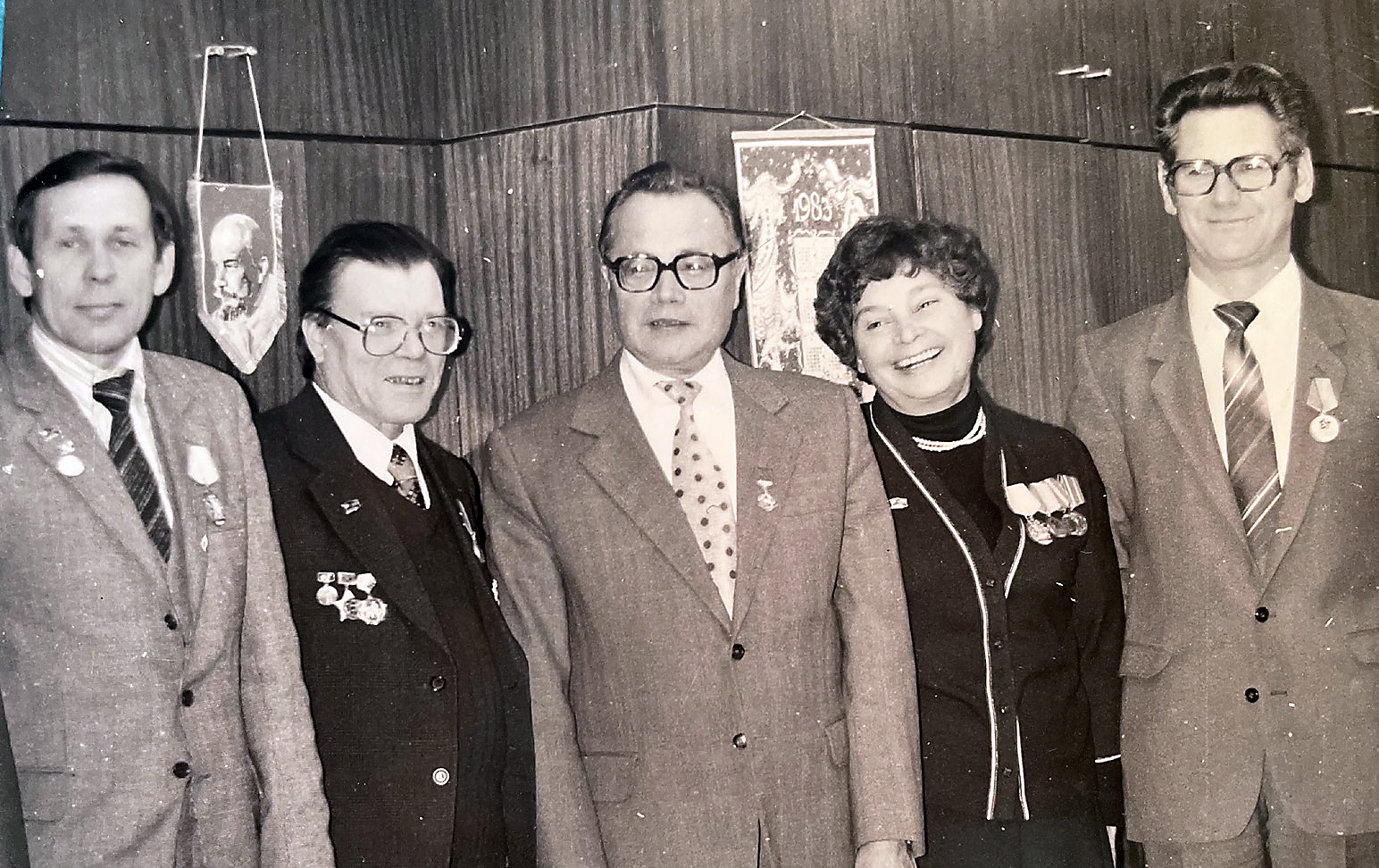
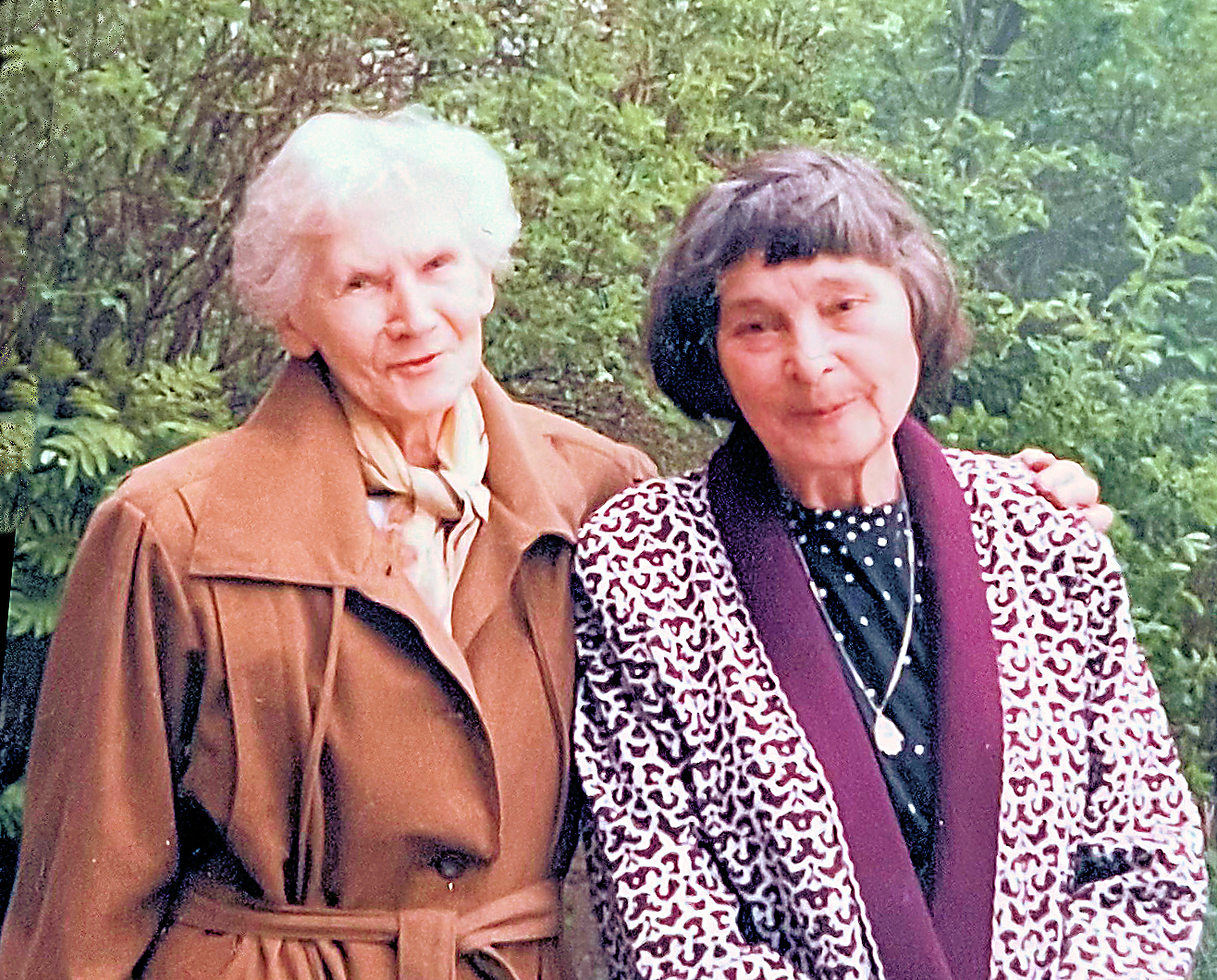
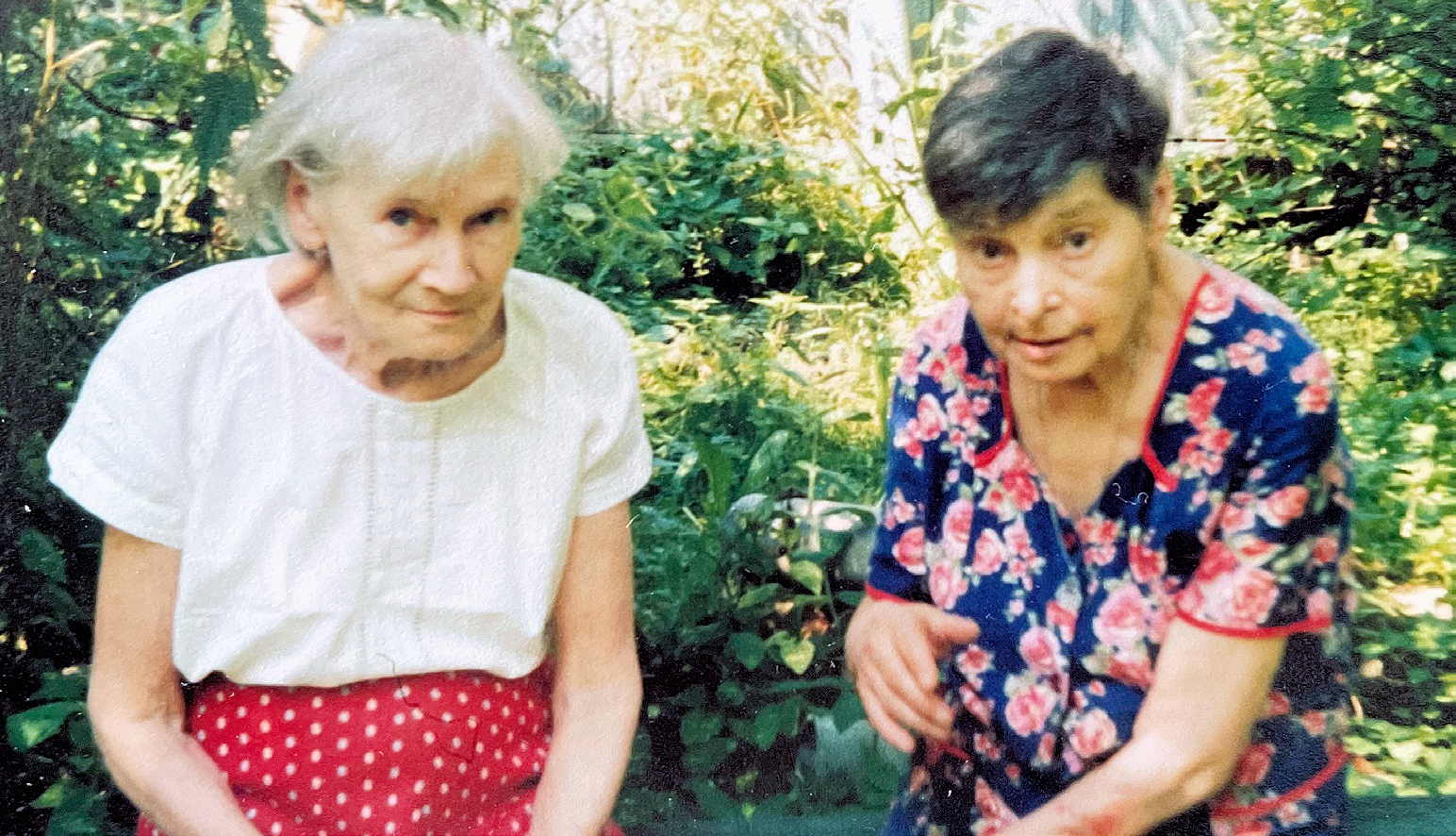
with Zoya Nikolaevna Yakhontova, 2001.Rostislav Petrovich Dadykin
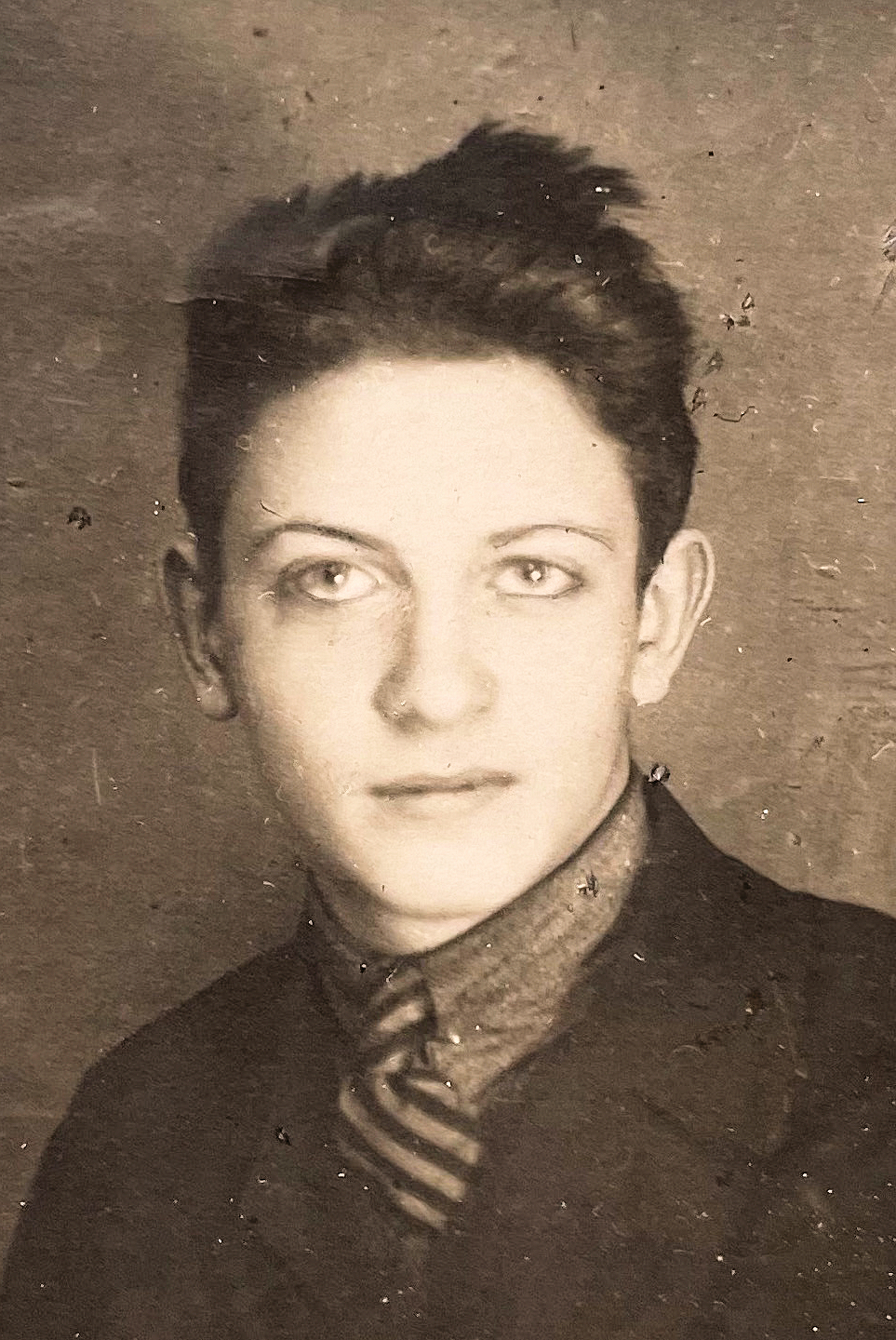
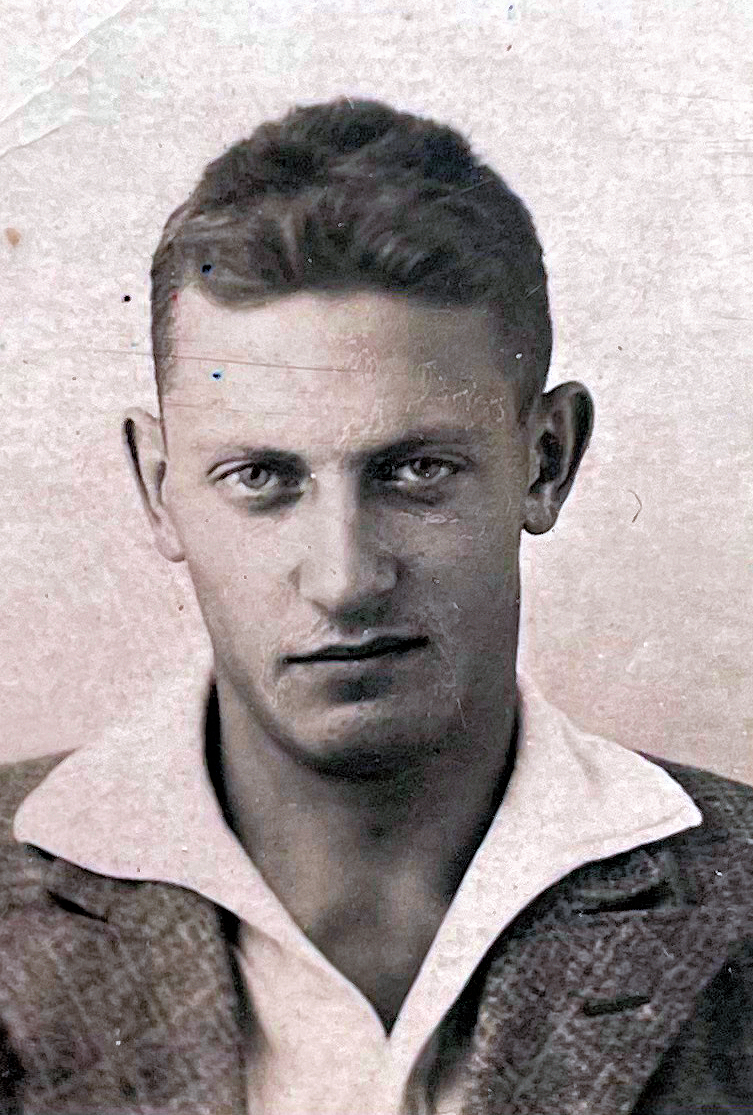
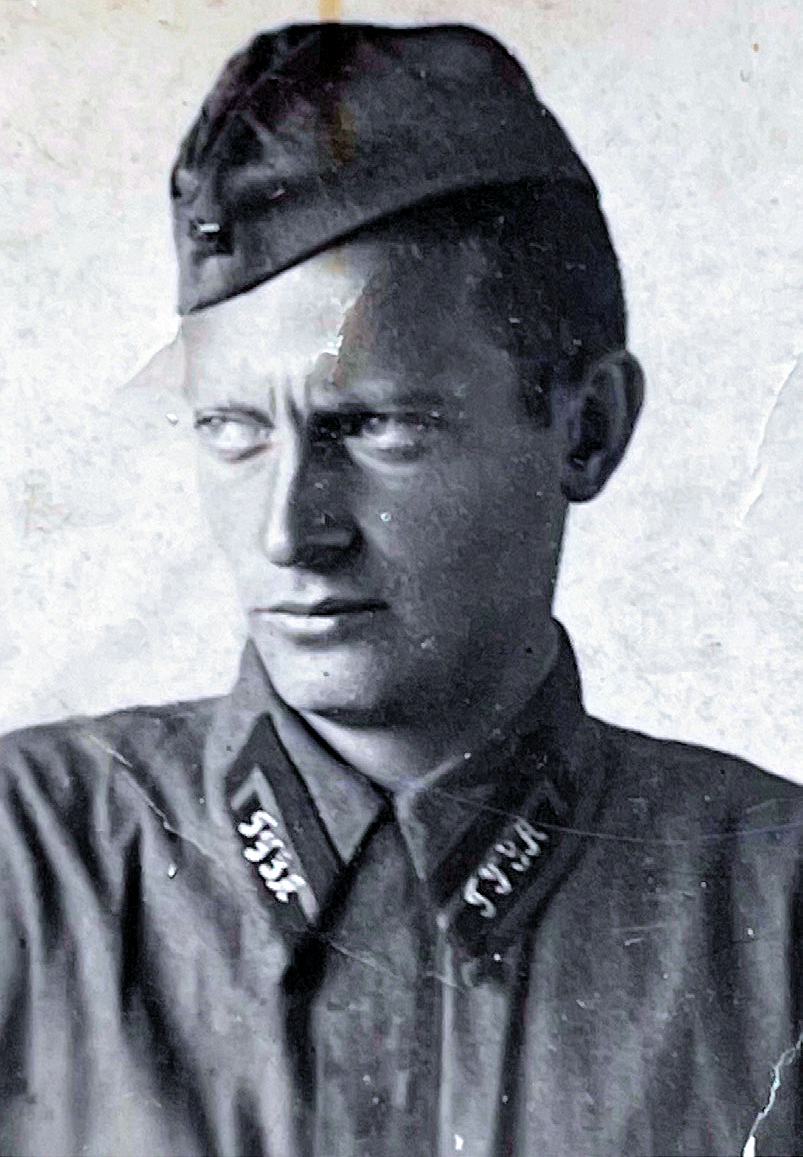
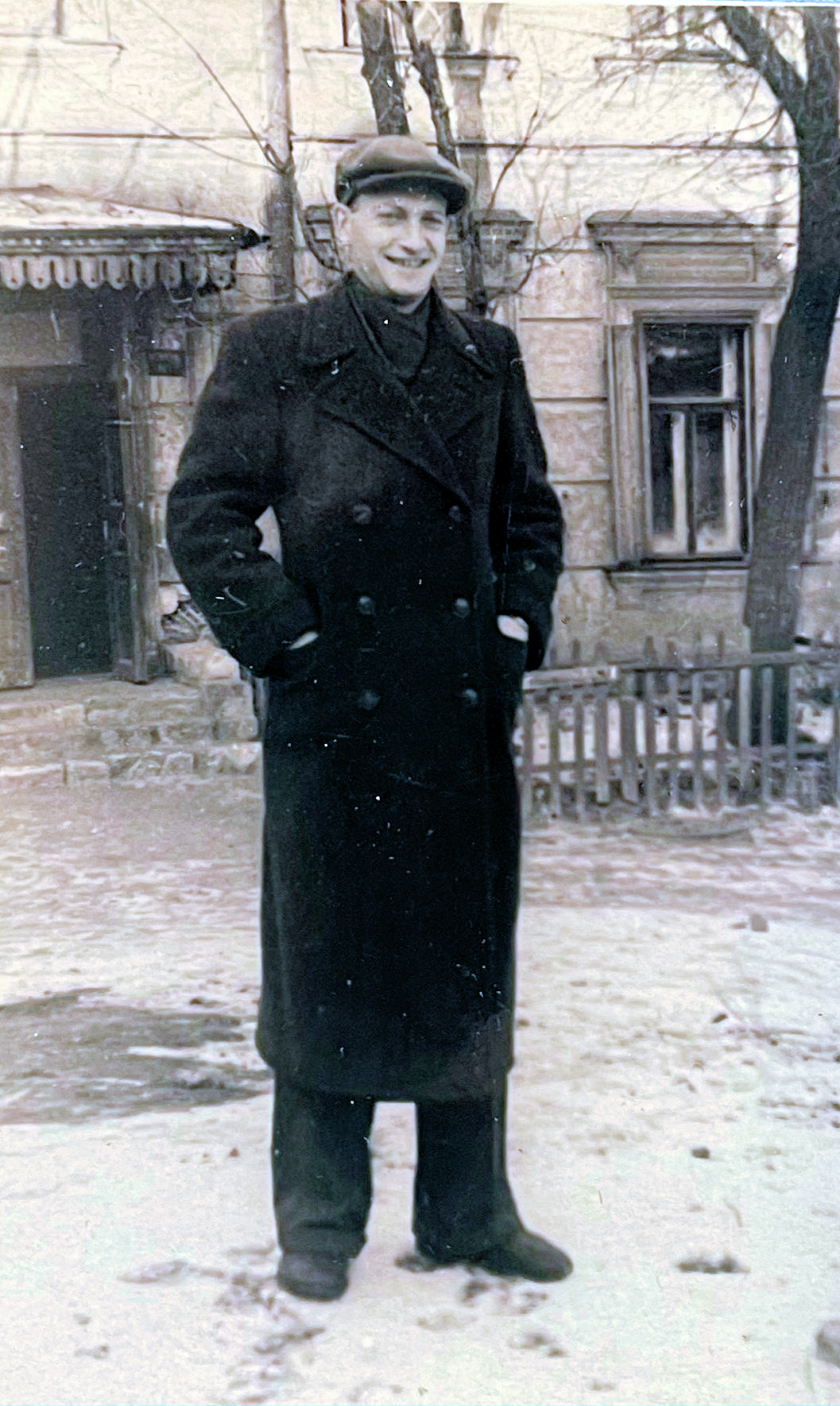
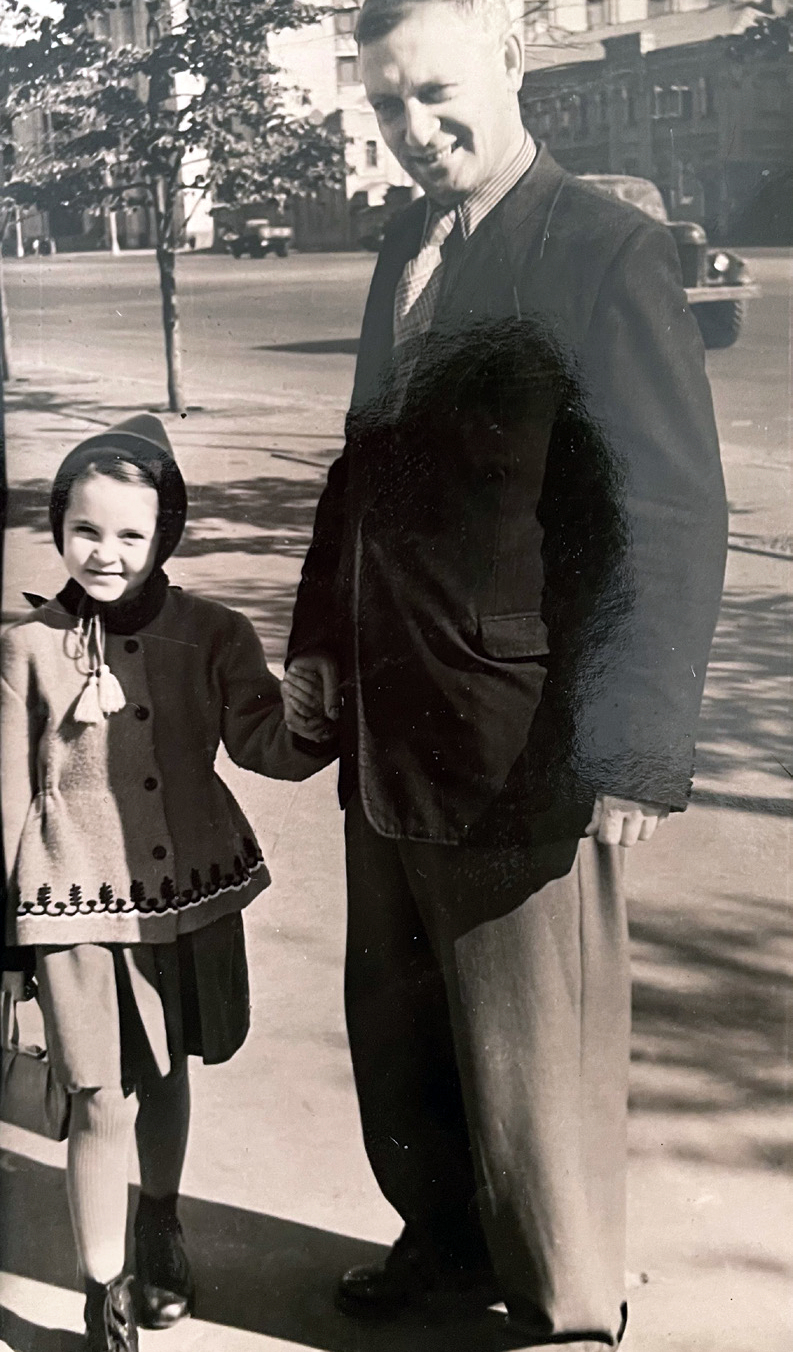
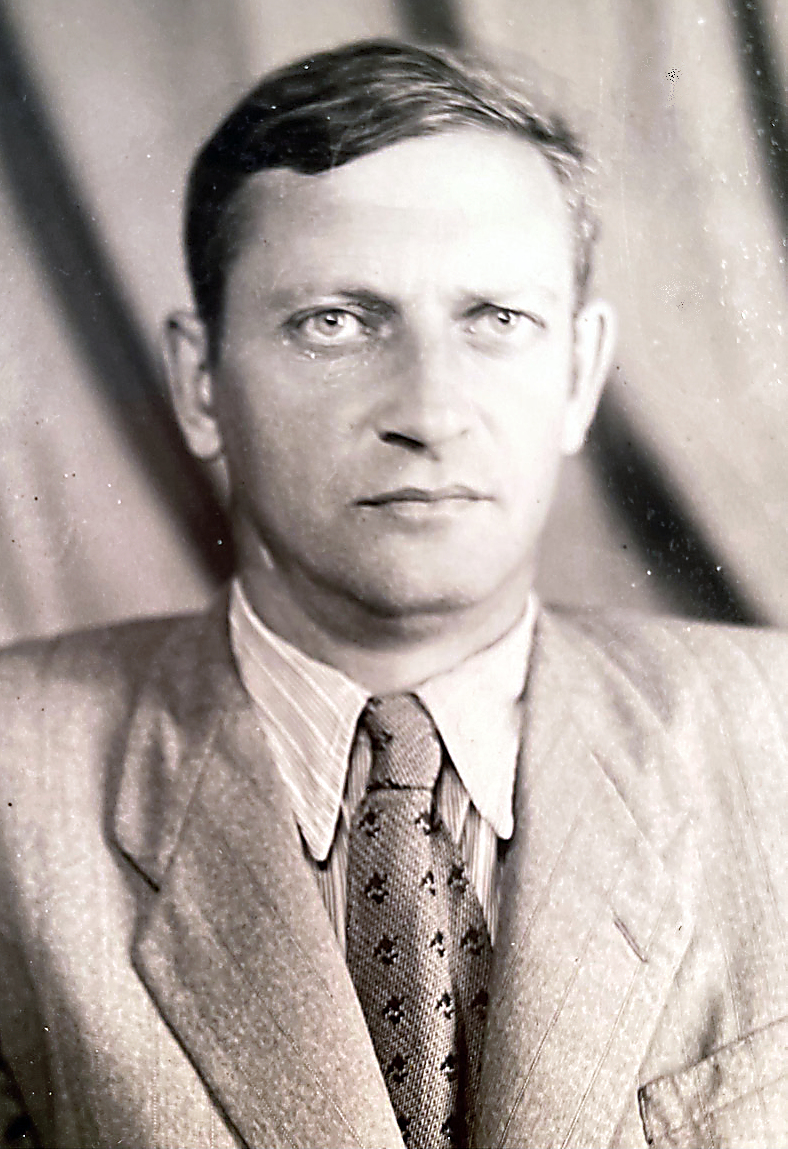
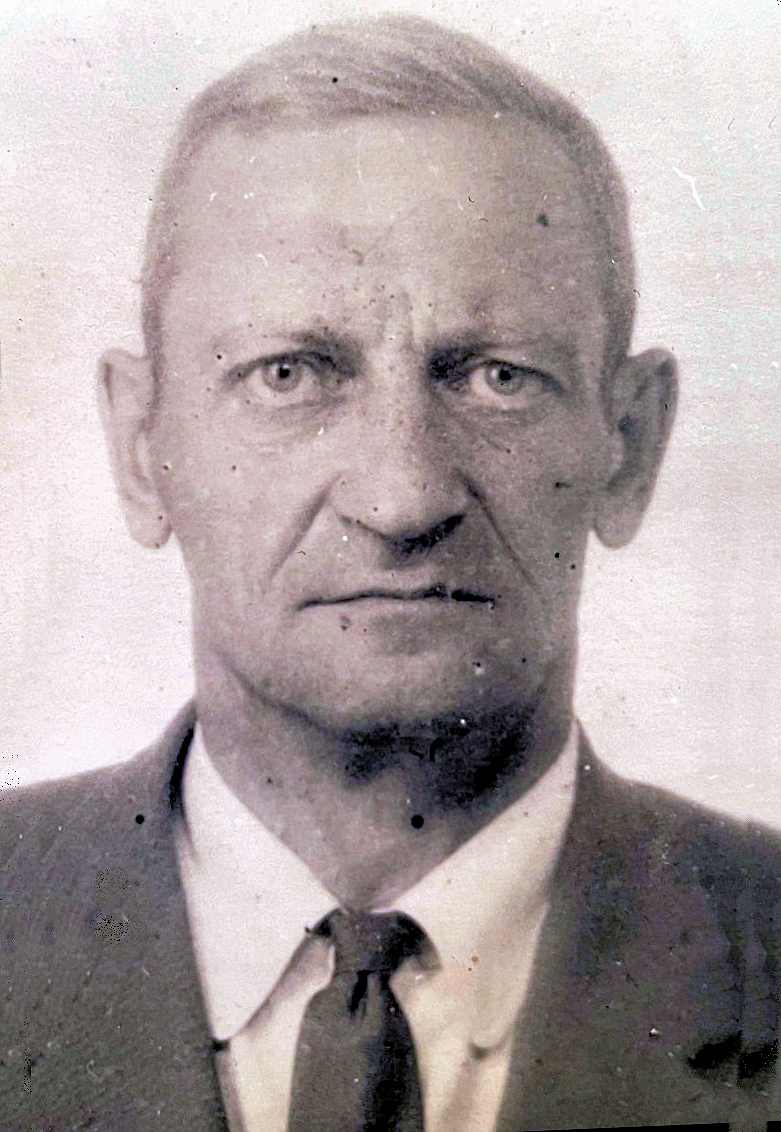
Our flat and its inhabitants
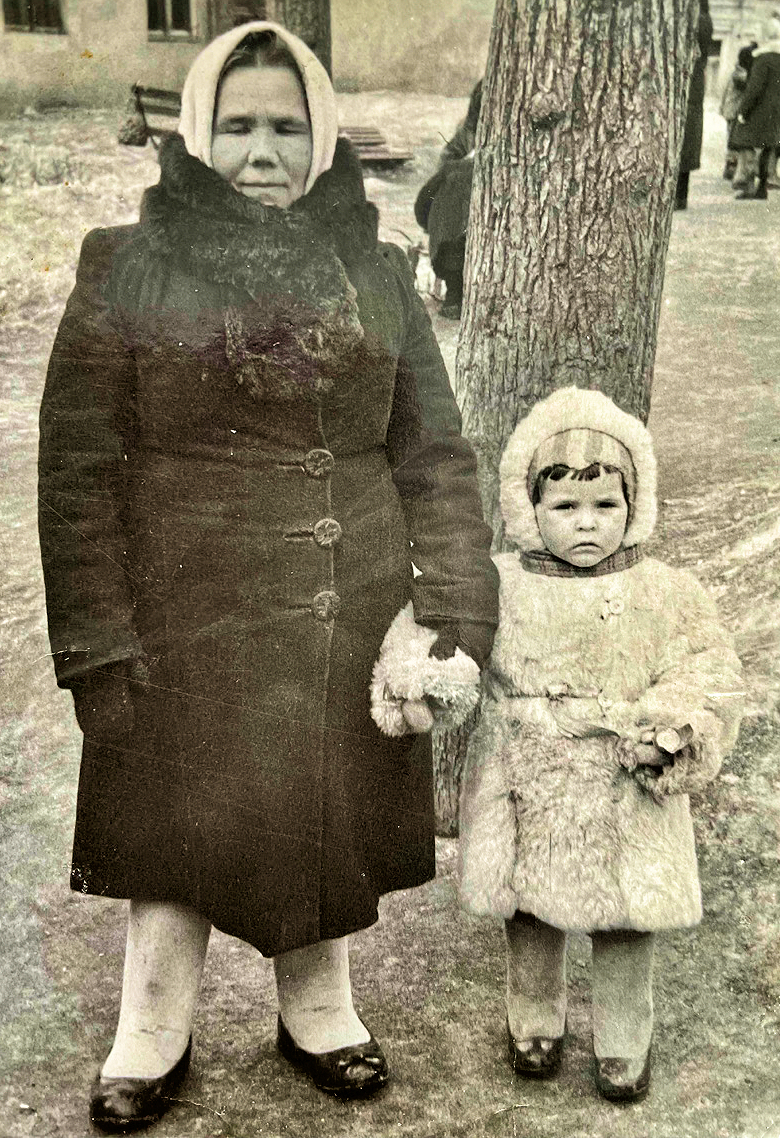
The Boykows. My mother's sisters and brother
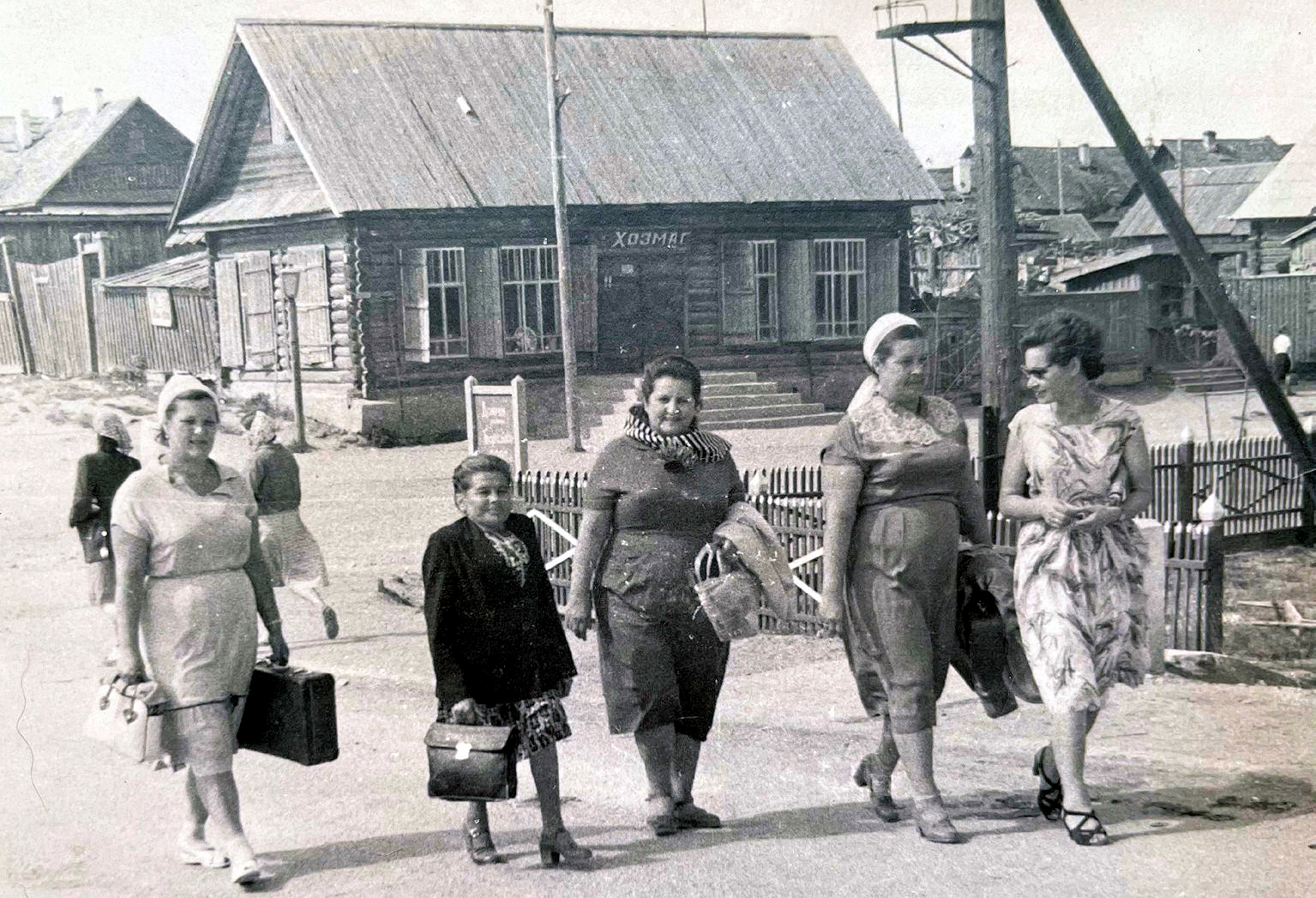
Maria Vasilievna Shabokhina
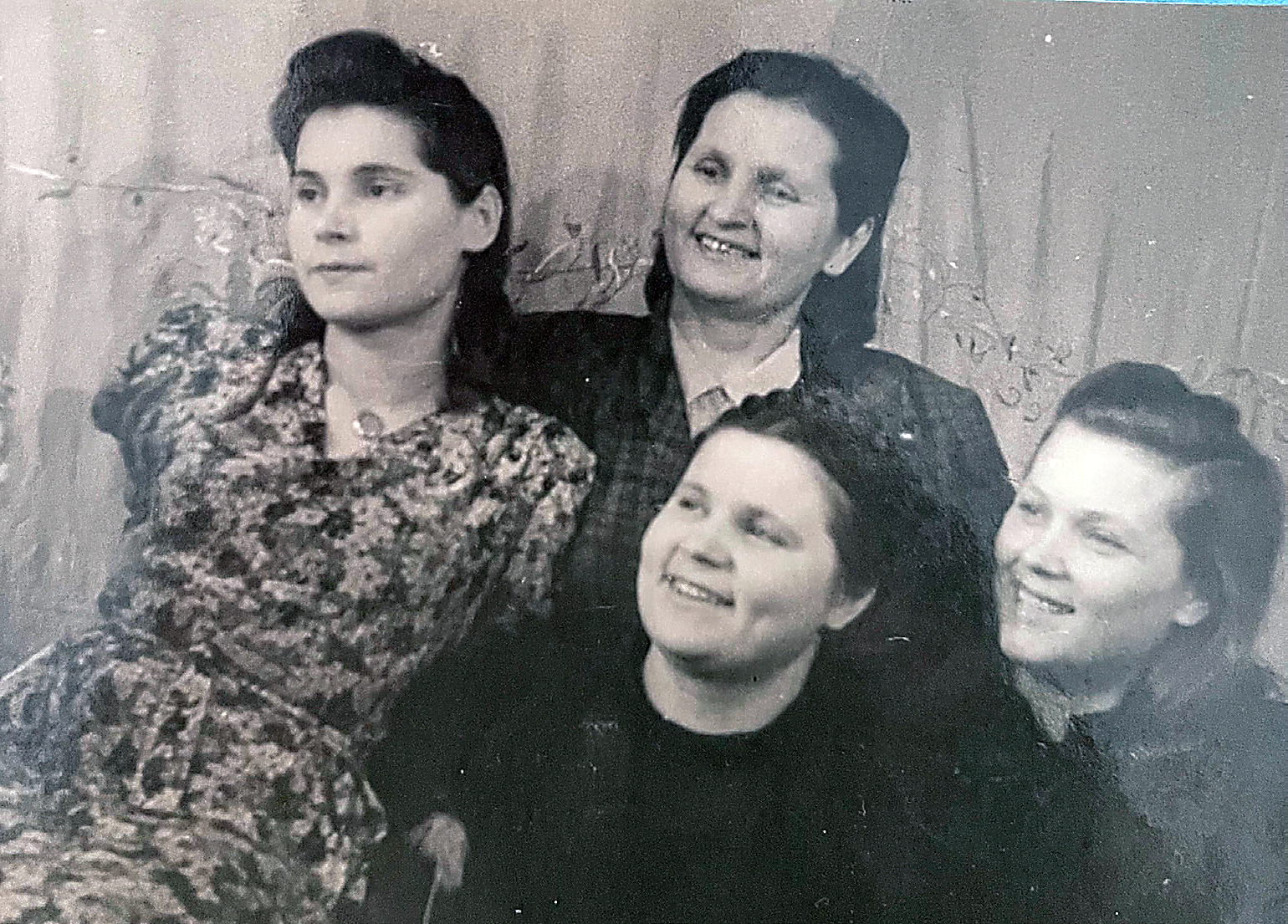
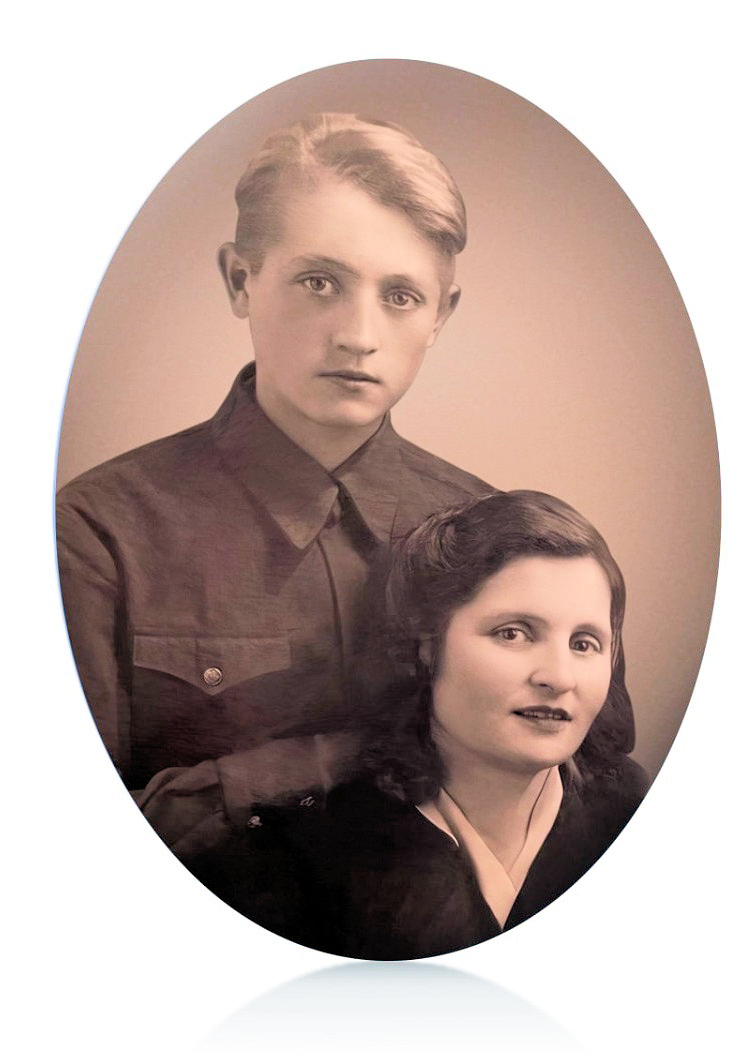
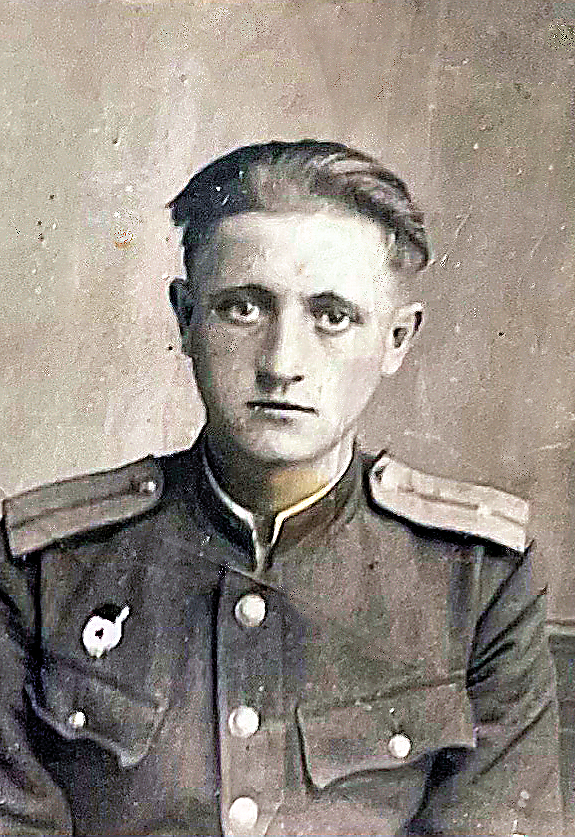
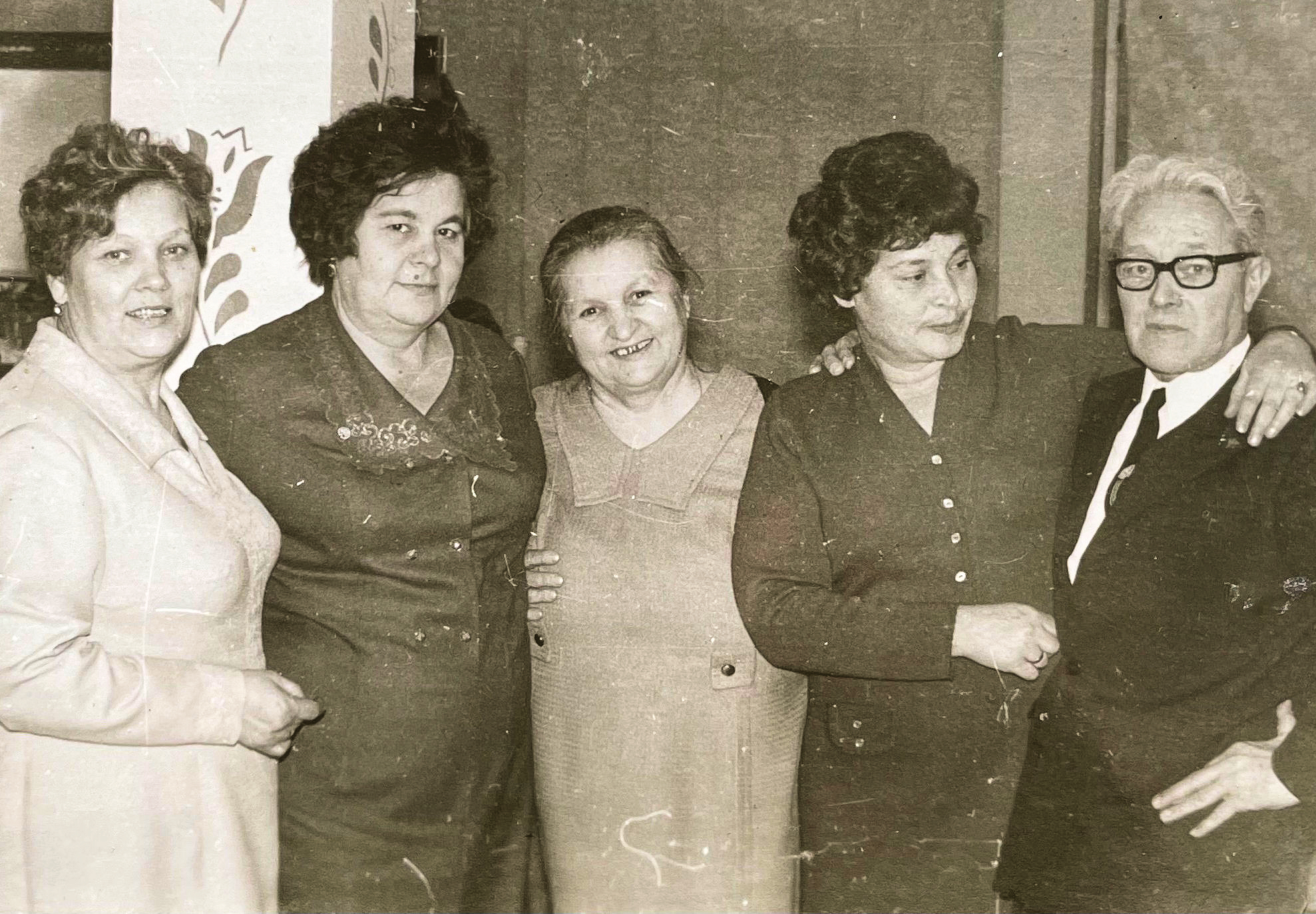
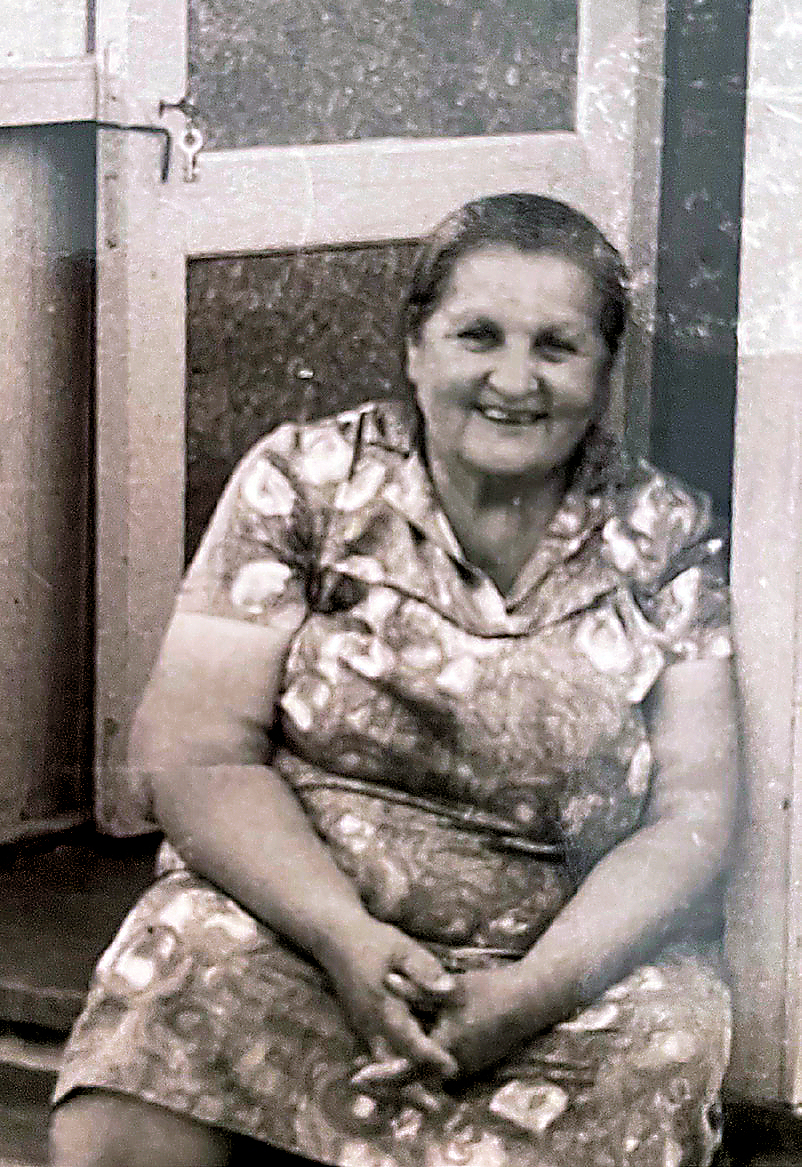
Ivan Vasilyevich Boyev
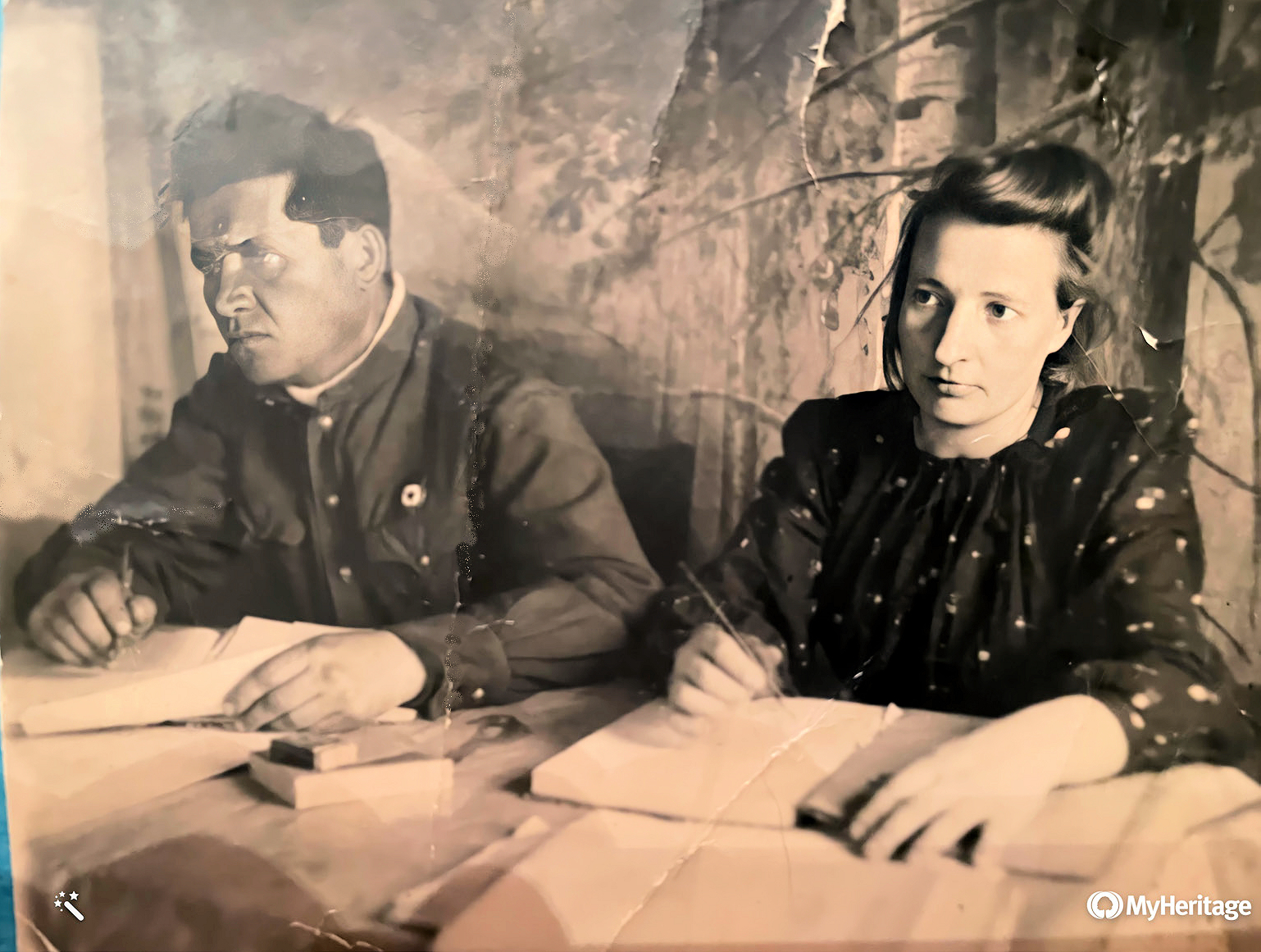
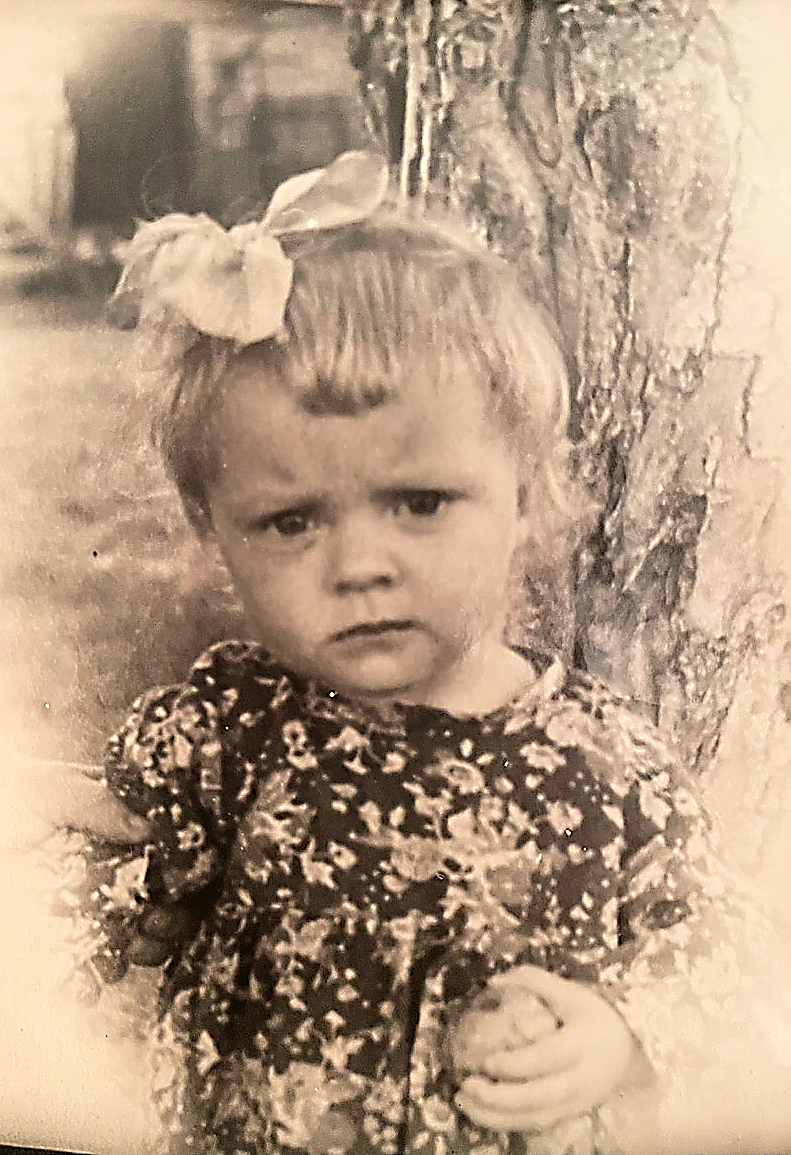
Vera Vasilievna Lebedeva
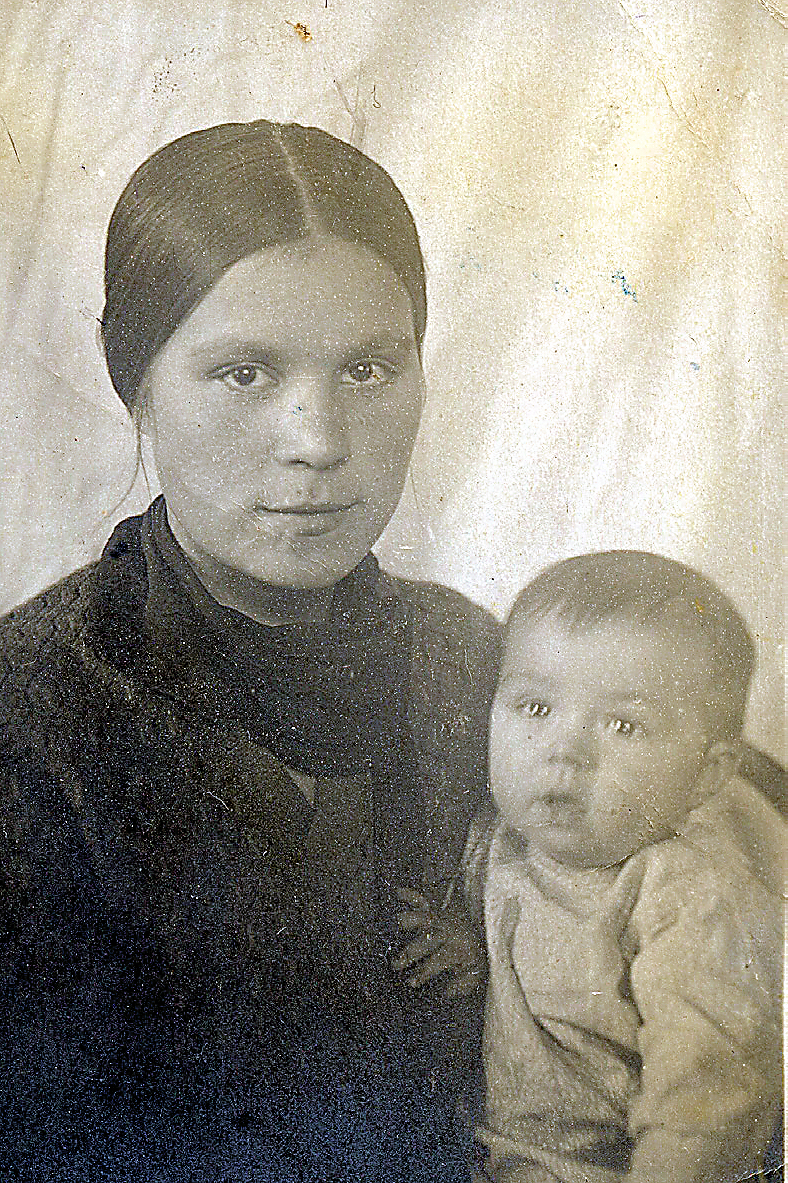
"What kind of a partisan is she, her father was dispossessed and is imprisoned as an enemy of the people,"
Vera was released.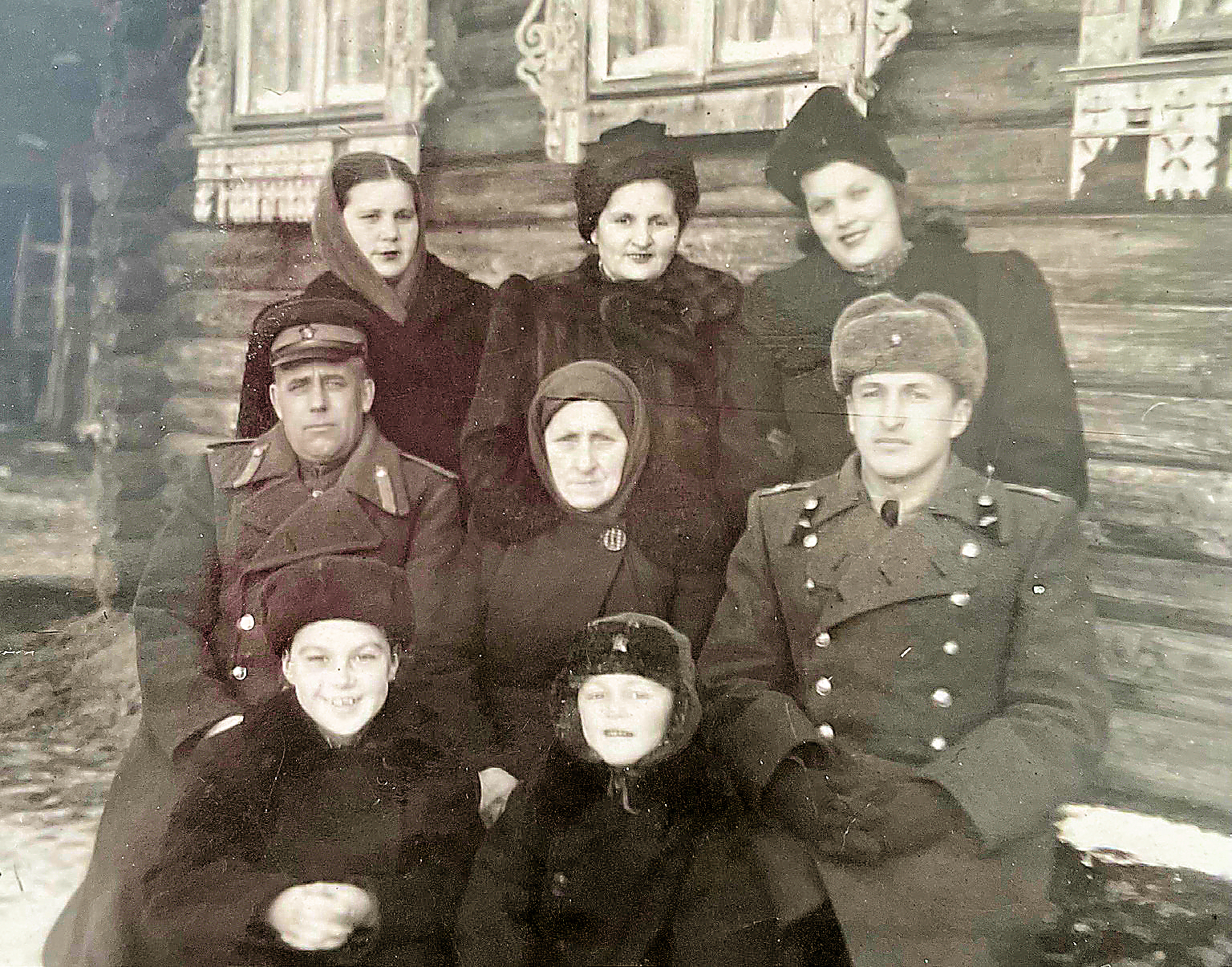
Valera and Misha, Kushalino, 19xx.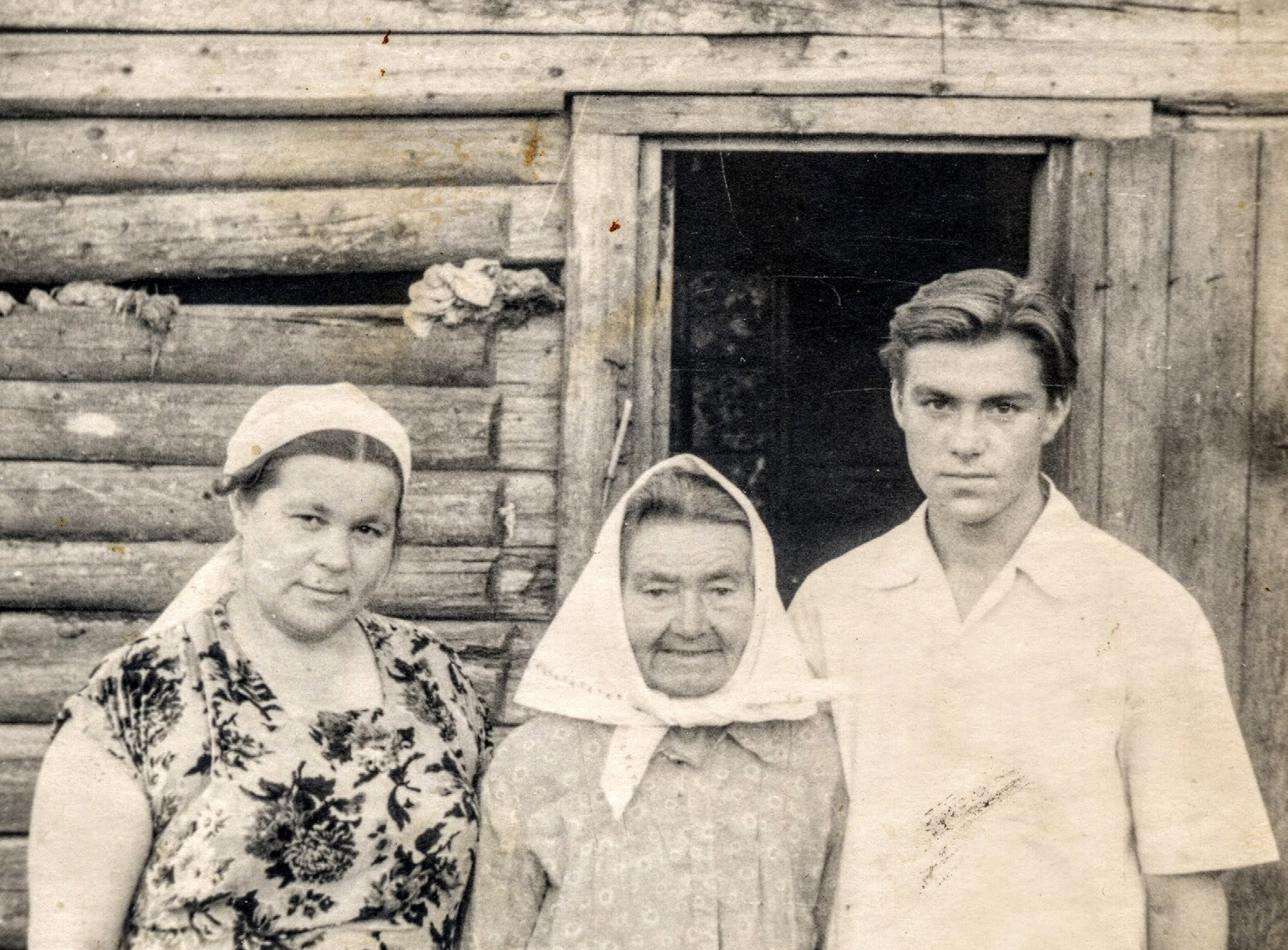
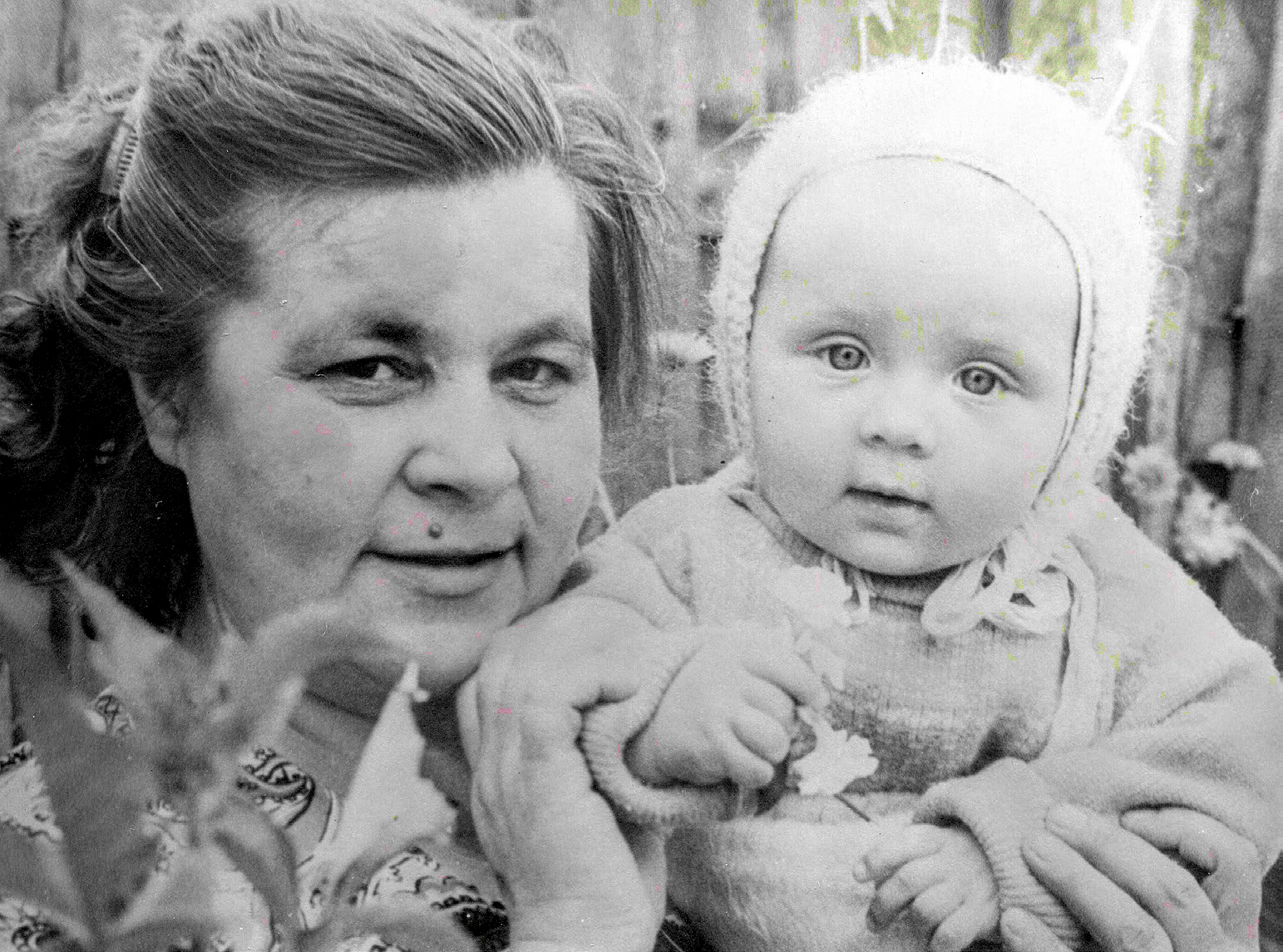
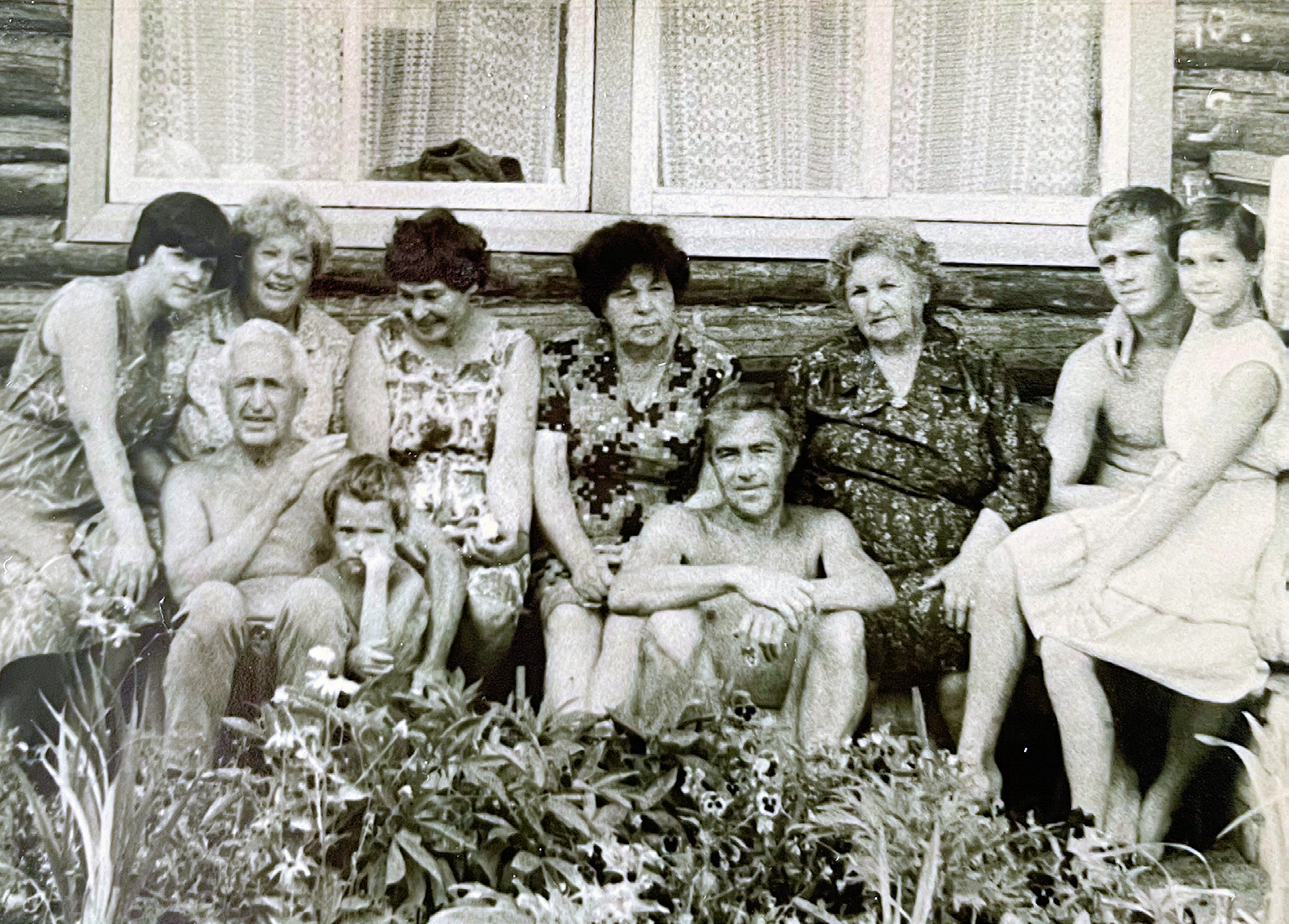
Nina, Vera, Valery, Maria, Sergei and Masha Lebedev, 1987.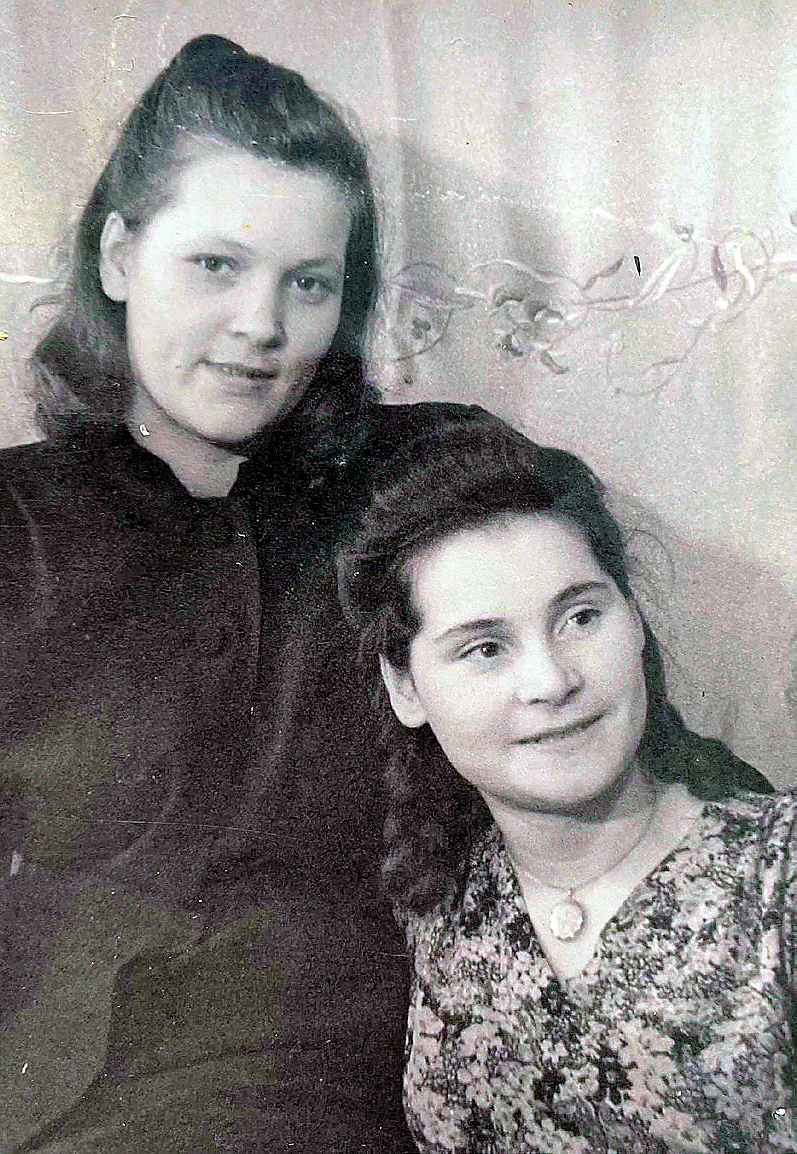
Alexandra Vasilyevna Ivkovova
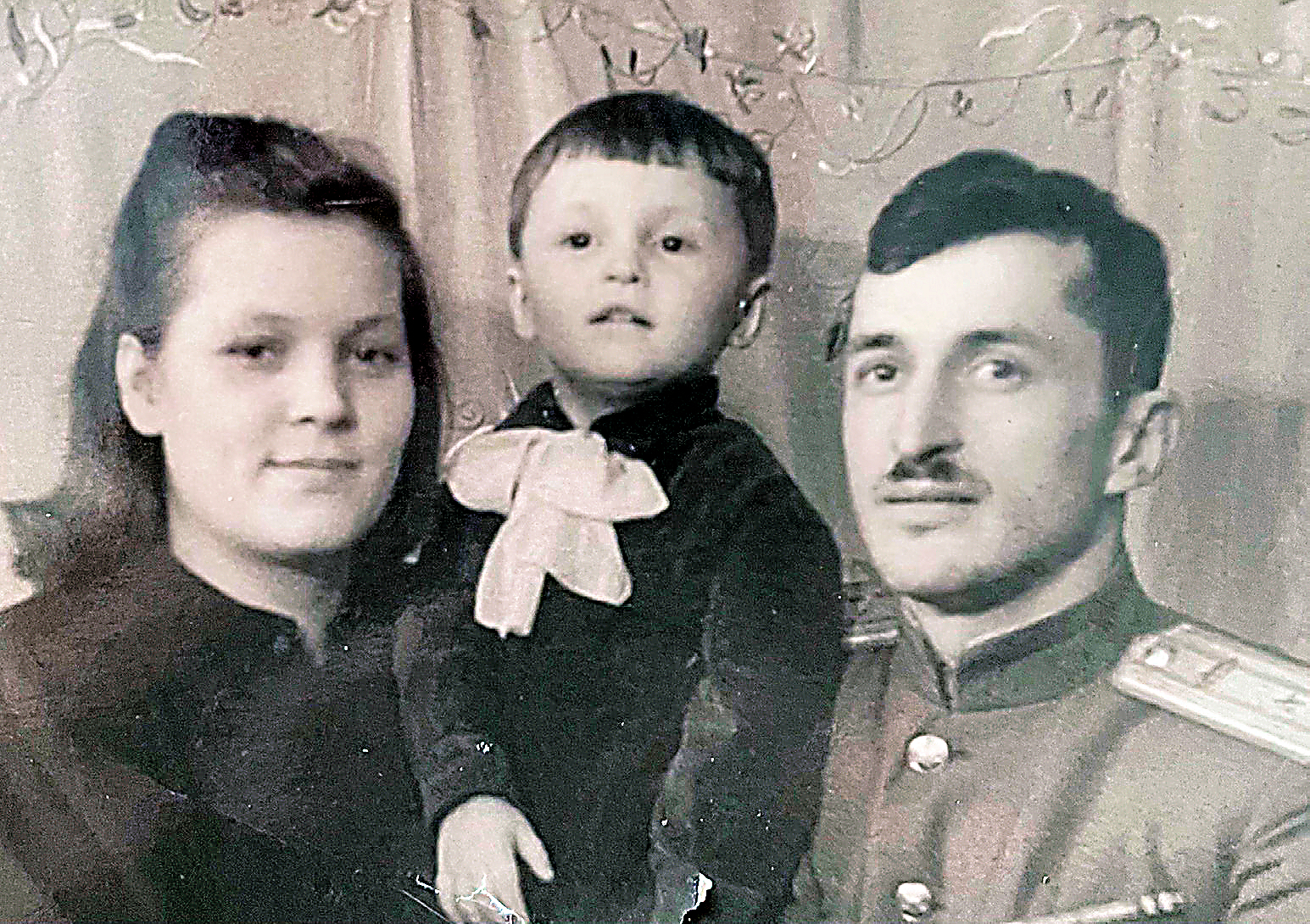
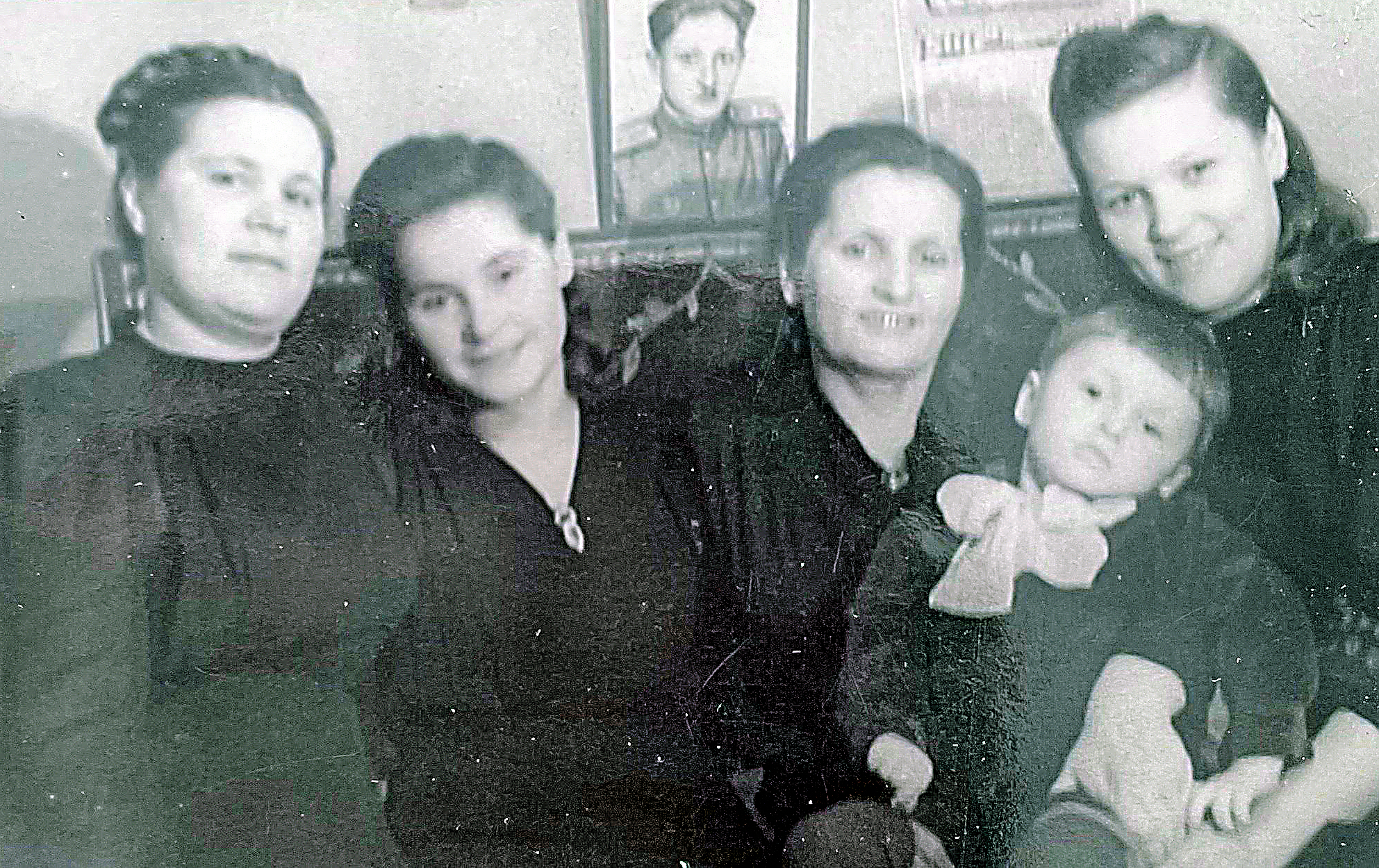
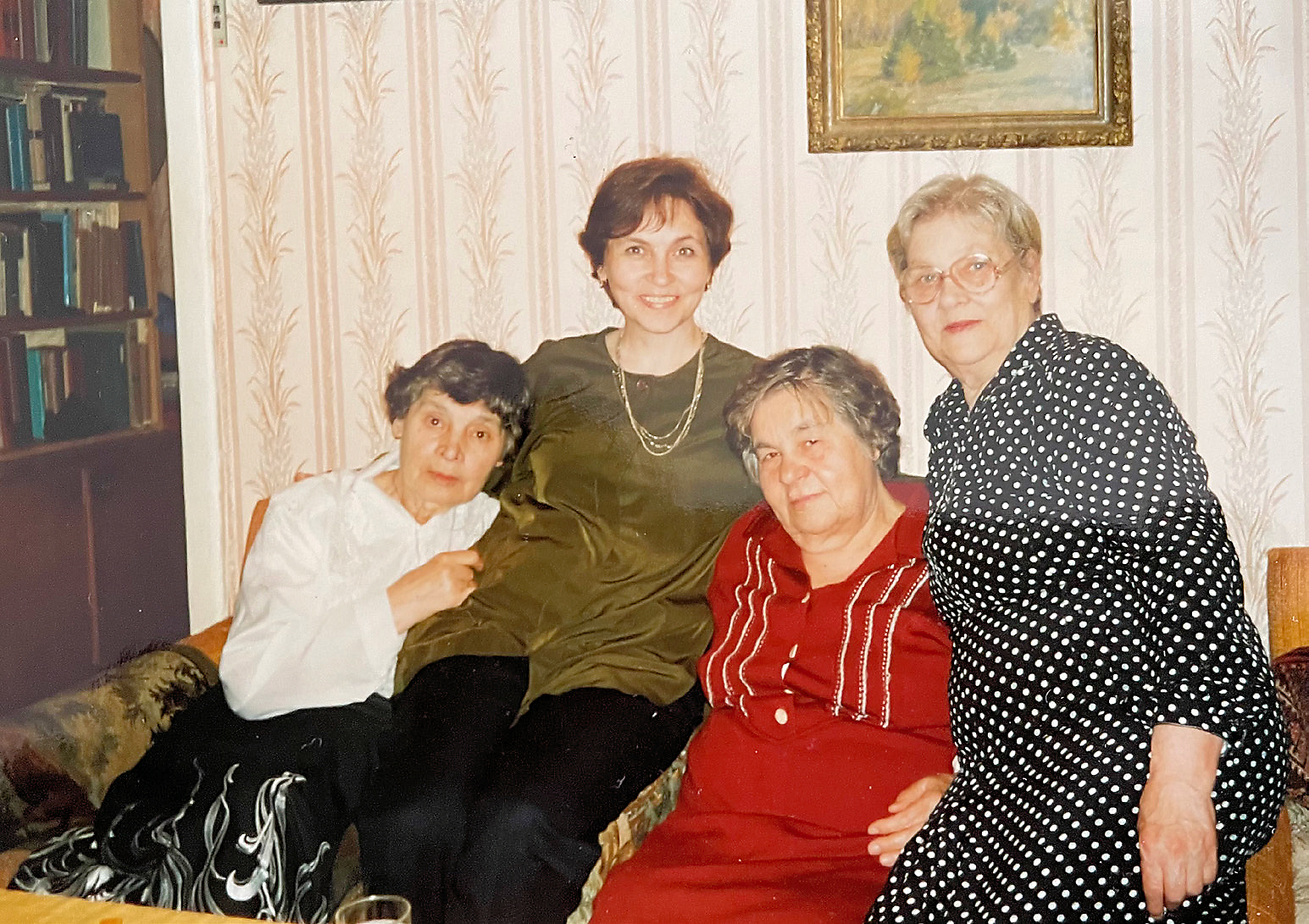
Dadykins. Daddy's brothers
Ivan Petrovich Dadykin.
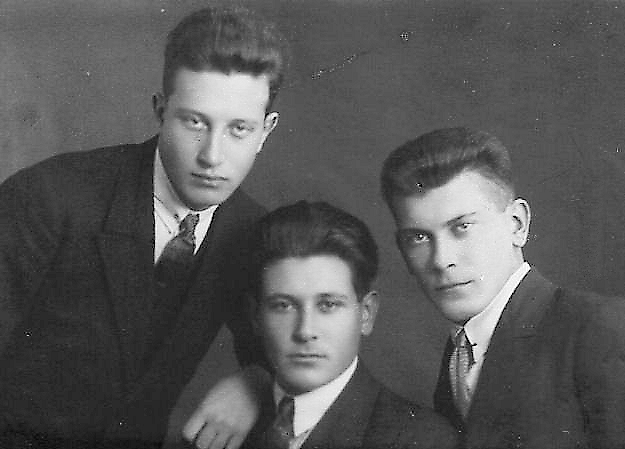
"I'm glad it's not happening in front of me, otherwise I'm tired of worrying about everything for everyone... Vanya is still alone. I do not know whether he will marry or not.
But the family survived. They were united by a joyful event - a daughter, Olga, was born on April 9, 1937.
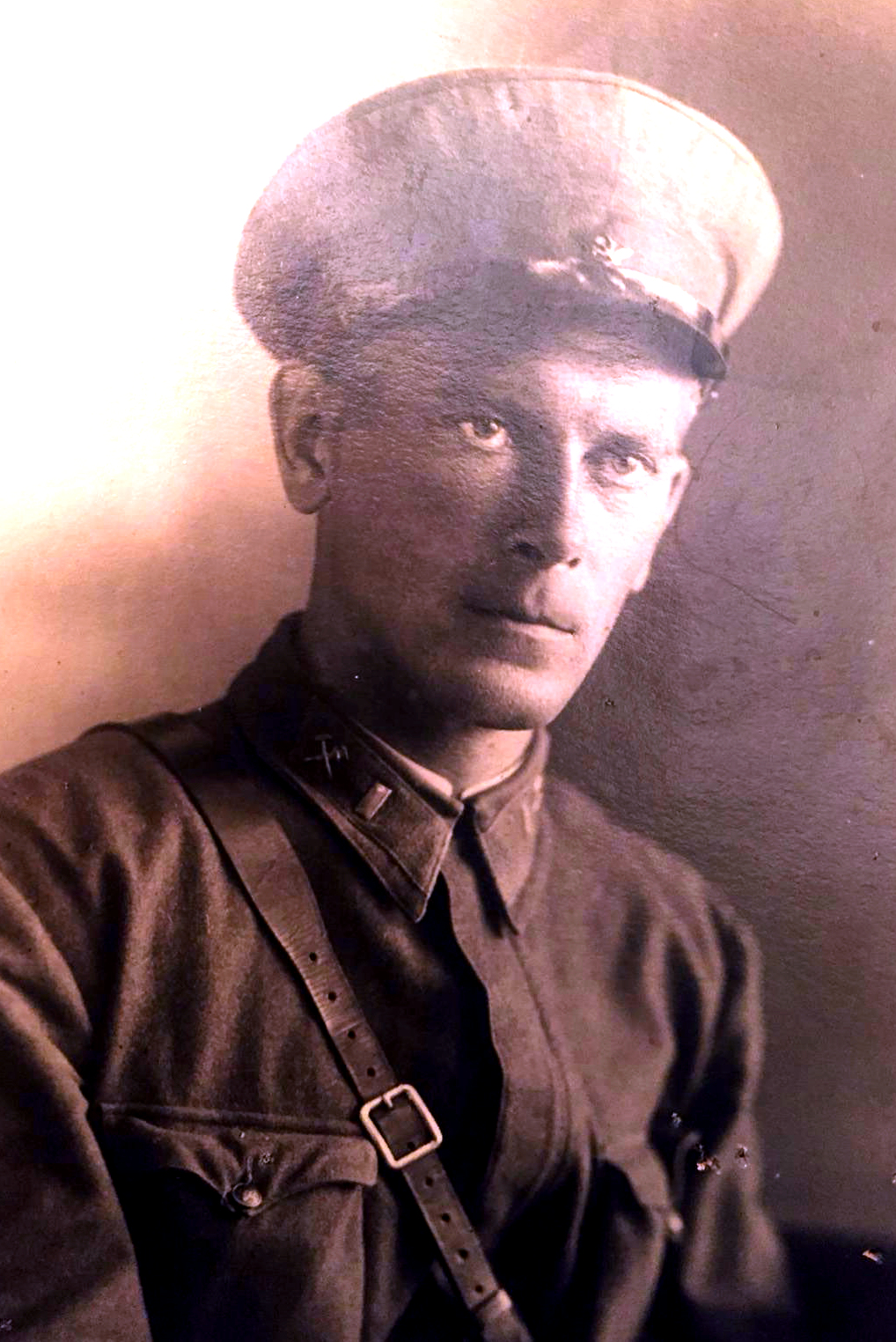
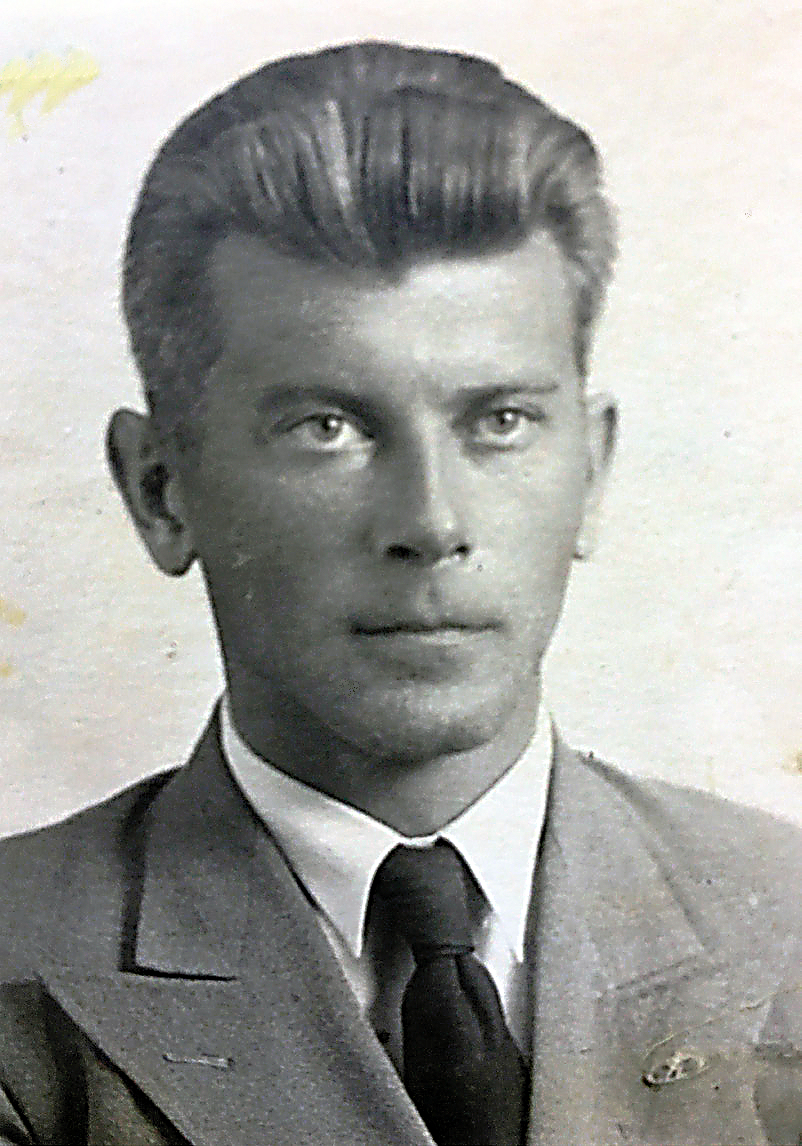
Vsevolod Petrovich Dadykin
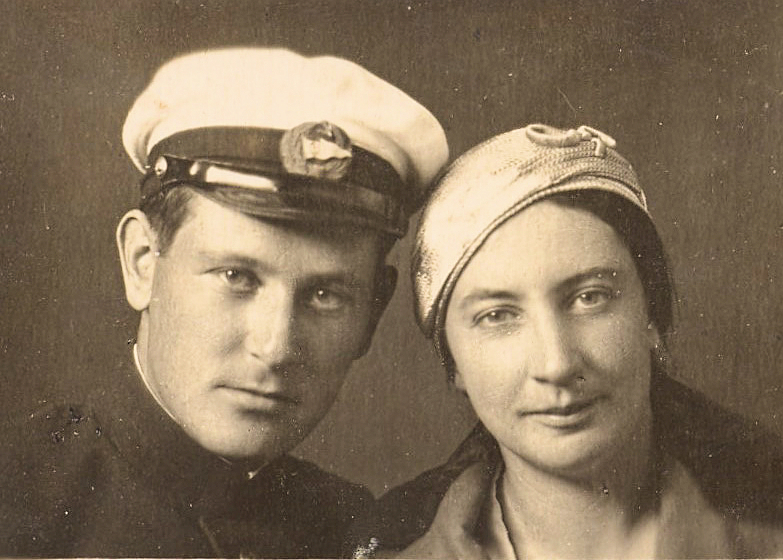
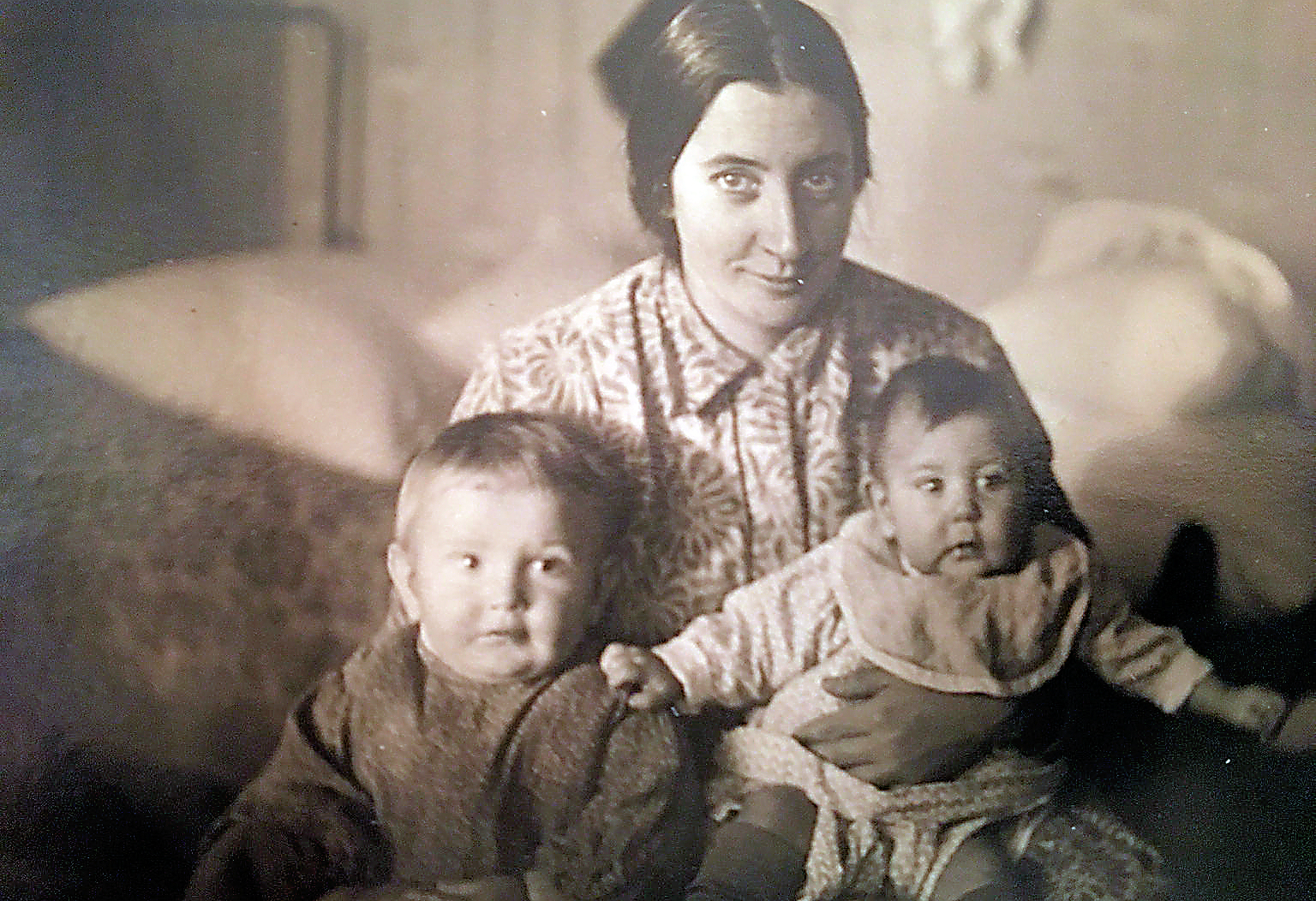
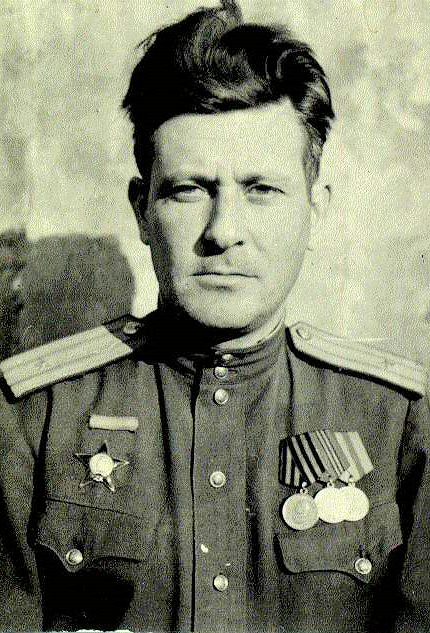
"My dear Sevochka!, where are you? The sorrow grips me when I remember where you are and what it is like to bear the hardships of winter in the Arctic. My daughter-in-law was very happy: "Ninny is a lovely girl, My mother and I love to take care of her. Things are going well with Lelela. She is an ideal mother in every way. It's boring for Lela without you. She's completely disconnected from her personal life and spends all her time with her daughter.
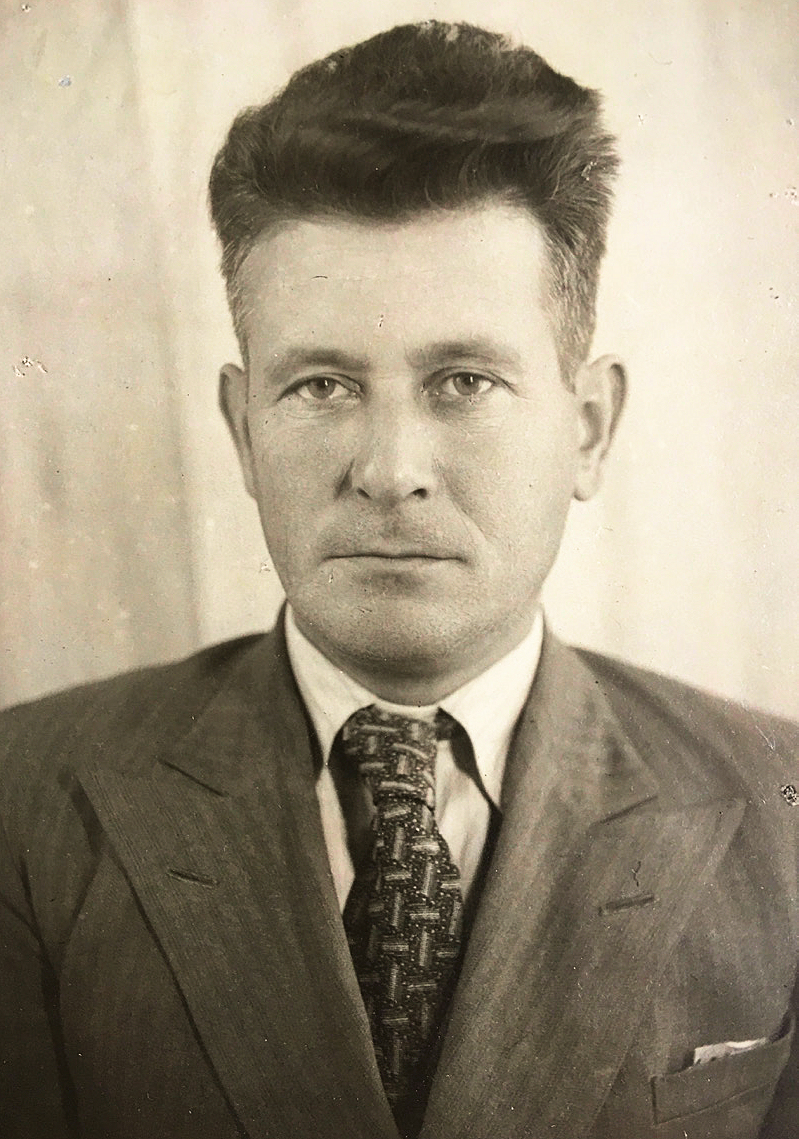
Pavel Dadykin
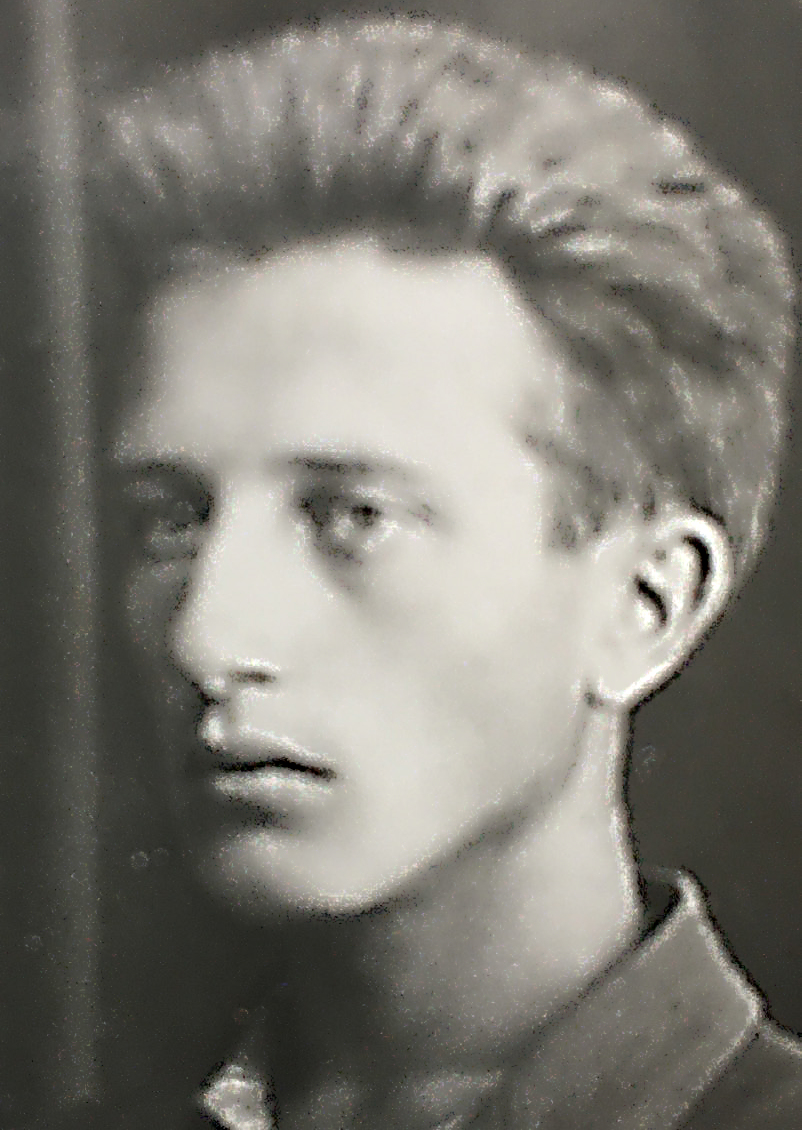
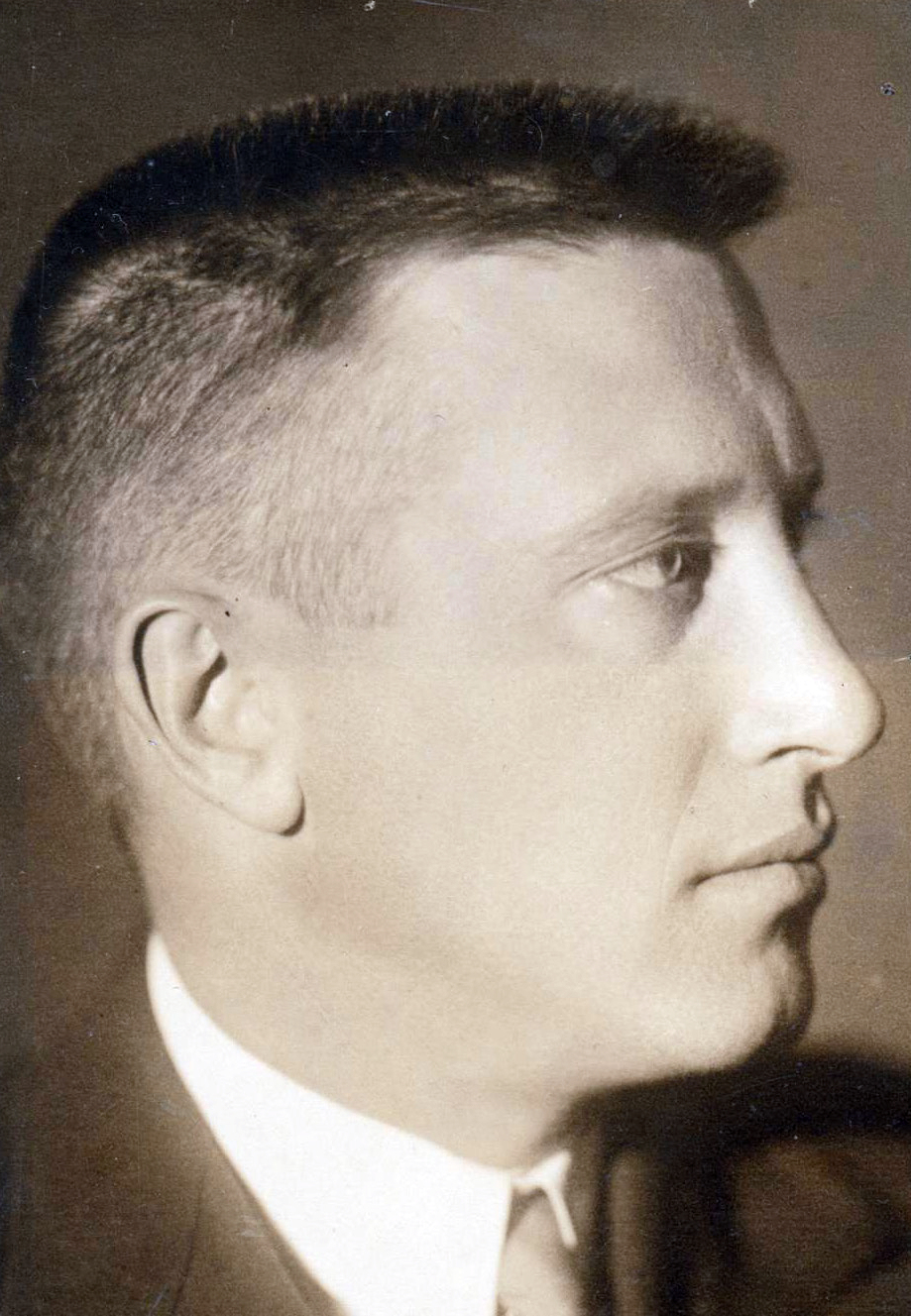
"On March 26 I will be leaving for you via Tula-Penza, Gorky Pavlik.
He did not arrive. There was no further news from him.
What happened to Pavlik? Why had he chosen such a route and written that there was no other way? What was he going to tell his family? Was his disappearance linked to his stay on occupied territory, or was he the victim of a bandit attack? There are no answers to these questions. His grandmother and brothers searched for Pavlik, applied to various authorities, but they found out nothing about his fate.
Conclusion
Sources and literature
BackPage
Literary and artistic publication